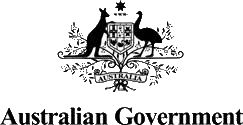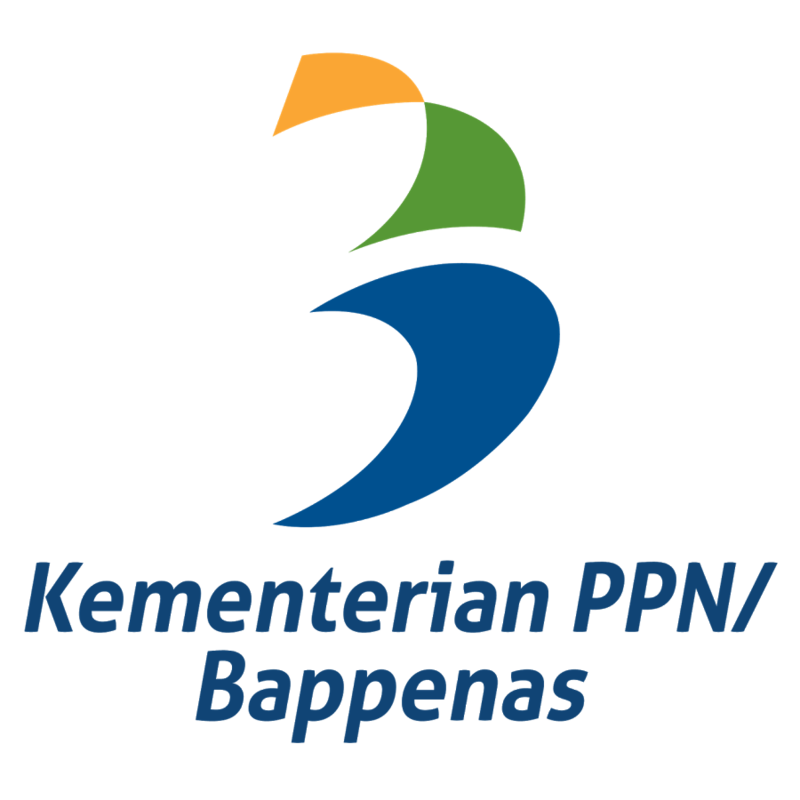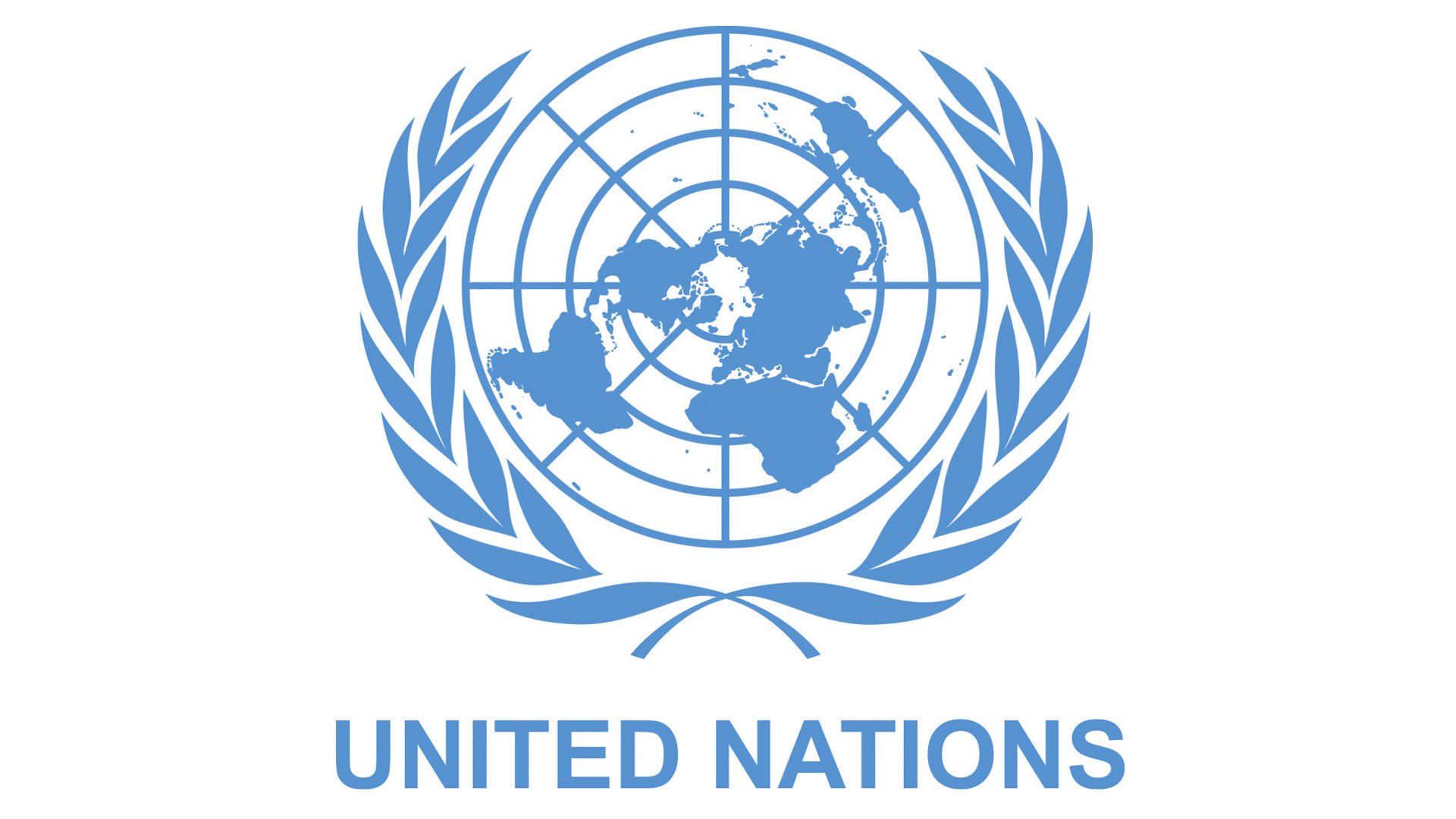Project Repository
This page displays a portfolio of projects that have been successfully completed by Pulse Lab Jakarta. The projects displayed on this page are based on the selected filters:
Countries
Themes
SDGs
Timeline
Data
Partners
1. Statistics
The figures for projects that have been conducted by Pulse Lab Jakarta including total projects, countries, themes and datasets.
Total projects conducted by Pulse Lab Jakarta
Total countries that participated or implemented PLJ projects either from events and/or research activities
Total themes in all projects conducted by Pulse Lab Jakarta
Total number of datasets utilized for research purposes
2. Location
Drag left/right to move the globe and click to show details!
3. SDGs Connection
The following graph shows the connection between three areas: Data, SDGs, Themes.
4. Data Journey
The following timeline shows how data was utilized in PLJ's projects over the last decade.
Note: If the data text is dark instead of white, this indicates that the data does not match the filter you're currently looking for.
2012 - 2014
2015
2016
2017
2018
2019
2020
2021
2022
5. Project Portfolio
Explore the project details based on the filters chosen above.
| Date | Project Information |
|---|---|
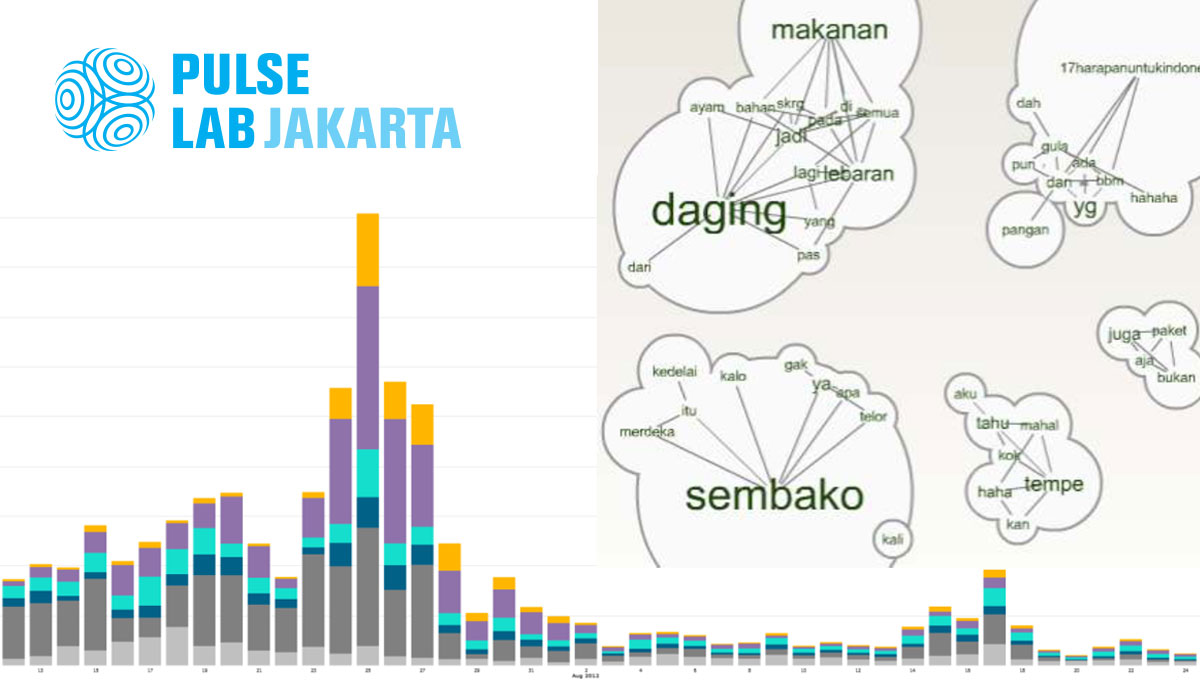
Start:
2011
End:
2011
|
2011
Monitoring Perceptions of Crisis-Related Stress Using Social Media DataLocation: Indonesia 
This research identifies and quantifies discussion themes in Twitter data in order to investigate what indicators can help understand people's perceptions and concerns around food, fuel, finance and housing in the US and Indonesia. The purpose of this research project is to determine which indicators might be present in social media data that could shed light on how populations cope with global crises, such as commodity price volatility or the continuing global economic crisis. In this investigation, the analysis was limited to publicly available data from Twitter for July 2010 through October 2011 in Javanese/Bahasa Indonesia and English. The topics of focus included the affordability/availability of food, fuel, housing and loans
<p>The purpose of this research project is to determine which indicators might be present in social media data that could shed light on how populations cope with global crises, such as commodity price volatility or the continuing global economic crisis. As an initial investigation, this project was limited to the analysis of publicly available data from Twitter for July 2010 through October 2011. The work was further limited to tweets in Javanese/Bahasa Indonesia and English.</p>
<p>The topics of focus included the affordability/availability of food, fuel, housing and loans. By classifying a populations’ tweets into several categories associated with relevant topics, it was possible to perform quantitative analysis to better understand populations’ vulnerabilities: detecting anomalies such as spikes or drops in the number of tweets about particular topics (e.g. comments about power outages in Indonesia or student loans in U.S.), observing weekly and monthly trends in Twitter conversations (e.g. discussions around debt in U.S.), finding patterns in the volume of particular topics over time (e.g. discussions around housing in U.S.), comparing the proportions of different sub-topics to understand shifts in trends over time (e.g. the ratio of tweets about formal loans vs. informal loans in Indonesia) or relating trends in Twitter conversations with external indicators (e.g. conversations around the price of rice in Indonesia mimicking the official inflation statistics).</p>
<p>This research has pointed to the strong potential use of Twitter data for understanding the immediate worries, fears and concerns of populations, but at the same time, the research suggested that it is a poor source of data for gauging people’s long term aspirations. There are several remaining challenges, in particular that Twitter has a specific culture and demographic which needs to be better understood to strengthen any analysis of this type. Overall, this exploratory research shows some of the potential of Twitter data for exploring people’s perceptions of crisis-related stress and suggests research lines and methodologies for further investigations.</p>
Domain
Poverty, Financial Inclusion, and Economic Development
Disaster Response and Humanitarian Action
SDG
No Poverty
Zero Hunger
Decent Work and Economic Growth
Reduced Inequality
Sustainable Cities and Communities
Data
Social Media
Partners
Crimson Hexagon
|
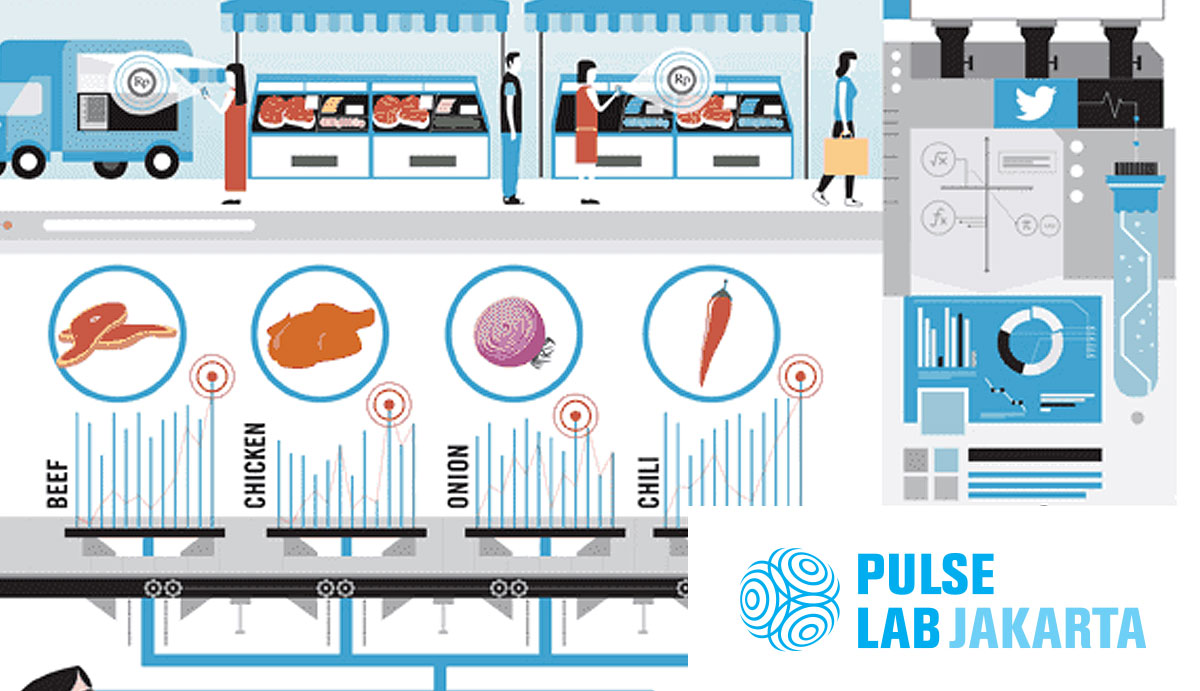
Start:
2013
End:
2013
|
2013
Informing Social Protection Policy Around Food SecurityLocation: Indonesia 
This project explored how Twitter data can be used to ‘nowcast’ or provide real-time food prices. Pulse Lab Jakarta collaborated with Bappenas and WFP on the study, the outcome of which was a statistical model of daily price indicators for four food commodities. When the modeled prices were compared with official food prices, the figures were closely correlated, demonstrating that near real-time social media signals can function as a proxy for daily food price statistics.
<p>This project explored how Twitter data can be used to ‘nowcast’ or provide real-time food prices. Pulse Lab Jakarta collaborated with Bappenas and WFP on the study, the outcome of which was a statistical model of daily price indicators for four food commodities: beef, chicken, onion and chili. When the modeled prices were compared with official food prices, the figures were closely correlated, demonstrating that near real-time social media signals can function as a proxy for daily food price statistics. This preliminary study paves the way for further research on how social media analytics can complement traditional price data collection by offering a faster, more affordable and efficient way of collecting real-time food prices.</p>
<p>The ability to monitor market commodity prices in real-time could provide critical information for policy decisions on food security and other economic issues. However, not all countries have well- established systems for accessing and monitoring price data, especially at a high frequency. New approaches in price monitoring could help to fill this data gap in developing economies.</p>
<p>Pulse Lab Jakarta conducted a study to explore Twitter as a data source for building a real-time food price tracking model in Indonesia. Indonesia was chosen as the case study country for two primary reasons. First, official commodity price data is available on a daily or weekly basis, as the Indonesian government already uses a dependable monitoring system for commodity prices. The Ministry of Trade collects and publishes daily price information, and the Indonesian Bureau of Statistics (BPS) collects weekly commodity price information. Second, Indonesia is one of most- tweeting countries, both in terms of number of Twitter users and amount of generated content.</p>
<p>To refine the scope of the research study, four food commodities (beef, chicken, onion and chili) were selected to track. These commodities were chosen based on data availability and the country-level priorities for food security monitoring in consultation with the Ministry of National Development Planning and World Food Programme (WFP) Indonesia. Data was analysed from June 2012 to September 2013, a timeframe of 15 months.<br> <br>A numerical filter was then used such to ensure the tweet price did not exceed a maximum allowable daily percentage price change (itself based on historical rates). This filter was validated through an examination of the historical series of official food prices (for example, a daily change of 3.5% was the largest change observed in the beef price dataset). The numerical model was also adapted to consider both the daily number of tweets and the divergence of prices reported in tweets from the last official price.</p>
<p>Using the keyword and numerical filters to extract 41,761 relevant tweets, a statistical model was then built in which the proxy for daily commodity price was based on data including:</p>
<ul>
<li>Model price from the day before, as quoted on Twitter</li>
<li>Volume of tweets (higher volumes of price quotes would make these quotes more credible)</li>
<li>Maximum daily price change rate</li>
</ul>
<p>This nowcasting model was compared with official food prices, aggregated daily across Indonesia. ‘Ground truth’ price data provided by the Ministry of Trade was aggregated across the entire country on a daily basis.</p>
Domain
Poverty, Financial Inclusion, and Economic Development
Disaster Response and Humanitarian Action
SDG
No Poverty
Zero Hunger
Reduced Inequality
Data
Social Media
Partners
Bappenas
UNICEF
WFP
|
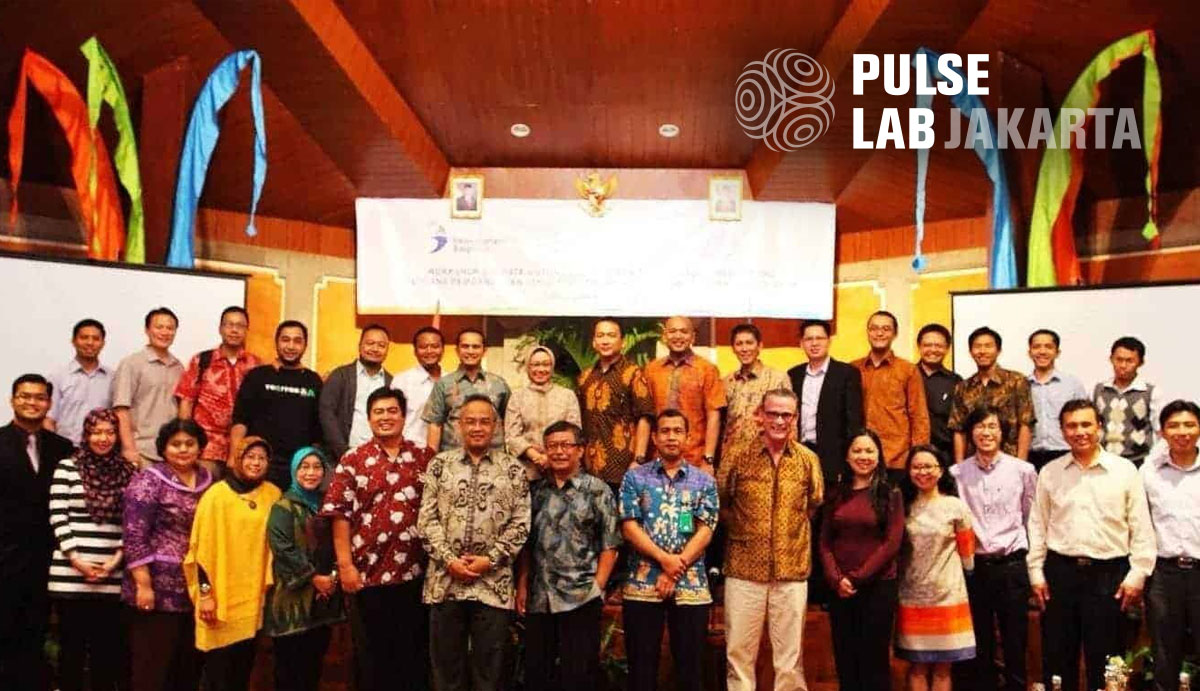
Start:
2013
End:
2013
|
2013
Providing Real-Time Insights on Indonesians’ Post-2015 PrioritiesLocation: Indonesia 
PLJ analysed social media to determine national post-2015 priorities in Indonesia, focusing on Disaster Risk Reduction, HIV and AIDS, protection of forests, and education. The project findings, which were included in the Post-2015 Country Consultation Report, reflected the value of big data in understanding public perceptions on key national issues.
<p>Indonesia has a vast population of 250 million people so determining national Post-2015 priorities there is a challenge. However, the rapid increase in Internet penetration and social media use makes Indonesia a good candidate for Big Data analysis of the millions of tweets sent in the country every day. Complementing Indonesian national consultations around the Post-2015 agenda, Pulse Lab Jakarta analyzed social media related to Disaster Risk Reduction, HIV and AIDS, and the protection of forests. The research also analyzed conversations around education, as the United Nations MY World survey showed that 75% of the participating Indonesians wished for "A Good Education". Education was by far the most consistently talked about of the four topics analysed, with 90% of the 55 million tweets referring to the topic. Mainly due to the floods of January 2013, Disaster Risk Reduction ranked second. The project findings were included in the Post-2015 Country Consultation Report 'The World Indonesia Wants.'</p>
Domain
Disaster Response and Humanitarian Action
Urban and Regional Dynamics
SDG
Good Health and Well-being
Quality Education
Climate Action
Data
Social Media
Partners
UNESCO
UNFPA
UNIDO
|
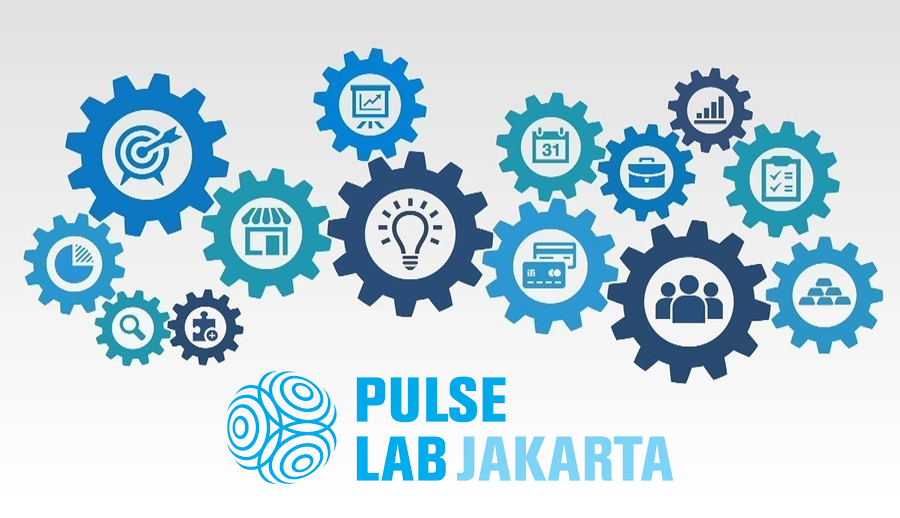
Start:
2013
End:
2013
|
2013
Understanding Parent Perceptions on Immunisation in Real-TimeLocation: Indonesia 
Collaborating with WHO, UNICEF, Bappenas, and the Indonesian Ministry of Health, PLJ is analysing social media perceptions about immunization. Key discussions identified revolve around new vaccines, Islamic law interpretations, outbreak news, and vaccination side effects. Future plans involve assessing advocacy campaigns' impacts and designing strategies to improve vaccination uptake.
<p>Low vaccine uptake can threaten entire health programmes and cost lives, so when some parents hesitate to vaccinate their children, policymakers need to understand why. Pulse Lab Jakarta is collaborating with WHO, UNICEF, Bappenas and the Indonesian Ministry of Health to analyze perceptions regarding immunization as expressed on social media platforms. Preliminary analysis shows that a number of elements are frequently discussed on social media in Indonesia. These include new vaccines, debates about whether immunization is halal (permissible) under Islamic law, or haram (against) the tenets of Islam, discussion when there is news of outbreaks and finally discussion of side effects of immunization. The next phase of the project will include an evaluation of the impact of previously launched advocacy campaigns, and developing guidelines for how social media monitoring can be used to inform the design and responsiveness of future advocacy campaigns in order to improve the uptake of vaccinations and prevent disease.</p>
Domain
Strategic Exploration
Public Health and COVID-19
SDG
Good Health and Well-being
Quality Education
Reduced Inequality
Data
Social Media
Partners
Bappenas
UNICEF
WHO
MOH
|
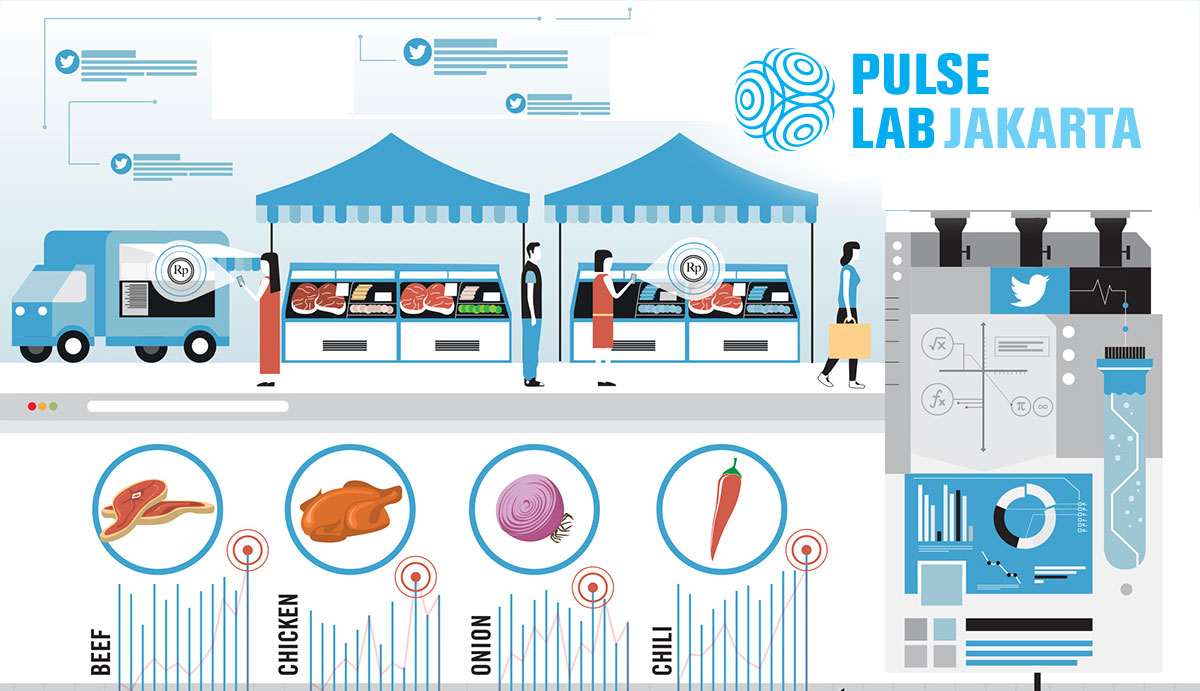
Start:
2014
End:
2014
|
2014
Nowcasting Food Prices in Indonesia Using Social Media SignalsLocation: Indonesia 
PLJ, in collaboration with the Indonesian Government and WFP, used Twitter data to provide real-time food prices, creating a statistical model for daily price indicators for beef, chicken, onion, and chili. The study showed that social media analytics can efficiently complement traditional price data collection methods.
<p>This project explored how Twitter data can be used to 'nowcast' or provide real-time food prices. Pulse Lab Jakarta collaborated with the Indonesian Government and WFP on the study, the outcome of which was a statistical model of daily price indicators for four food commodities: beef, chicken, onion and chili. When the modeled prices were compared with official food prices, the figures were closely correlated, demonstrating that near real-time social media signals can function as a proxy for daily food price statistics. This study shows that social media analytics can complement traditional price data collection by offering a faster, more affordable and efficient way of collecting real-time food prices.</p>
Domain
Poverty, Financial Inclusion, and Economic Development
SDG
Zero Hunger
Data
Social Media
Partners
Crimson Hexagon
Bappenas
WFP
|
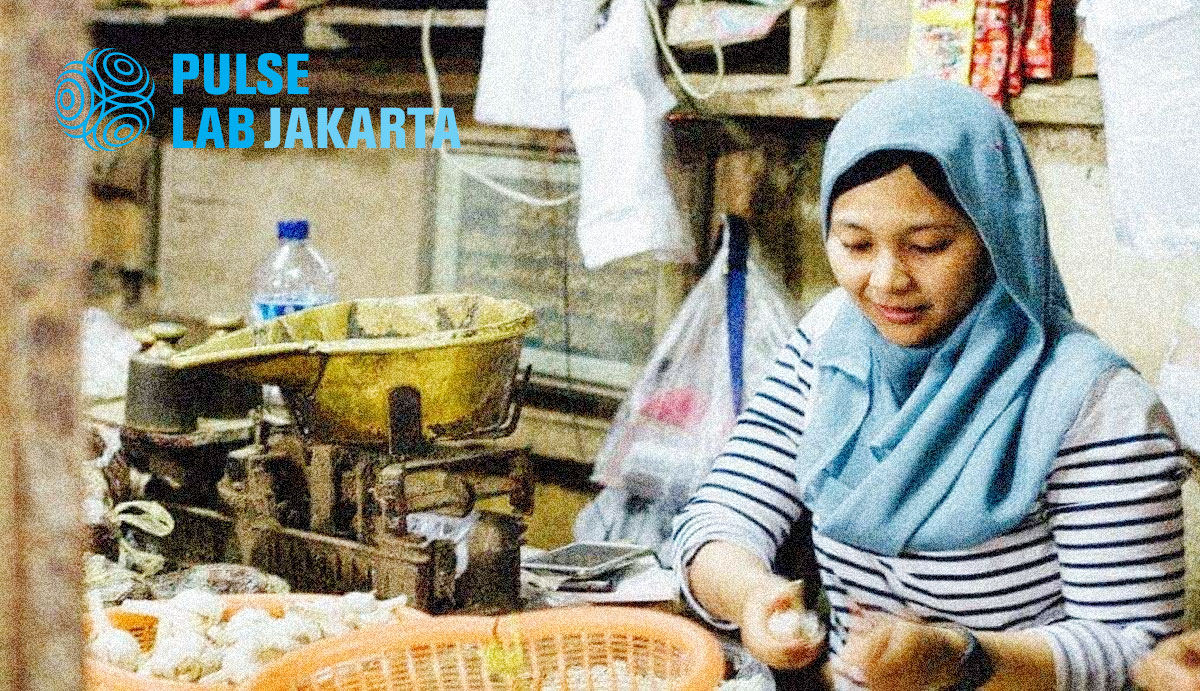
Start:
2014
End:
2014
|
2014
Identifying Trends in Discrimination Against Women in The WorkplaceLocation: Indonesia 
In a feasibility study with the International Labour Organisation (ILO), PLJ explored online data as a real-time signal source for workplace discrimination against women. Four significant discussion topics were identified, though no strong signals were found in ILO's priority focus areas.
<p>In collaboration with the International Labour Organisation (ILO) Country Office for Indonesia, Pulse Lab Jakarta conducted a feasibility study to explore online data as a source of real-time signals of discrimination against women in the workplace. Keywords were used to filter public tweets related to discrimination, identifying four topics with significant volume of discussions (over 100,000 tweets over three years); discrimination in job requirements, permission for women to work, perceptions on appropriateness of different types of work for women, and the multiple burdens of working women. The study found that, using these keywords, signals were not strong enough in ILO's priority focus areas in Indonesia. Therefore, the tweets analyzed in the research did not lead to conclusive results.</p>
Domain
Strategic Exploration
Women's Empowerment and Gender Equality
SDG
Gender Equality
Decent Work and Economic Growth
Data
Social Media
Partners
Bappenas
ILO
|
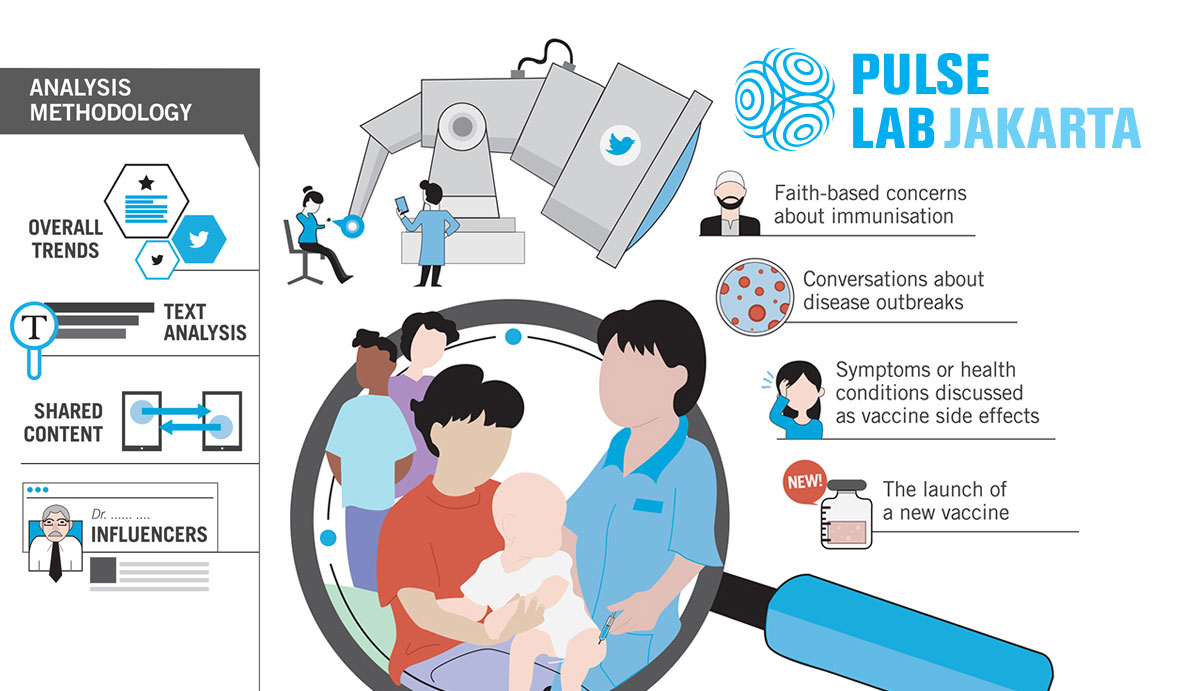
Start:
2014
End:
2014
|
2014
Understanding Public Perceptions of ImmunisationLocation: Indonesia 
PLJ worked with Bappenas, the Ministry of Health, UNICEF, and WHO to analyse social media data on public perceptions of immunisation. Trends in perception were identified, which can help in countering misinformation and enhancing public health responses.
<p>This project examined how analysis of social media data could be used to understand public perceptions on immunisation. In collaboration with the Ministry of National Development Planning (Bappenas), the Ministry of Health, UNICEF and WHO in Indonesia, Pulse Lab Jakarta analysed relevant tweets about vaccines and immunisation. Findings included identification of perception trends including concerns around religious issues, disease outbreaks, side effects and the launch of a new vaccine. The results built on Global Pulse's 2013 projects in this field, confirming that real-time information derived from social media could complement existing knowledge of public opinion and lead to faster and more effective response to misinformation, since rumours often spread through social networks.</p>
Domain
Strategic Exploration
Public Health and COVID-19
SDG
Good Health and Well-being
Quality Education
Reduced Inequality
Data
Social Media
Partners
Bappenas
UNICEF
WHO
Ministry of Health
|
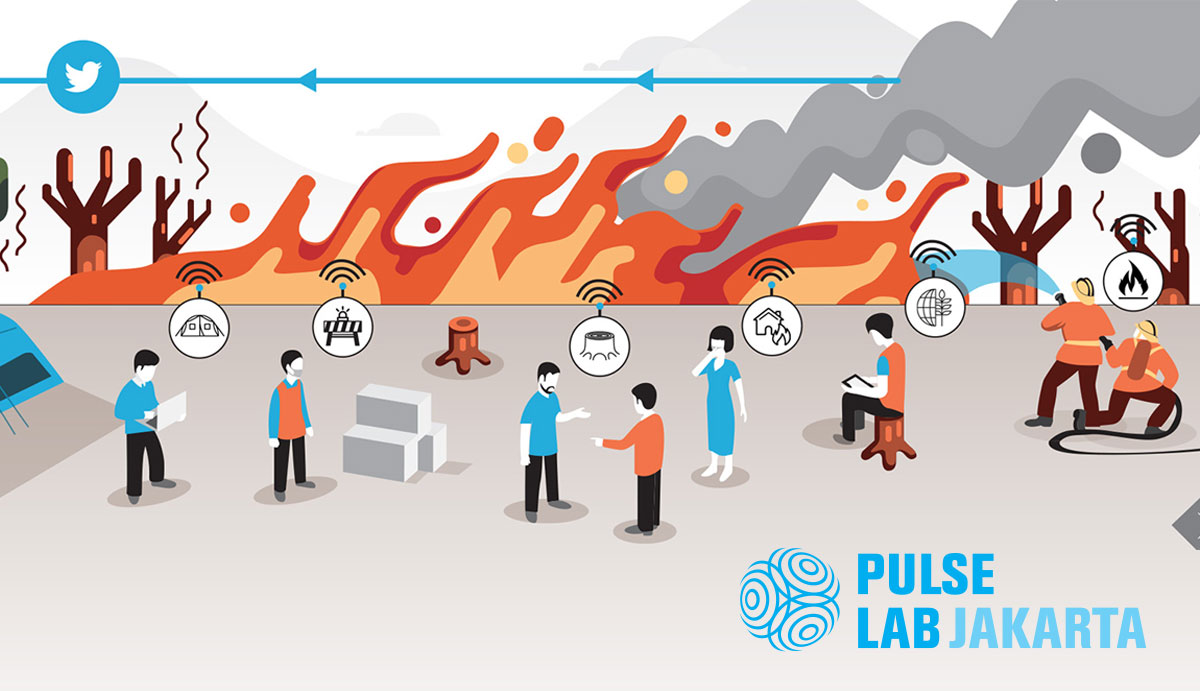
Start:
2014
End:
2014
|
2014
Supporting Forest and Peat Fire ManagementLocation: Indonesia 
A feasibility study conducted by PLJ explored the use of real-time social media data during forest and peat fires to aid emergency response management in Indonesia. The study found significant increases in tweets about haze during fire events, highlighting the potential for integrating social media data with disaster response operations.
<p>A feasibility study was conducted by Pulse Lab Jakarta on the use of real-time information from social media during forest and peat fires haze events to support emergency response management in Indonesia. Specifically, the study sought to explore early signals from Twitter relating to major forest fires or haze events with a view to understanding the relation between communications trends and on-the-ground events. The results of the study demonstrated that Indonesians tweet significantly more about haze during and immediately after major fire events. During the February to March 201 4 haze crisis in Riau, people tended to tweet mostly about the status of fires and support from the government. It is recommended that further research be conducted to find additional ways to extract useful information from social media, combine social media signals with other sources of digital data for real-time insights on disaster impact and human wellbeing, and integrate real-time social media data with current operational information flows used during disaster response to support more timely and effective emergency response and recovery efforts.</p>
Domain
Disaster Response and Humanitarian Action
Environment and Climate
SDG
Climate Action
Data
Social Media
Partners
UNORCID
|
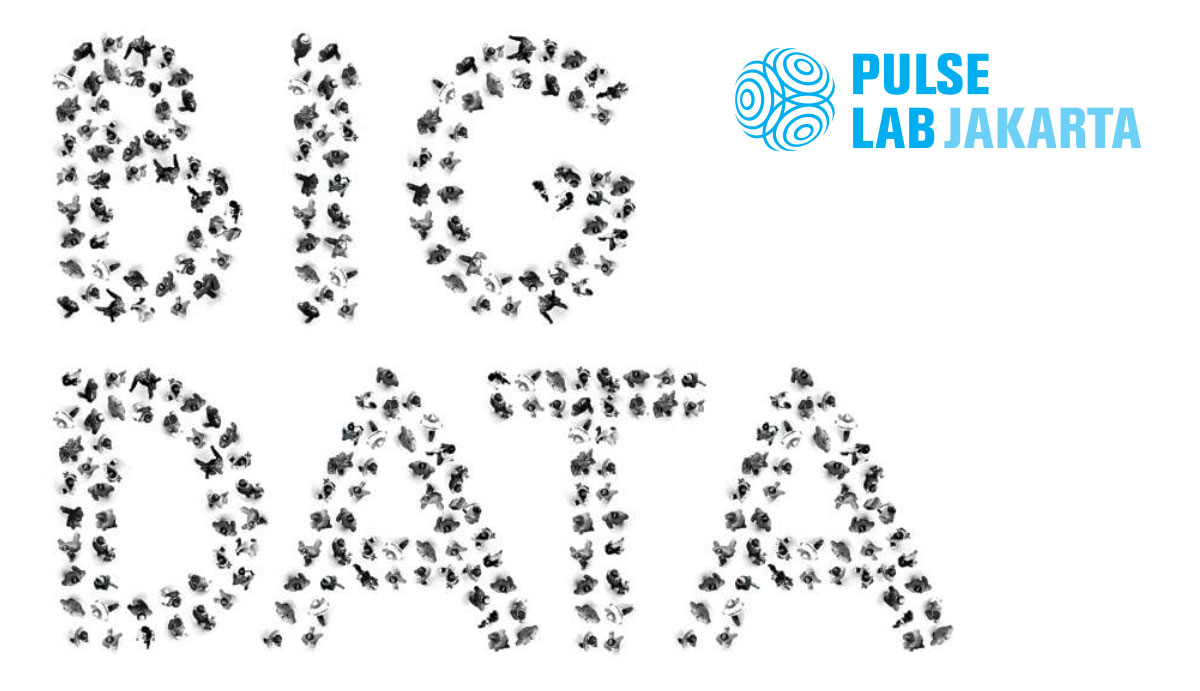
Start:
2014
End:
2014
|
2014
Digital M&E ToolkitLocation: - 
PLJ initiated a project to foster discussions about big data's potential in the development sector. It provided definitions, categorizations, frameworks, and practical examples of big data applications, offering recommendations for future practice.
<p>This project designed to foster insightful discussions about big data's potential in the development sector. It proposes concrete definitions, categorizations, and frameworks for big data practice in the development sector, provides a guide to potential areas for successful application of big data in monitoring and evaluation, and offers basic information about various concepts and tools within a project cycle. It further presents practical examples of big data usage, discussing the strengths and limitations of different approaches, and offers recommendations for future practice.</p>
Domain
Strategic Exploration
SDG
Industry, Innovation, and Infrastructure
Reduced Inequality
Partnership for The Goals
Data Partners |
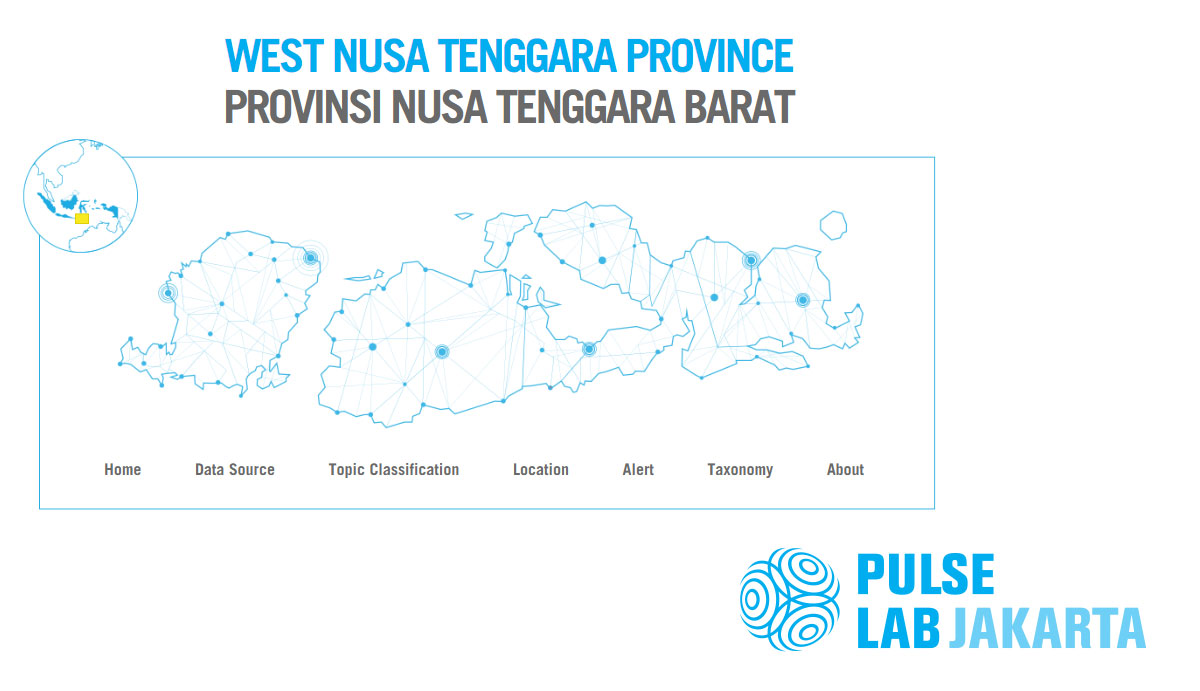
Start:
2015
End:
2015
|
2015
Real-Time Platform of Civic Data AnalyticsLocation: Indonesia 
Following a visit to the Bale Ite data centre, PLJ conducted a feasibility study and developed a dashboard that combines and analyses data from various sources, providing real-time information on national priorities. This represents an effective implementation of data analytics at the provincial level.
<p>In September 2014, PLJ was invited to the official opening of the "Bale Ite" data centre in Mataram, which was supported by the Australia-Indonesia Partnership for Decentralisation (AIPD). This event sparked discussions with the NTB provincial government on how they manage and utilise the data they collect, including the provincial SMS platform to collect data on citizens' complaints and opinions across the province. As an example of a better data analytics as well as a real-time data platform, PLJ conducted a feasibility study in provincial level and produced a dashboard that provides real-time information on the national priorities, by combining and analysing complaints dataset in NTB and complaints collected through LAPOR! platform and citizens' passive voice identified through Twitter.</p>
Domain
Urban and Regional Dynamics
SDG
Industry, Innovation, and Infrastructure
Reduced Inequality
Peace, Justice, and Strong Institutions
Data
Social Media
Crowdsourced Data
Partners
Australia-Indonesia Partnership for Decentralisation (AIPD)
|
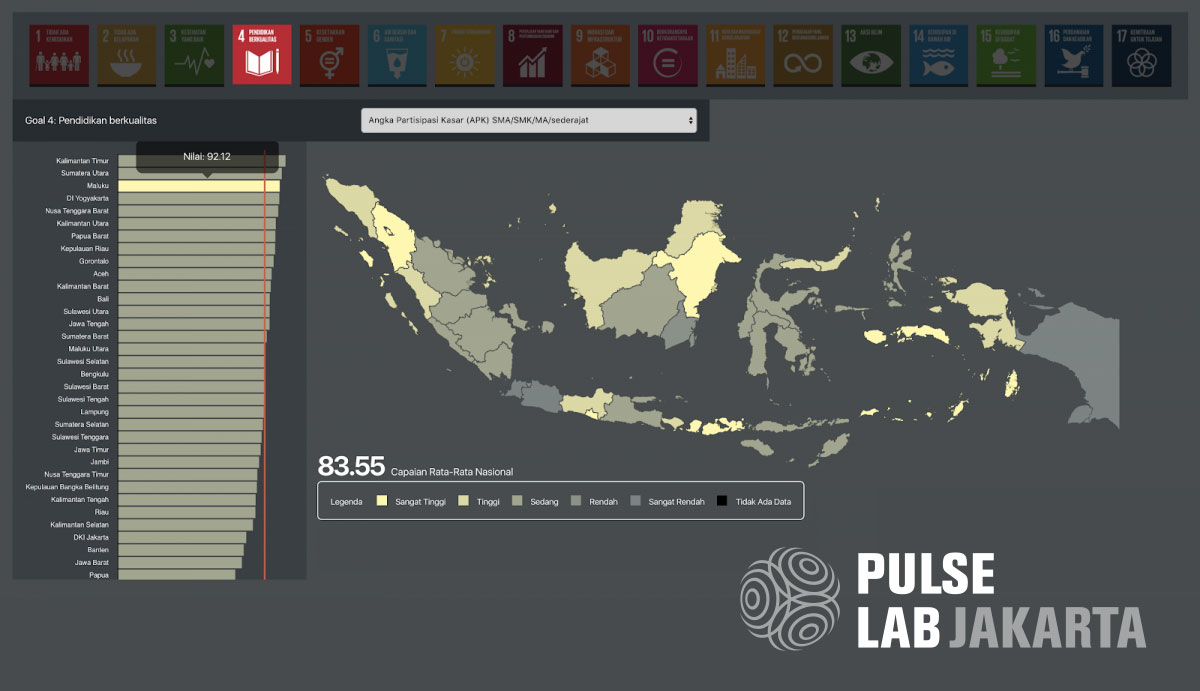
Start:
2015
End:
2015
|
2015
MDGs Data Visualization DashboardLocation: Indonesia 
PLJ presented the state of all MDG indicators from 2000-2014 across country, province, and city levels in Indonesia. The program offered a comparison option for indicators and statuses across provinces, providing a detailed overview of progress and disparities.
<p>Showing the status of all MDG indicators between 2000 and 2014 in three geographical levels, country, province and city/regency with an option to compare the indicators and statuses between the provinces in Indonesia.</p>
Domain
Strategic Exploration
SDG
Reduced Inequality
Data
UN In Indonesia
Partners |

Start:
2015
End:
2015
|
2015
Aggregated Data for Better Decision MakingLocation: Indonesia 
Following a successful civic data analytics platform in NTB, PLJ worked with KSP and Bappenas to utilize advanced data analytics, combining existing complaint systems and social media feedback to inform local government decision-making. The approach showcased the potential for real-time public policy insights, data analysis for prioritization, and understanding citizen feedback, enhancing transparency.
<p>Following the success of the real-time platform of civic data analytics produced for NTB province in Indonesia, Pulse Lab Jakarta further explored the contribution of advanced data analytics to local government decision-making by generating insights from a combination of existing complaint systems and passive feedback from citizens on social media, rolled out at national level in partnership with Kantor Staf Presiden (KSP) and Bappenas. The results demonstrate the potential utility of (a) near real-time information on public policy issues and their corresponding locations within defined constituencies, (b) enhanced data analysis for prioritisation and rapid response, and (c) deriving insights on different aspects of citizen feedback. The publication of citizen feedback on public-facing dashboards can enhance transparency and help constituents understand how their feedback is processed.</p>
Domain
Urban and Regional Dynamics
SDG
Reduced Inequality
Sustainable Cities and Communities
Peace, Justice, and Strong Institutions
Data
Social Media
Crowdsourced Data
Partners
Bappenas
KSP
|
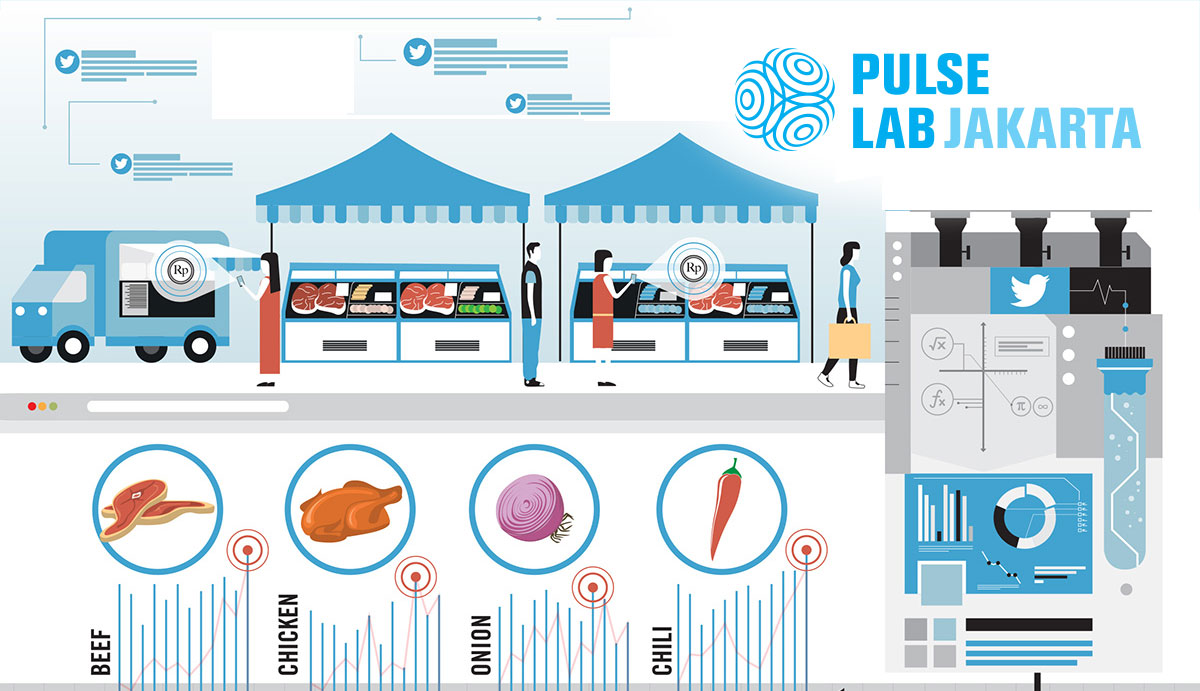
Start:
2015
End:
2015
|
2015
Nowcasting Food Prices By Analysing Search KeywordsLocation: Indonesia 
PLJ developed new methodologies for "nowcasting" food prices using digital sources, including search volume dynamics related to food commodities. This initiative indicates the potential of nowcasting food prices at the provincial level.
<p>Pulse Lab Jakarta continued to test and develop new methodologies to nowcast food prices using new digital sources after the previous nowcasting project using social media (http://nowcasting.unglobalpulse.org). An investigation in the correlation between the dynamics of search volume on food commodity names and food prices at markets shows another potential of nowcasting food prices in a provincial level.</p>
Domain
Poverty, Financial Inclusion, and Economic Development
SDG
Zero Hunger
Data
Social Media
Partners |
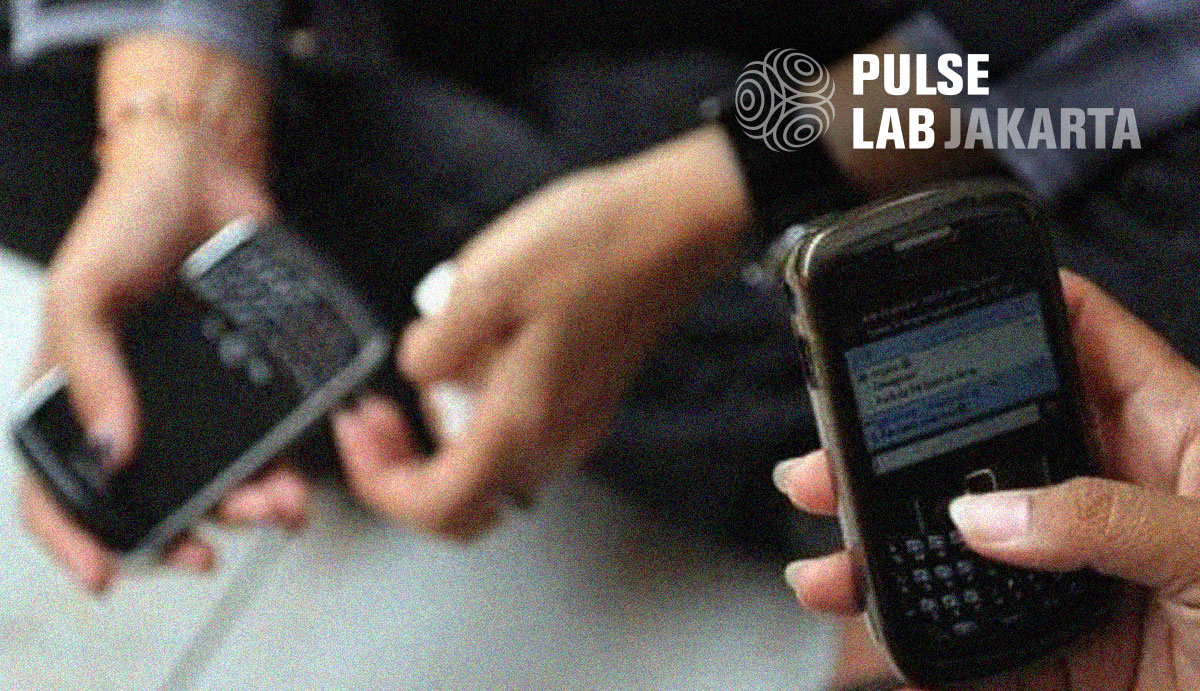
Start:
2015
End:
2015
|
2015
Measuring The Impact of Fuel Subsidy Policy on The Middle ClassLocation: Indonesia 
Collaborating with King's College and Bappenas, PLJ used text mining algorithms to analyze social media conversations and understand the impact and perceptions of Indonesian fuel subsidy policy reforms.
<p>In collaboration with King's College and Bappenas, PLJ hosted and worked with a PhD fellow to analyse tweets to gauge the impact and perceptions of Indonesian fuel subsidy policy reforms. Using text mining algorithms, the project mines public conversations on Twitter and other social media to be analyzed by subject, polarity, popularity and underlying sharing patterns.</p>
Domain
Poverty, Financial Inclusion, and Economic Development
Trade and Competitiveness
SDG
Industry, Innovation, and Infrastructure
Responsible Consumption and Production
Data
Social Media
Crowdsourced Data
Partners
Bappenas
King's College
|

Start:
2015
End:
2015
|
2015
Exploring Technology-Enabled Approaches to Project EvaluationLocation: - 
PLJ, alongside AIPD, implemented technology-driven monitoring approaches across AIPD intervention areas, including Papua. The resulting data analysis was adopted by UNDP Indonesia and WFP, serving as a survey tool for climate adaptation studies and assessing the impact of El Nino.
<p>Working with the AIPD team, PLJ facilitated several approaches to the use of technology to monitor programmes across AIPD intervention areas, including in Papua, and conducted data analysis of the results. The approach has been adopted by UNDP Indonesia as Do-It-Yourself Survey Application for Monitoring (DIY-SAM), and used for climate adaptation study and by WFP to research the impact of El Nino. Surveys of beneficiaries were conducted in East Java, West Nusa Tenggara, East Nusa Tenggara, Papua and West Papua. 35 enumerators were engaged between March and May 2015 to administer the surveys. While in Papua and West Papua, the surveys were completed within 7 working days, the surveys in East Java required about 14 working days for ensuring all requisite permissions from the local government were in place. In West and East Nusa Tenggara, the team spent 14 working days on the survey to account additional survey required by the programme.</p>
Domain
Disaster Response and Humanitarian Action
Environment and Climate
Strategic Exploration
SDG
Zero Hunger
Climate Action
Partnership for The Goals
Data
Qualitative Data
Crowdsourced Data
Partners
AIPD
|

Start:
2015
End:
2015
|
2015
Measuring The Social Media Footprint of UnemploymentLocation: Indonesia 
In partnership with Universidad Carlos III de Madrid, NICTA, and UNICEF Innovation, a study was replicated to examine the social media footprint of unemployment in the Indonesian context. The project explored the potential to shift focus to more suitable indicators due to varying Twitter penetration levels and socioeconomic contexts.
<p>Working with Universidad Carlos III de Madrid, NICTA, and UNICEF Innovation, this project aimed to replicate the study on the social media footprint of unemployment, originally conducted in Spain, in the Indonesian context. Given the very different level of Twitter penetration and socio-economic context between the two countries, the focus might shift from unemployment to other indicators that are more conducive to this type of analytics.</p>
Domain
Poverty, Financial Inclusion, and Economic Development
SDG
Decent Work and Economic Growth
Data
Social Media
Partners
Universidad Carlos III de Madrid
NICTA
UNICEF Innovation
|

Start:
2015
End:
2015
|
2015
Classifying Residents and Tourists from Social MediaLocation: Indonesia 
PLJ tested computational methodologies for automatically classifying Indonesian citizens from social media data. The experiment achieved a 75-80% accuracy rate through machine learning, underscoring the potential for capturing specific data selections for public complaints or feedback.
<p>The project tested different computational methodologies to automatically classify Indonesian citizens from social media data without human intervention. The experiment showed that one of the approaches provides 75-80% accuracy using machine learning. The project illustrated the importance of these methodologies to capture social media data or identify certain data selections that can be applied for public complaints or feedback.</p>
Domain
Strategic Exploration
SDG
Decent Work and Economic Growth
Responsible Consumption and Production
Data
-
Partners
-
|
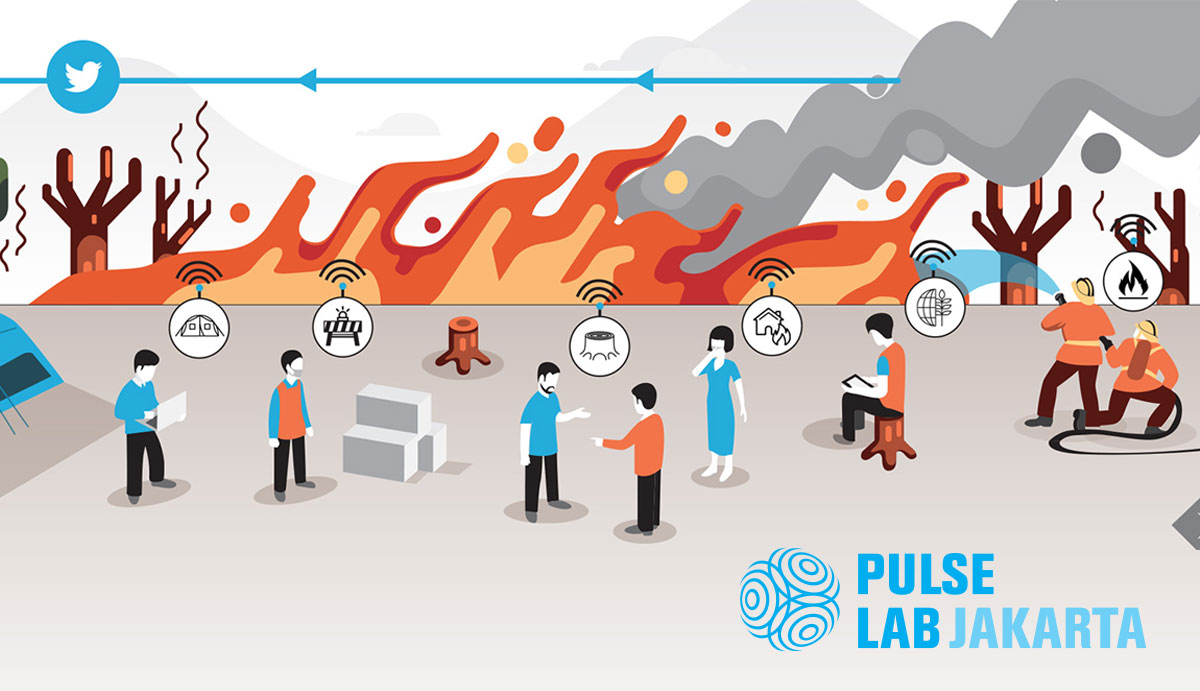
Start:
2015
End:
2015
|
2015
Supporting Forest and Peat Fire Management Using Social MediaLocation: - 
Amid recurring forest and peatland fires, PLJ investigated the impact of haze events on mobility and health through social media data. Initial findings suggest it's possible to identify haze intensity and mobility changes in response to haze events from Twitter conversations.
<p>The continuous forest and peatland fires prompted PLJ to investigate the mobility and health impacts of haze events on affected populations, as articulated by social media. Initial findings suggest that it is possible to identify haze intensity from twitter conversations, as well as confirming a strong temporal correlation between fire and haze hotspots and the number of identified conversations. The preliminary results also suggest that mobility patterns as a result of haze events are discernable in social media data, in terms of response strategies such as remaining indoors in-situ or evacuating.</p>
Domain
Environment and Climate
SDG
Good Health and Well-being
Sustainable Cities and Communities
Climate Action
Peace, Justice, and Strong Institutions
Data
Social Media
Satellite Imagery
Partners |
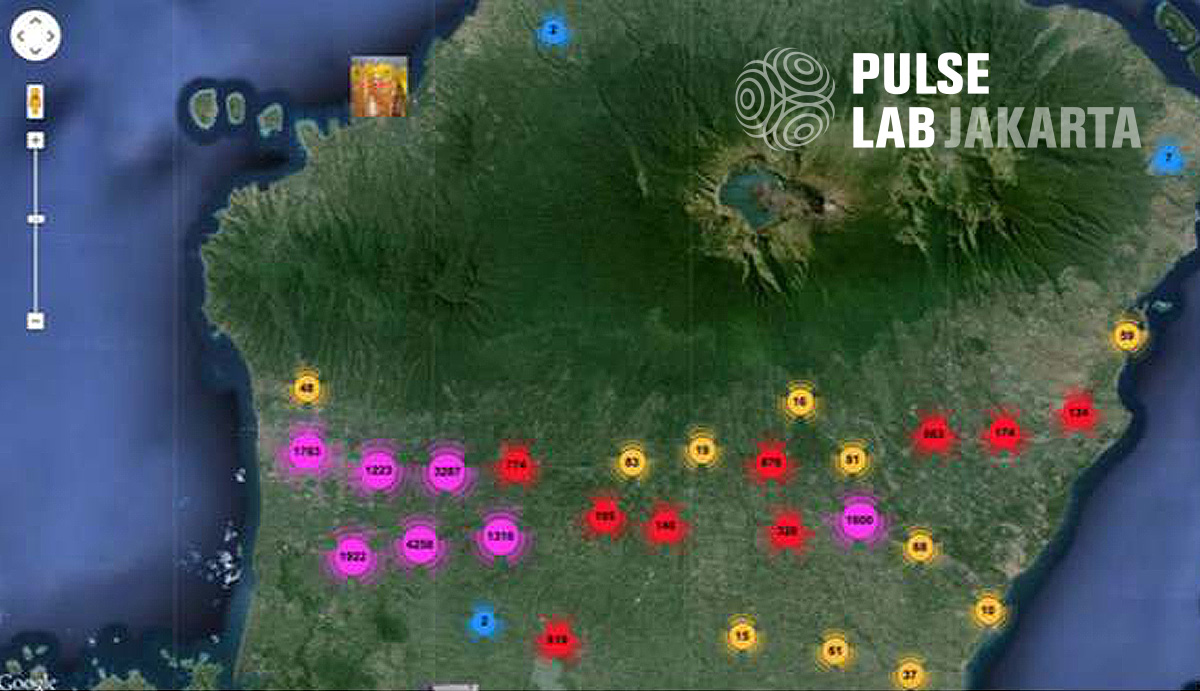
Start:
2015
End:
2015
|
2015
Real-Time Collection of Food PricesLocation: - 
Collaborating with WHO, FAO, and the World Food Programme, PLJ used the crowdsourcing platform Premise to collect food price data in eastern Indonesia. The project successfully collected data and sparked interest from the Ministry of Trade and is now tracking food security patterns in a dashboard.
<p>This feasibility study used crowdsourcing to track commodity prices in near real-time in areas where the availability of other data sources was limited. High-resolution and high frequency food price trends were derived from reports generated by “citizen reporters”. The study was conducted in Nusa Tenggara Barat, one of Indonesia’s poorest provinces, comprised almost exclusively of informal, cash-only markets and stalls. The study involved recruiting a trusted network of local citizen reporters to submit food price reports via a customized mobile phone application. The tested crowdsourcing method could be improved by developing a standardised approach to the “bunch measurement” of staples so that it could be effectively deployed in locations where standardised weights and measures are absent. Crowdsourcing technologies, which capture high frequency data on local trends, are best deployed in areas where traditional data collection methods are difficult or costly due to a lack of geographic proximity, high insecurity, or high food price volatility</p>
<p>The ability to monitor market commodity prices in real-time could provide critical information for policy decisions on food security and other economic issues. But not all countries have well- established systems for accessing and monitoring price data, especially at a high frequency. New approaches in price<br>monitoring could help to fill this data gap in developing economies.</p>
<p>To complement existing monitoring systems, the feasibility study focused on remote areas, and on vulnerable consumer groups, through its targeting of informal markets.</p>
<p>Success of the feasibility study hinged upon two key aspects:</p>
<ul>
<li>The ability to create quickly a data capture network in Indonesia to provide accurate and frequent price data across a wide rural coverage area; and,</li>
<li>The ability to accurately capture price trends in the coverage area across an unstructured set of trade outlets.</li>
</ul>
<p>Global Pulse, through Pulse Lab Jakarta, worked with FAO and WFP, to define both the geographic areas and market “clusters” for the study, as well as the basket of items to capture through crowdsourcing, and collaborated with a technology company, Premise, to evaluate the efficacy of a distributed monitoring infrastructure.</p>
<p>Nusa Tenggara Barat, one of Indonesia’s poorest provinces, was selected for the study. Because of the rural nature of the province, the geographic clusters were comprised almost exclusively of informal, cash-only markets and stalls. The geographic scope of this engagement focused on the following areas:</p>
<ul>
<li>SUMBAWA ISLAND (circa 87 inhabitants/kilometre)</li>
<li>LOMBOK ISLAND (not including Mataram City; circa 653 inhabitants/kilometre)</li>
<li>MATARAM CITY (the most populated of the three areas; circa 6,563 inhabitants/kilometre)</li>
</ul>
<p>The basket of commodities to be monitored was selected through a series of consultations with partners, which was informed by a review of national and provincial priorities on food security. The<br>final list included staple foods, such as tofu, tempeh, chilies, mackerel and eggs, as well as liquefied petroleum gas (LPG). To produce quality price statistics, the network needed to generate a minimum of 30 price reports per commodity per week within each geographic area.</p>
<p>The process involved recruiting local “citizen reporters” to upload food price reports using a customized mobile application built by Premise. The reports included commodity name, price, GPS location and measuring unit, as well as meta-information such as a picture. The reporters were recruited through social media advertisements which had a viral effect within the local networks of students. Reporters were rewarded with mobile phone credit or mobile money based on their contributions. More than 200 active users across NTB province were recruited, each of whom contributed more than one report per month. For quality control purposes, reporters exhibiting fraudulent activities (for example those submitting duplicate reports using multiple accounts) were identified by a mixture of automatic and manual approaches and deactivated.</p>
<p>This study demonstrated that crowdsourcing of prices can complement existing monitoring systems, especially in areas where data are absent, whether based on geography or due to a<br>particular staple being absent from official indices.</p>
<p>The approach is analogous to computer-assisted personal interview applications, already widely used by national statistical offices in data collection. The crowdsourcing approach offers an added value in that it creates networks of reporters through social mobilisation and enables them to respond rapidly to data needs when required.</p>
<p>At the moment, the absence of international or statistical guidelines, however, limits the value of this data source in providing comparable cross-country data as it is not yet subject to government auditing and quality assurance.</p>
<p>The crowdsourcing method tested as part of the feasibility study could be improved by developing a standardised approach to “bunch measurement” of staples so that it could be effectively deployed in locations where standardised weights and measures are absent.</p>
Domain
Poverty, Financial Inclusion, and Economic Development
SDG
Zero Hunger
Data
Crowdsourced Data
Partners
WHO
FAO
|
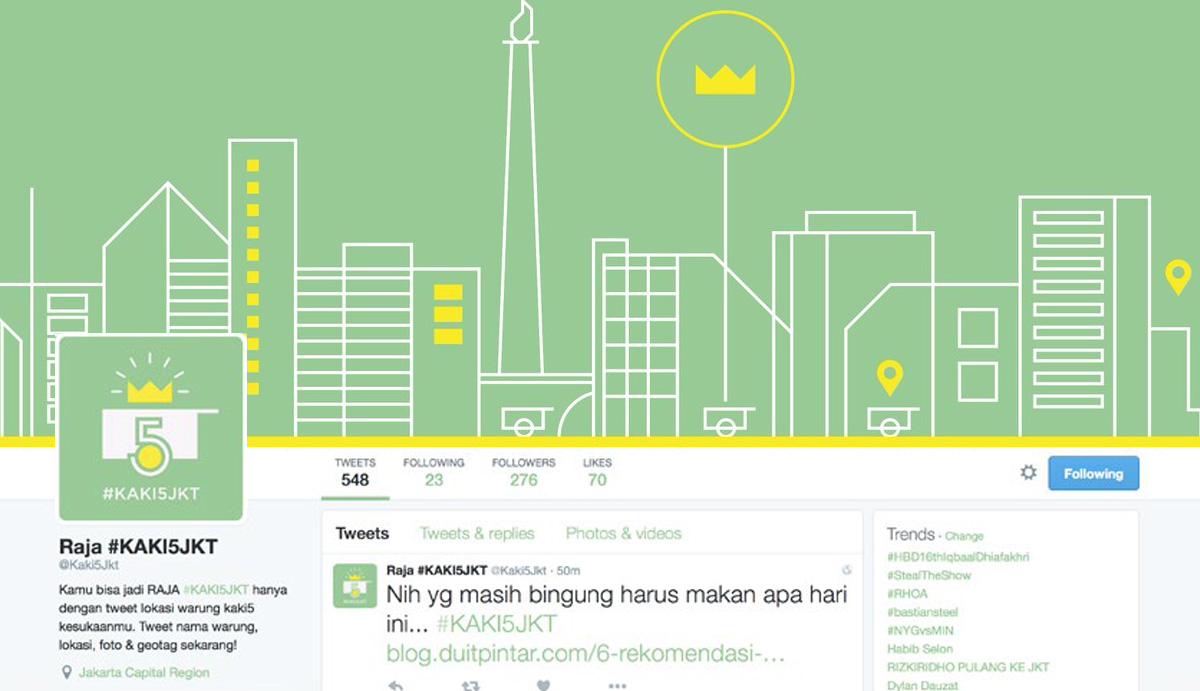
Start:
2015
End:
2015
|
2015
Crowdsourcing Data on Jakarta’s Street VendorsLocation: Indonesia 
PLJ's pilot project collected data on the location and menu of street food vendors in Jakarta, aiding the Jakarta Smart City program and aligning with the HackJak Hackathon 2015.
<p>Following on from the #HackJak Hackathon 2015, Pulse Lab Jakarta handed over the methodology for and initial results of a real-time sensing campaign to the Jakarta Provincial Government. </p>
<p>In serving the ever-evolving needs of a city as complex as Jakarta, real-time sensing is an approach with great potential for policymakers. Across the city, both the Government and communities have created infrastructure to meet residents’ needs, such as traffic flow measures, as well as energy, water and sanitation facilities. As infrastructure degrades local residents are the first to know, for example the existence of potholes on roads.</p>
<p>The complexity of cities and the potential for real-time sensing brought about by the advent of the social web and the 'internet of things' necessitates a new era of collaboration between governments and citizens. Communities are leading this paradigm, but progressive governments are starting to catch up and to use the data and tools on offer to better serve their constituents.</p>
<p>With this in mind Pulse Lab Jakarta teamed up with the Twitterati, Jakarta Smart City and Twitter Indonesia to collect data on street food outlets for the benefit of residents and the Jakarta Provincial Government.</p>
<p>Aligned with the tourism theme of the #HackJak Hackathon 2015 hosted by the Jakarta Provincial Government and SEATTI, the pilot project focused on mapping Jakarta’s vibrant street food scene and, thus, the #Kaki5JKT campaign was born.</p>
<p>Street food has been part of the life of Jakarta for aeons. Some vendors and stalls have even shaped organic food clusters around the city. But the lively nature of the street food scene poses challenges to conventional data collection.</p>
<p>Based on the fact that Indonesia has been called the social media capital of the world and that residents of Jakarta have been found to tweet more than any other city on Earth, the campaign used Twitter as the medium for data collection.</p>
<p>#Kaki5JKT gathered information on the business names of the street vendors, their geo-location, the quality of the food, and even pictures of the food stall. The crowdsourced data and by extension the street food community will be visualised on the Jakarta Smart City Platform. The data will form the basis of apps for tourists and foodies.</p>
Domain
Urban and Regional Dynamics
SDG
No Poverty
Decent Work and Economic Growth
Sustainable Cities and Communities
Data
Social Media
Crowdsourced Data
Partners |

Start:
2015
End:
2015
|
2015
Smartphone-Based Simulation GameLocation: Indonesia 
A project was undertaken to assess understanding and training needs of Kompak facilitators and Community Leaders regarding regulations and community development requirements related to the Village Law.
<p>This project aims to test whether Kompak facilitators and Community Leaders understand regulations and requirements for community development connected to the Village Law, as well as to generate data on training needs.</p>
Domain
Disaster Response and Humanitarian Action
Strategic Exploration
SDG
Quality Education
Peace, Justice, and Strong Institutions
Partnership for The Goals
Data
Crowdsourced Data
Partners
KOMPAK
|

Start:
2015
End:
2015
|
2015
WearablesLocation: Indonesia 
A feasibility study was conducted to use vital signs from wearable technology as a proxy indicator for public service satisfaction levels. Initial results from NTB province were promising, though further research incorporating rigorous scientific methods was identified as necessary.
<p>A project was initiated to test the feasibility of using vital signs collected through wearable technology (e.g. heart beat rates) as a proxy indicator of level of satisfaction with public services. Initial research has been conducted in NTB province and results are promising, but more rigorous scientific methods need to be factored into the research to enhance the results.</p>
Domain
Strategic Exploration
Public Health and COVID-19
SDG
Good Health and Well-being
Industry, Innovation, and Infrastructure
Sustainable Cities and Communities
Data
-
Partners
-
|

Start:
2015
End:
2015
|
2015
Finding The Pulse - Maternal Health in NTBLocation: - 
PLJ pursued innovative ideas for a self-correcting maternal health system at the local level in Lombok, testing whether midwives and communities could collectively use their own data to inform health practices. The prototypes produced showed high potential applicability, especially with devolution of resources and power to village level.
<p>This project aimed to derive innovative ideas on a self-correcting maternal health system at the local level in Lombok in NTB by using a combination of qualitative and quantitative approaches based on ethnography and data analytics. In particular, this set of activities tested whether it is possible to have midwives and communities sharing, analysing and acting on their own data on maternal health in a collective manner. Instead of providing midwives with a new set of applications, the project reviewed existing data collection and analysis mechanisms, offered and tested a set of prototypes developed based on their day-to-day practices at the frontline of health services. The relevance and potential applicability of the prototypes produced in this project is high, especially as Indonesia undergoes a process of devolving more resources and decision-making power to village level.</p>
Domain
Strategic Exploration
Public Health and COVID-19
SDG
Good Health and Well-being
Data
-
Partners
-
|

Start:
2015
End:
2015
|
2015
Exploring Data Innovation Opportunities in Front Line Maternal Health ServicesLocation: - 
In a two-fold health service research in Malang and Probolinggo, PLJ explored a system that streamlines and digitises data management, reducing midwives' administrative burden. Collaborating with GiZ, the team co-created solutions based on insights from fieldwork, aiming to improve frontline maternal healthcare services.
<p>Pulse Lab Jakarta's research team immersed itself in a two-fold health service research in Malang and Probolinggo to explore the conception of a system that streamlines and digitises data management to significantly reduce midwives' administrative burden. PLJ's research team talked to mothers and healthcare providers, and dug down into the social and cultural context surrounding expectant mothers' pregnancy experience. As a way to establish better ownership of the issues and to improve frontline maternal healthcare services, Pulse Lab Jakarta collaborated with GiZ to organize a co-creation session with healthcare providers in East Java: the local health department, head of local clinics, midwives, and kader. Using the insights that PLJ discovered during the fieldwork, the participants envisioned resolutions that can alleviate the challenges or leverage the opportunities. The detailed insights and findings are elaborated through Pulse Stories 02: A Mother's Love.</p>
Domain
Strategic Exploration
Public Health and COVID-19
SDG
Good Health and Well-being
Data
Qualitative Data
Partners
GIZ
|

Start:
2015
End:
2015
|
2015
Big Ideas Competition for Asia Urban Issues Using Data InnovationLocation: Indonesia, India, Malaysia, South Korea 
The Big Ideas Competition, a joint initiative with the Korean National Information Society Agency, Korean Ministry of Science, ICT and Future Planning, and UN Global Pulse, received 208 proposals from data innovators in India, Indonesia, Korea, and Malaysia.
<p>In total, the Big Ideas Competition received 208 proposals from data innovators based in India, Indonesia, Korea and Malaysia in the fields of transportation, social protection and environment. The competition is a joint initiative of the Korean National Information Society Agency, the Korean Ministry of Science, ICT and Future Planning and UN Global Pulse.</p>
Domain
Urban and Regional Dynamics
SDG
Industry, Innovation, and Infrastructure
Sustainable Cities and Communities
Climate Action
Data
Qualitative Data
Crowdsourced Data
Partners
Korean National Information Society Agency
the Korean Ministry of Science
ICT and Future Planning
|

Start:
2015
End:
2015
|
2015
#HackGov - PLJ Seminar and Innovation Challenge 'Berdaya Bersama Untuk Indonesia'Location: - 
Over 250 people participated in the HackGov seminar and innovation challenge, which resulted in the creation of innovative applications based on municipal data, providing potentially useful prototypes for both government and citizens in tracking development, providing feedback, and effectively processing data.
<p>More than 250 people participated in a seminar and innovation challenge under the theme #HackGov: Empowering Indonesia. The Ministry of National Planning and Development (Bappenas), together with the UN Global Pulse in Jakarta, collaborated with Gadjah Mada University, Microsoft Indonesia and XL Axiata to blend approaches from the tech start-up scene with public policy challenges. The hackathon gathered 190 participants on 28th and 29th November 2015. The hackathon is already a familiar concept among techies in Indonesia, but #HackGov brought something new to the table. Building on the idea that technology-driven social change needs teamwork, this innovation challenge combined the brilliant minds of programmers, designers, and social planners from different parts of Indonesia. The participants were divided into 58 groups and created innovative applications based on municipal data. #HackGov has produced many potentially useful prototypes for both government and citizens in tracking development, providing feedback, and effectively processing data in accordance with the national development priorities in Indonesia.</p>
Domain
Strategic Exploration
SDG
Quality Education
Industry, Innovation, and Infrastructure
Partnership for The Goals
Data
Qualitative Data
Partners
Bappenas
Gadjah Mada University
Microsoft Indonesia
XL Axiata
|
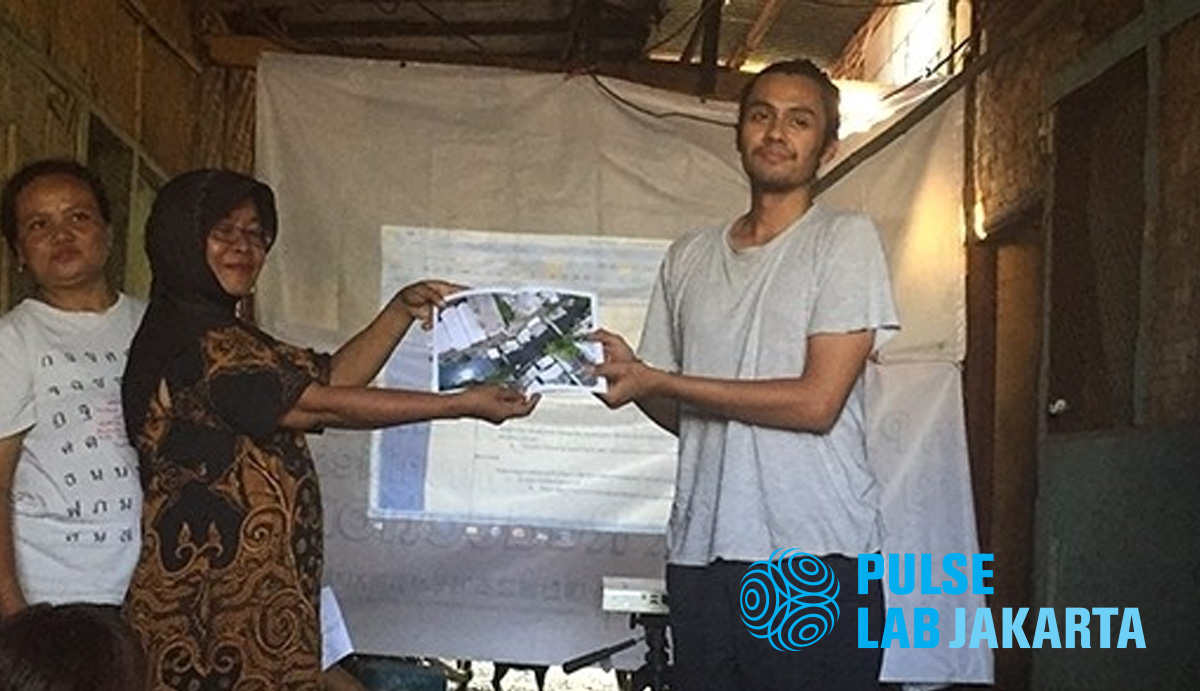
Start:
2015
End:
2015
|
2015
Mapping Urban VulnerabilityLocation: Indonesia 
Urban Poor Consortium (UPC) developed a sociospatial database to improve the accuracy of community-level data on urban poverty, relying on active data collection by citizens. The data gathered covered economic indicators, living conditions, and public service conditions, providing a more comprehensive view of urban poverty.
<p>Inspired by the lack of accurate or timely data on urban communities owned by the government, the Urban Poor Consortium (UPC) achieved a breakthrough by involving citizens in active data collection. This type of approach is expected to improve the accuracy of community-level data, because it is the citizens themselves that collect and verify the data.<br> <br>The collected data comes in the form of spatial data and numerics including economic indicators, living conditions, past natural disasters, access to basic needs such as water and sanitation, and the conditions of public services such as schools and health centres. The data collected is expected to complement those gathered by the government.<br> <br>Data collection, verification and analysis is delivered within the span of just two months. The longest stage of the process is the citizen engagament in data collection. This is done through informal meetings with brief introductions covering topics from the purpose of data collection to the expected benefits experienced by citizens. This approach is also delivered to Neighborhood Heads (Ketua RT) and public figures. The joint goal is to provide space for citizens to map the conditions of their neighbourhood and to have data-informed conversations about local development priorities. <br> <br>UPC first facilitates and trains citizens to capture the data. They are trained to use a GPS tracker to capture road patterns, field paper to pinpoint locations, google forms for social surveys, google maps to understand historical developments and focus group discussions to understand past occurrences of natural disasters.<br> <br>The whole process is being tested in Budi Dharma Village, North Jakarta. Resulting in a prototype model for community-generated data on local conditions and development priorities. <br> <br>Several governmental bodies have expressed their interest in the community-led mapping approach undertaken by UPC. At the same time, UPC continues to refine the approach to data collection in other villages, namely Kebun Bayam. The entire process will be completed by the end of October. <br> <br>Bappenas (Indonesian Ministry of National Development Planning) hopes the methods of participatory data collection will be included in the one million homes programme initiated by the Indonesian Government. By using locally-led data collection, the community can raise its level of participation and influence in housing planning.</p>
Domain
Urban and Regional Dynamics
SDG
No Poverty
Clean Water and Sanitation
Reduced Inequality
Sustainable Cities and Communities
Data
Qualitative Data
Partners
Urban Poor Consortium (UPC)
|

Start:
2015
End:
2015
|
2015
Lacak MalariaLocation: - 
The Malaria Center used a grant from PLJ to create a feature phone application for malaria monitoring. The Lacak Malaria system, compatible with all feature phones, reduced data collection time by up to 19 days, enhancing the response to public health trends.
<p>The Malaria Center is a government unit established in 2010 by the District Government of Halmahera Selatan. The Data Innovation Mini Grant received from Pulse Lab Jakarta was used to experiment with the creation of a feature phone application (USSD). The system needed to be simple, could not involve charging staff for report submission and had to function across all types of feature phones. After two months of prototyping, the Malaria Center has a system in place called Lacak Malaria (Malaria Monitoring), which was launched as a beta product on 15 September 2015. With this system, the Malaria Center reduced its data collection time by up to 19 days, making it much more responsive to public health trends. Lacak Malaria is currently used to monitor patients, but in the near future the Malaria Center will develop the system to include medicine stock monitoring.</p>
Domain
Strategic Exploration
Public Health and COVID-19
SDG
Good Health and Well-being
Data
Qualitative Data
Crowdsourced Data
Partners
The Malaria Center
|
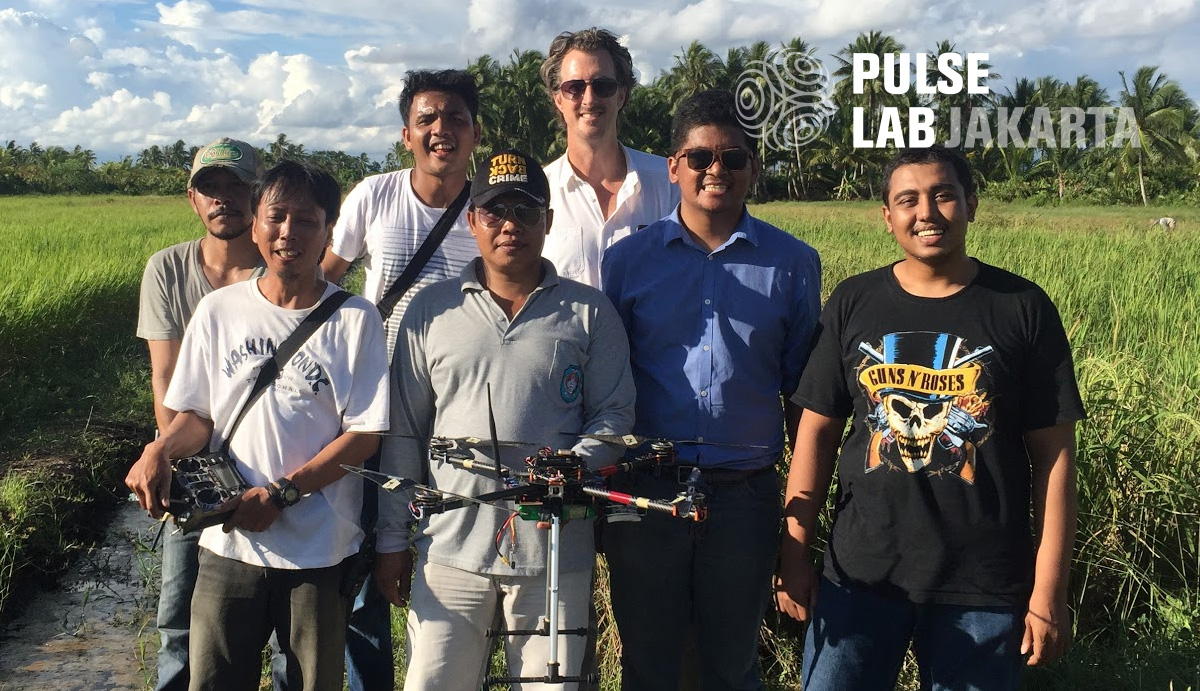
Start:
2015
End:
2015
|
2015
UAV-Based MappingLocation: - 
The Swandiri Institute collaborated with the Iban Community in West Kalimantan, using UAVs to collect data on community rice fields. The resulting spatial data provides accurate vegetation information, helping prevent harvest failures.
<p>Pulse Lab Jakarta and Swandiri Institute in West Kalimantan demonstrated that unmanned aerial vehicle (UAV or drone) mapping could support cheaper and more effective treatment of pests and disease in order to improve rice yields. The ability of UAVs to hover low over fields of crops with sensoring devices promises benefits for individual farmers and their communities. As part of the project, drones were equipped with a modified infrared camera and software that calculated the Normalised Difference Vegetation Index (NDVI) to analyze photosynthetic levels in crops, a proxy indicator of crop health. </p>
<p>The project confirmed the potential of the model both in terms of usability and cost. For example, the Agricultural Office of the North Kayong District is adding drone mapping to its budget for next year and the Agriculture Faculty of Tanjungpura University is developing a “drone-pangan” (drones for agriculture and food) programme. In addition, Gemawan, a local NGO, which has been lobbying on behalf of cooperatives of farmers, is replicating the approach under its food sovereignty programme.</p>
<p>The project also uncovered interest in using drone mapping for other aspects of community development. To access funds for development under the Village Law, villages are mandated to implement a clear village boundary legalized through Bupati Decree. Alongside the use of drones for agriculture, Pulse Lab Jakarta produced community maps which included data on infrastructure, community borders and resource-use concessions.</p>
<p>As a result of the project pilot, Sungai Itik village budgeted for its own UAV aerial mapping. The Swandiri Institute won a coveted GovInsider award, presented in Singapore on 28 September 2016, as one of five outstanding drone for development projects.</p>
Domain
Urban and Regional Dynamics
Environment and Climate
SDG
No Poverty
Zero Hunger
Data
Drone Imagery
Partners
The Swandiri Institute
Iban Community at Menua Sadap Longhouse
|

Start:
2015
End:
2015
|
2015
Early Warning for Waterborne DiseasesLocation: - 
A collaboration between Universitas Padjadjaran and Radboud University analyzed social media and government statistics to predict waterborne disease outbreaks following floods. The innovative use of social media as a disease outbreak prediction tool facilitates a quicker local government response.
<p>Using the Data Innovation Mini-Grant, Universitas Padjadjaran and Radboud University conducted analysis of the data from social media and government statistics on floods which could help predict waterborne disease outbreaks. The analysis found a relationship between floods and dengue fever and diarrhea. The project uses Twitter API to collect tweets with relevant keywords and geocoding of the tweets matched with the Open Street Map database to obtain coordinates. This type of data gathering using a specific type of clas- sification will provide convenient access to predictions on disease outbreaks through social media. By understanding the correlations, local government will be able to react faster in the case of disease outbreaks.</p>
Domain
Strategic Exploration
Public Health and COVID-19
SDG
Good Health and Well-being
Data
Social Media
Open Street Map
Partners
Universitas Padjadjaran
Radboud University
|
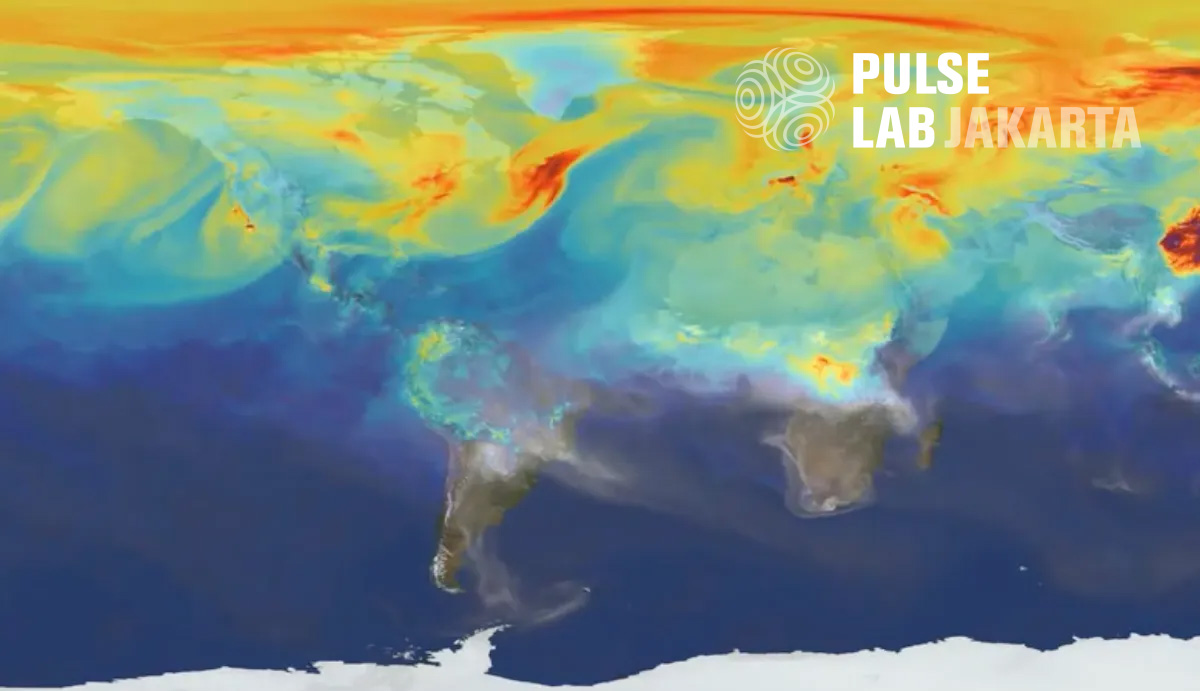
Start:
2016
End:
2016
|
2016
Combining Multiple Data Sources to Track The Impact of El NiñoLocation: Indonesia 
Working with the World Food Programme and FAO, PLJ utilized multiple data sources to track changes in environmental conditions and their impact on food security in Indonesia. The tool, incorporated into the Situation Room of the Executive Office of the President, offered insights into baseline data, climate layers, and impact layers, effectively contributing to the OECD OPSI's innovations library.
<p>PLJ worked closely with the World Food Programme (WFP) and the Food and Agriculture Organisation (FAO) to utilise multiple data sources to track changes in environmental conditions and its subsequent impact on food security in Indonesia. The original prototype for the Vulnerability Analysis Monitoring Platform for Impact of Regional Events (VAMPIRE) had three main layers: baseline data, climate layer, and impact. The baseline layer vi- sualises SUSENAS data from BPS and food insecurity indices based on WFP's household surveys. The climate layer shows rainfall anomaly and vegetation health index. The impact layer shows weekly price indices and priority areas to monitor for drought impact. The platform was installed in the Situation Room of the Executive Office of the President (KSP) in June this year and our team have subsequently worked together with KSP's technical team to develop additional features for the platform. This includes options for KSP's administrator to add new datasets and integrate the platform with other satellite-based imagery services; a fully-automated process for analysing rainfall anomaly; and a new function to accommodate multiple sources of food or commodity prices. This platform, along with Haze Gazer, has been included in the innovations library of the OECD Observatory for Public Sector Innovation (OPSI).</p>
Domain
Environment and Climate
SDG
Zero Hunger
Climate Action
Data
SUSENAS
Food Security Data
Goverment Statistics
Climate Data
Partners
WFP
FAO
|

Start:
2016
End:
2016
|
2016
Alternative Indicators for The Sustainable Development GoalsLocation: Indonesia 
PLJ initiated an online library documenting the varied uses of digital footprints as proxies to gauge progress towards Sustainable Development Goals. It covers diverse areas like food security, environmental monitoring, socioeconomic status, market prices tracking, public health, travel patterns, and voting behavior.
<p>PLJ started the development of an online library documenting the various uses of digital footprints as proxies that could be used to measure progress against the Sustainable Development Goals. The library includes links to research articles on proxies for food security, environmental monitoring, tracking market prices, socio-economic status, public health, travel patterns, and voting behaviour.</p>
Domain
Strategic Exploration
SDG Data
-
Partners
-
|

Start:
2016
End:
2016
|
2016
Mapping of UN Country Team Activities in IndonesiaLocation: Indonesia 
In collaboration with the UN Resident Coordinator's office and UNIDO, PLJ created an online platform mapping UN projects in Indonesia and their alignment with Sustainable Development Goals. This aids the UN Country Team in tracking and categorizing their activities based on the Goals.
<p>Working with the office of the UN Resident Coordinator and UNIDO, PLJ developed an internal online platform that maps out the geographical distribution of UN projects and activities in Indonesia, as well as their alignment with the Sustainable Development Goals. The platform assists the UN Country Team to take stock of their activities in Indonesia and classify these based on the Sustainable Development Goals.</p>
Domain
Strategic Exploration
SDG Data
UN In Indonesia
Partners
UNIDO
UN Resident Coordinator
|
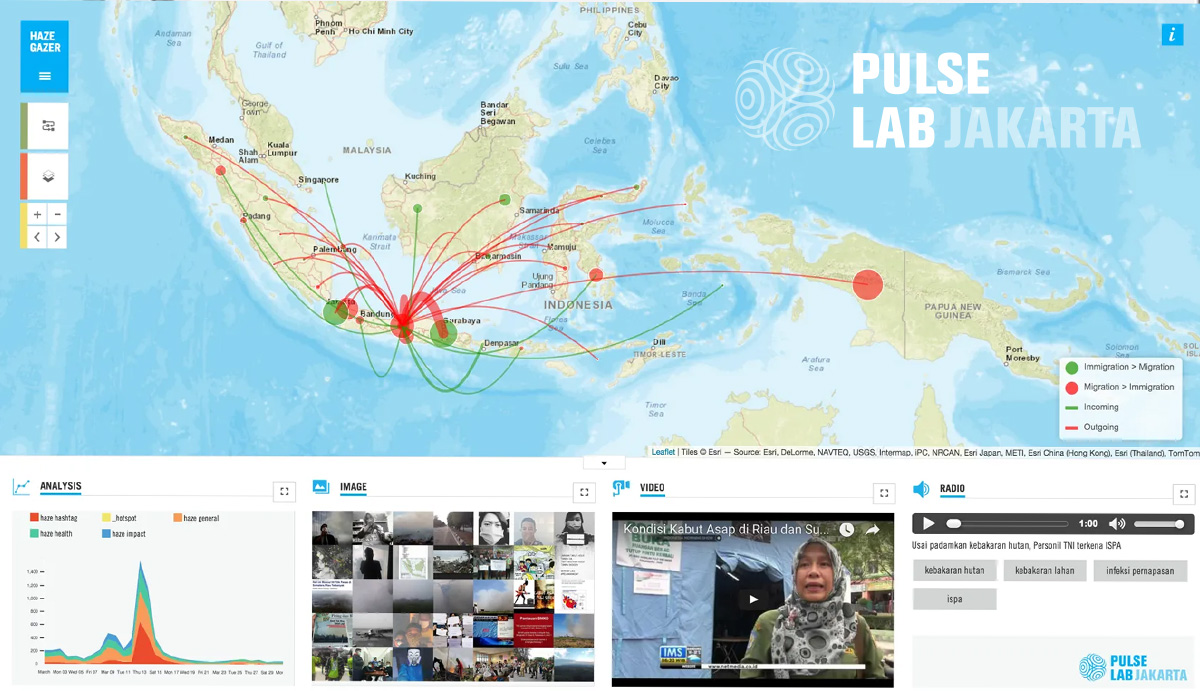
Start:
2016
End:
2016
|
2016
Combining Multiple Data Sources for HazeLocation: Indonesia 
Building on 2015 research, PLJ devised Haze Gazer, a web-based decision support system, providing insights into haze crisis dynamics for disaster management authorities. The platform uses multiple data sources, including satellite imagery and social media, offering real-time insights for improved disaster management.
<p>Building on the research conducted in 2015, PLJ developed Haze Gazer, a web-based decision support system that provides insights on haze crisis dynamics and local response strategies for disaster management authorities. The platform analyses multiple sources of data, visualises the insights generated, and provides a convenient user interface for disaster management practitioners. The platform combines hotspot information from satellite imagery with groundlevel visual insights from social media and citizen journalism videos to provide real-time insights on what field conditions are like. It also includes analysis of citizen voices from a number of sources, including citizen feedback platforms, which can help with early identification of impact. Haze Gazer was shortlisted for the Harnessing Data for Resilience Recognition Award by USAID, as one of the five finalists of the "early innovation" category.</p>
Domain
Environment and Climate
SDG
Good Health and Well-being
Life on Land
Data
Social Media
Satellite Imagery
Partners |
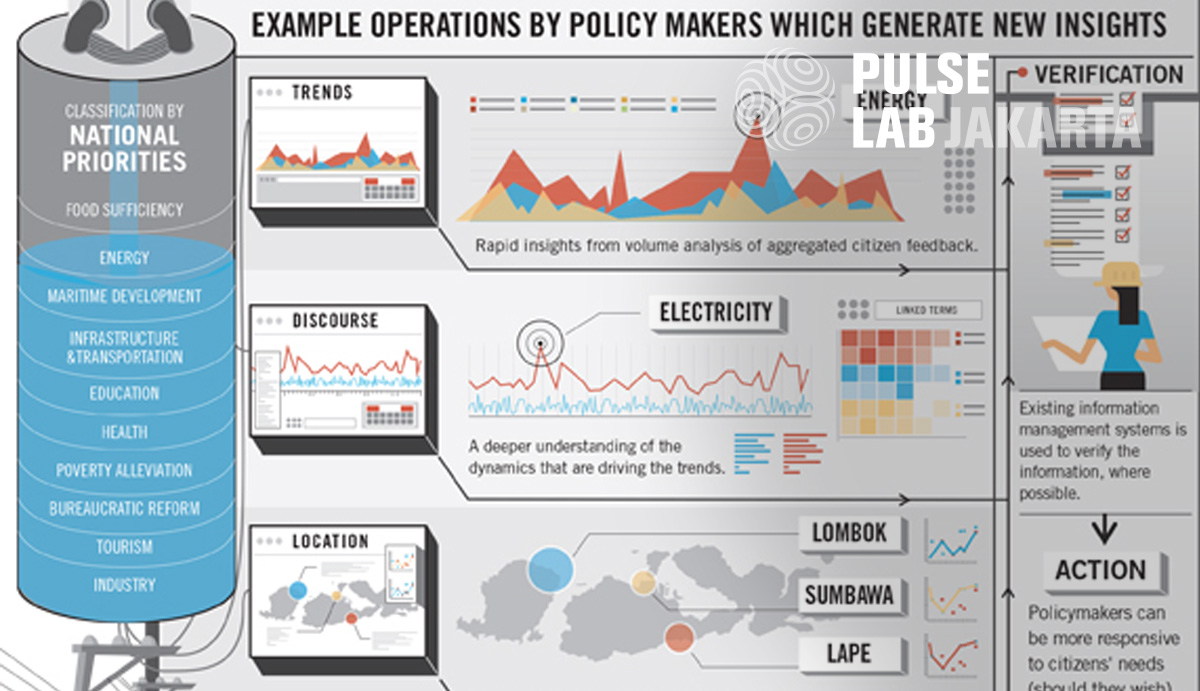
Start:
2016
End:
2016
|
2016
National Dashboard - Aggregated Data from Citizen FeedbackLocation: Indonesia 
PLJ completed a National Dashboard prototype, integrating social media conversations with LAPOR, Indonesia’s national complaint handling platform, to provide user-defined taxonomy insights. The tool was adopted by two national institutions: Bappenas and the Executive Office of the President KSP.
<p>A prototype of the National Dashboard has been completed and shared with two national government institutions: Bappenas and the Executive Office of the President (KSP). Our team developed tools to capture conversations in social media and combined these with Indonesia's own national complaint handling platform (LAPOR!) to provide insights based on user-defined taxonomy. In KSP, it is used to analyse and aggregate incoming LAPOR! data, and it has been included in LAPOR!'s public website.</p>
Domain
Strategic Exploration
SDG
Industry, Innovation, and Infrastructure
Peace, Justice, and Strong Institutions
Partnership for The Goals
Data
Social Media
Crowdsourced Data
Partners
KSP
|
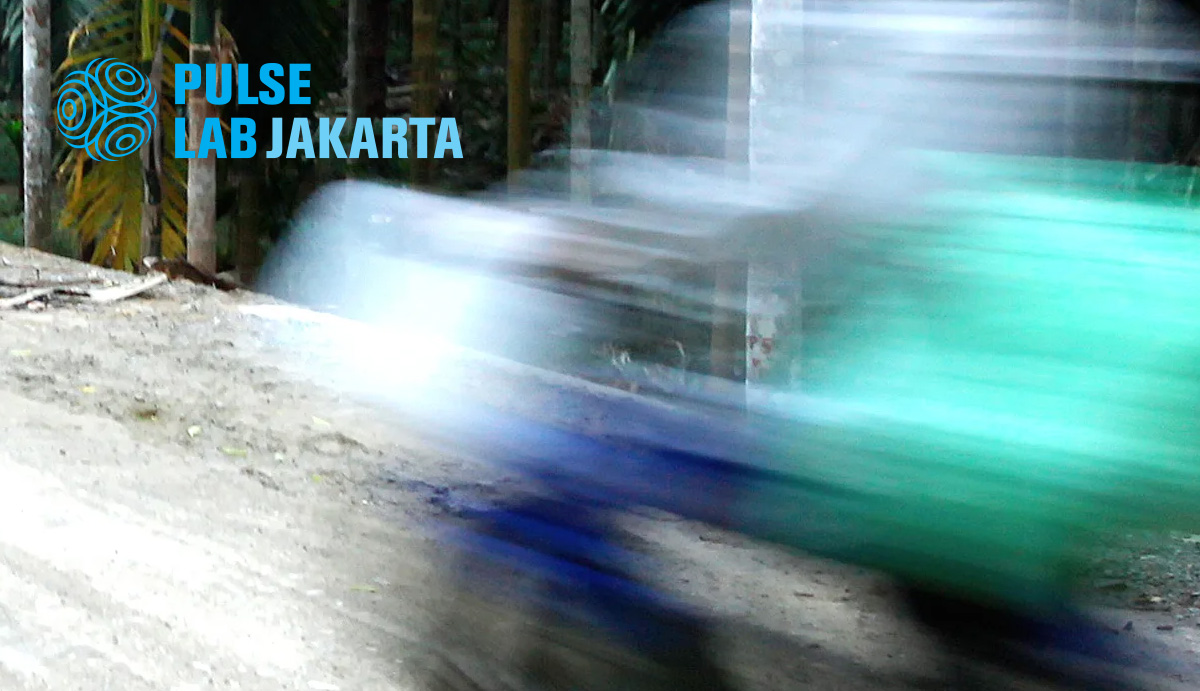
Start:
2016
End:
2016
|
2016
Crowdsourcing Community Verification of Road InfrastructureLocation: Indonesia 
PLJ, in partnership with the Australian-funded Indonesia Infrastructure Initiative (IndII) and Premise, used crowdsourced information to verify completion of infrastructure projects. The pilot demonstrated the potential of community-generated data for assessing infrastructure work quality, indicating cost-effective project verification possibilities.
<p>PLJ explored whether crowdsourcing information from citizens, which worked well in tracking real-time food price dynamics, would also work for verifying the completion of infrastructure projects. Working with the Australian-funded Indonesia Infrastructure Initiative (IndII) and the data crowdsourcing firm Premise, we piloted this approach in roads constructed with IndII support in Lombok, Nusa Tenggara Barat. Leveraging Premise's network of volunteers, we deployed contributors to locations that corresponded to areas where specific road maintenance had been conducted. Results of the pilot indicated that beneficiary communities could generate reliable data and consistent observations as to the quality of road infrastructure works. The potential for applying this method to reduce the costs of project verification certainly exists, but realising these savings would depend on the model adopted for scale-up.</p>
Domain
Trade and Competitiveness
Urban and Regional Dynamics
SDG
Industry, Innovation, and Infrastructure
Data
Qualitative Data
Crowdsourced Data
Partners
Indonesia Infrastructure Initiative (IndII)
|

Start:
2016
End:
2016
|
2016
Translator GatorLocation: Indonesia 
PLJ introduced Translator Gator, a crowdsourcing game translating English development keywords into Indonesian and other local languages. The platform amassed over 109,000 contributions, creating a substantial dataset for linguistic studies and potential platform replication for various fields.
<p>Translator Gator is an online game that PLJ launched to crowdsource the translation of a series of development keywords from English into Indonesian, as well as other local languages such as Bahasa Jawa, Sunda, Minang, Bugis and Melayu. PLJ launched the game in January, and by the end of the first phase in May, we received over 109,000 user contributions from hundreds of Indonesian players across the country. We also conducted surveys and in-depth interviews, to better understand motivations and behaviors of users as well as improve the Translator Gator platform. As a result of this, we now have a rich dataset for a set of deeper linguistic studies, for instance, an investigation into Indonesian national and local languages or a study on linguistic behavioral patterns. We plan to work with computational linguistic experts to see what insights can further be gained from this dataset. We have also received requests from a number of agencies to replicate the Translator Gator platform for other areas of work. Since Translator Gator can be used to crowdsource translations for any language, in 2017 we will be exploring the application of this platform outside of Indonesia.</p>
Domain
Strategic Exploration
SDG Data
Crowdsourced Data
Partners |
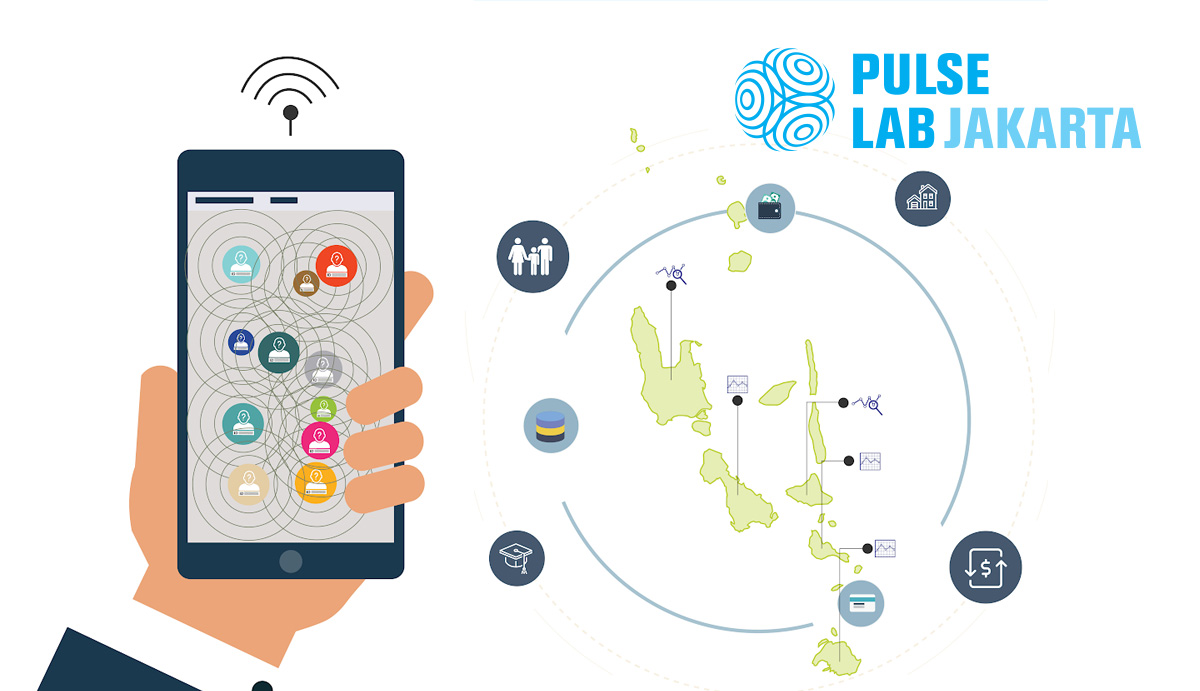
Start:
2016
End:
2016
|
2016
Big Mobile Data for DevelopmentLocation: Indonesia 
PLJ partnered with Digicel Asia Pacific in 2016 to study the impact of weather events on Vanuatu’s socioeconomic fabric, utilizing mobile phone data as proxy indicators. The ongoing research promises positive initial findings.
<p>Pulse Lab Jakarta started a collaboration with Digicel Asia Pacific in 2016 to understand the impact of recent weather events on the social and economic fabric of Vanuatu, as well as the interconnectedness of communities and market structure. Research is ongoing but initial findings are encouraging on the use of mobile phone data as proxy indicators for education levels, household characteristics and expenditure in Vanuatu.</p>
Domain
Disaster Response and Humanitarian Action
SDG
Sustainable Cities and Communities
Data Partners
Digicel Asia Pacific
|
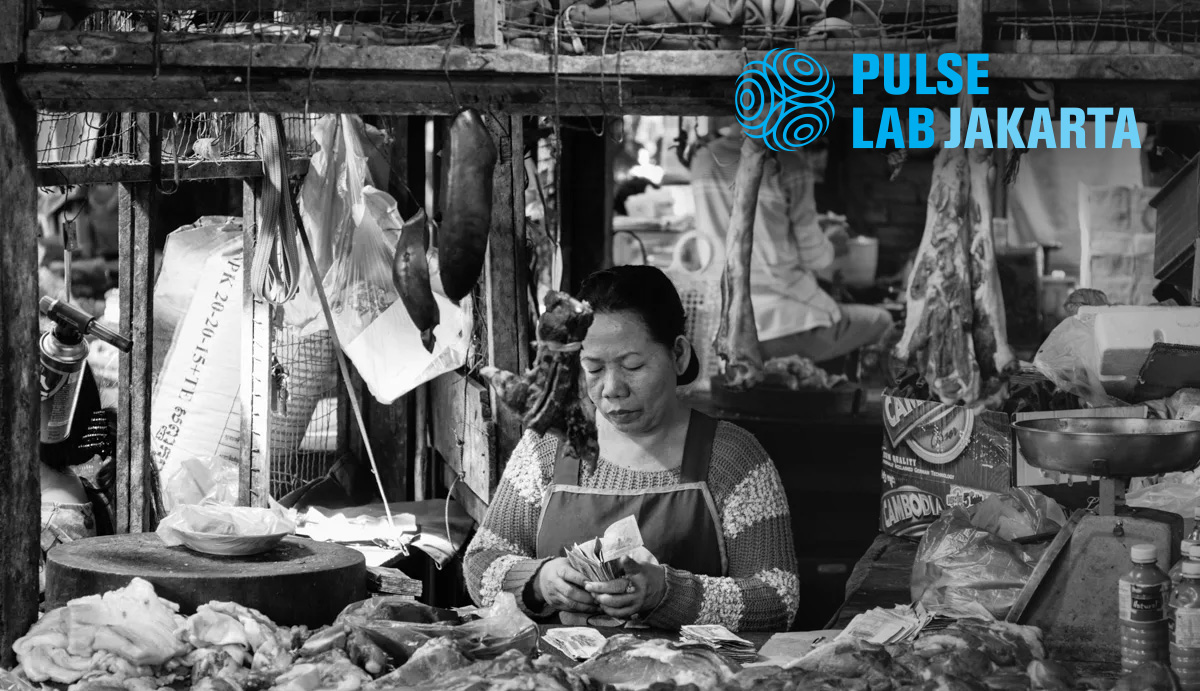
Start:
2016
End:
2016
|
2016
Financial InclusionLocation: Cambodia 
PLJ highlighted the potential of big data analytics in financial inclusion during a presentation to Queen Maxima of the Netherlands. Collaborating with UNCDF, they utilized the SHIFT program's datasets combined with big data analytics to understand financial services usage, particularly among women, in the ASEAN region.
<p>PLJ was pleased to be part of the delegation presenting to H.E. Queen Maxima of the Netherlands, the United Nations Secretary General's Special Advocate for Inclusive Finance for Development during her visit to Indonesia in 2016. PLJ presented the opportunities that big data analytics can bring to financial inclusion by bringing more optimisation and evidence based decision making. On financial inclusion, PLJ is collaborating with UNCDF to utilize the Shaping Inclusive Finance Transformation (SHIFT) program's existing datasets combined with big data analytics to undertake deeper analysis in terms of financial services usage, particularly among women in the ASEAN region. The project analysed customer savings and loan data from four Financial Service Providers (FSPs) in Cambodia to understand the factors that affect savings and loans mobilization and how usage of these products explains economic issues in Cambodia. Although women and men in Cambodia have an equal access to financial services, women have a lower level of financial service usage and the first phase of analysis showed that for all FSPs, women had lower average loans and savings mobilized. PLJ is currently conducting a second phase of analysis to gain further insights into women's financial service usage and broader socioeconomic issues.</p>
Domain
Poverty, Financial Inclusion, and Economic Development
Women's Empowerment and Gender Equality
SDG
No Poverty
Data
Microfinance Data
Partners
UNCDF
|
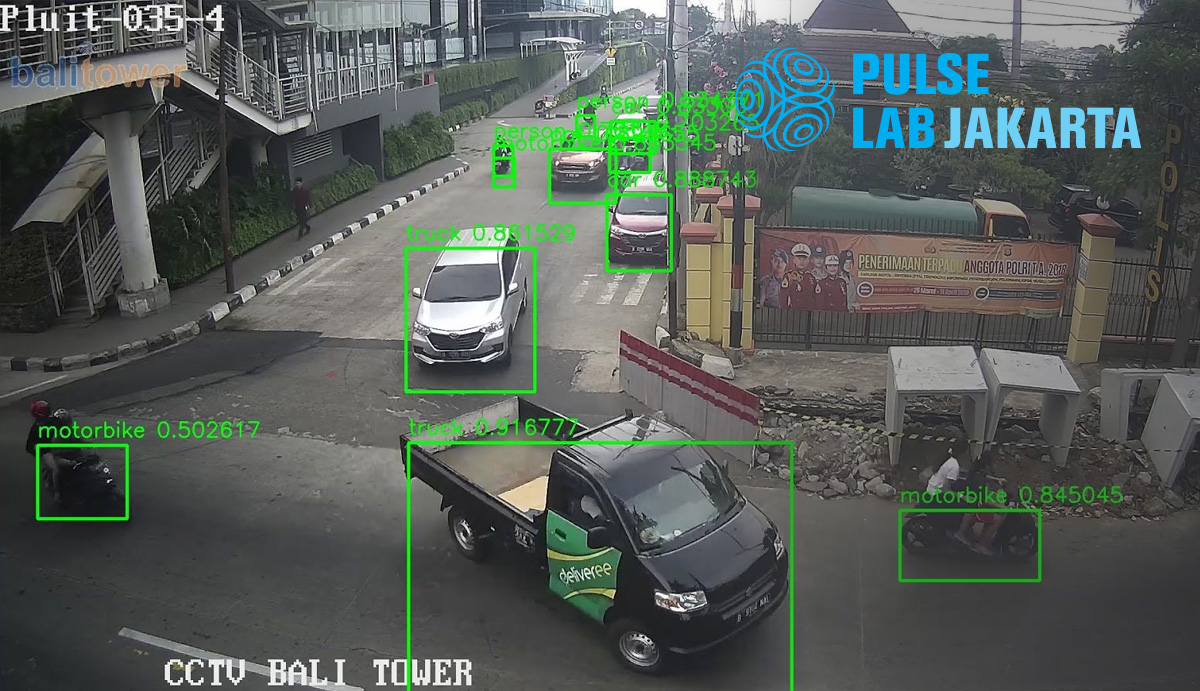
Start:
2016
End:
2016
|
2016
Analysis of Transportation DataLocation: Indonesia 
PLJ collaborated with Jakarta Smart City to improve transport planning through real-time data analytics, utilizing bus location data, passenger information, and traffic data to identify bottlenecks and evaluate service usage for the TransJakarta bus system. This led to operational improvements in TransJakarta's services.
<p>Pulse Lab Jakarta collaborated with Jakarta Smart City to enhance transport planning and operational decisionmaking within the Jakarta Government through real-time data analytics. Using new sources of information such as bus location data, passengers' boarding information and real-time traffic information, the project mapped traffic patterns and service usage for the TransJakarta bus system. Data analysis enabled PLJ and Jakarta Smart City to identify bottleneck locations, map origin-destination trends and determine waiting times to gauge the need for new routes and improved transit facilities. The collaboration contributed to improvements in TransJakarta's operations and enhanced capacity within Jakarta Smart City. We included 48% of TransJakarta passengers in the origin destination pair analysis. Of these, early findings indicate that only 20% use TransJakarta as a regular commuter (i.e. home-officehome) transportation. Around 24% only use TransJakarta to access the office from home, and conversely, around 15% use TransJakarta only as a means to get home. We have also tried to identify which stations are problematic, such as the stations that have long queues, long waiting times and are most crowded. Drawing from the project findings, TransJakarta has made a number of targeted changes and improvements to the bus service, such as deploying more officers and barriers to secure dedicated lines in typically congested areas and adding buses on certain routes. TransJakarta is also planning to conduct a more detailed passenger survey based on the insights uncovered from passenger commuting behaviour.</p>
Domain
Urban and Regional Dynamics
SDG
Industry, Innovation, and Infrastructure
Sustainable Cities and Communities
Data
Public Transportation
Partners
Jakarta Smart City
|
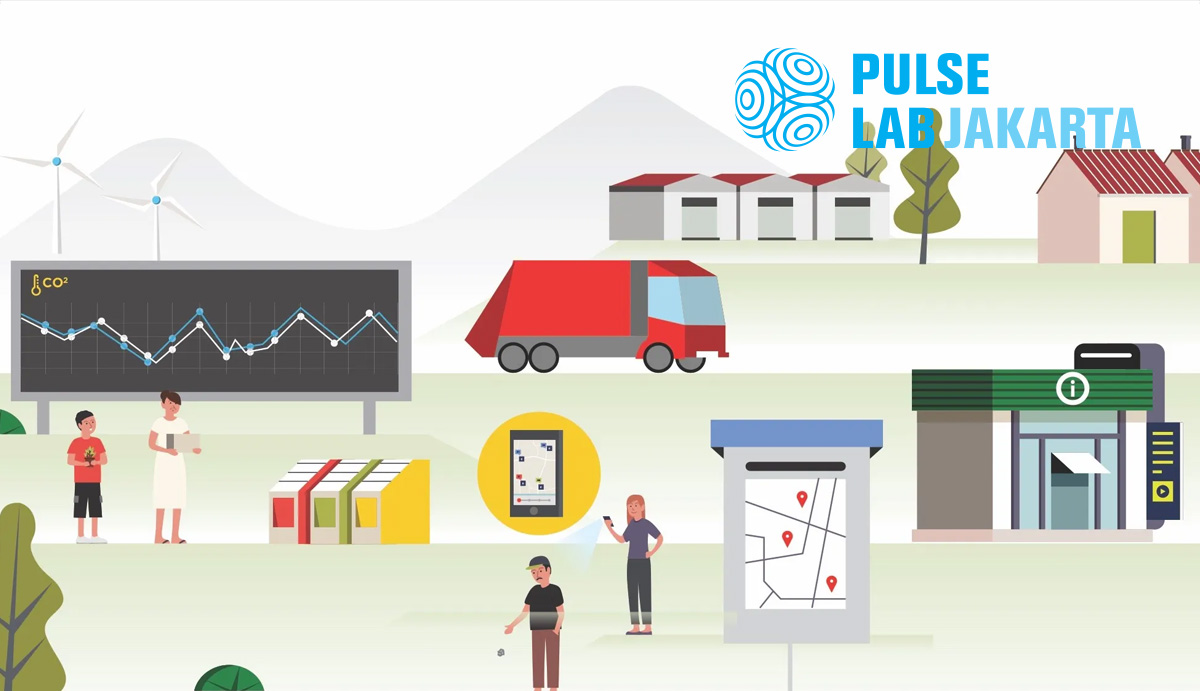
Start:
2016
End:
2016
|
2016
Big Ideas CompetitionLocation: Indonesia, Malaysia, South Korea, Cambodia, Singapore, Philippines, Laos, Brunei, Vietnam, Thailand, Myanmar, Timor-Leste 
PLJ co-hosted the 2016 Big Ideas Competition, calling for data-driven solutions for sustainable cities. The competition attracted 271 proposals from ASEAN member countries and the Republic of Korea. The winning ideas were innovative and focused on urban sustainability.
<p>The 2016 Big Ideas Competition for Sustainable Cities and Urban Communities was organised by the National Information Society Agency (NIA), Korea Association for ICT promotion (KAIT), and UNDP Asia and the Pacific, and hosted by Pulse Lab Jakarta and the Republic of Korea Ministry of Science, ICT and Future Planning (MSIP). It was also supported by United Nations Volunteers and the Korea Big Data Alliance. The competition called for citizens of ASEAN member countries and the Republic of Korea to submit ideas on data -driven solutions to advance basic service delivery, sustainable transport & energy, resilience to natural disasters & climate change, and harmonious urban environments. Announced in May 2016, the call for ideas managed to attract 271 proposals from across ASEAN member states and the Republic of Korea. The Big Ideas evaluation team chose four main winners and nine country winners. Winning ideas included a platform that allows citizens to view queuing times on public transport and a mapping of accessible pedestrian routes for the visually impaired.</p>
Domain
Urban and Regional Dynamics
Strategic Exploration
SDG
Sustainable Cities and Communities
Data
Qualitative Data
Crowdsourced Data
Partners
National Information Society Agency (NIA)
Korea Association for ICT promotion (KAIT)
UNDP Asia and the Pacific
|
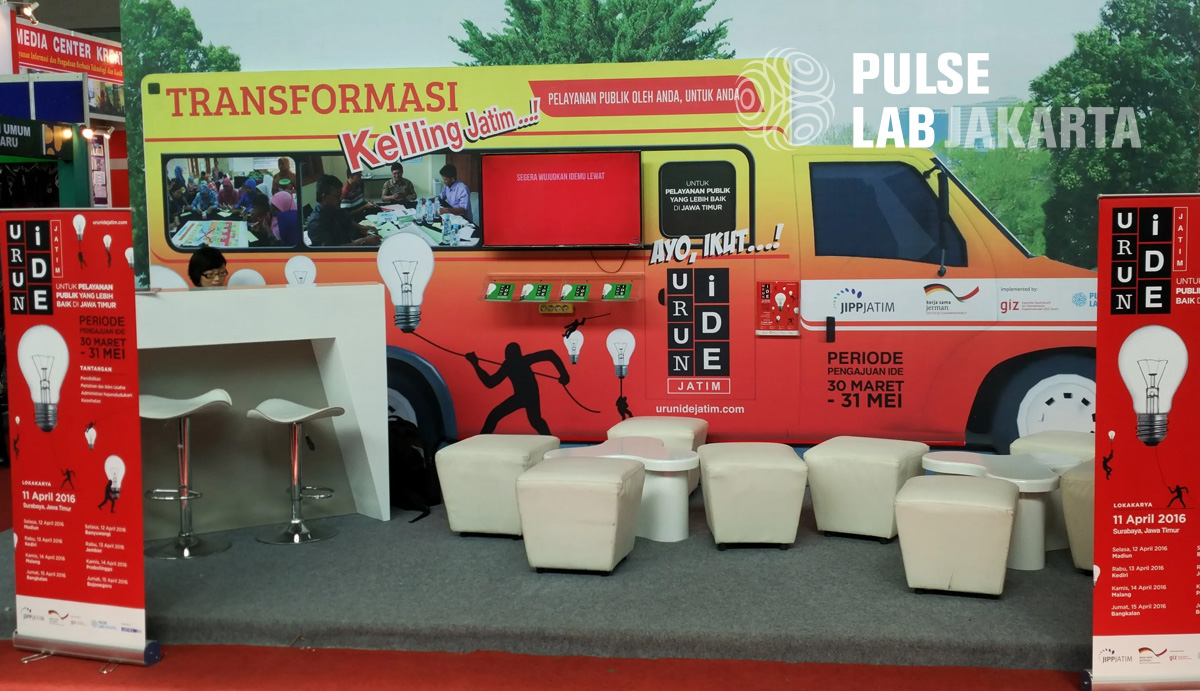
Start:
2016
End:
2016
|
2016
East Java Ideas Challenge - Urun Ide JatimLocation: - 
PLJ, in collaboration with GIZ's TRANSFORMASI program and the East Java Network for Public Service Improvement, organized Urun Ide Jatim, an innovation challenge for improving public services in East Java, resulting in several promising solutions.
<p>PLJ worked with GIZ's TRANSFORMASI program and the East Java Network for Public Service Improvement (JIPP-Jatim) to hold Urun Ide Jatim, an innovation challenge to improve public services in East Java. Open to government institutions, civil society organisations, and community groups, this innovation challenge called for solutions to address issues in East Java's education and health services, civil registry, and business registration processes. Winners of the challenge included: "Pemburu Bumil Risti", a program that partners with local vegetable vendors to identify the location and condition of expectant mothers with high risk pregnancy; "SuperAgro", an application that allows farmers to access a database of various factors related to crop farming and marketing; the replication and enhancement of "Kakekku Datang", a program which aims to achieve an integrated single identity database in Jawa Timur by proactively updating family card data.</p>
Domain
Urban and Regional Dynamics
Women's Empowerment and Gender Equality
SDG
Sustainable Cities and Communities
Data
Qualitative Data
Partners
GIZ’s TRANSFORMASI program
the East Java Network for Public Service Improvement (JIPP-Jatim)
|
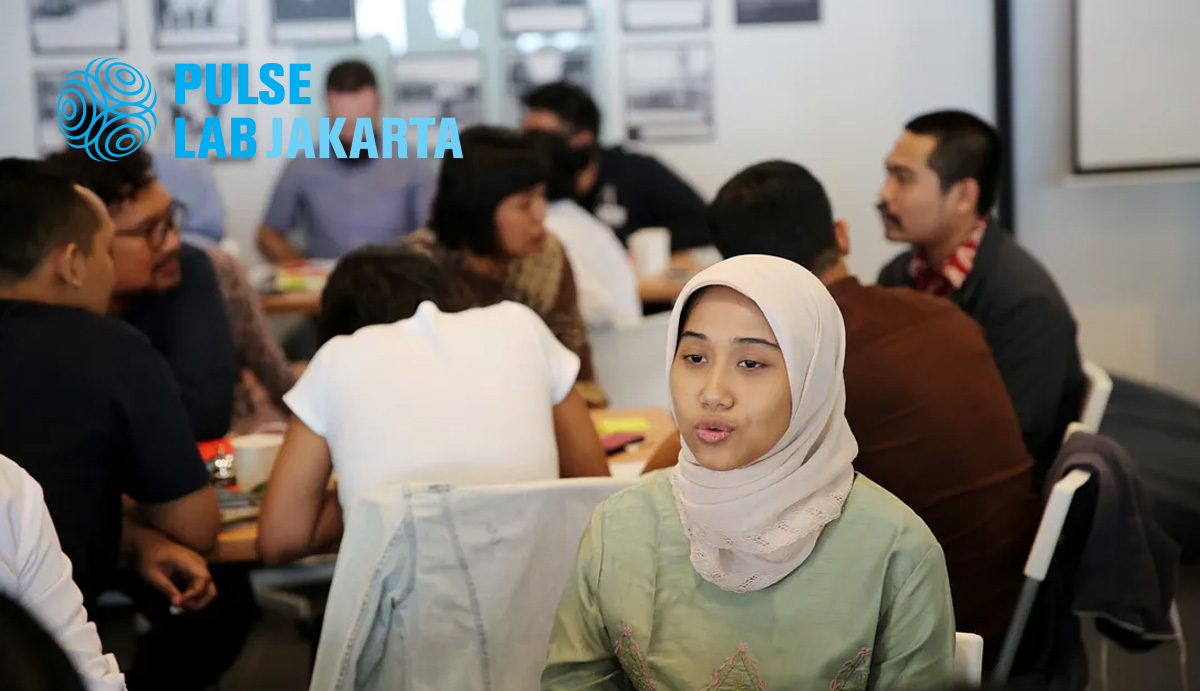
Start:
2016
End:
2016
|
2016
Co-Design for ChangeLocation: Indonesia 
PLJ organized the Codesign for Change workshop, using a human-centered design approach to address the haze crisis, in collaboration with UNICEF.
<p>Pulse Lab Jakarta organised Co-design for Change, a workshop that invites stakeholders from various industries and sectors to gather and understand the impact and possible opportunities in solving the haze crisis. This initiative is a collaboration between Pulse Lab Jakarta and UNICEF, with research materials gathered from our own research initiatives, combined with findings from UNICEF and RCA (Reality Check Approach). The workshop was conducted over a 2-day period and utilised human-centred design approach to translate findings into actionable opportunities.</p>
Domain
Disaster Response and Humanitarian Action
Environment and Climate
Strategic Exploration
SDG
Good Health and Well-being
Gender Equality
Data
Qualitative Data
Partners
UNICEF
|
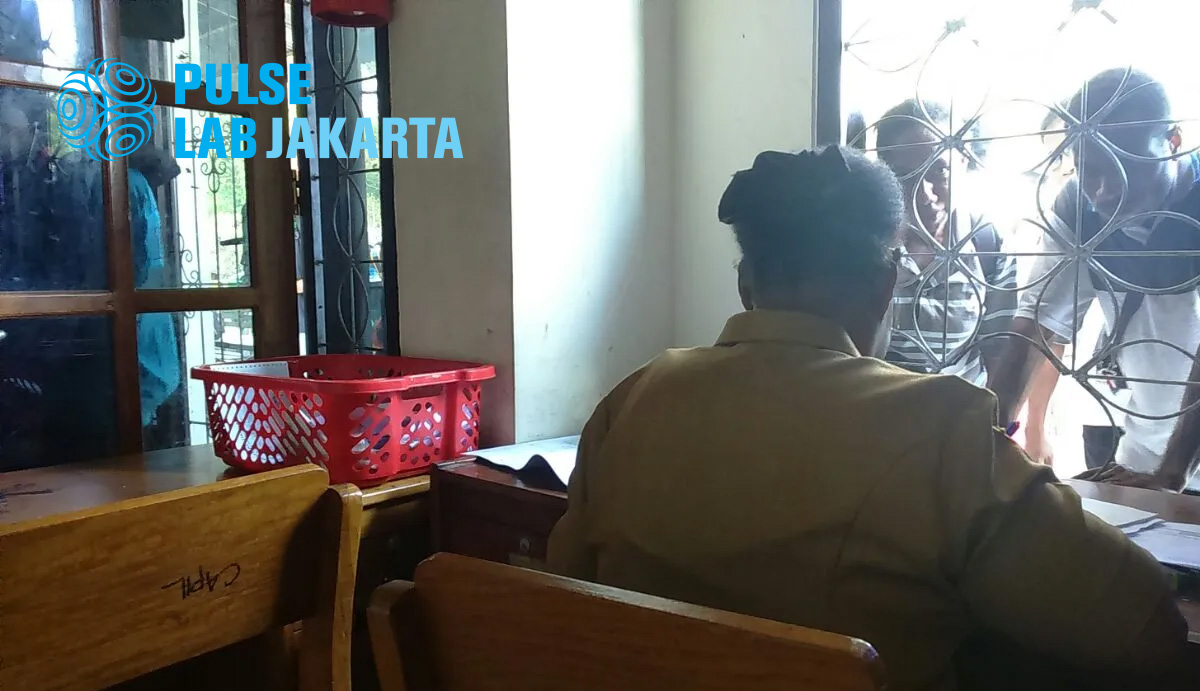
Start:
2016
End:
2016
|
2016
Sense-Making of Data at Village and Subdistrict LevelLocation: - 
PLJ, in partnership with KOMPAK's LANDASAN team, conducted a joint field mission in Papua to examine the data systems behind frontline services, leading to potential areas of collaboration for future projects.
<p>PLJ conducted a joint field mission in April with KOMPAK's LANDASAN team to look at the data and information systems behind frontline services in Papua. The mission looked at civil registry services, village information systems, as well as schools and health clinics. As a result of the mission, we have identified two areas of potential collaboration with the future LANDASAN project, i.e. developing a supportive data ecosystem around an information dashboard for subdistricts (kecamatan), and improving user experience with civil registry services. A follow-up mission in October where we tested low-fidelity prototypes of the kecamatan dashboard allowed us further insights on what kinds of information would be most useful at the kecamatan level. We look forward to working with the KOMPAK team on this initiative once LANDASAN is up and running.</p>
Domain
Urban and Regional Dynamics
SDG
Good Health and Well-being
Quality Education
Peace, Justice, and Strong Institutions
Data
Qualitative Data
Administrative Data
Partners
KOMPAK’s LANDASAN team
|

Start:
2016
End:
2016
|
2016
Harnessing Citizens’ Ideas for Transportation SolutionsLocation: - 
In collaboration with UNDP, DisHub Makassar, and BaKTI, PLJ held a co-design workshop to devise solutions for public transportation issues in Makassar city.
<p>Pulse Lab Jakarta collaborated with UNDP, the Transportation Office of Makassar City (DisHub Makassar) and BaKTI to organise a co-design workshop aimed at finding new solutions to tackle public transportation issues in Makassar city. We extended the partnership between UNDP, BaKTI and DisHub Makassar beyond the workshop to actually test and iterate the development of the best prototypes. This incubation process was overseen by the Mayor of Makassar himself.</p>
Domain
Urban and Regional Dynamics
SDG
Sustainable Cities and Communities
Data
Qualitative Data
Partners
UNDP
the Transportation Office of Makassar City (DisHub Makassar)
BaKTI
|

Start:
2016
End:
2016
|
2016
Innovation Bootcamp - Education Services in JenepontoLocation: - 
PLJ facilitated a design thinking workshop with GIZ's TRANSFORMASI program to improve education services in the Jeneponto district, informed by user research insights.
<p>Working with GIZ's TRANSFORMASI program, PLJ team members facilitated a workshop to introduce design thinking for the provision of education services in the district of Jeneponto. The structure of the workshop was informed by previous user research conducted by PLJ. Insights from the user research and the workshop are captured in Pulse Stories 3: Too Cool for School.</p>
Domain
Poverty, Financial Inclusion, and Economic Development
Urban and Regional Dynamics
Strategic Exploration
SDG
Good Health and Well-being
Quality Education
Reduced Inequality
Data
Qualitative Data
Partners
GIZ’s TRANSFORMASI program
|

Start:
2016
End:
2016
|
2016
A Closer Look at Business Registration in IndonesiaLocation: Indonesia 
PLJ partnered with the Australia Indonesia Partnership for Economic Governance to study business registration processes in Indonesia, focusing on entrepreneurs' experiences, revealing frustrations about the process' opacity and length.
<p>Pulse Lab Jakarta teamed up with the Australia Indonesia Partnership for Economic Governance (AIPEG) to conduct a study on how business registration works in Indonesia. While previous studies on business registration mostly focused on the administrative parts of the system, we focused on the experience of entrepreneurs as they navigate the business registration process. Although the process of registering a business is relatively complex - requiring entrepreneurs to liaise with at least four different government units - we found that what frustrated people was not the complexity, but the opacity of the process and the amount of time it takes to complete this. Our insights are captured in Pulse Stories 4: Let's Get Down to Business.</p>
Domain
Trade and Competitiveness
SDG
Decent Work and Economic Growth
Industry, Innovation, and Infrastructure
Reduced Inequality
Data
Qualitative Data
Partners
Australia Indonesia Partnership for Economic Governance (AIPEG)
|
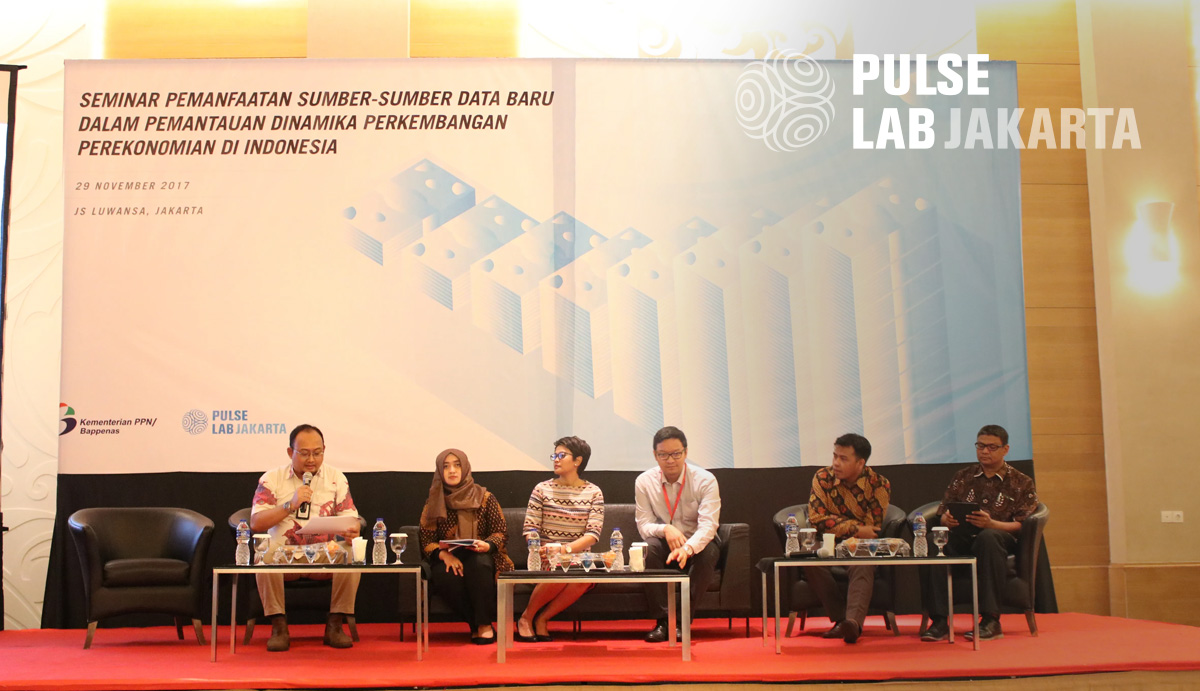
Start:
2017
End:
2017
|
2017
Building Demand for Data Analytics Through Collaborative ResearchLocation: Indonesia 
In collaboration with the Indonesian Ministry of National Development Planning, PLJ hosted a seminar showcasing research on using new data sources and advanced analytics to monitor Indonesia's economic dynamics, prompting discussions on optimal use of Big Data analytics.
<p>We teamed up with our main government counterpart, the Indonesian Ministry of National Development Planning (Bappenas), to host a seminar in 2017 showcasing our collaborative research on using new data sources and advanced data analytics to monitor the dynamics of Indonesia’s economy.</p>
<p>During the seminar, four different Directorates presented the results of their research to a broader Bappenas audience. PLJ’s role in this forum was to moderate the discussion and answer technical questions on data analytics. The bulk of the discussion, however, was between Bappenas sector experts, technical advisors, and policy analysts on how best to utilise new data sources to complement existing analysis on upcoming national planning priorities.</p>
<p>In addition to discussing the benefits of integrating different data sources, it was also good to observe a lively debate around the flaws and limitations of some of the approaches. Several members of the audience also raised the point that, although concepts like perception analyses can be useful if used appropriately, optimal use of Big Data analytics means looking beyond social media data and thinking critically about which data sources would yield the best insights.</p>
Domain
Strategic Exploration
SDG Data
Qualitative Data
Partners
Bappenas
|
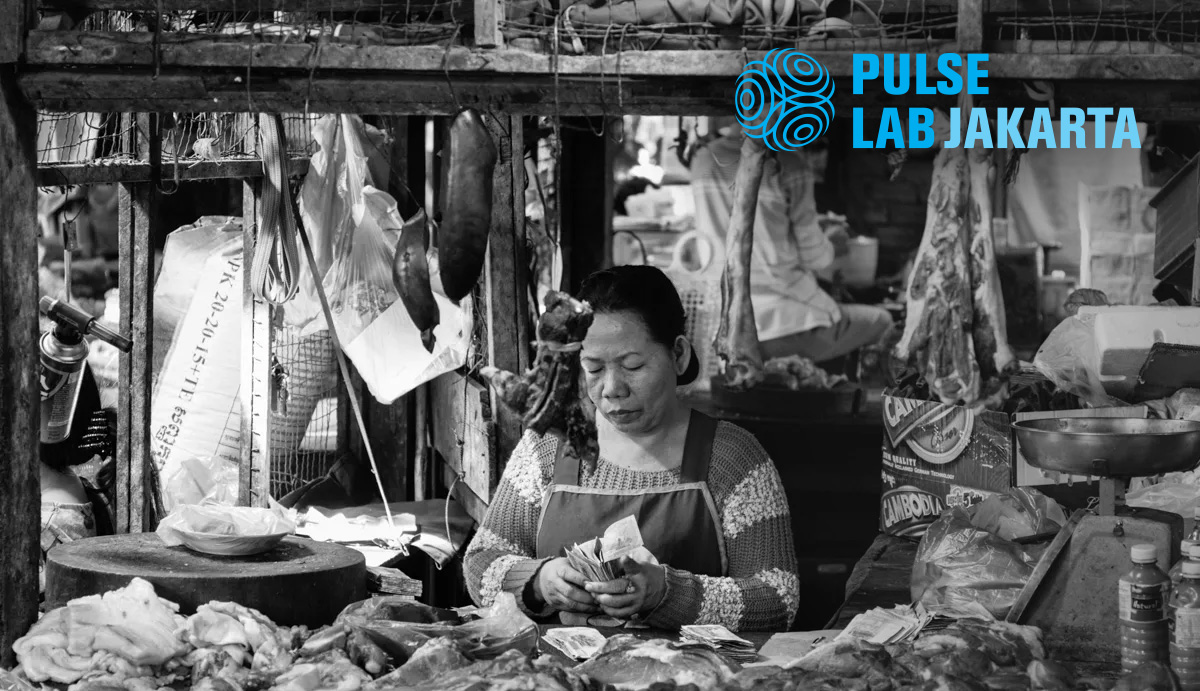
Start:
2017
End:
2017
|
2017
The Gender Gap in Financial InclusionLocation: Cambodia 
PLJ and the UN Capital Development Fund's SHIFT Programme analyzed 54 million anonymized financial records from 2.6 million customers in Cambodia to examine financial service usage patterns. The data revealed that while both men and women have equal access to credit and savings services, the usage patterns and amounts for women were lower. The research findings emphasized the need to tailor individual loan products better to women's needs and promote term deposits over savings accounts.
<p>Globally, there has been great progress in advancing financial inclusion. However, there remains a gender gap in account ownership, savings, credit, and payments behaviour. The UN Capital Development Fund (UNCDF) SHIFT Programme and PLJ teamed up to support four financial service providers and the regulator in Cambodia in analysing anonymised financial records. The research project has curated around 5.4 million anonymised savings and loan records from 2.6 million customers to examine savings account dormancy and borrower exit, and to improve financial service usage. Our data analysis suggests that while men and women have equal access to credit and savings services in the region, the actual usage patterns in terms of the loans and savings amounts mobilised are much lower for most women. These results highlight the need to tailor individual loan products better to the specific needs of women, and that there can be more extensive promotion of term deposits over savings accounts.</p>
Domain
Poverty, Financial Inclusion, and Economic Development
Women's Empowerment and Gender Equality
SDG
Gender Equality
Reduced Inequality
Data
Microfinance Data
Partners
The UN Capital Development Fund (UNCDF) SHIFT Programme
|
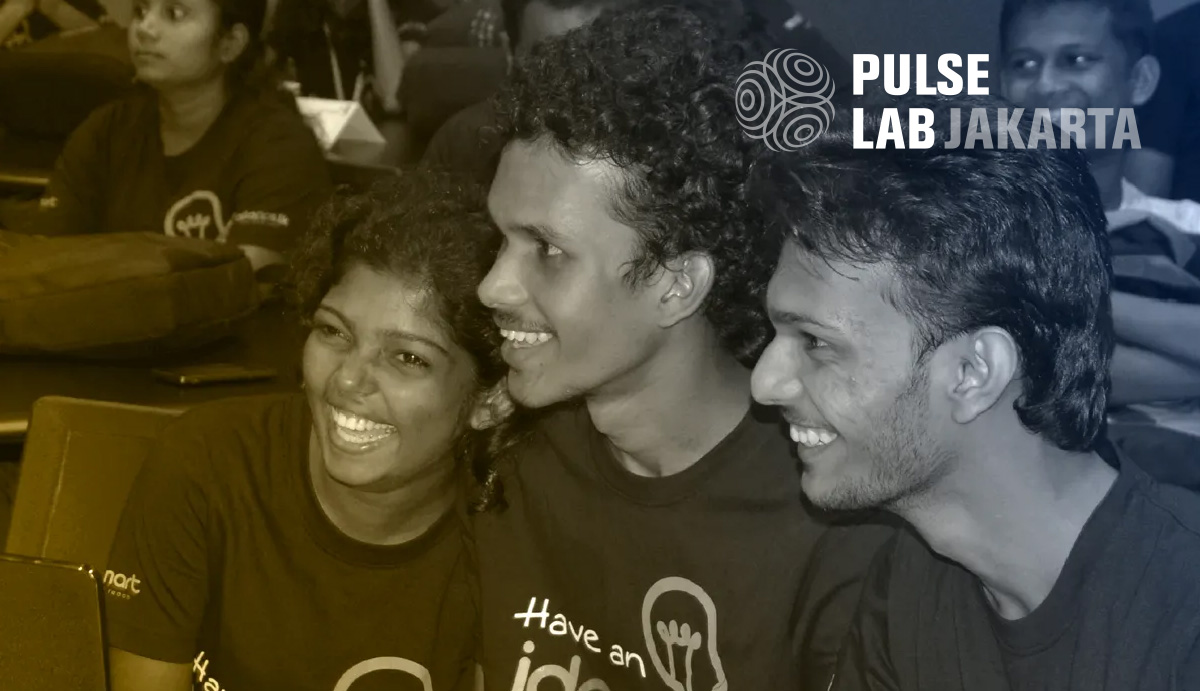
Start:
2017
End:
2017
|
2017
Supporting The Innovation Agenda in Sri LankaLocation: Sri Lanka 
PLJ collaborated with UNDP Sri Lanka to evaluate readiness for an innovation lab in Sri Lanka, using a human-centered design approach. A series of in-depth interviews, ideation, and prototyping workshops were conducted to identify potential clients and challenges. The project's aim was to support the establishment of a Policy Innovation Lab, offering a safe space to test innovative policy prototypes.
<p>Drawing from PLJ's own experience as an innovation lab, in 2017 we collaborated with UNDP Sri Lanka to assess the organisational and ecosystem readiness for an innovation lab in Sri Lanka. We utilised a human centered design approach during the scoping mission, focused on obtaining the stories, experiences, and needs of those who might be potentially involved and impacted directly by the lab. The scoping mission took place as the first step in a two-pronged process to develop the Lab. Subsequent to the scoping mission, we conducted a multi-stakeholder workshop, which stimulated some of the lab's approaches and the interaction between different stakeholders to identify potential clients. In addition, we looked at some of the challenge areas that could be tackled in the early phase of the lab, while identifying which approaches and skill sets would be themost relevant for the lab to add value to Sri Lanka's innovationecosystem. Supporting the establishment of a Policy Innovation Lab as a safe space to test out innovative policy prototypes, our pre-assessment approach entailed in-depth interviews, concept testing, ideation and prototyping workshops.</p>
Domain
Strategic Exploration
SDG Data
Qualitative Data
Partners
UNDP Sri Lanka
|
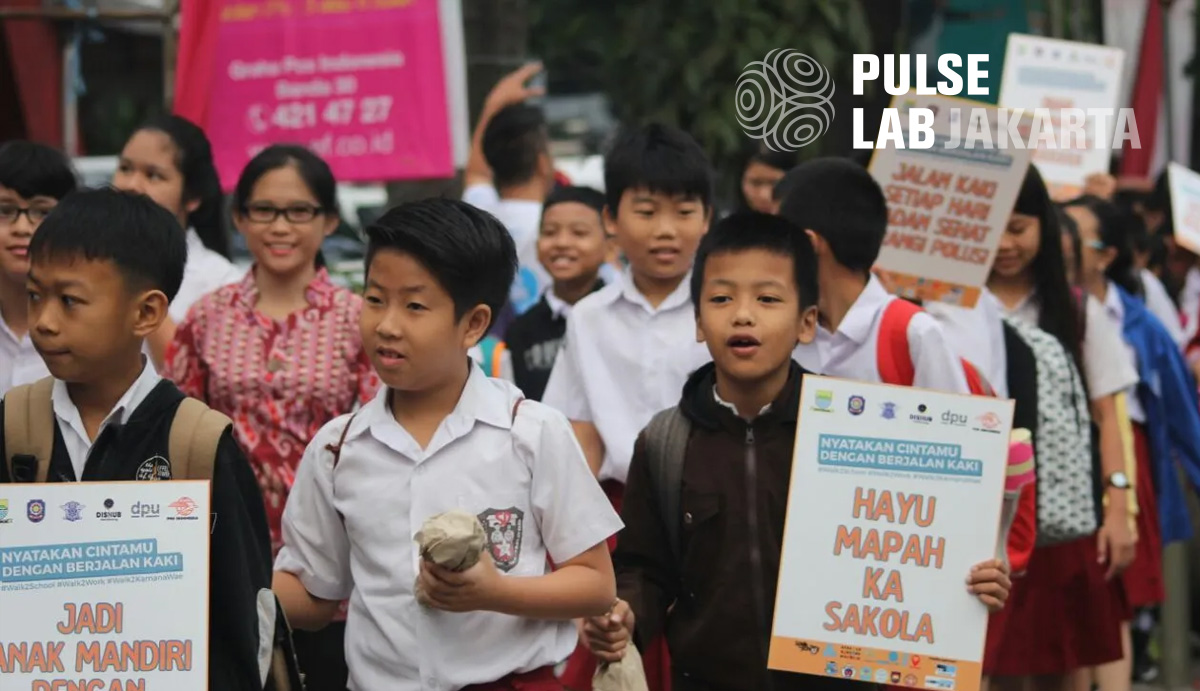
Start:
2017
End:
2017
|
2017
Improving Mobility in BandungLocation: - 
PLJ partnered with Data Science Indonesia, Hivos, and Code4Bandung on a data-driven initiative to improve urban mobility in Bandung. Through a series of ideation workshops, they identified strategies including transit-oriented development, real-time data analytics, improving public transportation experience, reducing private vehicle usage, and transforming road users' behavior and attitudes.
<p>Nearly two million passengers in Bandung can be transported by angkot minibus annually. And yet, only one third utilises this mode of transport, while the number of private vehicles in the city continues to increase. Following the city government's launch of the Bandung Urban Mobility Project, PLJ along with a few partners (Data Science Indonesia, Hivos and Code4Bandung) kickedoff a data-driven initiative to assess the project's progress and to help shape some realistic goals. Taking the form of a series of ideation workshops with playersfrom local communities, it was revealed that there are several ongoing approaches with similar goals. So, to better synchronise current and future activities aimed at improving mobility in the area, we gleaned and highlighted the need to: • Consider transit-oriented development as a long-term goal. • Optimise existing capacity with real-time data analytics. • Improve the public transportation experience. • Reduce private vehicle usage. • Transform the behavior and attitude of road users.</p>
Domain
Urban and Regional Dynamics
SDG
Industry, Innovation, and Infrastructure
Sustainable Cities and Communities
Data
Qualitative Data
BRT Data
Partners
Data Science Indonesia
Hivos
Code4Bandung
|
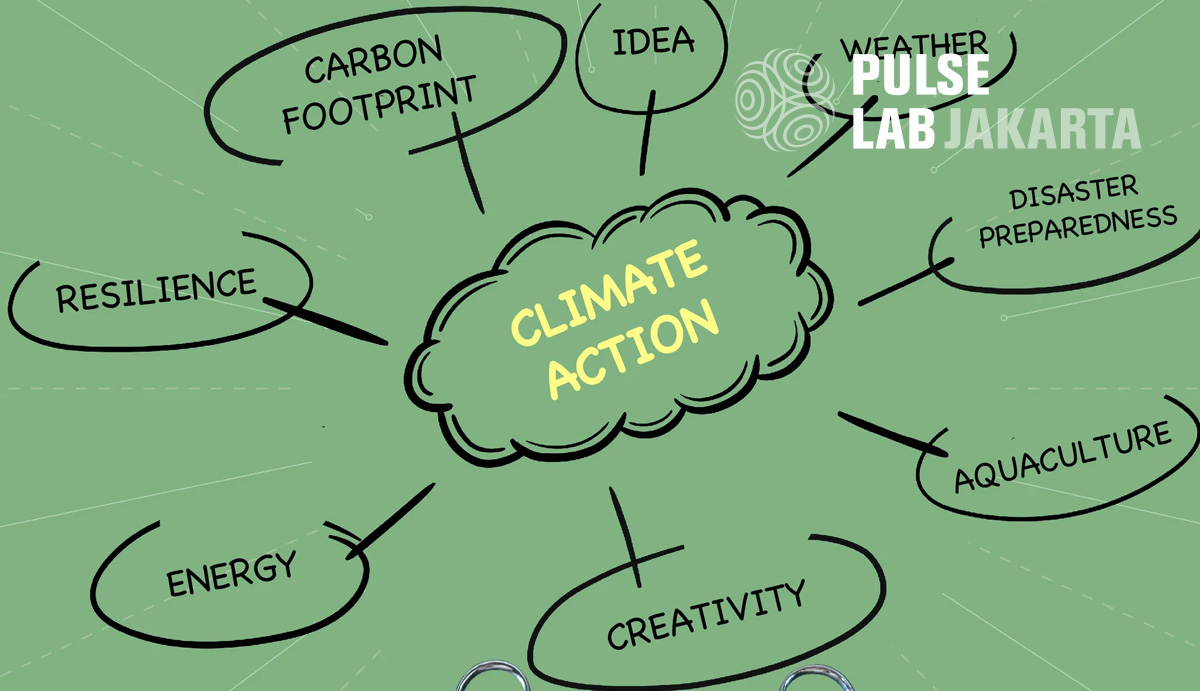
Start:
2017
End:
2017
|
2017
Big Ideas Competition for Climate ChangeLocation: Indonesia, Malaysia, South Korea, Cambodia, Singapore, Philippines, Laos, Brunei, Vietnam, Thailand, Myanmar, Timor-Leste, Sri Lanka 
PLJ's 2017 Big Ideas Competition focused on climate change, receiving 160 proposals from across the ASEAN region, Sri Lanka, and South Korea. The winning proposal was an application designed to monitor and reduce methane emissions through insect consumption. The competition facilitated connections between data communities and technology innovators across the region.
<p>PLJ's 2017 Big Ideas Competition - organised under the theme "combating climate change" - received 160 proposals from applicants throughout ASEAN Member States, Sri Lanka and the Republic of Korea. Aligned with the UN's Sustainable Development Goal #13 (Climate Action), the competition sought original, data-driven ideas to monitor climate related indicators. The first batch of proposals underwent evaluation from a committee of experts with diverse backgrounds in climate change, disaster response and innovation. Following that, 12 proposals were selected to advance to the second round based on the quality of the idea, the importance of the issue addressed, use of more than one source of data, as well as the ability to be implemented. The competition awarded 11 teams, of which the grand prize went to a team from Myanmar, which conceptualised an application to help monitor and assist in the reduction of methane emissions through insect consumption. The challenge inspired new approaches and facilitated connections between data communities and technology innovators across the region.</p>
Domain
Environment and Climate
SDG
Climate Action
Data
Qualitative Data
Crowdsourced Data
Partners |
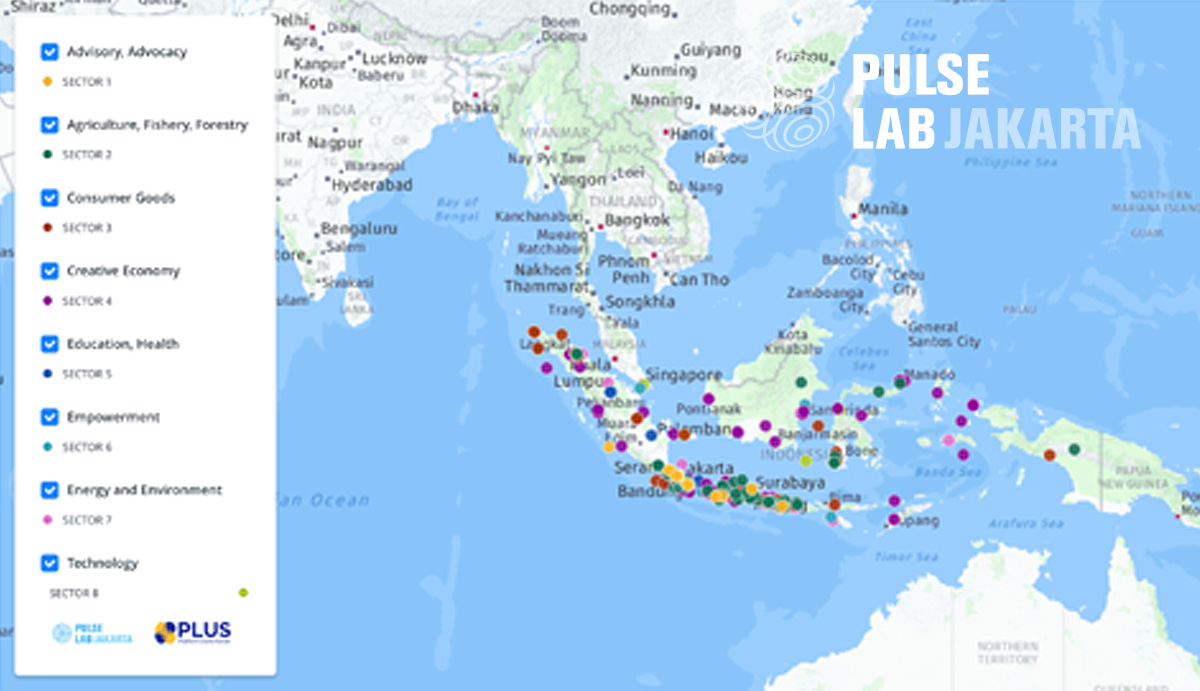
Start:
2017
End:
2017
|
2017
Ecosystem Mapping of Indonesian Start-UpsLocation: Indonesia 
PLJ and Platform Usaha Sosial designed an online tool that surveys the venture capitals of startups in Indonesia. It provides an interactive map visualization showing the distribution of social enterprises and relevant information about them. The tool aids new startups in finding suitable funding support and enables investors to see the distribution of social enterprises.
<p>In Indonesia, social entrepreneurs often face the difficulty of securing credit, especially for marginalised groups that do not have enough collateral. Accessing credit though is crucial for boosting entrepreneurship and promoting self-employment across the entire Indonesian landscape.</p>
<p>One of the patterns observed is that many enablers/investors tend to focus on accelerating the efforts of social enterprises that are located on the most populated island, Java. Thus to expand opportunities to other parts of the country, Platform Usaha Sosial and PLJ designed an online ecosystem mapping tool that surveys the venture capitals of start-ups in Indonesia, in part to help new start-ups find suitable funding support.</p>
<p>Through the use of interactive map visualisation, enablers/investors can see the distribution of social enterprises in Indonesia. The interactive map not only shows their locations, but also displays information about the SDGs parameters, target market, and other information related to social enterprises. At the time of its creation, the tool's database included more than 500 social enterprises.</p>
Domain
Poverty, Financial Inclusion, and Economic Development
Strategic Exploration
SDG
Decent Work and Economic Growth
Industry, Innovation, and Infrastructure
Data
Social Enterprise
Partners
Platform Usaha Sosial
|
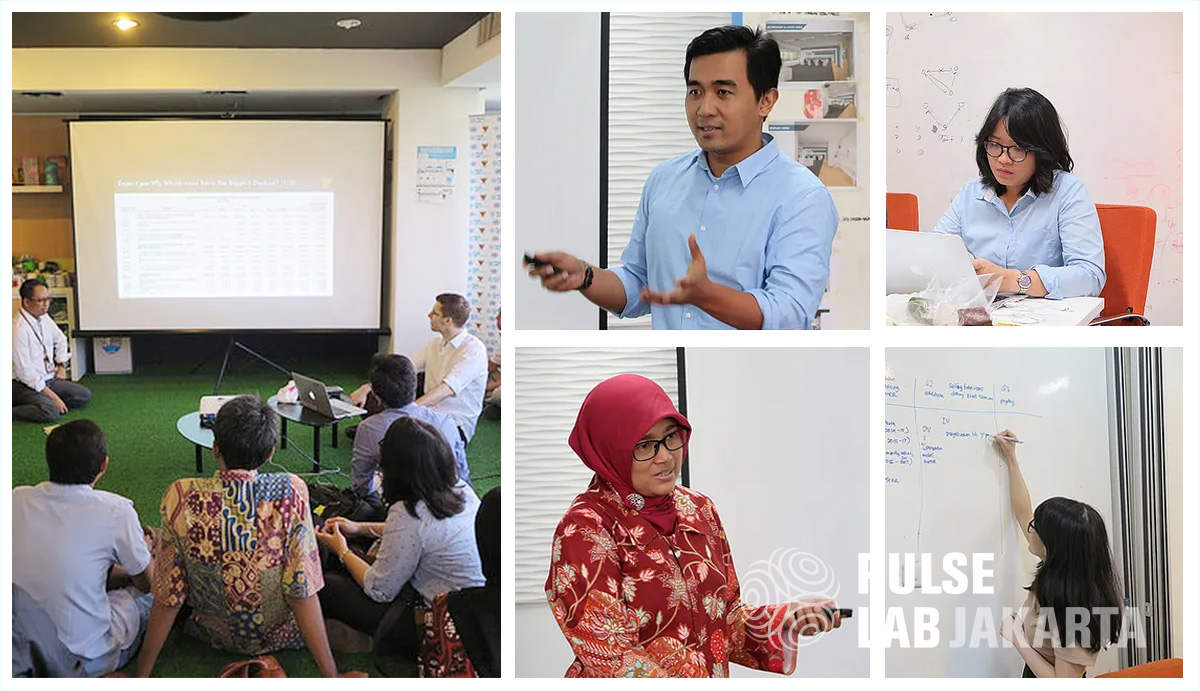
Start:
2017
End:
2017
|
2017
Research Dive: Trade CompetitivenessLocation: Indonesia 
PLJ conducts hackathon-style events called Research Dives for Development, inviting analysts and academics to dissect and mash up various datasets related to development and humanitarian issues. The 2017 series covered topics like the Sustainable Development Goals, trade and competitiveness, and transportation. The event facilitated networking and collaboration among researchers and institutions.
<p>To broaden research engagement within the Big Data ecosystem, Pulse Lab Jakarta regular invites analysts and academics to participate in a three-day, hackathon-style research sprint at the Lab. Dubbed 'Research Dive for Development', during this event participants dissect and mash up various datasets related to development and humanitarian issues in Indonesia and across the region. In 2017, PLJ organised three Research Dives under the themes: statistics for the Sustainable Development Goals (SDGs), trade and competitiveness, and transportation.</p>
<p>As customary, a technical report was produced for each Research Dive, which includes technical papers on methodologies, findings and recommendations put together by the teams. Some participants from the Research Dives have also had their papers accepted to national/international journals and conferences. Since its inception in 2016, participants from 85 universities, 12 government institutions and 5 research institutions/NGOs have taken part. We were also pleased to partner with private sector data partners, such as OLX Indonesia, Twitter, and PT Jasa Marga (Indonesia Highway Corp.), who were all generous to share selected anonymised datasets for us to research.</p>
<p>Our Research Dive tradition centers on giving an opportunity to researchers from different institutions and a variety of disciplines to network and share expertise, discovering new insights that can be useful for policy prescriptions while laying the foundation for new collaborations. A four-city reunion for past participants is being planned for the first quarter of 2018.</p>
Domain
Strategic Exploration
SDG Data
Social Media
Crowdsourced Data
E-Commerce Data
AIS Data
CCTV Data
Goverment Statistics
Public Transportation
Toll Traffic
Partners |
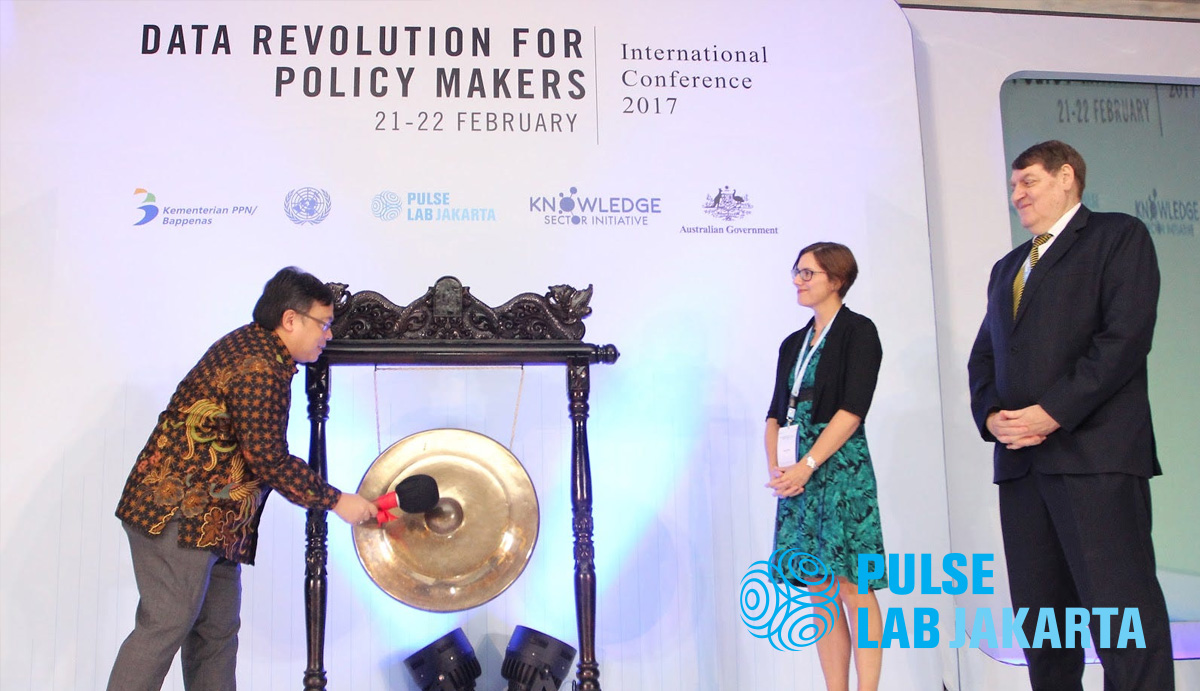
Start:
2017
End:
2017
|
2017
Data Revolution for Policy Makers ConferenceLocation: Indonesia 
In 2017, PLJ co-hosted an international conference on "Expanding the Evidence Base: Government Demand for Advanced Data Analytics in Indonesia". The conference highlighted the application of new technologies and data for better-informed policy-making, real-time data analysis, citizen engagement, and data partnership strategies.
<p>The ongoing data revolution is transforming our ability to sense changes in our economies, societies and environment. To take stock of progress in Indonesia, Pulse Lab Jakarta co-hosted an international conference in February under the theme, “Expanding the Evidence Base: Government Demand for Advanced Data Analytics in Indonesia”. Below we share a few impressions and the conference proceedings.</p>
<p>With more than 250 participants in attendance over a two-day period, contributions came from researchers, policy makers, activists, data analysts, entrepreneurs, civil society organisations, UN agencies and government representatives. The conference was also co-hosted by KSI (Knowledge Sector Initiative) and the Indonesian Ministry of National Development Planning (Bappenas).</p>
<p>“It’s exciting but it’s also disruptive,” remarked Robert Kirkpatrick (UN Global Pulse Director) on the opening day, referring to the ongoing data revolution.</p>
<p>“We’re moving from a world where we use the best data we have to make a plan and take a snapshot every few years, to actually detecting emerging risks and taking actions to keep them from affecting us. It’s a very different way of working”, he added.</p>
<p>The Minister of National Development Planning, Prof. Bambang Brodjonegoro, similarly spoke about today’s big data sources, particularly highlighting its complementary use with traditional statistics, which may help to create solutions amid rising complexities.</p>
<p>The conference was structured into plenary sessions and data clinic sessions.</p>
<p>During the plenary sessions, representatives from the Indonesian government, the UN, as well as from public and private entities addressed a number of topics, including: taking stock of the data landscape, applications of real-time data for decision making, the policy side of data innovation, synchronising and sharing data, forging data partnerships, reconfiguring citizen engagement, and making sense of the overall data.</p>
<p>The featured panellists shared widely about implementation approaches, based on their areas of expertise. There was an example of how a USSD-based system for reporting malaria cases was developed by South Halmahera Malaria Center (SHMC), which ultimately contributed to decreasing the reporting time for malaria cases.</p>
<p>Data experts among these groups also headed prototype cafe sessions, where they displayed several applications used for real-time data analysis and decision making. Altogether, the prototype cafe sessions were a showcase of work and advanced data analytics tools that can be used to capture citizen opinions, visualise information and provide new insights on behaviour, livelihoods, and economic activity to improve service delivery.</p>
<p>The data clinic sessions, on the other hand, aimed to facilitate direct dialogue between experts and participants on particular topics, as well as to share hands-on skills related to a certain aspect of data innovation.</p>
<p>The data clinic sessions included:</p>
<ul>
<li>A Policy Brief Writing Clinic, by Tempo Institute;</li>
<li>Innovation and Synergies Across Different Data Ecosystems, by Pulse Lab Kampala;</li>
<li>From Data to Visual Stories, by UN Global Pulse;</li>
<li>Bringing Data Innovation to Local Government, by RTI;</li>
<li>Ensuring Data Quality with Advanced data Exchange Technology, by AIPEG;</li>
<li>Applying the Data Innovation Cookbook, by UN Global Pulse; and</li>
<li>Privacy Protection Tools for Open Data Initiative, by Data61.</li>
</ul>
<p>The conference broadly highlighted how new technologies and data could better inform policy making. Indonesia, the home of millions of digital technology users, is one of the world’s richest sources of digital data. This kind of data, commonly referred to as big data due to its quantity, diversity, and speed of data collection, opens up endless new opportunities for policy making.</p>
<p>As mentioned by UN Resident Coordinator for Indonesia, Douglas Broderick: “traditional ways of collecting data takes a long time. Surveys are costly and focus groups are insufficient to capture the diversity of Indonesia”. As many participants also concluded at the end of the conference, in today’s ever-changing and complex societies, more diverse, integrated, timely and reliable information is needed to help us make informed decisions.</p>
Domain
Strategic Exploration
SDG Data
Crowdsourced Data
Partners
KSI (Knowledge Sector Initiative)
Indonesian Ministry of National Development Planning (Bappenas).
|
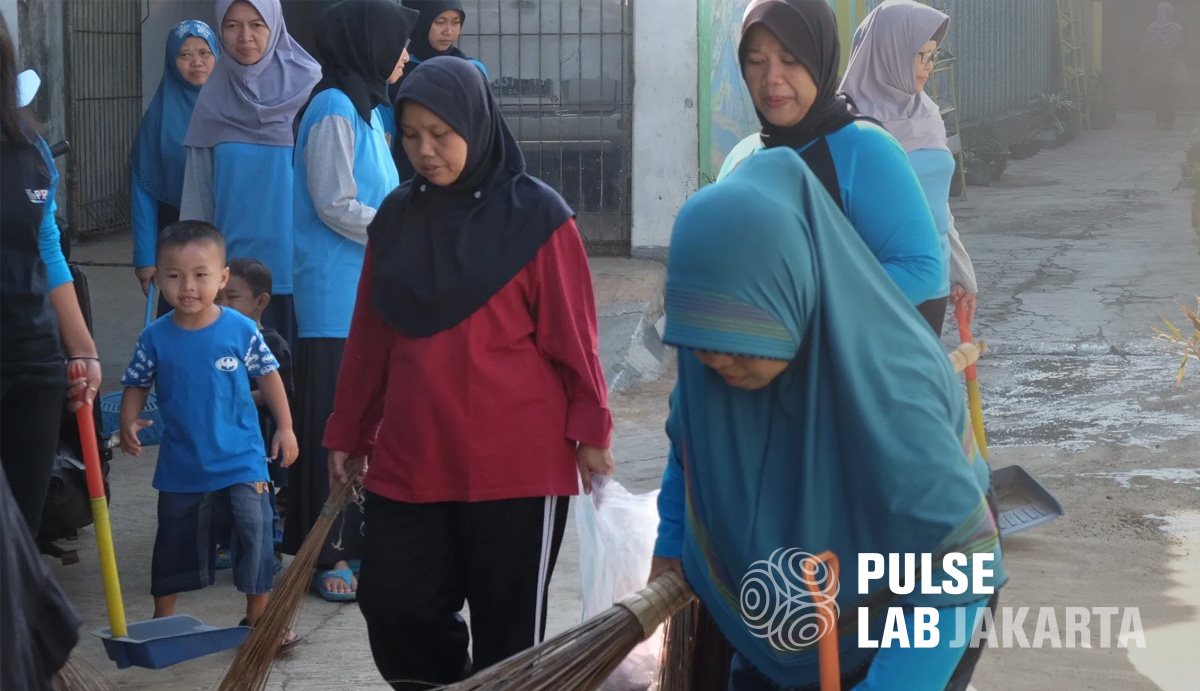
Start:
2017
End:
2017
|
2017
Identifying Opportunity Areas for Flood MitigationLocation: Indonesia 
PLJ is researching flood mitigation in Bandung, focusing on the impact of green space reduction, inefficient waste management, and inadequate drainage. The research emphasizes the need for a holistic coordination of available flood data across government units and the expansion of research to unearth community-based solutions.
<p>The Bandung locale has faced repeated flooding over the years. Experts have pointed to the decrease of green space, inefficient waste management system and inadequate drainage capacity as contributing factors. Information pertaining to these factors are scattered throughout different government units — and are often dated.</p>
<p>Considering Bandung’s Smart City endeavours on urban development and aiming to identify opportunity areas for flood mitigation, PLJ research team immersed in the community and surveyed multiple stakeholders while uncovering their journeys during these untoward events.</p>
<p>Two key points emerged:</p>
<ol>
<li>Flood mitigation is a joint effort that requires cross-institution and cross-administration coordination, covering the scope of preparedness, response as well as recovery efforts.</li>
<li>While existing throughout different government units, without a sense of holistic coordination, the available data related to floods cannot be properly utilised.</li>
</ol>
<p>In 2018, our social systems team hopes to expand its research to further unearth community-based solutions. Based on our experience conducting this human centered research, we learned that:</p>
<ol>
<li><strong>Understanding the existing data journey is important </strong>- The data journey is the mapping of data from collection to usage. In Bandung City, we outlined the journey based on existing practice. What is often overlooked is that the data journey may not always reflect the regulations or standard operation procedures. By reconstructing the actual flow of data, we were able to observe the different role of each actor and identify the recurring pain points. Understanding data governance within the current decentralised context was also important. More effective flood mitigation strategies will rely on inter-government and inter-agency cooperation, which means data sharing is a necessary component to consider. At the moment, the provincial government is well-positioned to facilitate this aspect due to its existing cross interaction with the various administrations.</li>
<li><strong>From compilation to action: “Camat”, a sub-district head, is a key counterpart</strong> - As we have established, many government units have their own data collection methods. The downside is that they are not always integrated with other units. And while tech-focused alternatives to the traditional quantitative and qualitative data collection methods are now being explored, the next step is to think through how to employ these methods not just for planning but as well for timely response during crisis. Camat is normally well-connected to different government units and local communities, thus this individual already embodies the role of field coordinator. These sub-district heads as government officials are especially vital for data verification and utilisation in the event of a flood. Still, their roles will need to evolve and adapt as new tools and new data sources become available.</li>
</ol>
<p>Our hope is that from these findings as well as from others that may emerge, we can foster collaboration with other stakeholders in order to develop useful prototypes that can help mitigate repeat flooding in Bandung City, including designing both short-term and long-term measures.</p>
Domain
Disaster Response and Humanitarian Action
Urban and Regional Dynamics
SDG
Industry, Innovation, and Infrastructure
Sustainable Cities and Communities
Data
Qualitative Data
Partners |
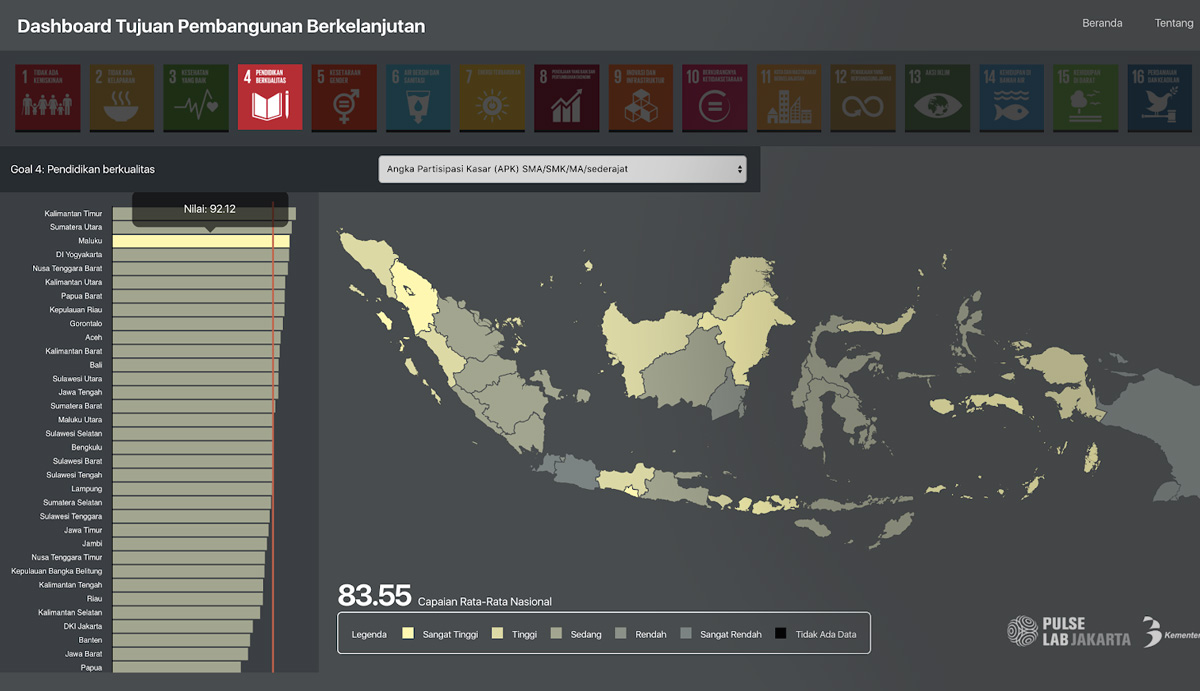
Start:
2017
End:
2017
|
2017
Diving Into MDGs Datasets to Inform The SDGsLocation: Indonesia 
PLJ and researchers analyzed public data on the previous Millennium Development Goals across 34 provinces in Indonesia and developed proxies for unavailable Sustainable Development Goals indicators. The exercise aimed to fill data gaps and understand the relationships among the newly implemented SDGs indicators.
<p>The implementation of the new Sustainable Development Goals (SDGs) has brought about challenges, especially concerning data collection and availability. During one of the Lab's Research Dives in 2017, researchers gathered to analyse publicly available data on the previous Millenium Development Goals across 34 provinces in Indonesia. The team developed a set of proxies for currently unavailable SDG indicators, one of which included the proportion of population using safely managed drinking water services (this was done by using multiple measurements including the proportion of population below poverty line, the proportion of population consuming clean water, and the proportion of population with access to improved sanitation). Along with our team at the Lab, the guest researchers looked at elements of correlation (to discover statistically meaningful correlations among MDGs indicators); causation (to reveal any causal relationship among MDGs indicators); quality of data (to analyse and improve the quality of the dataset); and data disaggregation (to propose a set of statistical methods to disaggregate Indonesian data by gender, age, and at the subnational level) with a view to filling data gaps and better understanding the relationships among the SDGs indicators now being implemented.</p>
Domain
Poverty, Financial Inclusion, and Economic Development
SDG Data
Goverment Statistics
Partners |
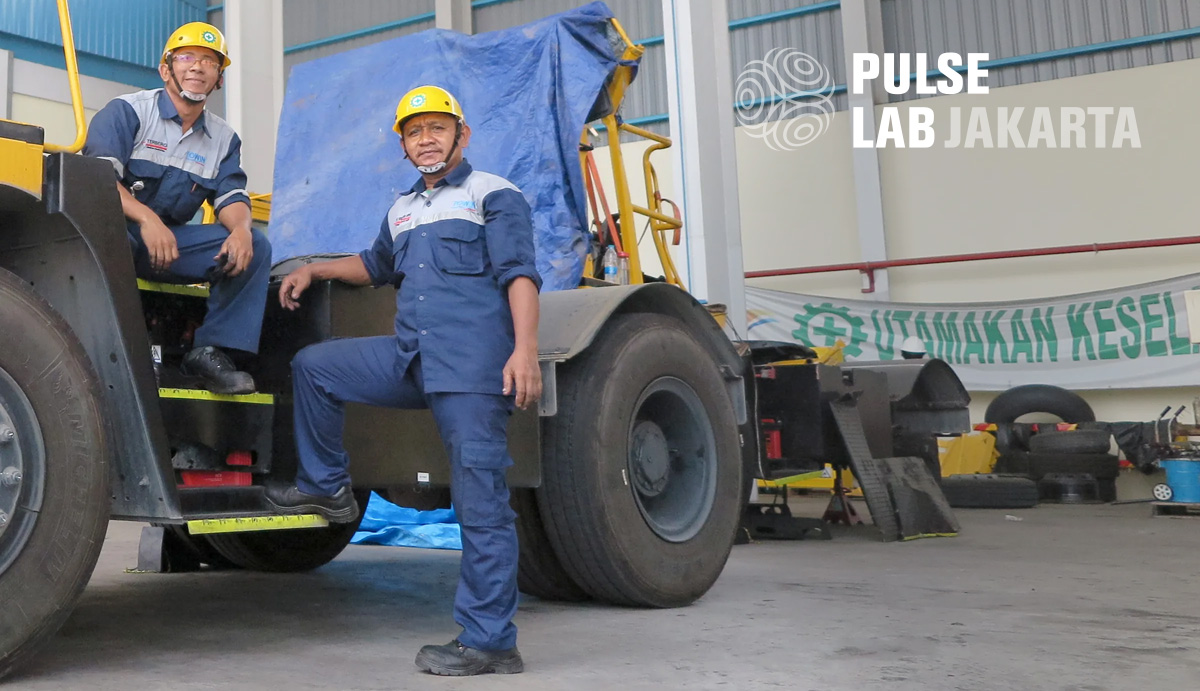
Start:
2017
End:
2017
|
2017
Using Human Centered Design to Uncover Pain Points at Indonesian PortsLocation: Indonesia 
PLJ and the Australia-Indonesia Partnership for Economic Governance conducted a study on improving the import experience in Indonesia. The study suggests that transforming the current multiplatform online system into a single hub tracking all imported goods would substantially reduce administrative strains.
<p>Indonesia ranked 63rd in the Logistics Performance Index in 2016, scoring low in almost all key measures, including timeliness. Together with the Australia Indonesia Partnership for Economic Governance (AIPEG), PLJ conducted a study on how to improve the import experience in Indonesia to contribute to the country's trade competitiveness.</p>
<p>While the study started out with an investigation into how port dwelling times affect the import process, pain points beyond the dwelling time were revealed, such as the barrier of a distrust of the overall system paired with issues of interrupted information flows. Among a handful of other implications, the findings suggest that redesigning the current multiplatform online system into a single hub that can track all imported goods would tremendously reduce the administrative strains and burdens.</p>
Domain
Trade and Competitiveness
SDG
Decent Work and Economic Growth
Industry, Innovation, and Infrastructure
Data
Qualitative Data
Partners
Australia Indonesia Partnership for Economic Governance (AIPEG)
|
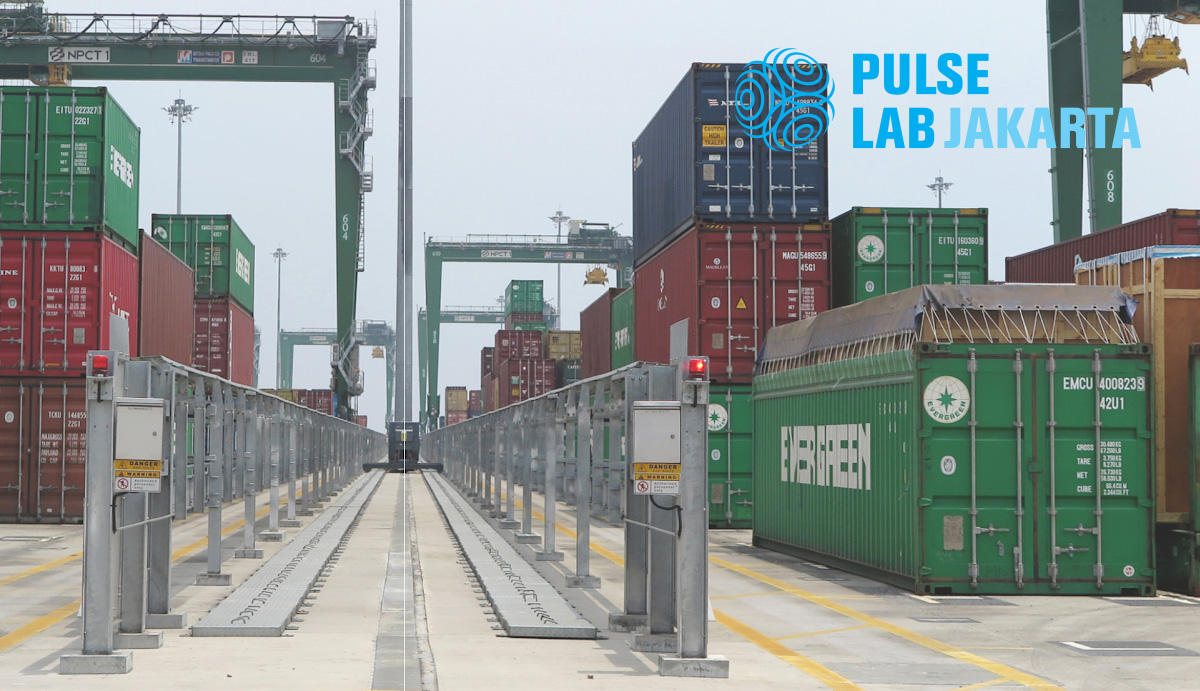
Start:
2017
End:
2017
|
2017
Maritime Transport Network AnalysisLocation: Indonesia, Malaysia, Cambodia, Singapore, Philippines, Laos, Brunei, Vietnam, Thailand, Myanmar, Timor-Leste 
PLJ and Indonesian academics analyzed current port connectivity in South-East and East Asia and the integration of the existing network under the Tol Laut development plan. The study indicates that Tol Laut can reduce network dependency and increase network efficiency.
<p>Maritime transport is important for economic development in the littoral member states of the Association of Southeast Asian Nations. Global marine vessel automatic identification system, in particular, is a key instrument for analysing the maritime transport network.</p>
<p>Together with academics from across Indonesia, PLJ analysed current port connectivity in South-East and East Asia and the further integration of the existing network under the Tol Laut development plan.</p>
<p>Our analysis indicates that the implementation of Tol Laut can reduce network dependency on Singapore by eight per cent and on Tanjung Priok by 24 per cent. In terms of network efficiency, when Bitung becomes a hub port for Eastern Indonesia, as foreseen by Tol Laut, the study suggests that this should lead to an increase in efficiency by 20 per cent when compared to the current network.</p>
Domain
Trade and Competitiveness
SDG
Decent Work and Economic Growth
Data
AIS Data
Partners |
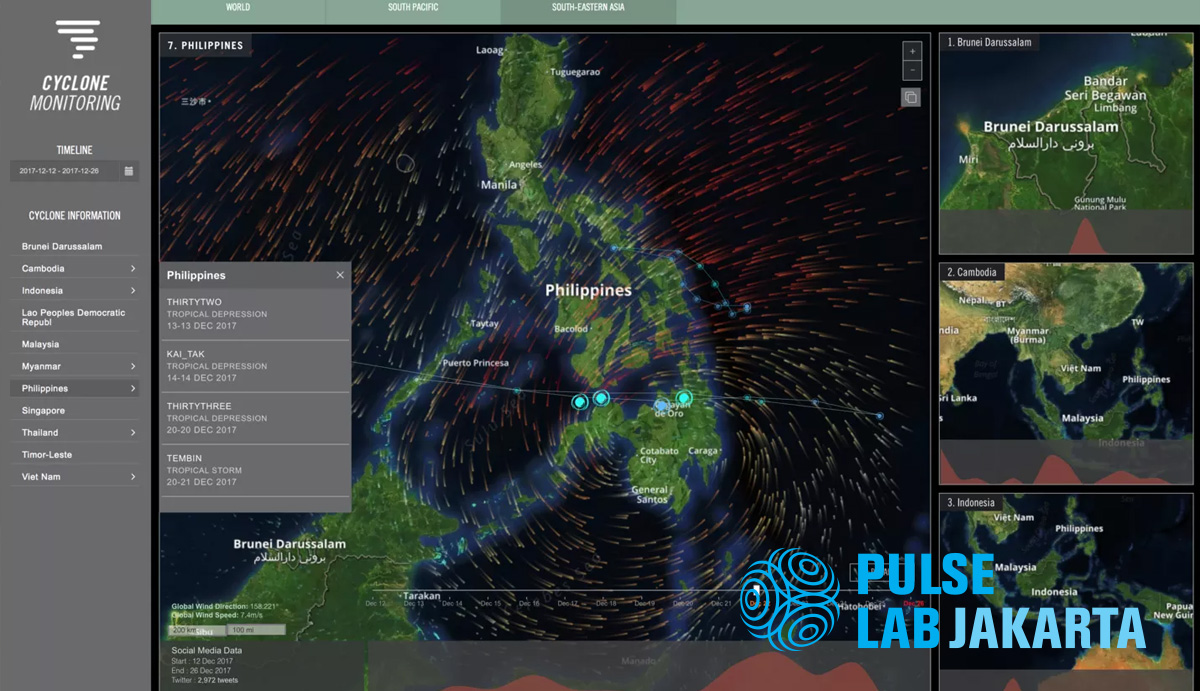
Start:
2017
End:
2017
|
2017
Cyclone Monitoring PlatformLocation: Fiji, Vanuatu, Tonga 
PLJ developed CycloMon, an analytics and visualization platform to enhance disaster preparedness for cyclones. The tool uses automatic processes to collect, analyze, and visualize information from weather satellites and social media, enabling monitoring before, during, and after cyclones.
<p>Big Data plays a pivotal role in helping disaster authorities to enhance preparedness, including their ability to monitor and respond to natural disasters like cyclones. In 2017 PLJ developed CycloMon, an analytics and visualisation platform with capabilities to monitor action before, during and after cyclones across the world. Its basic functions rely on a series of automatic processes that collect, analyse and visualise information from weather satellites on the path of a cyclone, combined with insights from social media and baseline information on the preparation for and impact of the cyclone on communities. With functionalities similar to Haze Gazer, our haze crisis analysis tool, CycloMon allows for the exploration of rich, coun- try-specific information mined from various sources of social media, such as text-, image-, and video-based content.</p>
Domain
Disaster Response and Humanitarian Action
SDG
Sustainable Cities and Communities
Climate Action
Life on Land
Data
Social Media
Satellite Imagery
Partners |
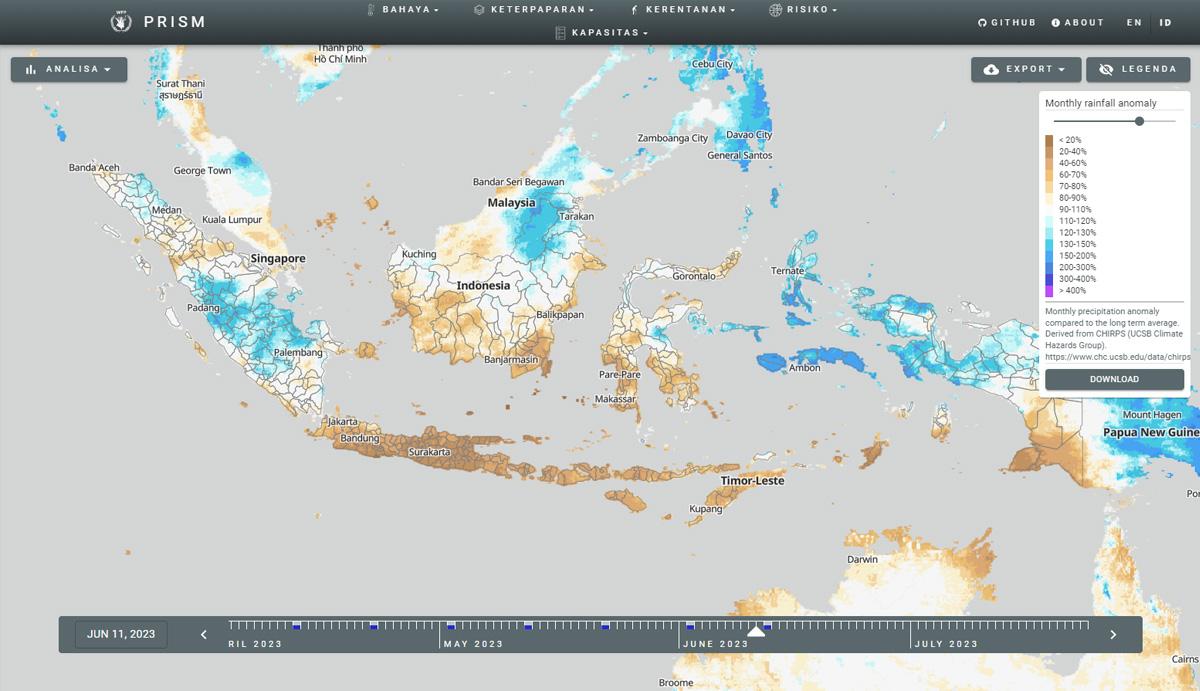
Start:
2017
End:
2017
|
2017
VAMPIRE - Vulnerability Analysis Monitoring Platform for Impact of Regional EventsLocation: Indonesia 
PLJ , World Food Programme and the Food and Agriculture Organisation developed VAMPIRE, an integrated multitier tool for real-time analysis of regional events' impact. It uses various sources of Big Data, including population and socioeconomic data, to understand the effects of events like the 2015 El Niño-induced drought in Indonesia. VAMPIRE was later adapted for Sri Lanka, enhancing disaster management efforts with features such as flood impact analysis.
<p>In response to the El Niño-induced drought affecting Southeast Asia, the UN, including the World Food Programme, Pulse Lab Jakarta, and the Food and Agriculture Organisation, developed a data tool named VAMPIRE (Vulnerability Analysis Monitoring Platform for Impact of Regional Events). This tool uses integrated map-based visualizations to track drought impact on vulnerable communities, presenting data on drought-affected areas, market impacts, and population resilience strategies.</p>
<p>VAMPIRE amalgamates a range of databases, including national socio-economic surveys, household food security surveys, rainfall anomaly data, and the Indonesian Vegetation Health Index. This comprehensive data fusion allows VAMPIRE to identify and prioritize areas needing aid based on their economic vulnerability and drought exposure.</p>
<p>The tool’s adaptability and modular design enable its adoption in diverse contexts and applications. As well as supporting government and development partners in decision-making, VAMPIRE will soon become open source, enhancing its accessibility for stakeholders. By integrating flood hazard forecasts and rainfall anomaly data from sources like US Geological Survey and NASA, along with population density data, VAMPIRE delivers valuable insights on both flood and drought impacts.</p>
<p>Recognizing that climate directly influences food production and prices, the tool was initially created to combat the 2015 El Niño drought in Indonesia that caused a severe rise in food prices. VAMPIRE's first version automated analysis of drought extent and populations at risk, integrating various datasets for quick, high-resolution visualization. It has since been installed in the situation room of Indonesia’s Office of the President, providing valuable data to guide governmental decision-making.</p>
<p>VAMPIRE has been enhanced to include more detailed analysis on drought and has also been extended to provide flood impact analysis. Through its continuous upgrades, it offers more granular estimation of affected areas, improving its capacity to identify and prioritize risk. These improvements, which were informed by the system's contextualization to Sri Lanka, continue to shape its development elsewhere. Further work is underway to refine its notification and alert systems to better meet the needs of users and regional realities.</p>
Domain
Disaster Response and Humanitarian Action
Environment and Climate
SDG
Zero Hunger
Clean Water and Sanitation
Climate Action
Data
SUSENAS
Food Security Data
Goverment Statistics
Climate Data
Partners
WFP
FAO
|
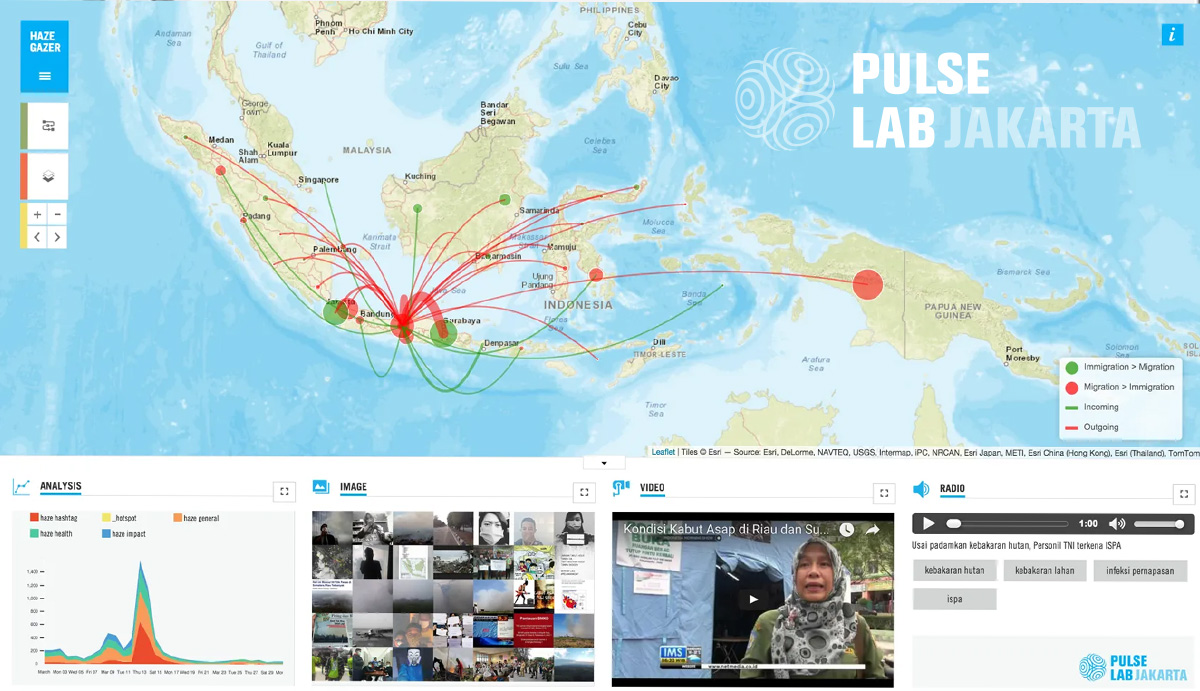
Start:
2017
End:
2017
|
2017
Haze Gazer ExpansionsLocation: Indonesia 
Haze Gazer, a tool developed by PLJ, provides real-time insights on fire and haze hotspots in Indonesia, including impact and response strategies. In 2017, it became an open platform with a mobile version and expanded to Singapore, where it is combined with mobility data to improve haze crisis management.
<p>In Indonesia, where forest and peatland fires can be annual occurrences, the Government relies on timely and effective means of tracking and managing the impact of these events. Haze Gazer is a crisis analysis and visualisation tool, which PLJ developed to provide real-time insights on the locations of fire and haze hotspots; the strength of haze in population centres; insights on the locations of the most vulnerable cohorts; and the response strategies of affected populations (including in-situ behavioural changes).</p>
<p>In 2017, the platform evolved in twofold: 1) it became an open platform, accompanied with a mobile phone version that enables users to conveniently utilise it on the go; and 2) the platform expanded to Singapore where it is also being combined with mobility data to gather insights that can better inform the haze crisis.</p>
Domain
Environment and Climate
SDG
Good Health and Well-being
Climate Action
Life on Land
Data
Qualitative Data
Crowdsourced Data
Partners |

Start:
2017
End:
2017
|
2017
Translator Gator 2Location: Sri Lanka 
PLJ launched Translator Gator, a gaming platform to crowdsource translation of disaster-related keywords in less-known languages and dialects. The platform collected nearly 18 million activities within 100 days, demonstrating how crowdsourced translations can assist in understanding local conversations during disasters.
<p>Creating taxonomies, better known as a sets of keywords, is an important step in analysing social media data. However, building a taxonomy of key terms for less-known languages, including local dialects and jargon, is often challenging. In 2017, PLJ launched the second pilot of Translator Gator, a gaming platform designed to crowdsource the translation of disaster-related keywords in almost 30 languages spoken throughout the ten ASEAN Member States and Sri Lanka. 23 Almost 1.8 million activities across four gaming components (translation, evaluation, classification and synonyms) were recorded within 100 days. The platform is a proof of concept which exhibits how translations that have been crowdsourced online can help relevant authorities understand the conversations/behaviours of local communities during a disaster.</p>
Domain
Disaster Response and Humanitarian Action
SDG
Industry, Innovation, and Infrastructure
Life on Land
Data
-
Partners
-
|
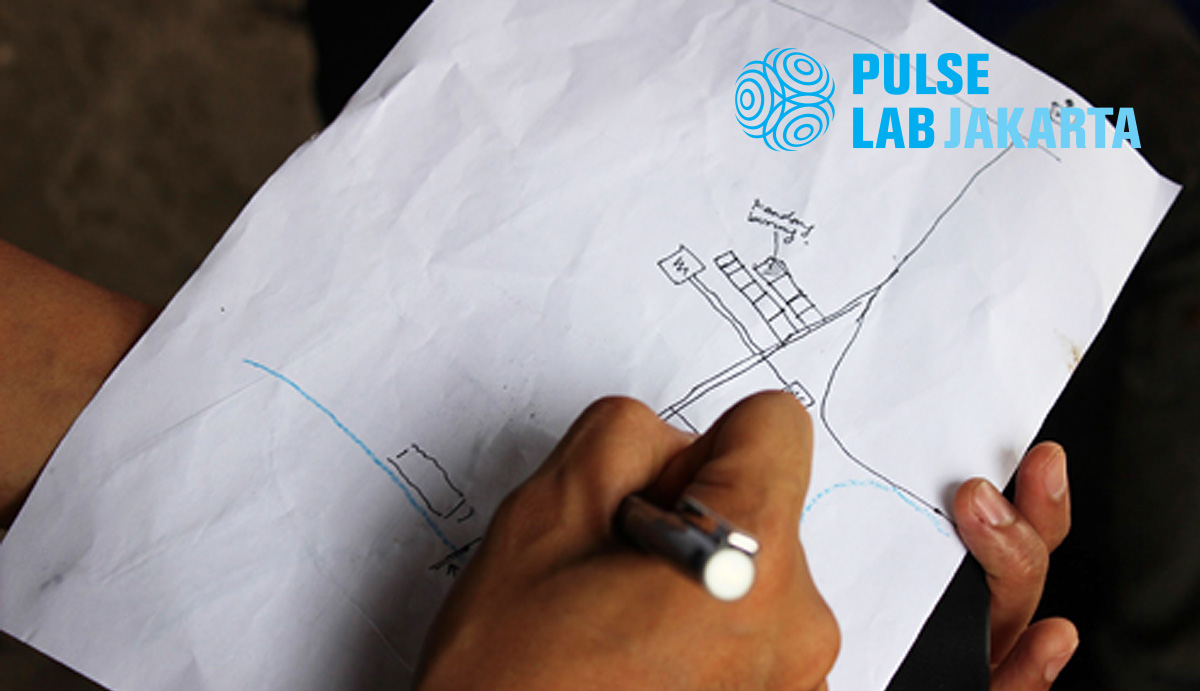
Start:
2017
End:
2017
|
2017
Urban Vulnerability MappingLocation: Indonesia 
PLJ granted $10,000 to the Urban Poor Consortium (UPC) to conduct a project named Mapping Vulnerability in Urban Communities. UPC developed a community-led data collection approach and shared it as a toolkit for participatory urban vulnerability mapping, aimed at helping citizens identify and articulate community challenges.
<p>In 2015, Pulse Lab Jakarta initiated a Data Innovation Mini Grant competition to promote a shift from theory to action in data innovation and support the Government of Indonesia to provide more effective services. While small in value, at no more than US$10,000 each, these projects represented variety in origin and focus. Urban Poor Consortium (UPC) as part of the competition. The funds were used to conduct a two-month project called Mapping Vulnerability in Urban Communities. Partnering with Peta Jakarta and d-associates architects, UPC piloted a community-led data collection approach in two communities in Jakarta.</p>
<p>Based on popular demand from local stakeholders to learn more about the inner workings of the approach, UPC in 2017 shared its approach to participatory urban vulnerability mapping in the form of a toolkit. It is a step-by-step guide to participatory data collection, management, data visualisation and decision making in urban communities. The toolkit is an integrated method for data collection, management, and visualization that empowers local citizens.</p>
<p>One of the long-term objectives of the toolkit is to help citizens identify and articulate their community challenges from their own data.</p>
Domain
Urban and Regional Dynamics
SDG
Sustainable Cities and Communities
Life on Land
Data
Qualitative Data
Partners
UPC
|
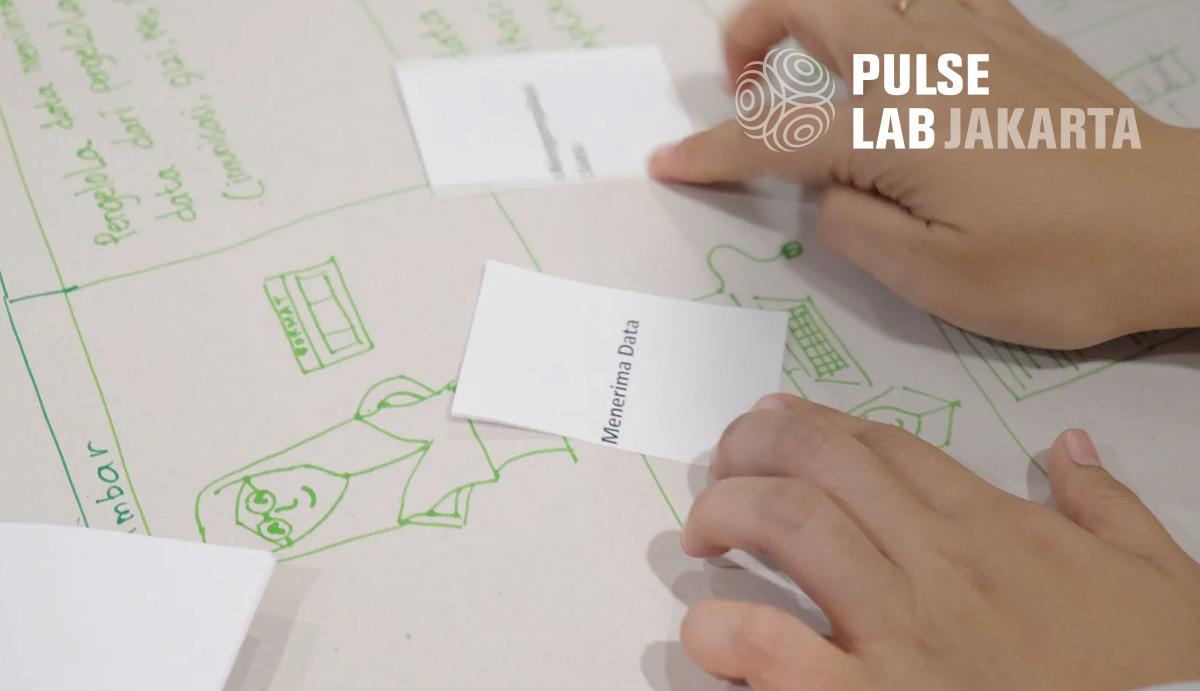
Start:
2017
End:
2018
|
2017
Wawasan Satu Data ToolkitLocation: Indonesia 
PLJ worked with the Executive Office of the President to develop the Wawasan Satu Data toolkit to assist data stewards in understanding data governance policies and framework. Tested in multiple locations in Indonesia, the toolkit aids in establishing sustainable data governance systems. Several local governments have since developed data governance regulations based on this toolkit.
<p>2017: For some data stewards working across Indonesia's public sector, the many uses of the data they collect are not always immediately known. PLJ worked closely with the Executive Office of the President (KSP) to develop the Wawasan Satu Data toolkit. The toolkit is aimed at helping data stewards within the public sector holistically understand data governance policies and framework, which are particularly aligned with the draft Presidential Regulation on Satu Data Indonesia. As facilitators of the toolkit testing workshops in 2017, both PLJ and The Executive Office of the President were tasked with unpacking the content of the toolkit (which includes an array of practical items from storyboards to help streamline data collection flow to a Satu Data dictionary to explain common terminologies used in data governance) and helping participants to understand each component. The testing stage, which is the final step for developing and finalising the Wawasan Satu Data toolkit, has three overarching objectives: to understand, plan and build a sustainable data governance system. Makassar, Kulon Progo, Pontianak and Mojokerto were chosen as the pilot locations for the toolkit testing to help assess data governance guidelines relevant to local government, including at the city and district levels.</p>
<p>2018: Data governance has many facets to it, ranging from how data is collected to how it is used. Pulse Lab Jakarta and the Executive Office of the President of the Republic of Indonesia have been applying human centred design to model a data governance framework at the local government level. Materialised in a resource known as the Wawasan Sata Data toolkit, its objective is to help data stewards within the public sector to holistically understand data governance policies and framework, which are aligned with the draft Presidential Regulation on Satu Data Indonesia. Several versions of the toolkit were developed in a co-creation process with public sector representatives, each version modified to meet the needs of its users throughout the data lifecycle. The toolkit was tested in four district/city governments (Kulon Progo, Makassar, Pontianak and Mojokerto) and two provincial governments (Yogyakarta and South Sulawesi) in Indonesia. More than 200 users took part in the testing of the toolkit. Since participating in the toolkit testing, several public officials from Kulon Progo, Pontianak and Mojokerto have built on inspirations and insights from the workshop to finalise a set of data governance regulations for their respective regions. The Government of Indonesia is planning to release the toolkits on their data portal when the Presidential Regulation is formalised.</p>
Domain
Poverty, Financial Inclusion, and Economic Development
SDG
Industry, Innovation, and Infrastructure
Peace, Justice, and Strong Institutions
Data
Qualitative Data
Partners
KSP
|

Start:
2017
End:
2017
|
2017
A Guide to Participatory Urban Data Collection and DesignLocation: Indonesia 
PLJ partnered with Participate in Design to compile global approaches to urban data collection and design. The guide, with 24 examples, promotes active citizen and public participation in urban planning, providing insights into initiating participatory data collection and realizing participatory urban design.
<p>With more than fifty per cent of the world's population living in urban areas, designing solutions with communities and enabling citizens to be involved in urban planning are good participatory ideals, but how should a city go about doing so? PLJ teamed up with Participate in Design to compile approaches to urban data collection and design from around the world to answer that question. The guide shares insights into how other cities have done, from initiating participatory urban data collection to realising participatory urban design. While the 24 samples contained in the guide are not instructional blueprints due to their unique political, social, economic and other contexts, they are useful for replicating active citizen and public participation in imagining urban change.</p>
Domain
Urban and Regional Dynamics
SDG
Sustainable Cities and Communities
Life on Land
Data
Qualitative Data
Partners
Participate in Design
|

Start:
2017
End:
2017
|
2017
A Service Design ToolkitLocation: - 
PLJ, in collaboration with the United Nations Development Programme and Bursa Pengetahuan Kawasan Timur Indonesia, developed a toolkit for efficient and practical service design delivery based on a project in Makassar. The toolkit outlines key tasks and challenges for high-quality service design and effective delivery.
<p>Understanding the enabling environment of a particular project is necessary for effective development and delivery of service. This includes considering factors such as the social and political contexts and the relevant stakeholders in the network. Yet, navigating these terrains can be complicated and demands extensive amount of time and effort. Pulse Lab Jakarta participated in a service design initiative to develop a citizen-centric public transportation service in Makassar - The Pasikola. Following the initiative, which was undertaken along with United Nations Development Programme (UNDP) and Bursa Pengetahuan Kawasan Timur Indonesia (BaKTI), we chronicled our learnings on taking an idea from a design sprint to a ready-to-test prototype in a toolkit. The toolkit provides a guiding framework to help simplify some of these processes — in a practical and efficient way; it gives a bird's eye view of the challenges stakeholders are likely to encounter; and it outlines crucial tasks that need to be considered in order to ensure a top-quality service design and an effective delivery model. The toolkit was also designed with the hope that it may be used to steer the innovation process for conceptualising service design projects: moving from problem identification to tangible concepts, and from concepts to tested pilots.</p>
Domain
Trade and Competitiveness
SDG
Industry, Innovation, and Infrastructure
Data
Qualitative Data
Partners
BaKTI
United Nations Development Programme (UNDP)
|
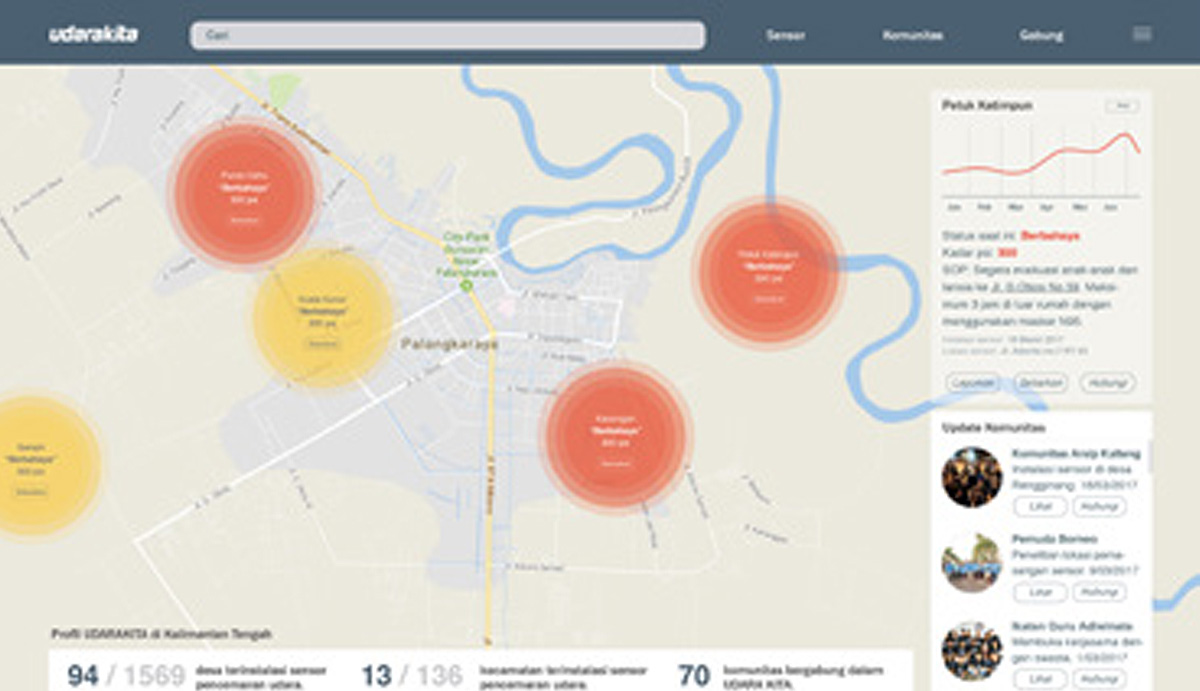
Start:
2017
End:
2017
|
2017
Low-Fidelity Haze PrototypesLocation: - 
PLJ designed a set of prototypes to mitigate the impact of wildfire-induced air pollution in Indonesia. The human-centered solutions include a school emergency plan, a haze emergency kit, and an air quality information system, providing practical, community-involved approaches to combat haze issues.
<p>From disrupted commutes to medical complications, there are numerous accounts in communities across Indonesia about how residents have been affected with the haze phenomenon. Shaped by PLJ's thick data/social research, Reality Check Approach's ethnographic research and the feedback from a preliminary prototyping Co-Design for Change workshop in Jakarta, a set of prototypes was designed to lessen the impact of air pollution from wildfires - designed with human-centered elements that are practical for stakeholders, including students, teachers, parents and community volunteers.</p>
<p>These prototypes include:</p>
<ul>
<li>a <strong>school emergency plan</strong> (entails designated locations where chil- dren can temporarily attend classes away from haze-concentrated areas);</li>
<li>a <strong>haze emergency kit </strong>(consists of a mask, goggles, materials to seal open gaps/cracks, and do-it-yourself air filtration device); and</li>
<li>an <strong>air quality information system</strong> (relies on community involvement as it is a system that requires a network of citizens to collect air quality information using sensors, as well as, to disseminate the information).</li>
</ul>
Domain
Urban and Regional Dynamics
Environment and Climate
SDG
Good Health and Well-being
Sustainable Cities and Communities
Data
Qualitative Data
Partners |

Start:
2017
End:
2017
|
2017
Public Transport Analysis in The MaldivesLocation: Maldives 
PLJ and UNDP conducted research to understand urban mobility patterns and public transport sentiment in Hulhumal, Maldives. The sentiment analysis revealed more negative than positive perceptions of public transport, highlighting areas for further investigation and improvement.
<p>In the late 1990s, the Government of the Maldives began a reclamation project to develop the island of Hulhumalé in order to accommodate the growing population in Malé, the country's capital situated nearby. Joining forces with our colleagues at UNDP Maldives and UNDP Bangkok Regional Hub, PLJ designed a pair of research projects to investigate urban mobility patterns using origin-destination analysis, and to perform sentiment analysis of public transport using Twitter data in order to better understand people's commuting experiences from Hulhumalé. Though unable to conduct the origin-destination analysis due to a lack of geo-tagged tweets among people from Hulhumalé, our research team performed a series of sentiment analysis as a first step. At a macro level, the sentiment analysis (which confirmed that people had more negative than positive opinions of public transport services) was intended to provide a general understanding about citizen perceptions of public transportation, and accentuate any major issues that may be worth examining. The possibility of accessing alternative data sources to capture insights on mobility is being explored.</p>
Domain
Trade and Competitiveness
Urban and Regional Dynamics
SDG
Industry, Innovation, and Infrastructure
Sustainable Cities and Communities
Data
Social Media
Public Transportation
Partners
UNDP Maldives
UNDP Bangkok Regional Hub
|

Start:
2017
End:
2017
|
2017
Estimating Socioeconomic Indicators from Mobile Phone DataLocation: Vanuatu 
PLJ used mobile phone data to generate proxies for socioeconomic indicators in Vanuatu. The study showed a strong correlation between these proxies and official statistics, suggesting mobile phone data can be a useful tool to monitor and evaluate the Sustainable Development Goals (SDGs).
<p>Building on past studies which show that data from mobile phones (in particular from call detail records and airtime credit purchases) can be used to understand socio-economic conditions, PLJ conducted research into the potential of using mobile phone data to produce a set of proxies for education and household characteristics. Using anonymised mobile data from the Pacific island nation of Vanuatu, proxies for four statistical indicators were extracted from mobile phone data that was made available by a local carrier. These indicators included education, house- INDICATORS Education levels Household assets Households expenditure hold assets, household expenditure, and household income. Households income INDICATORS Education levels Household assets Households expenditure The findings of the research confirmed a relatively strong correlation between indicators from the mobile dataset and data from the official statistics provided by the National Statistics Office in Vanuatu. The use of mobile phone data to estimate socioeconomic indicators advances other considerations that seek to develop reliable proxies based on such data to monitor and evaluate the SDGs.</p>
Domain
Poverty, Financial Inclusion, and Economic Development
SDG
No Poverty
Decent Work and Economic Growth
Sustainable Cities and Communities
Data
-
Partners
-
|

Start:
2017
End:
2017
|
2017
Public Perception of Indonesia's Biggest Vaccination CampaignLocation: Indonesia 
PLJ and UNICEF analyzed tweets from the 2017 measles and rubella vaccination campaign in Indonesia. The analysis provided insights into public perceptions and possible upcoming issues around vaccination, while highlighting the campaign's mostly positive social media reception.
<p>The Indonesian Ministry of Health launched one of its biggest immunisation campaigns in 2017, focused on vaccinating 70 million children against the measles and rubella viruses. Inspired by one of the Lab's past research projects which was done to understand public perception of immunisation based on analysis of social media signals, PLJ partnered with UNICEF to screen a collection of public tweets (timestamped around the launch of the vaccination campaign) to gain a broad view of Indonesians' perspectives, map influences on social media, and develop a system to flag any upcoming issues around vaccination. The tweets collected were filtered using a prepared taxonomy and analysed through a series of approaches. The preliminary results indicated that majority of the tweets contained an appeal/invitation for individuals to participate in and support the campaign, while some anti-vaccine sentiments were observed to a much smaller degree.</p>
Domain
Strategic Exploration
Public Health and COVID-19
SDG
No Poverty
Decent Work and Economic Growth
Sustainable Cities and Communities
Data
-
Partners
-
|

Start:
2017
End:
2017
|
2017
Optimising Public Transport with Twitter DataLocation: Indonesia 
PLJ , alongside Jakarta Smart City and the Indonesian Institute of Statistics, utilized Twitter data to optimize public transport for Greater Jakarta’s 30 million population. Using GPS-stamped tweets, origin-destination stats for the ten cities within Greater Jakarta were produced, providing valuable information for policy makers. Findings, confirmed by the Indonesian Bureau of Statistics, showcased Twitter as a reliable tool for filling gaps in official commuting statistics, even determining top two destination cities for 8 of the 10 origin cities.
<p>Some estimates for Greater Jakarta put the population at more than 30 million people. Within the boundaries of the city itself, the transport system has to handle 1.38 million daily commuters. In collaboration with Jakarta Smart City and the Indonesian Institute of Statistics, PLJ investigated whether Twitter data could help provide policy makers with regular updates to best optimise public transport. Origin-destination statistics for the 10 cities in Greater Jakarta were produced from GPS-stamped tweets, by identifying a subset of people who commute between these areas. The initial results were calibrated based on the population distribution and Twitter usage distribution, then verified with the Indonesian Bureau of Statistics' official commuting records. The very high correlation between the official commuter flows and the commuting statistics inferred from Twitter (visualised in the chord diagram above) confirms that geo-tagged tweets can reliably fill existing information gaps in the official commuting statistics. Additionally, the research team was able to accurately determine (based on comparison with the Indonesian Institute of Statistics data) the top two destination cities for people travelling from 8 of the 10 origin cities in Greater Jakarta, decreasing the cost related to conducting traditional surveys to figure out such commuting patterns.</p>
Domain
Urban and Regional Dynamics
SDG
Industry, Innovation, and Infrastructure
Responsible Consumption and Production
Data
Social Media
Goverment Statistics
Partners
Jakarta Smart City
Indonesian Institute of Statistics
|
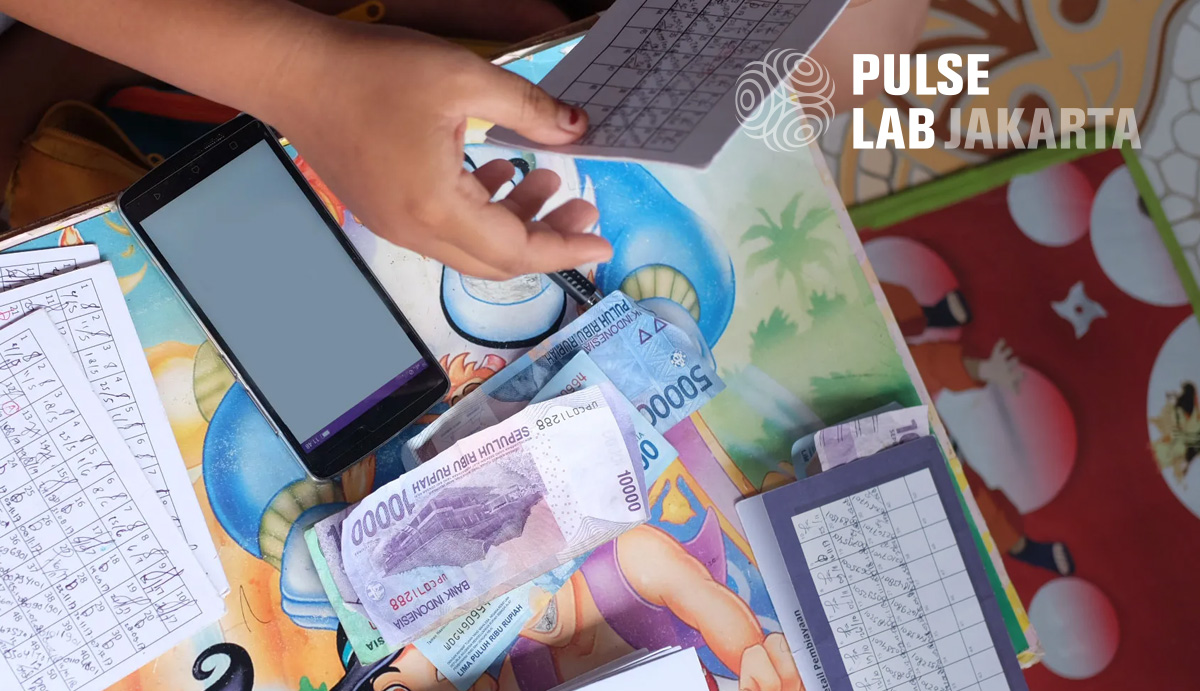
Start:
2017
End:
2018
|
2017
Banking on Fintech Financial Inclusion for Micro Enterprises in IndonesiaLocation: Indonesia 
PLJ undertook a research project, in collaboration with DFAT Australia and AFTECH, titled “Banking on Fintech: Financial Inclusion for Micro Enterprises in Indonesia”. Aimed at fostering resilience in Indonesia’s unbanked micro-business sector, the project garnered insights into fintech usage patterns amongst such enterprises. Findings were used to design the UNCDF-Shaping Inclusive Finance Transformations program, boosting fintech use for financial inclusion of micro-enterprises.
<p>2017: Micro and small-to-medium enterprises (MSME) in Indonesia employ more than 107 million people, contributing to more than half of the county's GDP. In 2016, the Government launched a National Strategy for Financial Inclusion, which aims to provide regulatory support for banking institutions as they work to guarantee more Indonesians' access to financial services. With the support of the Department of Foreign Affairs and Trade (DFAT), Australia and in collaboration with the Indonesia Fintech Association (AFTECH), PLJ kicked off a research project called 'Banking on Fintech: Financial Inclusion for Micro Enterprises in Indonesia'. To promote resilience and growth within Indonesia's unbanked micro business sector, the research aims to understand the experiences of early fintech adopters among those enterprises, as well as contribute to the Government of Indonesia's financial inclusion goals by uncovering behavioural and data analysis insights on micro enterprises as potential users of financial tech- nology. We are currently developing partnerships with those who have committed to supporting the financial inclusion agenda and aim to incorporate our findings to create prototypes by mid-2018.</p>
<p>2018: With the support of the Australian Department of Foreign Affairs and Trade (DFAT) and in collaboration with the Indonesia Fintech Association (AFTECH), Pulse Lab Jakarta conducted research called Banking on Fintech: Financial Inclusion for Micro Enterprises in Indonesia which aimed to contribute to the Government of Indonesia's financial inclusion goals, by uncovering behavioural and data analysis insights on micro enterprises as potential users of financial technology. Roughly 99 per cent of all businesses in Indonesia are micro enterprises, according to the Ministry of Cooperatives and SMEs. These include small shop owners, street food vendors, and merchants who earn a maximum of IDR 300 million per year - many of whom are unbanked and are unable to expand their business in part due to a lack of access to formal financial services. Despite this challenge, we took note of several digital financial service providers in the country that have started to reach previously unbanked micro enterprises. The main research question therefore was: Why, and how, despite the same obstacles and behavioural barriers, have some micro enterprises made the leap and began to use these services? The findings from the research report were used to design a Challenge Fund (implemented by the United Nations Capital Development Fund - Shaping Inclusive Finance Transformations programme) aimed at promoting and accelerating the use of fintech for the financial inclusion of micro enterprises in Indonesia. Since its publication in September 2018, the digital version of the report has been accessed more than 1000 times by regulators, development agencies, fintech companies, and other entities working in the fintech and financial inclusion space. The report has also catalysed a collaboration with the Behavioral Insights Team, a UK-based behavioral science specialist firm, to follow up on the research by developing and running a trial for interventions to encourage active usage of mobile savings account. These activities are expected to commence in the first half of 2019.</p>
Domain
Poverty, Financial Inclusion, and Economic Development
SDG
Gender Equality
Decent Work and Economic Growth
Reduced Inequality
Partnership for The Goals
Data
Qualitative Data
Fintech Data
Partners
Indonesia Fintech Association
BTPN Wow!
Go-Pay
Amartha
UNCDF-SHIFT
|
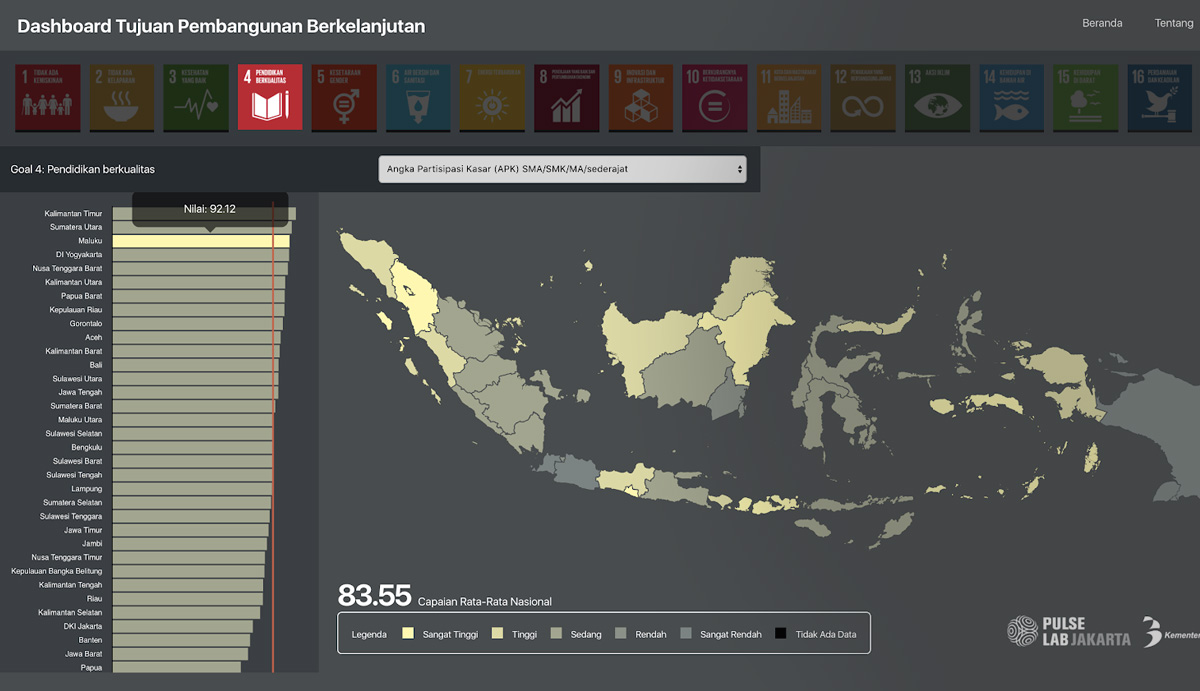
Start:
2018
End:
2018
|
2018
SDG Monitoring DashboardLocation: Indonesia 
PLJ collaborated with Bappenas Data and Information Centre and the SDGs Secretariat to create an interactive map dashboard, providing comprehensive SDGs data analysis across all 34 Indonesian provinces. Streamed from the Satu Data portal, this dashboard helps bridge data gaps and strategize for the achievement of SDGs in Indonesia.
<p>Together with Bappenas' Data and Information Centre (Pusdatin) and the SDGs Secretariat, Pulse Lab Jakarta developed an interactive map dashboard to analyse data relevant to the SDGs. The dashboard displays information on the 17 Sustainable Development Goals throughout the 34 provinces in Indonesia, based on 241 indicators. Users can select a particular SDG or a specific indicator from the list available to survey relevant statistical information and progress updates on all 34 provinces. The data used in the dashboard is streamed from the Satu Data portal in Bappenas. The dashboard is currently being utilised by the SDGs Secretariat in Bappenas in bridging data gaps and preparing programme strategies towards the achievement of SDGs in Indonesia.</p>
Domain
Strategic Exploration
SDG Data
UN In Indonesia
Partners
Bappenas’ Data and Information Centre (Pusdatin)
Indonesia’SDGs Secretariat
Bappenas
|
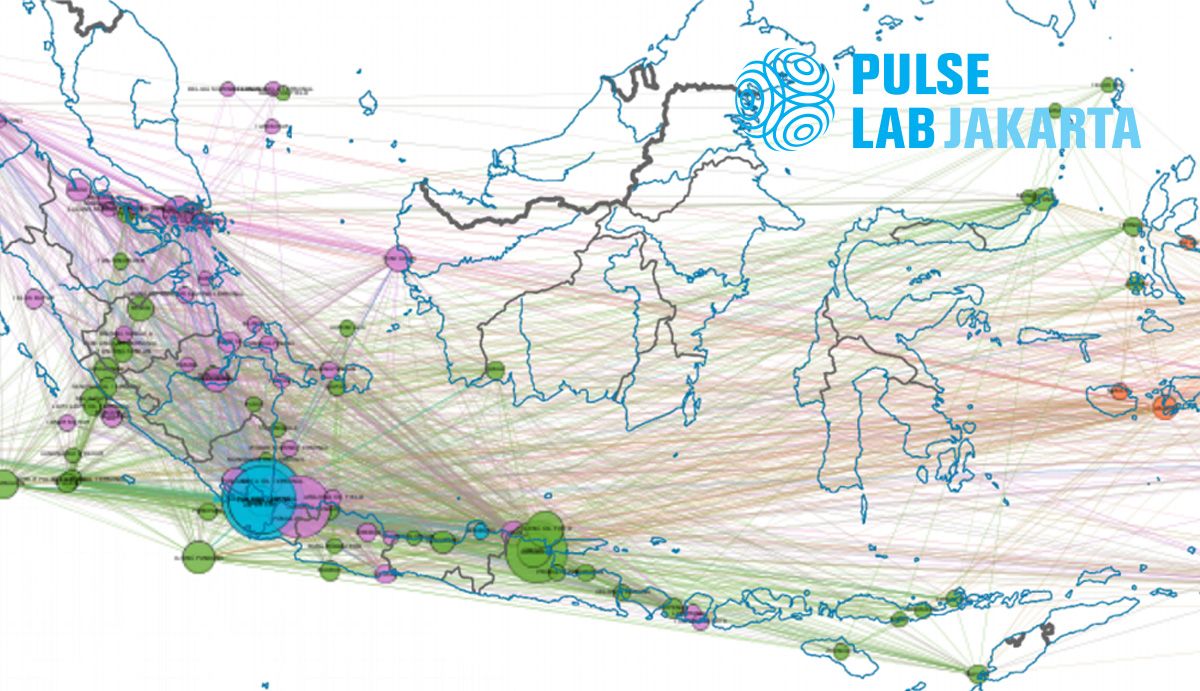
Start:
2018
End:
2018
|
2018
Port Network AnalysisLocation: Indonesia 
In response to a request from Bappenas, PLJ conducted an in-depth analysis of Automatic Identification System (AIS) data to inform maritime development policy. Findings included vessel activity statistics, port network evolution, and predictions for the maritime network under specific scenarios, including the Tol Laut program.
<p>The Automatic Identification System (AIS) is a tracking system used on ships and by vessel traffic services. Alongside its practical application to maritime safety, AIS is useful for research on a variety of topics. Based on a request from the Directorate of Macroeconomics and Statistical Analysis in Bappenas and an initial analysis (conducted at our previous data dive on trade and competitiveness) of port network connectivity using AIS data, further analysis was conducted using the data set with a view to informing maritime development policy. The research included developing summary statistics of vessel activity at ports across Indonesia, describing the evolution of the port network across Southeast Asia over the past few years, and predicting how the maritime network in Indonesia and across the region will evolve given specific scenarios -- including with and without Tol Laut, a major marine infrastructure investment programme promoted by the Government of Indonesia. Initial findings suggest that the implementation of Tol Laut can reduce network dependency on Singapore by roughly 8 per cent and on Tanjung Priok by 24 per cent. At the 2018 Indonesia Development Forum, one of our Research Dive alumni received the best paper award for her forward-thinking Big Data research on analysing port connectivity in Southeast Asia using Global Marine Vessel Automatic Identification System data.</p>
Domain
Trade and Competitiveness
Urban and Regional Dynamics
SDG
Decent Work and Economic Growth
Industry, Innovation, and Infrastructure
Sustainable Cities and Communities
Partnership for The Goals
Data
AIS Data
Partners
Bappenas Directorate of Macroeconomics and Statistical Analysis
Universitas Gadjah Mada
|

Start:
2018
End:
2018
|
2018
ATM Transaction AnalysisLocation: Indonesia 
PLJ, with Institut Teknologi Sepuluh Nopember, studied whether income level can be inferred from ATM transaction mobility data. Findings revealed connections between mobility patterns and income, with mobility higher among men and people younger than 40.
<p>Pulse Lab Jakarta and the Department of Statistics at Institut Teknologi Sepuluh Nopember investigated whether it is possible to infer the level of income from the mobility data contained in anonymised ATM transactions. The research examined human mobility based on the locations of ATMs where the transactions occur, and their relationship with users' income levels. Emphasis was placed on low income segments of the population in order to ascertain poverty- related insights. The links between different patterns of human mobility and income that we uncovered are useful for interpreting insights from other big data sets. The results, which are based on debit card transaction records from an Indonesian bank, suggest that with regards to ATM withdrawals, men are more mobile than women, and in general those with higher mobility tend to be younger than 40 years old.</p>
Domain
Poverty, Financial Inclusion, and Economic Development
SDG
No Poverty
Decent Work and Economic Growth
Industry, Innovation, and Infrastructure
Partnership for The Goals
Data
ATM Transaction Data
Partners
Department of Statistics at Institut Teknologi Sepuluh Nopember
|
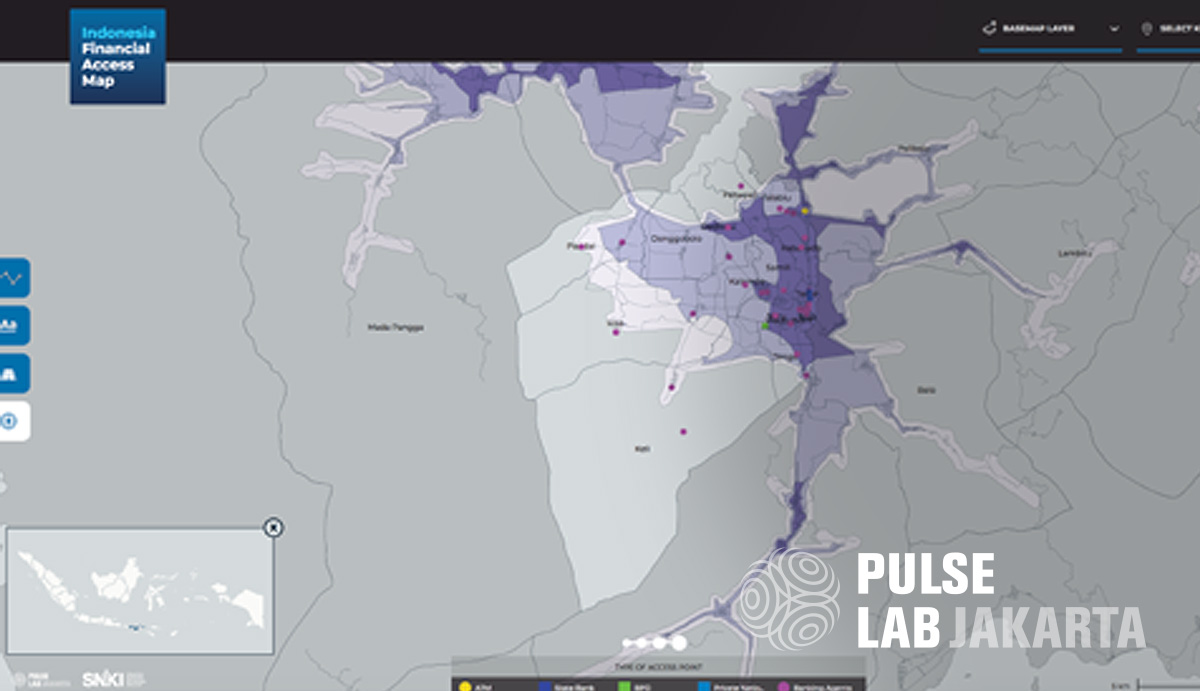
Start:
2018
End:
2018
|
2018
Financial Access MapLocation: Indonesia 
PLJ, the Secretariat of The National Council of Financial Inclusion, and Women’s World Banking developed a Financial Access Map dashboard, providing interactive geospatial data of financial service provision and gaps in Indonesia. The prototype was endorsed by the Council and discussions are ongoing for nationwide expansion.
<p>The Secretariat of The National Council of Financial Inclusion in Indonesia (SNKI) together with Pulse Lab Jakarta and Women's World Banking developed a Financial Access Map dashboard, an interactive geospatial map of regions in Indonesia, that visualises financial service provision and existing gaps. The prototype covers Yogyakarta City and Bima districts and is based on socioeconomic, infrastructure and financial services data. The dashboard highlights financial access points alongside per capita analysis, network coverage analysis and proximity analysis of financial access point locations. The prototype was handed over and endorsed by the Council and installed on the server of the National Team for the Acceleration of Poverty Reduction. There are ongoing discussions within SNKI with regards to scaling the dashboard prototype up to the national level.</p>
Domain
Poverty, Financial Inclusion, and Economic Development
SDG
Gender Equality
Decent Work and Economic Growth
Reduced Inequality
Partnership for The Goals
Data
Google Maps POI
Toll Traffic
Partners
Secretariat for the National Council for Financial Inclusion (SNKI)
Women’s World Banking
|
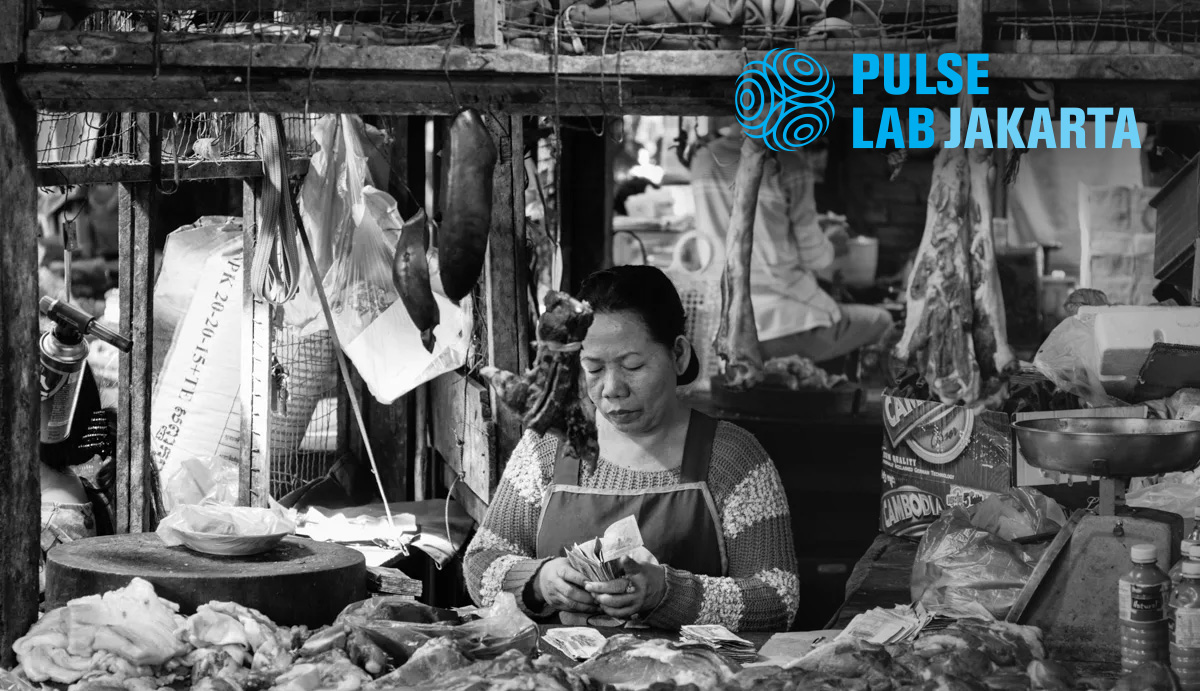
Start:
2018
End:
2018
|
2018
Microfinance Customers’ Journey in CambodiaLocation: Cambodia 
PLJ, alongside UNCDF-SHIFT, examined the journey of Cambodian microfinance customers to address significant gender and youth gaps in loans and savings mobilisation. Further studies aimed at enhancing customer segmentation and adaptive capacity to improve microfinance services and spur national economic growth.
<p>Microfinance can improve the lives of individuals who don't have access to traditional banking services, which can be especially useful for lowincome earners in times of financial uncertainties. UNCDF-SHIFT programme together with Pulse Lab Jakarta studied the journey of a group of microfinance customers in Cambodia using data from four leading microfinance institutions, finding significant gender and youth gaps in average loans and savings mobilisation across the country. PLJ is conducting further studies on customer segmentation, network analysis and adaptive capacity, which are expected to reveal insights on the types of customers, as well as patterns of short and long term resilience to climate shocks. More broadly, the research aims to gather insights on ways to improve microfinance services in order to accelerate national economic growth.</p>
Domain
Poverty, Financial Inclusion, and Economic Development
SDG
Gender Equality
Decent Work and Economic Growth
Reduced Inequality
Partnership for The Goals
Data
Microfinance Data
Partners
UNCDF SHIFT
|
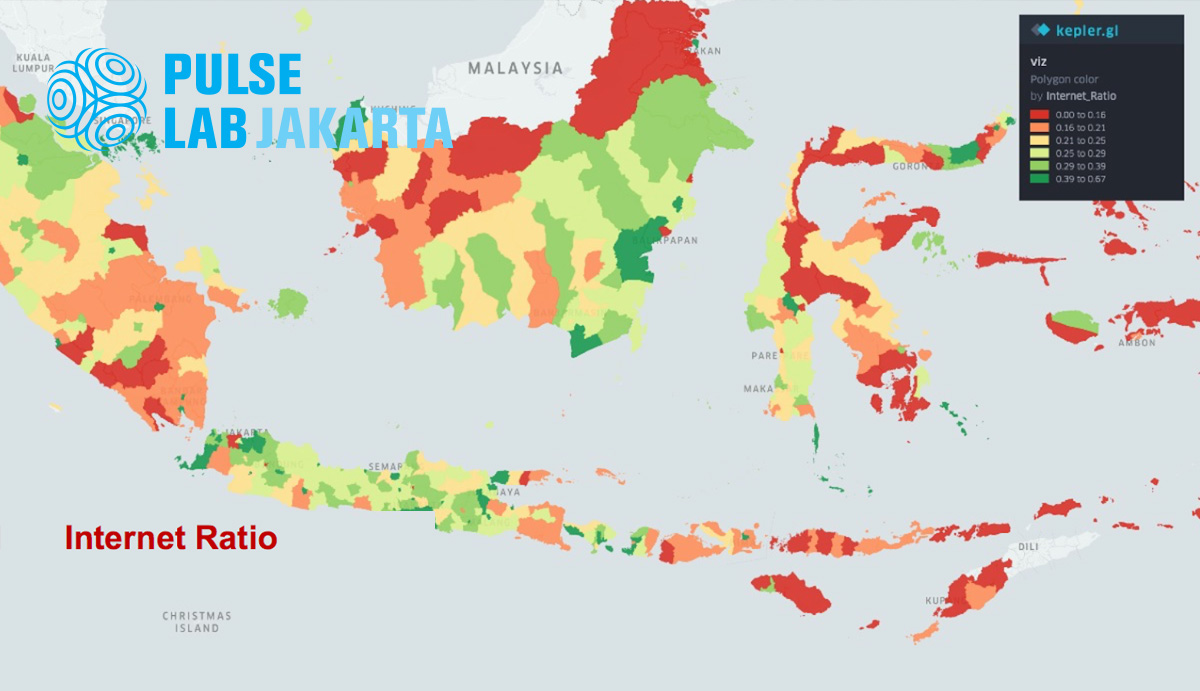
Start:
2018
End:
2018
|
2018
Research Dive: Financial InclusionLocation: Indonesia 
To improve financial inclusion, PLJ organized a data dive, drawing insights from social media and institutional data to answer key policy questions. Initial results were presented to various stakeholders, who provided suggestions on refining analyses to expedite financial inclusion efforts.
<p>Across Indonesia, new data are being generated that provide opportunities for financial institutions and those in the policy-making domain to understand the needs of different communities so as to increase their access to financial services and products. To examine the various dimensions of financial inclusion and its significance for Indonesian society, as well as the progress made and challenges that are ahead, Pulse Lab Jakarta invited researchers, policymakers and domain experts to participate in a data dive at the Lab with the goal of answering pressing policy and development questions. The research focused on measuring financial awareness and financial literacy based on social media data; measuring financial access based on information regarding both financial institutions and non-financial institutions; modelling gender-based differences in financial inclusion; and assessing the impact of digital opportunity on financial inclusion. The preliminary results were presented to representatives from the Indonesian Government (the Financial Services Authority, Secretariat for the National Council for Financial Inclusion and Statistics Indonesia), Indonesian Fintech Association and research think tanks who offered comments on how the analyses can be refined to fast track financial inclusion efforts in the country.</p>
Domain
Poverty, Financial Inclusion, and Economic Development
SDG
Gender Equality
Decent Work and Economic Growth
Reduced Inequality
Partnership for The Goals
Data
Social Media
SUSENAS
Fintech Data
Google Maps POI
Toll Traffic
Partners
Financial Services Authority
Microsave Indonesia
|
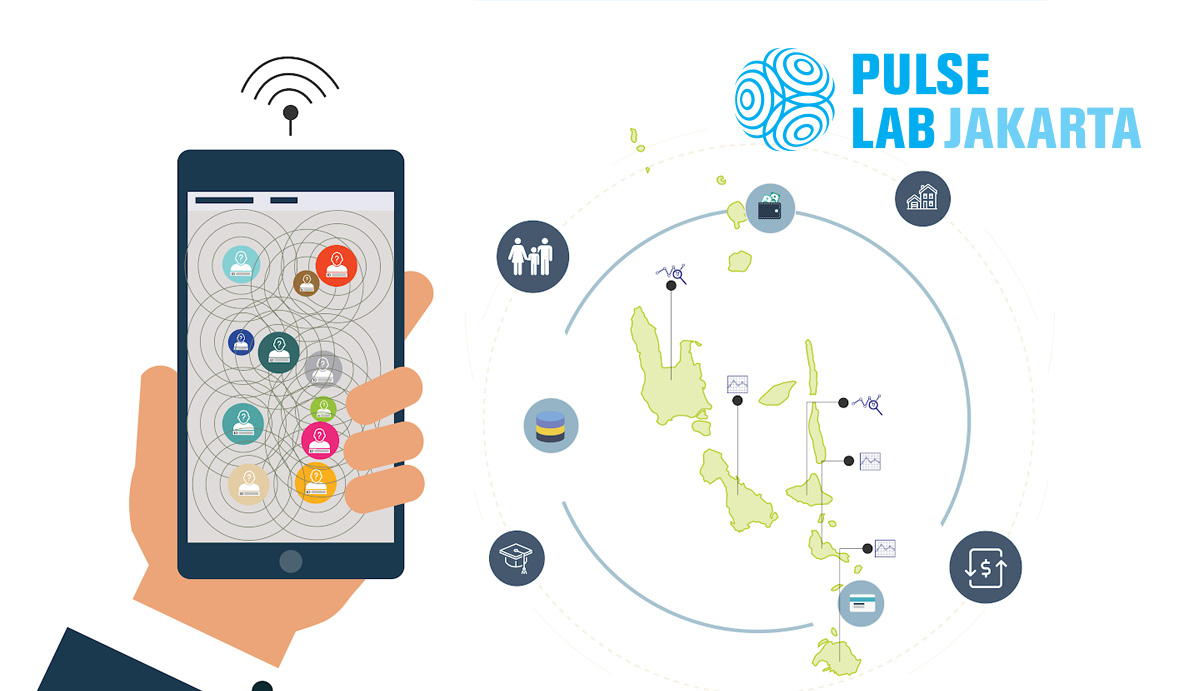
Start:
2018
End:
2018
|
2018
Strengthening Disaster Response Using Mobile Network DataLocation: Vanuatu 
In partnership with Digicel, PLJ used mobile network data to inform disaster response strategies in Papua New Guinea and Vanuatu. Analysis allowed for real-time evacuation mapping and predictive models for evacuee destinations, proving useful during subsequent natural disasters.
<p>In partnership with Digicel, Pulse Lab Jakarta has been engaged in a research project (funded by the UN Delivering Together Facility) to mine mobile network data for insights on natural disasters. Covering the Highlands Earthquake in Papua New Guinea and the Ambae Volcano in Vanuatu, PLJ has developed insights on internal displacement to inform the targeting of humanitarian assistance. Our analysis indicated that not only can mobile network data be used to map evacuations in near real-time, but there is also the potential of building predictive models for evacuee destinations. In Vanuatu, the analysis created operational impact as the Ambae Volcano erupted again in August 2018, and the Government requested insights on citizen displacement, which PLJ delivered in a timely manner. Conducting multifractal analysis of the network signals in Vanuatu, we found that regularity existed in the signals. The finding confirms the value of the data set as a source of insights on social phenomena and anomalies, such as natural disasters. Building on this research, we analysed the impact of Tropical Cyclone Donna on population flows and subscriber behaviour in Vanuatu, finding that the data set contained many useful signals of relevance to policy makers. We closed out the year by preparing baseline information on Samoa so that we are ready to conduct analysis and provide useful insights should a cyclone impact the country over the coming months. The preparation included mapping the locations of storm shelters to understand which cell towers might see an increase in load during a cyclone; understanding the ratio between subscriber density and population density to develop rough scaling factors for population flows; descriptive analysis of the different frequencies of commuting and migration between administrative units; and descriptive analysis of the social network.</p>
Domain
Disaster Response and Humanitarian Action
SDG
Sustainable Cities and Communities
Climate Action
Partnership for The Goals
Data
Mobile Network Data
Partners
UN Delivering Together Facility
Digicel
UNCT Papua New Guinea
UNCT Vanuatu
UNCT Samoa
|
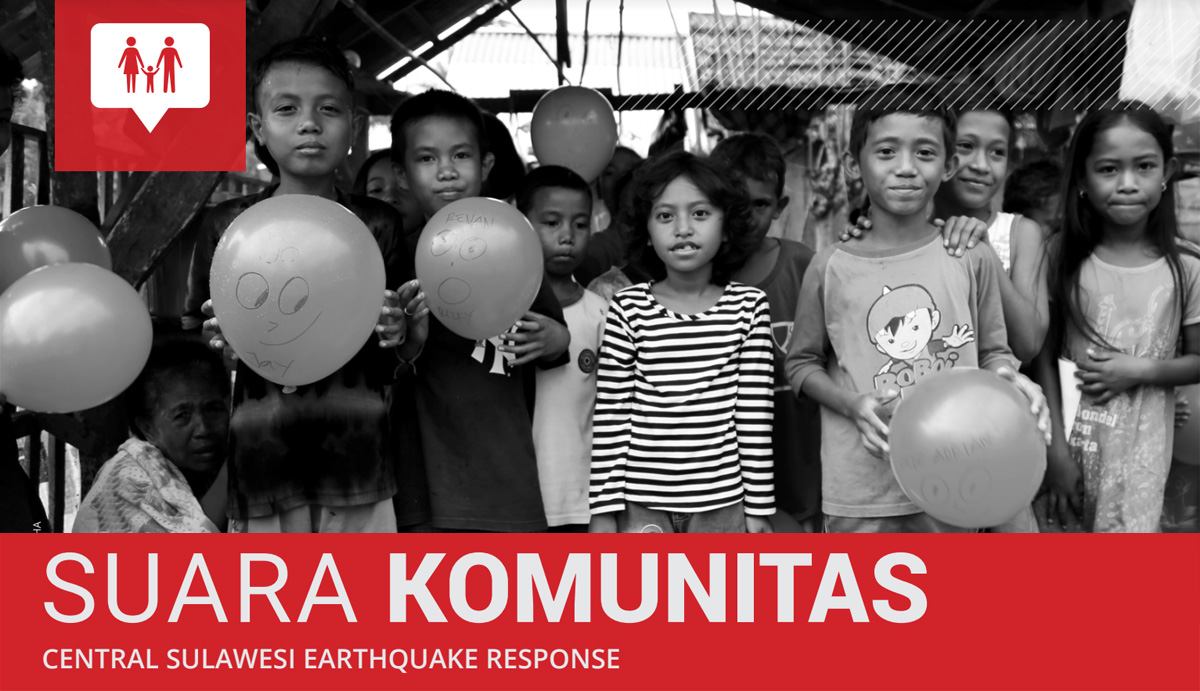
Start:
2018
End:
2018
|
2018
Suara Komunitas - Community Engagement News BulletinLocation: Indonesia 
PLJ collaborated with several agencies to launch Suara Komunitas, a news bulletin providing community feedback for humanitarian responders following the Central Sulawesi earthquake. The bulletin, informed by community engagement efforts and quantitative data, offered key insights into community sentiments, aiding in decision-making and response adaptation.
<p>Suara Komunitas – 'Community Voices' – is a community engagement news bulletin that presents feedback gathered from communities affected by the Central Sulawesi earthquake. Developed by PMI (Palang Merah Indonesia) and IFRC (International Federation of Red Cross and Red Crescent Societies) with support from UN OCHA, Pulse Lab Jakarta and UNICEF, the news bulletin is a product of the Community Engagement Working Group consisting of individuals from a range of agencies who meet weekly in Palu to present sector-based updates and feedback as well as coordinate collective action. The tool is designed to help humanitarian responders make decisions and adapt programming by providing insights into what communities are saying as the response progresses. The bulletin is informed by inter-agency community engagement efforts including discussions with affected people, community focus group discussions and radio programmes. It integrates quantitative data and qualitative information that complements the community feedback which humanitarians are responding to.</p>
Domain
Disaster Response and Humanitarian Action
Women's Empowerment and Gender Equality
SDG
Sustainable Cities and Communities
Climate Action
Partnership for The Goals
Data
Qualitative Data
Crowdsourced Data
Partners
UNICEF
PMI
IFRC
UN OCHA
|
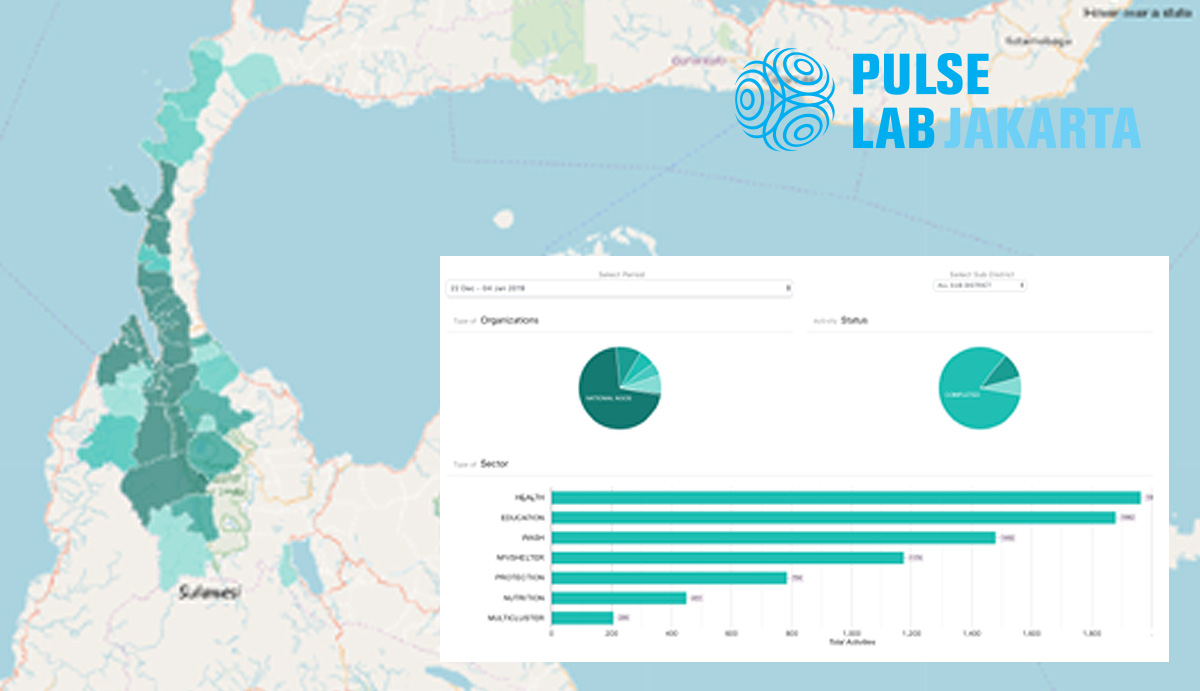
Start:
2018
End:
2018
|
2018
Humanitarian Response to The Sulawesi Earthquake and TsunamiLocation: - 
PLJ, UN OCHA, AHA Centre, and the Humanitarian Data Exchange collaborated to create a data visualization dashboard for the 2018 Central Sulawesi Earthquake and Tsunami. The dashboard utilized the 3W data set to highlight the ongoing humanitarian response status, providing visual representation of the response and indicating potential overlaps or gaps. This allowed the government and other organizations to identify potential humanitarian partners on the ground.
<p>Joining forces to support relief efforts for the September 2018 Central Sulawesi Earthquake and Tsunami, Pulse Lab Jakarta partnered with UN OCHA, AHA Centre and Humanitarian Data Exchange to create a data visualisation dashboard, which highlights the status of ongoing humanitarian response in the region. The dashboard uses the 3W ("Who Does What Where") data set which UN OCHA and AHA Centre receive from lead clusters and sector agencies (sector-specific coordination group of humanitarian organisations focused on strengthening preparedness and technical capacity to respond to humanitarian emergencies). Providing a visual representation of on going response, the dashboard is useful for indicating potential overlaps or gaps in response, as well as enabling the Government and interested organisations to identify potential humanitarian partners on the ground.</p>
Domain
Disaster Response and Humanitarian Action
SDG
Sustainable Cities and Communities
Climate Action
Partnership for The Goals
Data
Mobile Network Data
Displacement Tracking Matrix
Partners
UN OCHA
AHA Centre
Humanitarian Data Exchange
Humanitarian Country Team
|
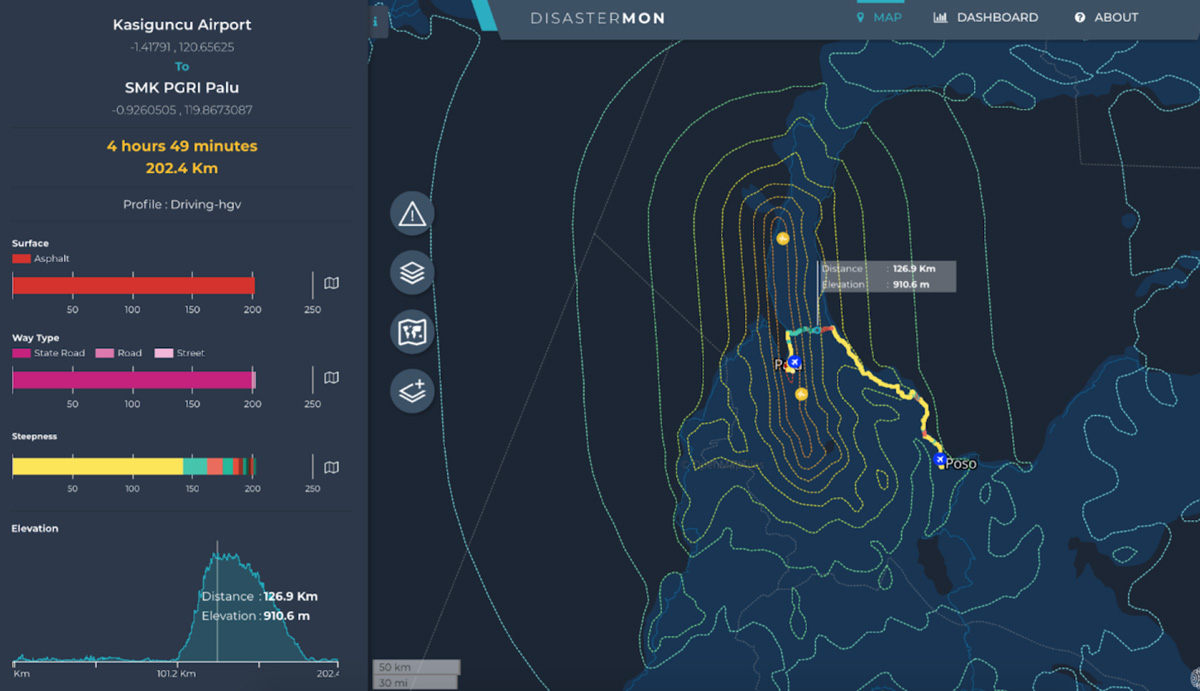
Start:
2018
End:
2018
|
2018
A Disaster Monitoring Big Data ToolLocation: Global World 
PLJ expanded their cyclone monitoring tool, CycloMon, into an integrated big data analytics tool, DisasterMon, for disaster monitoring and management of cyclones, earthquakes, hurricanes, and floods. The tool integrates data from various sources to provide timely insights related to logistics planning, social media communication, and socio-economic variables, potentially influencing future automated real-time disaster monitoring systems.
<p>Building on our cyclone monitoring tool called CycloMon, our team at the Lab has been developing an integrated big data analytics and visualisation tool to provide timely insights for natural disaster monitoring, emergency response and management of cyclones, earthquakes, hurricanes and floods in Indonesia and countries in the Pacific region. Nicknamed DisasterMon, the tool features three main data insight layers related to logistics planning, social media communication and socio-economic variables, which are based on multiple data sources, including open data platforms, national statistics, social media, among others. DisasterMon seeks to enhance natural disaster monitoring at the local, national and international levels using big data, and has the potential to influence future development of automated real-time disaster monitoring systems. The team is also exploring the development of other layers for volcano and wildfire disaster events, as well as the integration of additional data sets such as mobile network data.</p>
Domain
Disaster Response and Humanitarian Action
SDG
Sustainable Cities and Communities
Climate Action
Life on Land
Partnership for The Goals
Data
Social Media
Google Trends
Open Street Map
News API
Partners
OpenStreetMap
Twitter Humanitarian Data Exchange
|
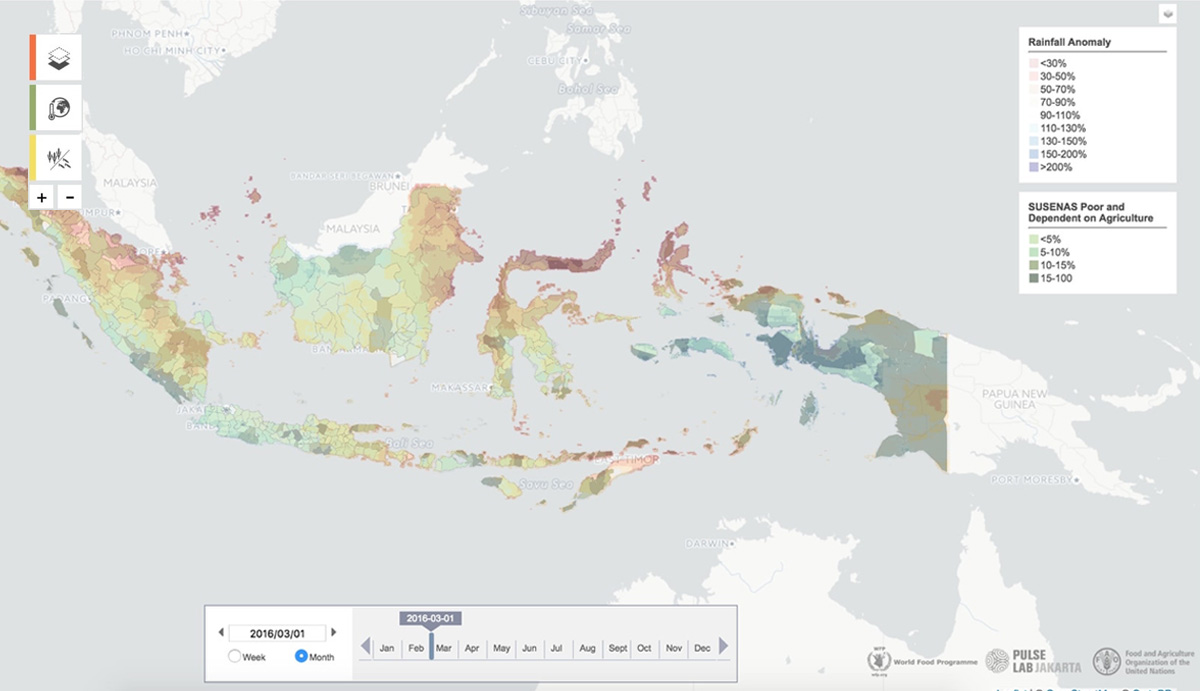
Start:
2018
End:
2018
|
2018
Scaling Up VAMPIRE Across The RegionLocation: Indonesia 
The VAMPIRE data tool, developed by PLJ and the World Food Programme, measures the impact of weather anomalies on food security. New features provide enhanced monitoring and early warning capabilities for weather extremes. At the WFP's 2018 Innovation Accelerator Bootcamp, the tool received funding to scale it up into a practical solution and was also made open source.
<p>The Executive Office of the President of the Republic of Indonesia welcomed the latest additions to VAMPIRE, a data tool developed jointly by World Food Programme and Pulse Lab Jakarta to measure the impact of weather anomalies (floods and droughts) on food security. The new features include tabular and graph data visualisation for selected timelines, enabling enhanced monitoring and early warning of weather extremes. More specifically, it includes new layers that show (i) days since the last rainfall and (ii) flood forecast which gives an idea of likely impact based on crop and population distribution overlays. At WFP's 2018 Innovation Accelerator Bootcamp in Munich, Germany, a joint team from PLJ and WFP put VAMPIRE through the paces of the bootcamp (focused on taking ideas and prototypes from an early to a mature stage) where VAMPIRE was ultimately pitched to an audience of investors, friends and partners of WFP. VAMPIRE received funding from WFP's sprint programme which is intended to help scale up the tool into a practical solution for the region. In addition, the code for VAMPIRE will be made open source, allowing interested stakeholders to conveniently apply the code and integrate the tool into their operations.</p>
Domain
Disaster Response and Humanitarian Action
Environment and Climate
SDG
Decent Work and Economic Growth
Sustainable Cities and Communities
Climate Action
Partnership for The Goals
Data
SUSENAS
Food Security Data
Goverment Statistics
Climate Data
Partners
World Food Programme
Food and Agriculture Organisation
Executive Office of the President of Indonesia (KSP)
|
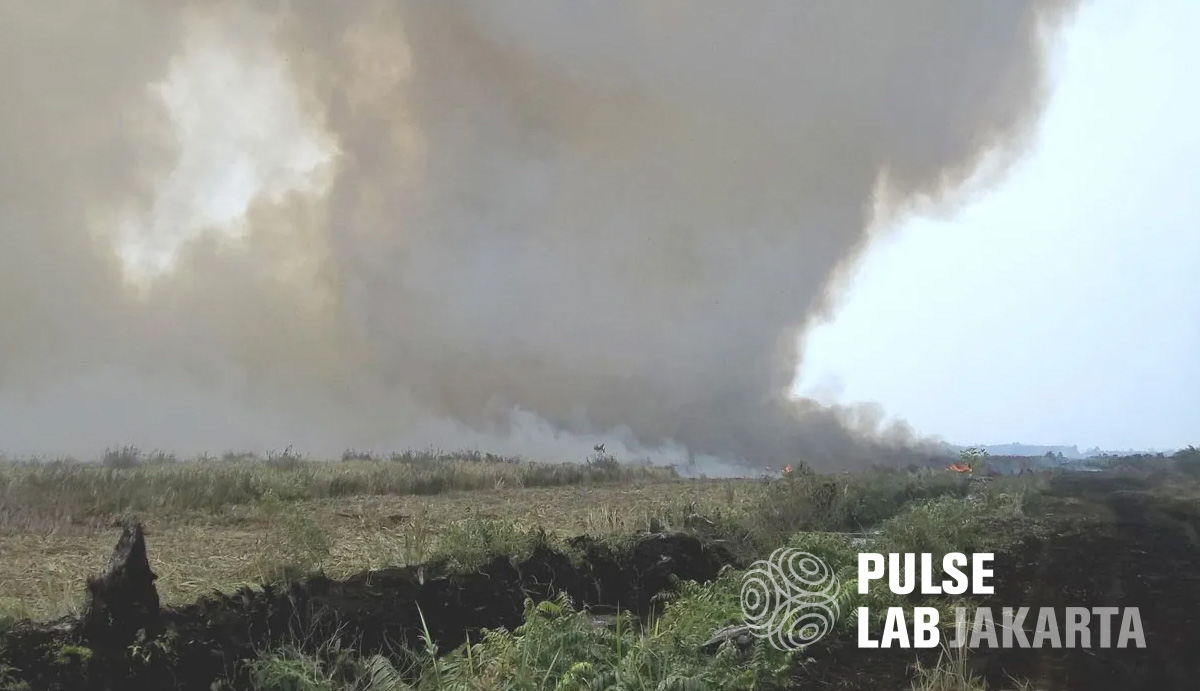
Start:
2018
End:
2018
|
2018
Nowcasting Air Quality Using TwitterLocation: Indonesia 
PLJ developed a model to improve real-time air quality information in regions affected by wildfires and haze in Indonesia. The model integrates real-time sensing and social media images, significantly improving forecast accuracy. PLJ is also assisting the National Information Resources Service in the Republic of Korea to develop a similar model.
<p>In some communities in Indonesia, real-time air quality information is not available, which is crucial for improving response efforts in regions affected by wildfires and haze. This gap inspired our data science team to develop a model that leverages real-time sensing and integrates social media images. The model produced at best, 87.24 per cent forecast accuracy - an improvement of 18.11 per cent compared to the baseline model (that uses only satellite and air quality information) based on 2014 data from Pekanbaru, Riau. Pulse Lab Jakarta has also been working closely with the National Information Resources Service in the Ministry of Interior Safety of the Republic of Korea to provide technical assistance for a similar model that the Ministry is developing to monitor the prevalence of fine dust particles in the Republic of Korea.</p>
Domain
Environment and Climate
SDG
Good Health and Well-being
Sustainable Cities and Communities
Climate Action
Life on Land
Data
Social Media
Satellite Imagery
Air Quality Index
Partners
Twitter
|
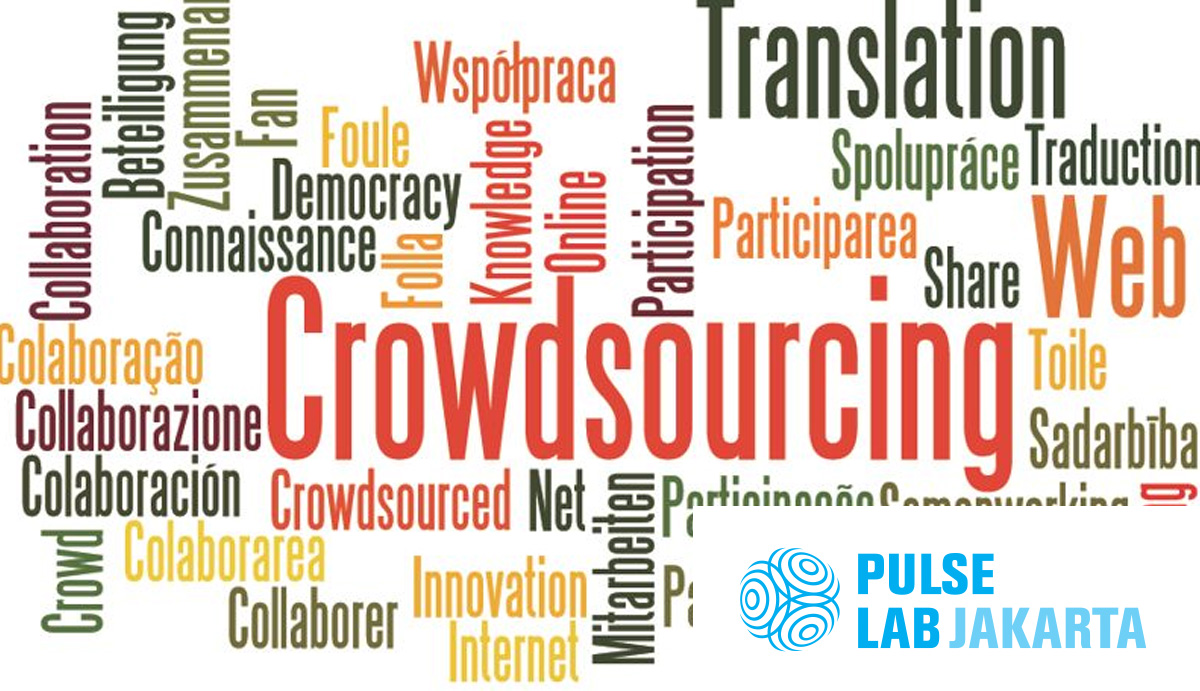
Start:
2018
End:
2018
|
2018
Estimating The Quality of Crowdsourced TranslationsLocation: Indonesia 
The second phase of Translator Gator, a crowdsourcing translation platform, culminated with the release of a dataset comprising almost 15 million gaming activities. A technical paper detailing the approach and results was accepted to the 2018 IEEE/ACM International Conference on Advances in Social Networks Analysis and Mining.
<p>To wrap up the second phase of Translator Gator (the Lab's web-based crowdsourcing translation platform), we publicly released the data that was crowdsourced online. Totalling almost 1.5 million gaming activities performed by nearly 4,000 registered players, the complete data set is available for download on TranslatorGator.org and includes disaster-related keywords for almost 30 languages spoken throughout the ten ASEAN Member States and Sri Lanka. We analysed the data set to estimate the quality of the crowdsourced translations, by creating a set of models using features from the language corpora to classify the (a) translators, (b) source expressions and (c) translated expressions. Using two regression models and two supervised learning methods, the results were better than those produced by the baseline approach that relies on peer-review scores. A technical paper detailing the approach and results were submitted and accepted to the 2018 IEEE/ACM International Conference on Advances in Social Networks Analysis and Mining.</p>
Domain
Strategic Exploration
SDG
Industry, Innovation, and Infrastructure
Climate Action
Partnership for The Goals
Data
Crowdsourced Data
Partners |
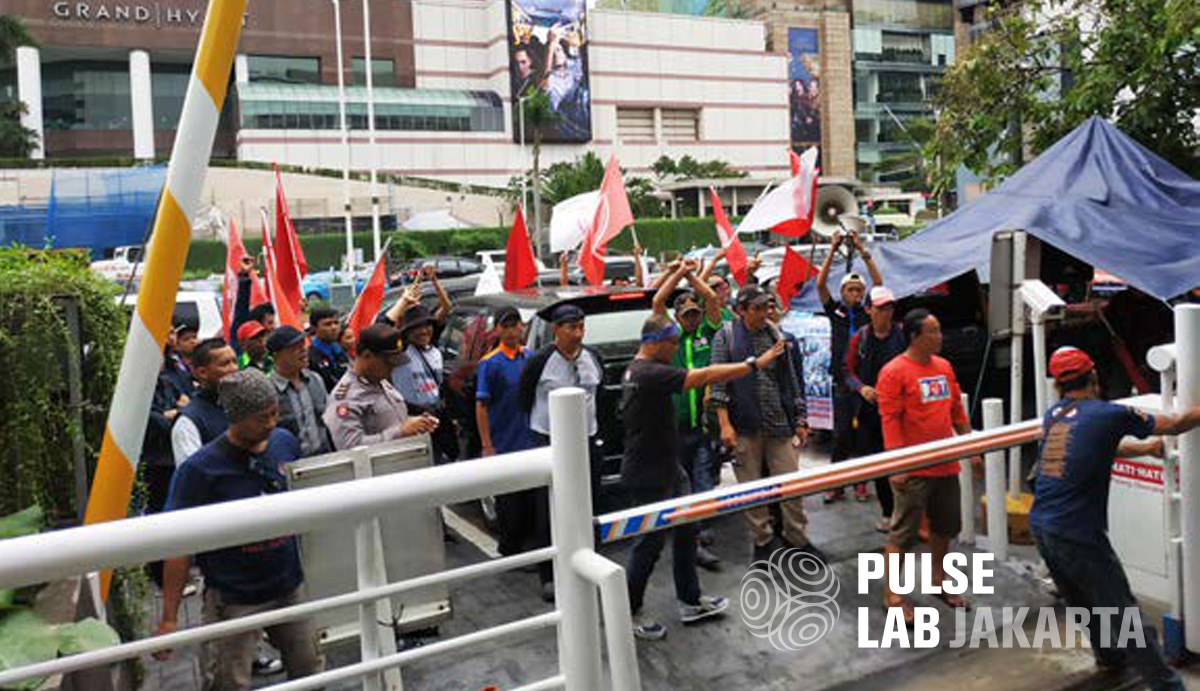
Start:
2018
End:
2018
|
2018
Analysing Twitter Data Streams to Detect Irregular EventsLocation: Indonesia 
PLJ used Twitter data to detect irregular events in Greater Jakarta, confirming the potential of social media data to detect urban events, thus aiding city officials to improve emergency response times.
<p>With a view to discovering new approaches that can detect irregular events such as large gatherings and natural disasters in near real-time, Pulse Lab Jakarta analysed Twitter data from eight locations in Greater Jakarta to identify events taking place and then compared their temporal and spatial aspects with signals from the data set. The team was able to detect with reasonable accuracy several events, for example Sunday Car Free Days, based on signal anomalies. The results confirm that social media data can be harnessed to detect special events in urban areas, which may vary across time and space. Early event detection can help city officials with setting up alert measures and improving response time in the event of public emergencies.</p>
Domain
Disaster Response and Humanitarian Action
Urban and Regional Dynamics
SDG
Industry, Innovation, and Infrastructure
Sustainable Cities and Communities
Partnership for The Goals
Data
Social Media
Partners
Twitter
|
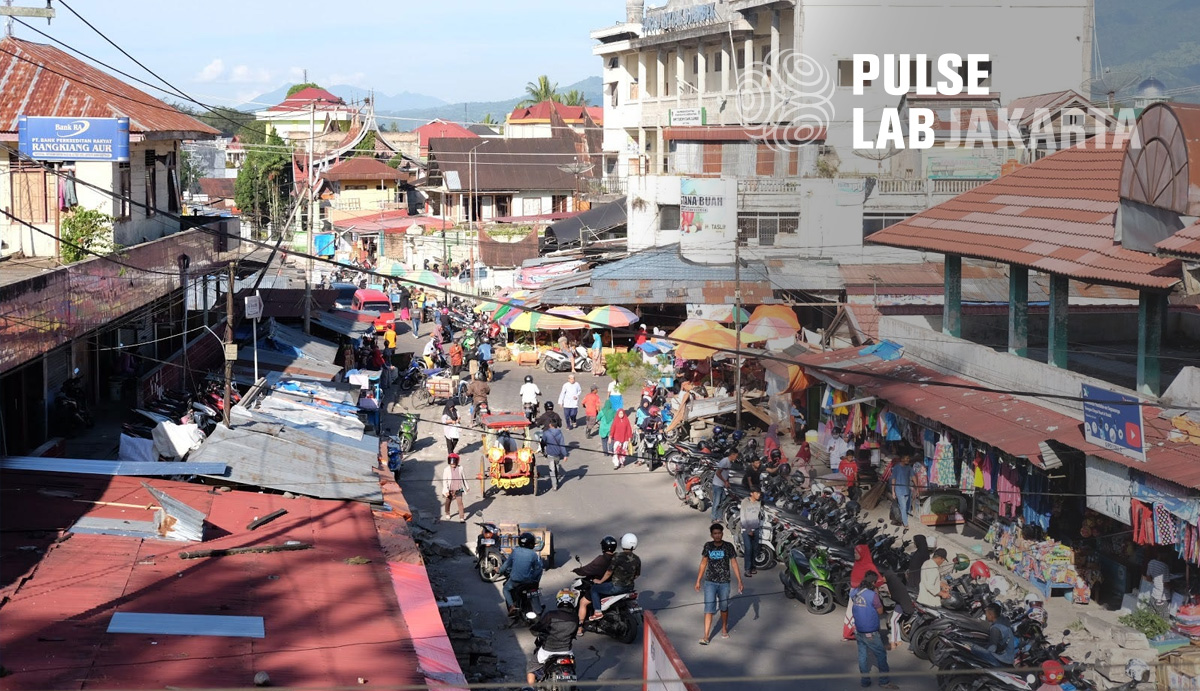
Start:
2018
End:
2018
|
2018
Rural to Urban Migration in IndonesiaLocation: Indonesia 
Working with Empatika, PLJ researched the experiences of rural-to-urban migrants in Indonesia using mobile network data. The insights generated revealed that internal migration is significantly underestimated in official statistics.
<p>Commissioned by the World Bank, Pulse Lab Jakarta and Empatika conducted research into the experiences of rural to urban migrants in Indonesia. PLJ led the quantitative component of the project which used mobile network data from Telkomsel and XL to develop statistics on the source communities of migrants and magnitude of short term migration to seven major cities across the country. The analysis informed the targeting of the qualitative research conducted by Empatika as well as generated new insights on migration, finding that internal migration is significantly underestimated in official statistics.</p>
Domain
Poverty, Financial Inclusion, and Economic Development
Urban and Regional Dynamics
SDG
Industry, Innovation, and Infrastructure
Sustainable Cities and Communities
Partnership for The Goals
Data
Qualitative Data
Mobile Network Data
Partners
XL Axiata
World Bank
Empatika
|
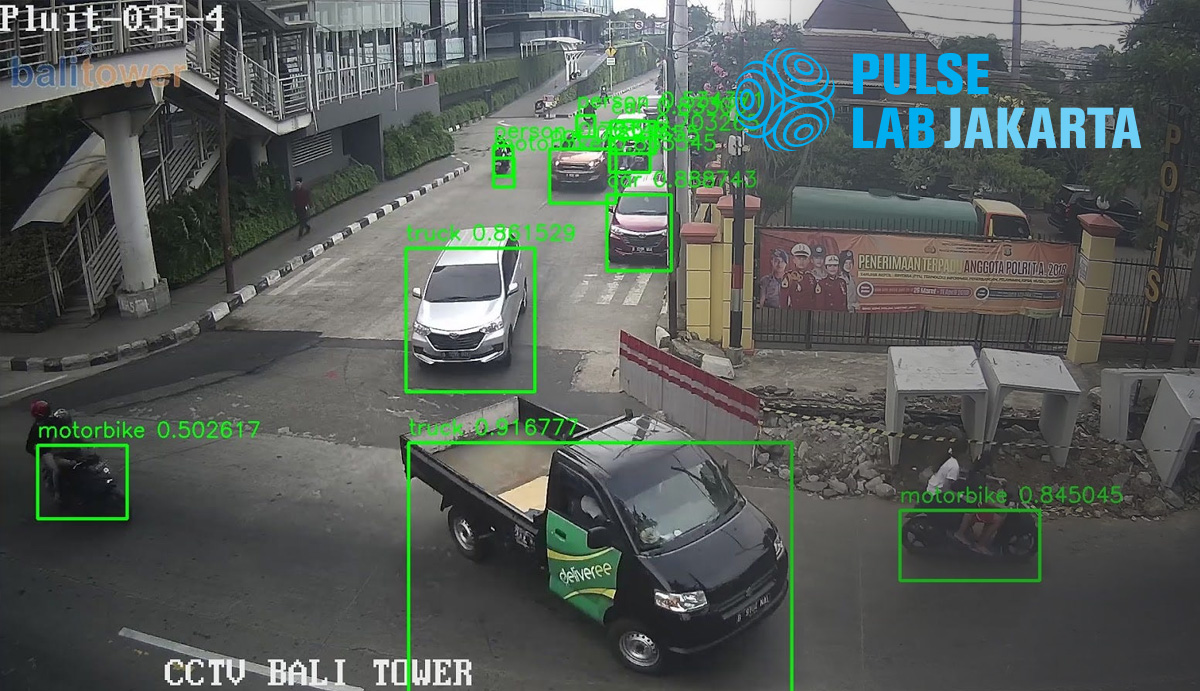
Start:
2018
End:
2018
|
2018
Analysing CCTV Data to Improve Traffic Safety in JakartaLocation: Indonesia 
In collaboration with Jakarta Smart City, PLJ participated in the University of Chicago’s Data Science for Social Good fellowship, using deep learning methods to analyze CCTV data in Jakarta for improving traffic safety. The approach is now being integrated into Jakarta Smart City’s information systems.
<p>Pulse Lab Jakarta together with Jakarta Smart City had the opportunity to participate in the University of Chicago's Center for Data Science and Public Policy annual Data Science for Social Good fellowship, a summer programme training aspiring data scientists to work with government and non-profit partners on innovative projects with social impact. Our project analysed CCTV data in Jakarta for the purpose of improving traffic safety, and was selected as one of the global challenges that the fellows took on for their three-month programme. Deep learning methods were used to identify objects in the video frames - a task that humans can do well but one that is labour-intensive and hard to scale, making computer vision a more efficient approach. These tasks helped in the realisation of a pipeline that converts raw, unstructured video frames into data on traffic flows and traffic safety. The approach is now being integrated into Jakarta Smart City's information systems, and scaled to cover the 3000 or so CCTV cameras at traffic intersections in Jakarta. A research paper on the project received a Highlighted Paper Award at the NIPS 2018 AI for Social Good workshop.</p>
Domain
Urban and Regional Dynamics
SDG
Industry, Innovation, and Infrastructure
Sustainable Cities and Communities
Partnership for The Goals
Data
CCTV Data
Partners
Jakarta Smart City
University of Chicago’s Data Science forSocial Good Fellowship programme
|
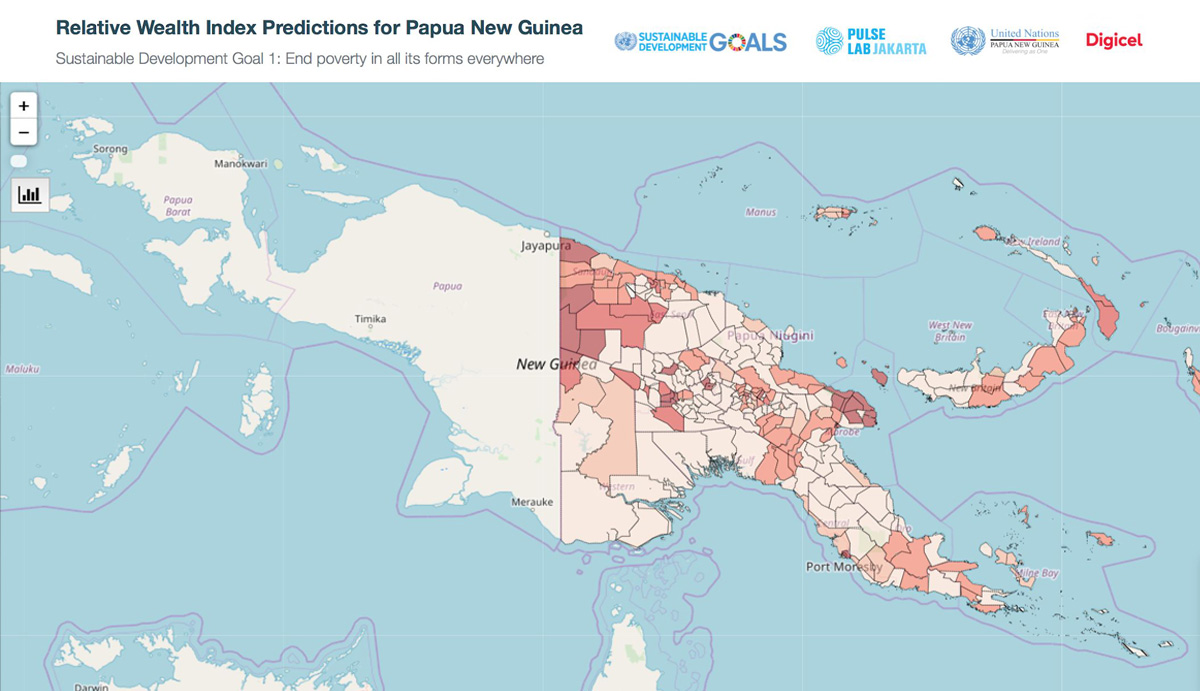
Start:
2018
End:
2018
|
2018
PNG Poverty MappingLocation: Papua New Guinea 
PLJ partnered with UN DOCO and the UN Country Team in Papua New Guinea to develop a model predicting wealth and poverty based on mobile network data. The model's predictions inform better targeted area-based development programs in PNG.
<p>Funded by the UN Delivering Together Facility, and in partnership with UN DOCO, the UN Country Team in Papua New Guinea and Digicel, Pulse Lab Jakarta developed a model to predict wealth and poverty at a high degree of spatial granularity based on mobile network data and a survey of mobile network users. This project was inspired by similar work conducted in Rwanda by a team of academics. Our aim was to replicate the methods and operationalise the approach to SDGs Area of work inform development practice, which is of particular relevance due to the data sparse context. The predictions from the model will be compared to findings from the ongoing demographic health survey to understand the accuracy of these predictions in the context of the general population - not just mobile network users. The United Nations in PNG is using the findings to target better areabased development programmes, and plans to rerun the model for more frequent impact tracking.</p>
Domain
Poverty, Financial Inclusion, and Economic Development
SDG
No Poverty
Decent Work and Economic Growth
Reduced Inequality
Sustainable Cities and Communities
Data
Mobile Network Data
Customized Survey
Partners
UN Delivering Together Facility
Digicel
UNCT Papua New Guinea
|
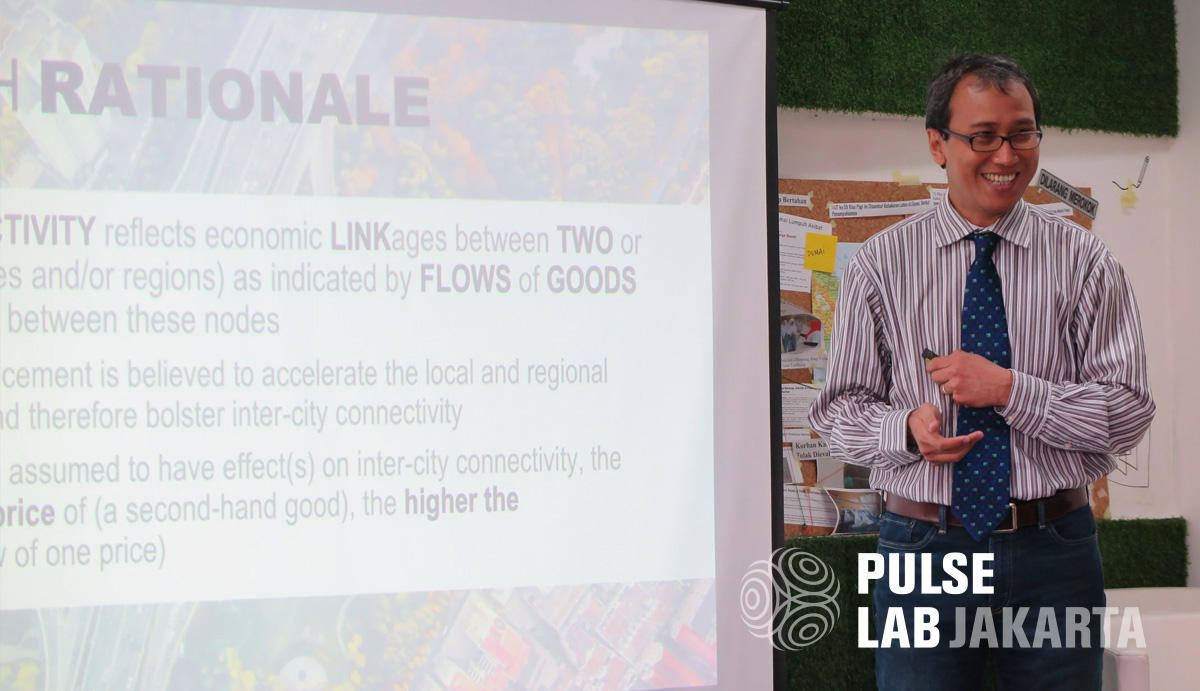
Start:
2018
End:
2018
|
2018
Estimating City-Level Poverty RatesLocation: Indonesia 
PLJ developed machine-learning models to predict city-level poverty rates using e-commerce data from OLX. The models demonstrated high accuracy, suggesting that e-commerce data can be effectively used for poverty predictions.
<p>Beyond business development, e-commerce data can be useful for other purposes, for example as an alternative source of insights on poverty rates. Examining 2016 OLX data that has been aggregated at the city level for 118 cities in Indonesia, our team got together with other researchers during one of the Lab's data dives to test the accuracy of using this data set to estimate city-level poverty rates. Three machinelearning models were developed using Artificial Neural Network (ANN) and Support Vector Regression (SVR) methods. The models were assessed against an accuracy performance metric, which demonstrated that e-commerce data can be used to predict poverty levels within each city with high level of accuracy and significantly low error margins. The results were validated by comparison to poverty level records from Statistics Indonesia (BPS). The research method is being refined to measure poverty rates for other administrative levels, such as at the province and sub-district level.</p>
Domain
Poverty, Financial Inclusion, and Economic Development
SDG
No Poverty
Decent Work and Economic Growth
Reduced Inequality
Sustainable Cities and Communities
Data
E-Commerce Data
Goverment Statistics
Partners
OLX
StatisticsIndonesia (BPS)
|
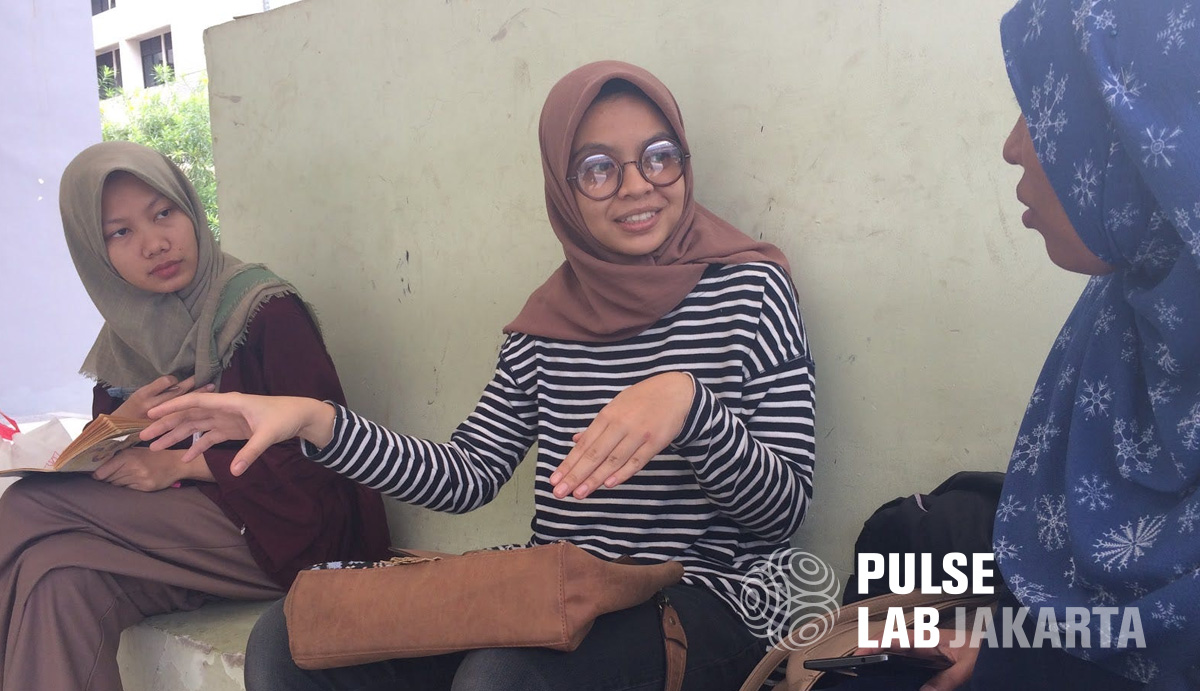
Start:
2018
End:
2018
|
2018
Urban Planning & Flood Mitigation in BandungLocation: Indonesia 
Teaming up with the Department of Communication and Informatics of Bandung City Government and Labtek Indie, PLJ tested a map-based flood information dashboard for flood mitigation efforts. The project emphasized a dashboard's need to integrate diverse data sets, be relevant to a local context, repurpose existing technology, and enable interagency cooperation.
<p>Useful data that can be used to inform flood mitigation efforts in urban areas are often scattered across different government units. In addition, it's not uncommon for these data sets to be out-of-date, creating a challenge for the Government and citizens to effectively prepare and respond to flooding events. Pulse Lab Jakarta teamed up with the Department of Communication and Informatics of Bandung City Government and Labtek Indie (a design research company based in Bandung) to test the usability of a map-based flood information dashboard. To do so, we adopted human centered design to understand the behaviours and needs of those who produce and use the data. We arrived at these design principles: i) a dashboard should not only rely on conventional data sets that may be difficult for city officials to get their hands on, but should also integrate other available data such as citizen-generated data; ii) a dashboard needs to harness the local 'instinct' to be relevant for users in a local context; iii) a dashboard does not need to be the development of a technology from scratch - governments can repurpose existing technology and infrastructure to achieve similar goals; and iv) a dashboard should have practical application that can enable inter-agency cooperation. Based on feedback from the usability testing, the map-based flood information dashboard eventually evolved into a more pragmatic idea of a traffic light minitron* system that can inform citizens of alternative routes to take during a flood. A prototype brief has been submitted to Diskominfo Bandung.</p>
Domain
Urban and Regional Dynamics
Environment and Climate
SDG
Sustainable Cities and Communities
Climate Action
Partnership for The Goals
Data
Qualitative Data
Partners
Department of ommunication and Informatics of Bandung City Government
Labtek Indie
|
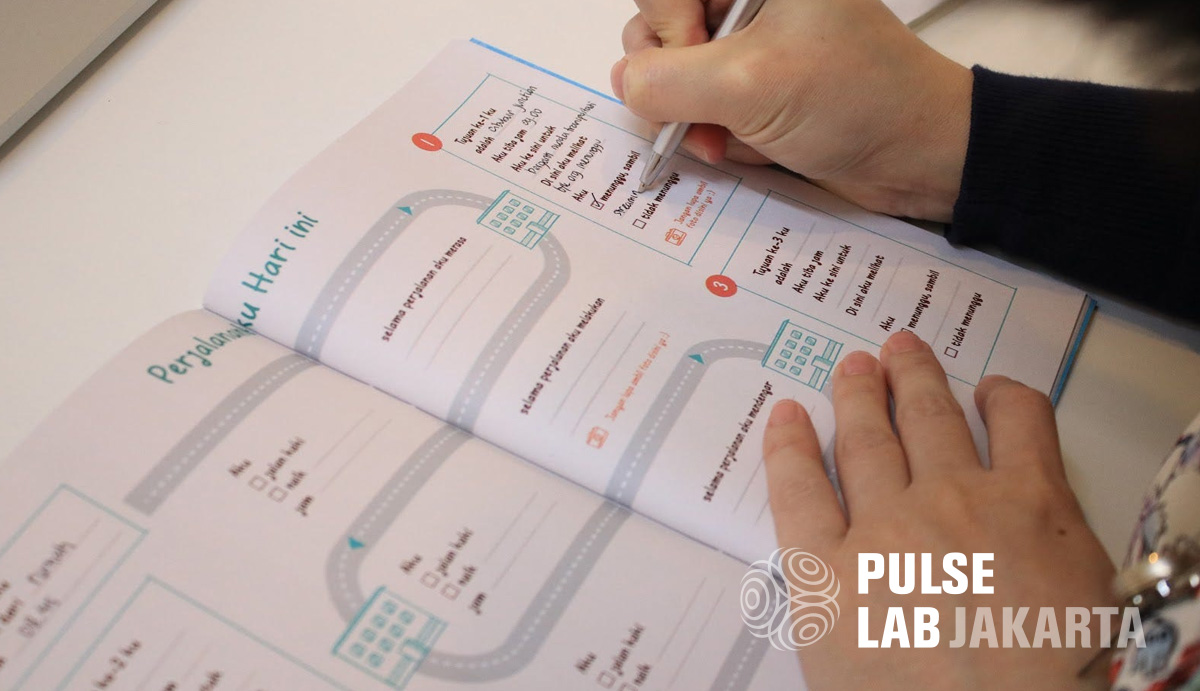
Start:
2018
End:
2018
|
2018
After Dark Safe Transit for Women Travelling at NightLocation: Indonesia 
PLJ collaborated with UN Women to investigate women's urban mobility at night and identify safety interventions. Their research identified four types of personas, all of whom shared night-time travel anxieties. Additionally, PLJ worked with the International Organization for Migration, using mobile network data to assess internal displacement after disasters in Central Sulawesi. The insights can inform government disaster response, ensuring displaced individuals are not overlooked, thereby improving the effectiveness of aid distribution.
<p>2018: A recent scoping study conducted by UN Women in Jakarta found that women are more vulnerable when travelling after dusk, especially in less crowded areas. This finding inspired a research collaboration between Pulse Lab Jakarta and UN Women to gather insights on women's mobility and travel choices in urban areas, in order to design practical interventions that can improve their safety at night. Insights from the field research conducted in Semarang, Surabaya and Medan challenged the notion that a woman's safety is solely dependent on adequate infrastructure and public facilities. The research team spoke with 37 women who shared their experiences and perspectives. Four types of personas emerged: [•] The Anxious Newcomer who recently migrated to the city; [•] The Female Warrior who puts her work above her own safety; [•] The Moonlighter who juggles multiple jobs to stay afloat; and [•] The Overprepared Strategist who spends a lot of time coming up with defence strategies. All these personas have different travel routines but their anxiety about travelling at night is a commonality. With a view to complementing insights gathered from the After Dark field research, PLJ invited individuals across different sectors to participate in a co-design workshop in December 2018. The workshop was a unique opportunity for these individuals to offer inputs to support the analysis and synthesis phase of the research. The design challenge was narrowed into three areas of intervention, namely: the role of bystanders, improving public transportation services and bolstering law enforcement. Since the design workshop was not so much about the details of each prototype, the emphasis was placed on unearthing new insights and understanding the rationale behind the design ideas. The team is currently synthesising insights from the field research and co-design workshop, which will be published into a Pulse Story research report in 2019.</p>
<p>Leveraging Pulse Lab Jakarta's advanced data analytics capacity and experience in developing disaster risk reduction data analytics tools gained from prior modelling with Digicel data, IOM joined forces with the Lab to undertake research using data from an Indonesian telecom. In particular, the research aimed to gather insights on internal displacement throughout the most affected districts in Central Sulawesi with a view to developing a proof-of-concept on the feasibility of using mobile network data for effective displacement assessment. harnessed to support government-led disaster resilience efforts. The workshop was also intended to gather feedback to inform further development of the visualisation dashboard and explore adoption and scaling of the tool to aid An interactive visualisation was designed to make sense of the results. It communicates the distribution of subscribers in Palu, Sigi and Donggala; highlights the most popular destinations where people travelled to after the disasters; and provides an estimate of the number of displaced subscribers based on analysis of subscribers' movements before and after the disasters. Representatives future disaster response. How to scale up the tool and nurture an ecosystem in which it can be maintained was a critical part of the feedback discussion. This included inputs on relevant policies that should be put in place to support such an ecosystem, and the best positioned stakeholders to become custodians and ensure its sustainability. Our analysis demonstrates that by identifying the movement of affected cohorts of a population, we can also ensure that they are not left behind in the Government's disaster response and resilience strategy. The case of the 2018 Central Sulawesi disaster episodes revealed that data on displaced citizens is scarce, hampering the speed and effectiveness of humanitarian agencies in from the Indonesian Government, distributing vital resources to those most in need. There's still more research United Nations, and mobile telecoms were then invited to participate in a training workshop to discuss how mobile network data can be better to be done on how mobile network data can be harnessed to inform the Government's disaster response effort, and this proof-of-concept demonstrates the value of the approach and how it can be applied in different disaster scenarios to reduce the scope of impact.</p>
Domain
Urban and Regional Dynamics
Women's Empowerment and Gender Equality
SDG
Gender Equality
Reduced Inequality
Sustainable Cities and Communities
Partnership for The Goals
Data
Qualitative Data
Partners
UN WOMEN
MoF
Medan City
Gojek Indonesia
|
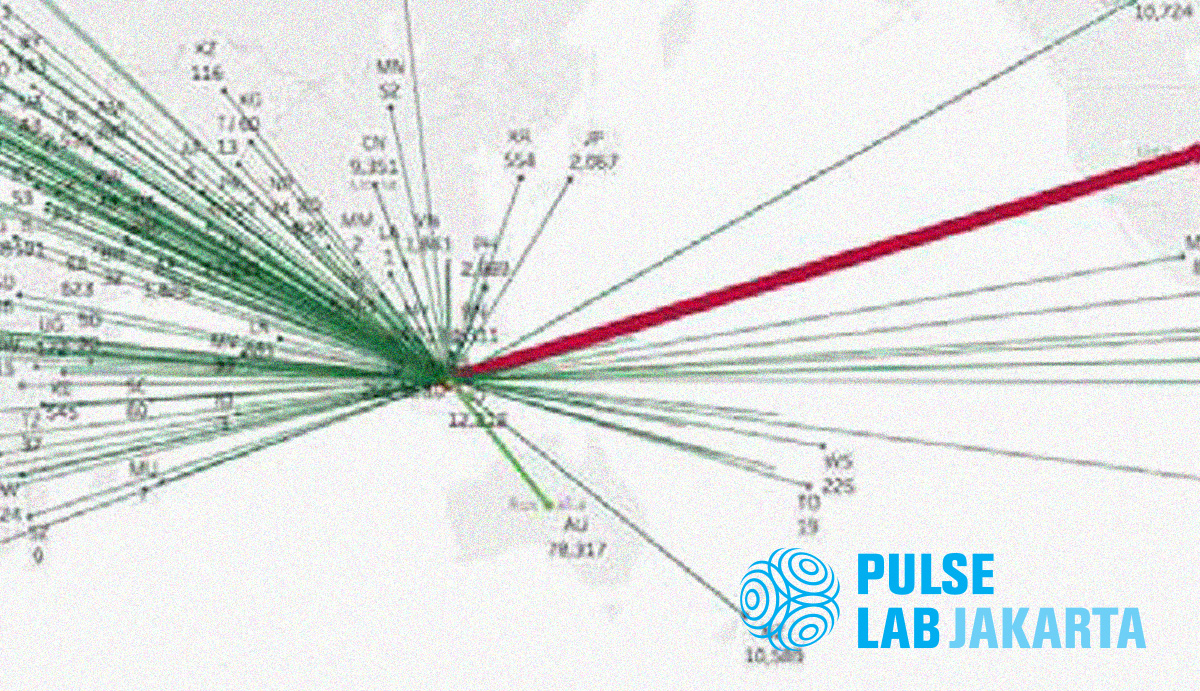
Start:
2018
End:
2018
|
2018
Research Dive: Urban & Regional DevelopmentLocation: Indonesia 
PLJ's sixth Research Dive for Development in March 2018 engaged academics in analyzing urban development challenges using emerging data sources. Teams investigated regional policy, healthcare accessibility, water infrastructure, and energy consumption using data from news media, health and transport locations, waterworks customer data, and social media. The technical report documents their findings, demonstrating how new data can shed light on complex urban issues.
<p>Based on a report by the Organisation for Economic Co-operation and Development (OECD), roughly half of the world’s population now lives throughout urban communities and that number is expected to increase in the coming decades. The challenges in urban area are manifold, and are especially intertwined in the areas of education, healthcare, access to clean water, inter alia. The emergence of new sources of data has created new approaches and opportunities to tackle many of these urban challenges, notably with access to information (and insights) that were not previously available from traditional datasets.</p>
<p>On 25-28 March 2018, twelve academics and researchers from across Indonesia, along with members from Pulse Lab Jakarta’s team took part in the Lab’s sixth edition of Research Dive for Development. The participants were divided into four research teams, each tasked with taking on a specific aspect of urban and regional development and assigned a dataset. Specifically, the tasks included: (1) Designing regional development policy, by analysing social events, news media data and its network based on GDELT (a global news media monitoring platform); (2) Assessing the accessibility to (emergency) health facilities in Sumatra, by analysing different datasets including transportation infrastructure distribution and health facility locations; (3) Monitoring water access for water supply infrastructure planning, by analysing several datasets including municipal waterworks customer distribution data; and (4) Inferring energy consumption towards urban development, by combining data on social media activity density and socio-economics statistics.</p>
<p>This technical report outlines the findings from the research sprint and is structured as follows:</p>
<ol>
<li>The first paper describes the datasets that were assigned to the teams during the event.</li>
<li>The second paper explores the correlation between newsroom reporting and actual social events on the ground based on GDELT data, and discusses how the findings may be used to identify subject matters for regional cooperation and national development planning.</li>
<li>The third paper assesses the levels of exposure to two disasters of interest (flooding and haze) in Pekanbaru using multiple sources of data, and examines accessibility to health and potential evacuation facilities in order to propose ideal sites for shelter construction.</li>
<li>The fourth paper highlights observations from the results of two surveys from the Local Clean Water Company (PDAM) and the Indonesia Infrastructure Initiative (INDII), and proposes a solution to one of the major problems identified using supporting evidence.</li>
<li>The fifth paper investigates the correlation between the energy consumption by districts and the daily activities of Twitter users, and outlines a statistical model the team designed to infer the daily electricity consumption in Bali using daily Twitter activities.</li>
</ol>
<p>Pulse Lab Jakarta is grateful for the cooperation of state-owned electricity company (PLN) Bali, Indonesia Australia Partnership for Infrastructure (KIAT), Institut Teknologi Bandung, Institut Teknologi Sepuluh Nopember, National Statistics Agency Nusa Tenggara Barat, Sekolah Tinggi Ilmu Statistik, Univesitas Andalas, Universitas Gadjah Mada, Universitas Indonesia, Universitas Jember, Universitas Multimedia Nusantara, Universitas Muhammadiyah Gorontalo, Universitas Padjajaran, Universitas Tanjungpura, Universitas Udayana, and Politeknik Ujung Pandang. Pulse Lab Jakarta is grateful with the support from DFAT Australia. Knowledge Sector Initiative (KSI) has committed to support the next research event.</p>
Domain
Urban and Regional Dynamics
SDG
Good Health and Well-being
Decent Work and Economic Growth
Reduced Inequality
Sustainable Cities and Communities
Data
Social Media
Geospatial Data
Geospatial Knowledge Graph
Hospital Data
Open Street Map
News API
Global Database of Events, Language and Tone (GDELT)
Water Consumption
Electricity Data
Partners
Bappenas
Indonesia Australia Infrastructure Partnership (KIAT)
|
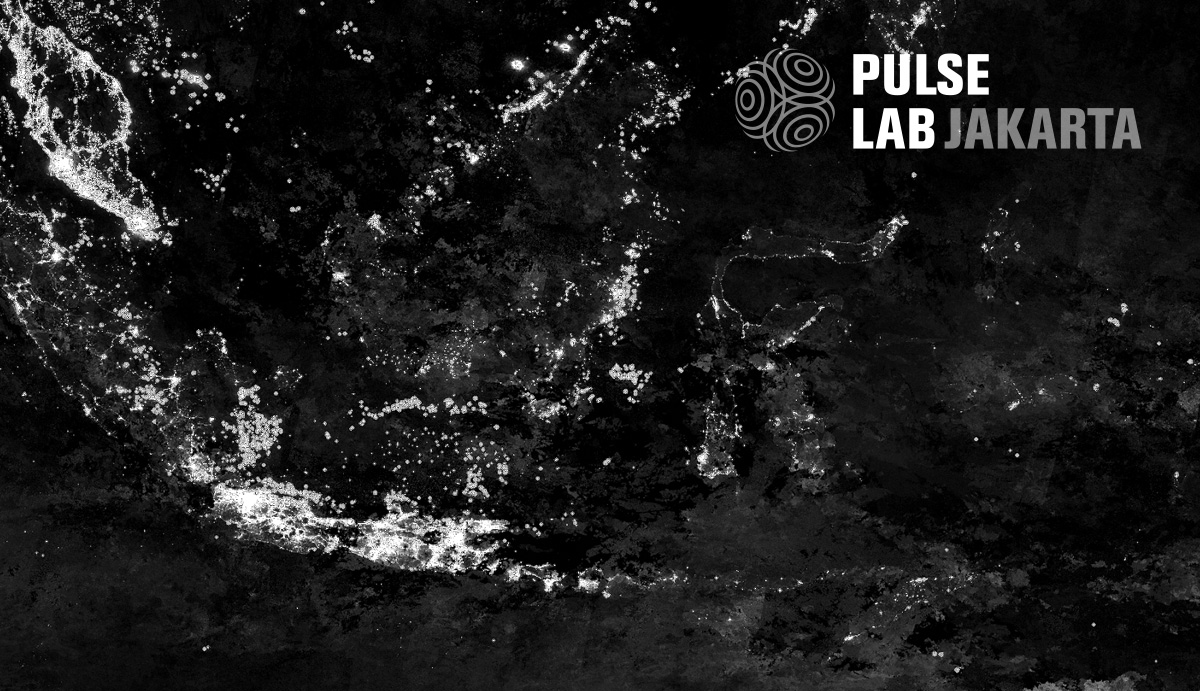
Start:
2018
End:
2018
|
2018
Research Dive: AI and Machine Learning for Estimating PovertyLocation: Indonesia 
PLJ convened academics, officials, and researchers to explore big data for improving poverty reduction strategies in July 2018 for the Research Dive. While Indonesia has made significant strides in poverty reduction, with the lowest rate of 10% in 2017, many citizens remain vulnerable. The research dive aimed to leverage technological advancements and big data analytics to refine estimates of poverty and enhance citizens' quality of life.
<p>The Government of Indonesia has made significant progress in reducing poverty over the past few years, recording its lowest poverty rate of ten per cent in 2017 measured by income. Many citizens still remain vulnerable given their marginal position above the national poverty line. But how governments go about estimating poverty, in order to better target programmes, has never been an easy task. Today, technological advancements are enabling researchers to use new and efficient methods to learn more about people’s quality of life. In particular, with more and more big data sources emerging, researchers are seeing the benefits of big data analytics for reducing poverty and improving citizens’ well-being.</p>
<p>From 15-18 July 2018, Pulse Lab Jakarta research dive brought together academics, public officials and researchers to dive into a few big data sets to develop new methods and insights on burning policy questions around poverty reduction. An underlying goal of this Research Dive was to support the Indonesian Government’s development agenda using artificial intelligence and machine learning, specifically efforts geared towards achieving Sustainable Development Goal number one on zero poverty. There were four teams and each was assigned a different dataset with a unique research focus: (1) Measuring Vulnerability to Poverty Using Satellite Imagery, (2) Estimating City-level Poverty Rates Based on E-commerce Data, (3) Using Twitter Data to Estimate District-Level Poverty in Greater Jakarta, and (4) Exploring the Connection Between Social Media Activities and Poverty.</p>
<p>Pulse Lab Jakarta is grateful for the cooperation of Ministry of National Development Planning, SMERU, Humanitarian Data Exchange, The National Team for the Acceleration of Poverty Reduction (TNP2K), Directorate of Central Data and Information Ministry of Social Affairs, OLX Indonesia, The National Institute of Aeronautics and Space (LAPAN), Universitas Padjadjaran, Universitas Gadjah Mada, Universitas Muhammadiyah Gorontalo, Universitas Udayana, World Food Programme, Institut Teknologi Sepuluh Nopember, National Statistics Agency (BPS), Telkom University, Bina Nusantara University, STMIK Akakom Yogyakarta, Pertamina University, and Sam Ratulangi University. Pulse Lab Jakarta is grateful for the support from Knowledge Sector Initiative (KSI), the Artificial Intelligence Journal and the Department of Foreign Affairs and Trade (DFAT) Australia.</p>
Domain
Poverty, Financial Inclusion, and Economic Development
SDG
No Poverty
Decent Work and Economic Growth
Industry, Innovation, and Infrastructure
Sustainable Cities and Communities
Partnership for The Goals
Data
Social Media
Satellite Imagery
E-Commerce Data
Jitupasna Data
Consumer Price Index
Gross Domestic Product
Regional Income Distribution
Administrative Data
Partners
Bappenas
Ministryof Social Affairs
Knowledge Sector Initiative
Artificial Intelligence Journal
|
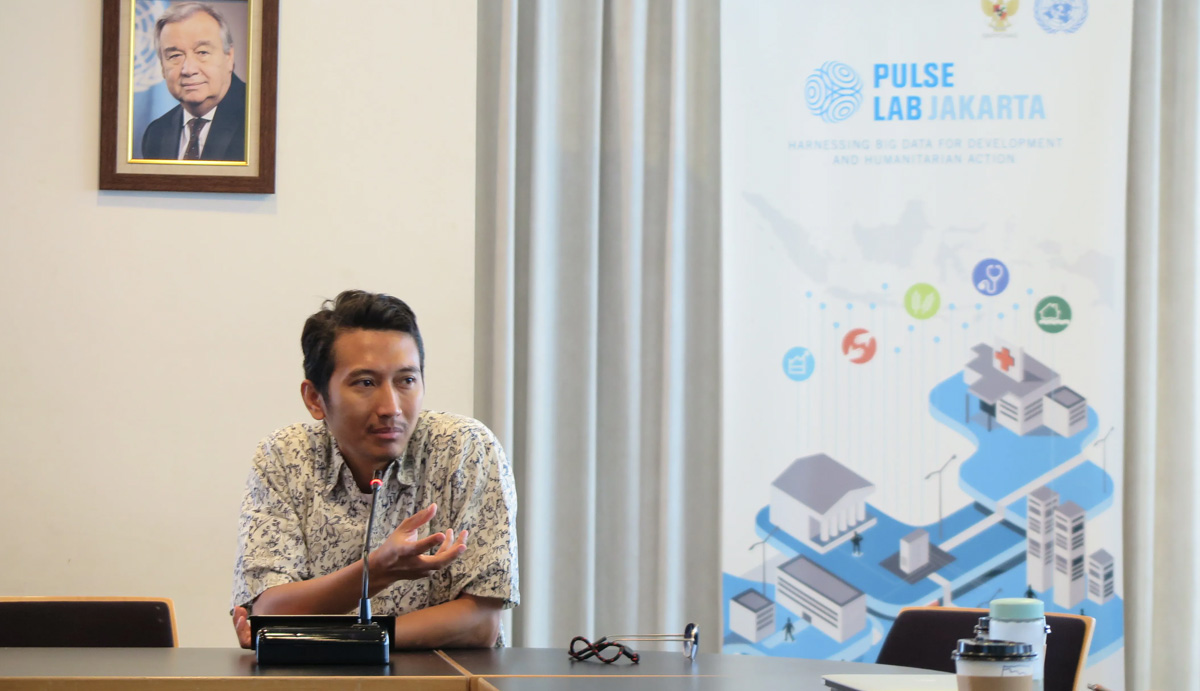
Start:
2018
End:
2018
|
2018
PLJ Colloqumotion SeriesLocation: Indonesia 
PLJ initiated Colloqumotion, a monthly interactive discussion forum for the UN team in Indonesia. It features expert speakers discussing the role of new data sources in addressing development issues. The series promotes a reciprocal learning atmosphere, doubles as a capacity-building tool for UN staff, and fosters collaboration across sectors. Topics range from waste management to data privacy laws and urban health.
<p>Pulse Lab Jakarta has launched its new series, Colloqumotion, designed to be a monthly interactive learning session for the United Nations team in Indonesia. The initiative was spurred by the changing dynamics of audience engagement, inspired by formats like TED-style talks and short social media videos. Each month, the series features different speakers including academics, analysts, and experts interested in data science, development issues, human intelligence, and their intersections.</p>
<p>The focus of these sessions is to explore the potential of new data sources in addressing various development challenges. Unlike traditional conferences, Colloqumotion promotes interactive dialogue, encouraging a two-way exchange of knowledge and ideas between speakers and attendees.</p>
<p>Beyond disseminating information on various development issues, this learning talk series also aims to be a capacity-building resource for UN staff, an ongoing engagement channel for development stakeholders, and a brainstorming platform for the UN Country Team and its partners.</p>
<p>The first session, titled "Monitoring Your Garbage with Big Data," was well received. Mohamad Bijaksana Junerosano from Greeneration Indonesia underscored the pressing issue of waste management in Indonesia and advocated for an integrated waste management infrastructure. He emphasized the role of big data in combating the problem and provided examples of how emerging technologies and data sources could improve waste management efforts.</p>
<p>As an ecosystem catalyst, Colloqumotion aims to foster collaborations between researchers, academics, and analysts from both public and private sectors. Future topics will range from data privacy and cybersecurity to non-communicable diseases and urban health. The next session, scheduled for February 15th, will feature Professor Sinta Dewi from Universitas Padjajaran, discussing data privacy laws in the context of developing countries, specifically from the Indonesian perspective.</p>
Domain
Strategic Exploration
SDG Data Partners |
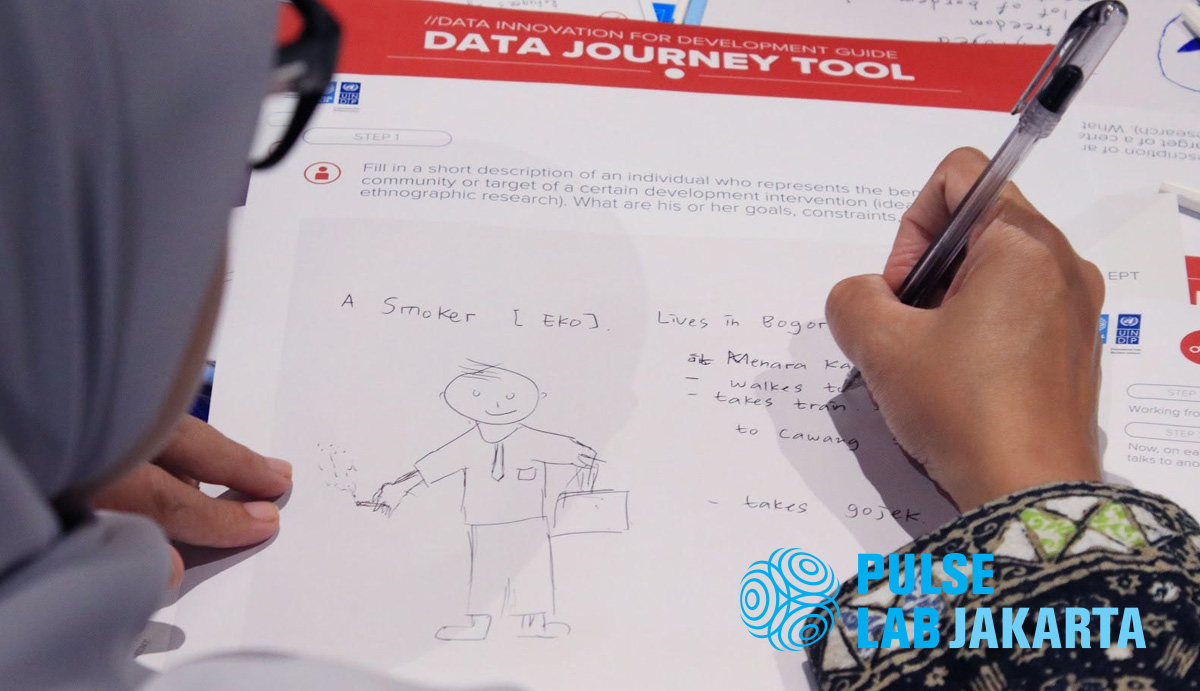
Start:
2018
End:
2018
|
2018
Data Innovation ClinicLocation: Indonesia 
Data Innovation Clinic offering professionals insights into using new, unconventional data sources for monitoring and evaluating development programs. The clinic, utilizing the UN Global Pulse's Data Innovation for Development toolkit, focused on problem identification, understanding data contexts, and refining research questions. The team's diverse expertise provided a comprehensive view of real-life data innovation projects.
<p>Data innovation offers unprecedented opportunities for evidence-based policy-making, and has been changing the way policymakers and development practitioners address development challenges. But for many who have never been part of this process, ‘data innovation’ often comes off as ambiguous. As part of a big data for monitoring and evaluation workshop organised by the Development CAFÉ, our team at the Lab ran a data innovation clinic with participants from different professional backgrounds. We approached the clinic with an understanding that data innovation means embracing new and unconventional data sources to better understand challenges and identify opportunity areas — in this case to monitor and evaluate development programmes.</p>
<p>Arming ourselves with UN Global Pulse’s Data Innovation for Development toolkit — a practical walkthrough of how development practitioners and organisations can go from idea to implementation — we spent a full day with the participants offering step-by-step guidance on how to go about designing their own data innovation project. Given the limited time, we decided to focus the clinic on three main areas: problem identification; understanding the context from which data is derived; and refining research questions. All three of these are key aspects in scoping possibilities for the use of alternative data sources for any project. Having a mix of data science and social systems team members facilitating the clinic enabled us to give participants a more holistic view on how a data innovation project plays out in real life.</p>
Domain
Strategic Exploration
SDG Data
Qualitative Data
Crowdsourced Data
Partners |
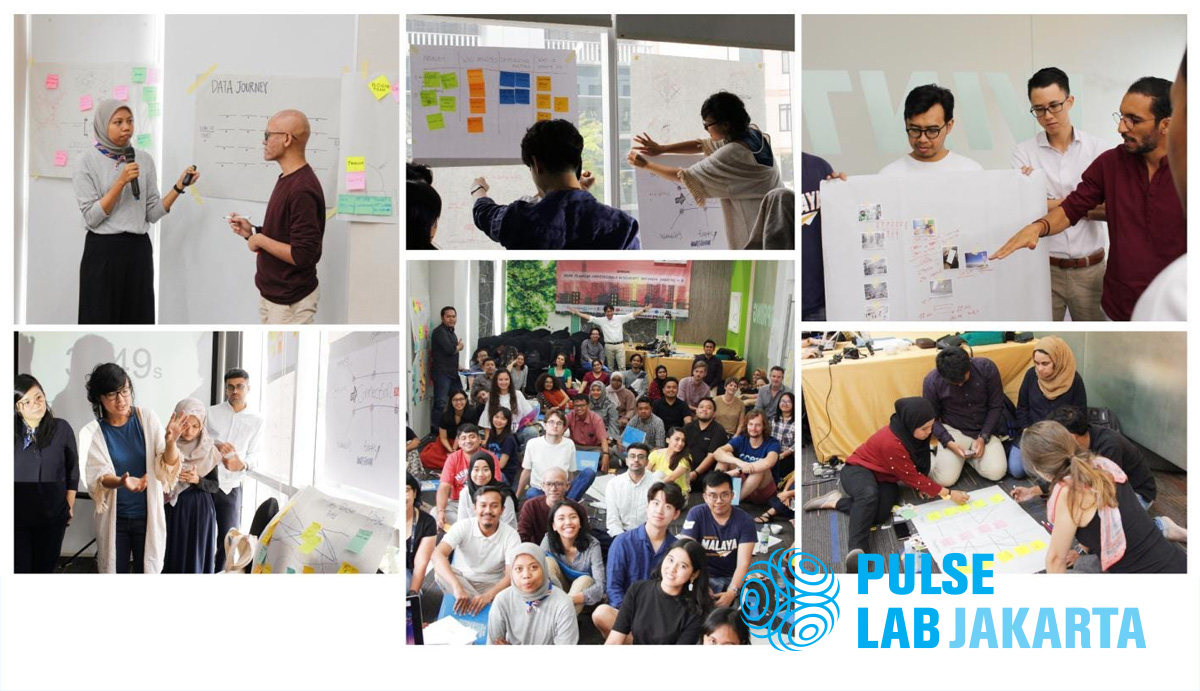
Start:
2018
End:
2018
|
2018
Lab on Wheels OutreachLocation: Indonesia 
PLJ's Lab on Wheels initiative delivers workshops at academic and development organizations, showcasing the integration of advanced data analytics with traditional research. The program promotes data literacy and the use of unconventional data in diverse contexts, demonstrating the potential of Big Data and AI in development and humanitarian work. Adapting to different audiences, Lab on Wheels has been implemented in various settings, expanding its reach and influence.
<p>Pulse Lab Jakarta's Lab on Wheels initiative, a response to growing interest in advanced data analytics for decision-making, conducts outreach to academic and development organizations in Indonesia. These workshops aim to showcase the possibilities of integrating data analytics with conventional research methods to a broader audience.</p>
<p>Lab on Wheels was conceived with two primary objectives. The first was to introduce Pulse Lab Jakarta’s data analytics work to a wider audience. The second, achieved through various interactive activities, was to promote data literacy and stimulate discussions on using unconventional data in diverse contexts. In essence, Lab on Wheels represents a unique avenue to demonstrate how Big Data and Artificial Intelligence can be applied to support development and humanitarian activities via practical, interactive sessions with varied practitioner groups.</p>
<p>Over time, we've discovered the need for adaptive approaches for different audiences. As an innovative lab, we welcome this challenge. We've implemented Lab on Wheels in university events and development conferences, and eagerly agreed to participate in the International Society of City and Regional Planners (ISOCARP) forum, viewing it as an opportunity to share our work with a different audience.</p>
Domain
Strategic Exploration
SDG Data Partners |
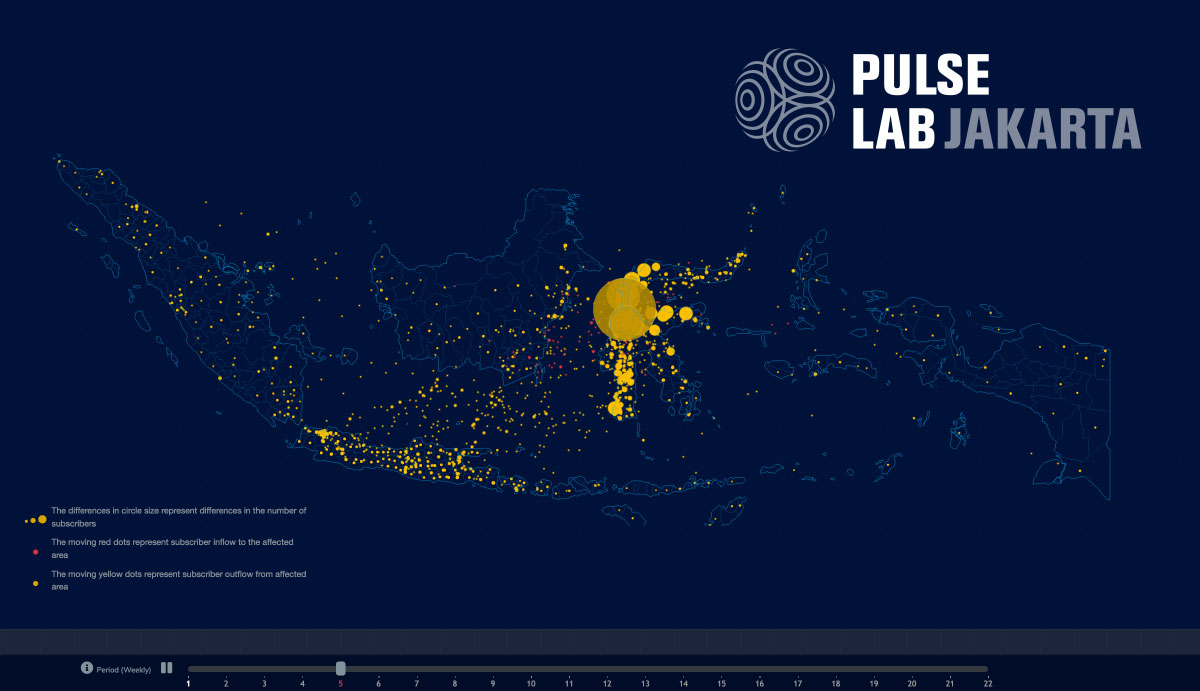
Start:
2019
End:
2019
|
2019
Understanding Population Movement After The 2018 Central Sulawesi Natural DisastersLocation: Indonesia 
This project, a collaboration between PLJ and IOM, utilised advanced data analytics and telecom data to understand internal displacement following the 2018 Central Sulawesi natural disasters. A proof-of-concept tool was developed to visualise displacement, revealing popular destinations, and estimating the number of displaced individuals based on their mobile data movements pre- and post-disasters. The tool's potential for enhancing disaster response and resilience strategies was demonstrated, with future work to explore its scalability and maintenance within an ecosystem, supported by appropriate policies and stakeholders.
<p>Leveraging Pulse Lab Jakarta’s advanced data analytics capacity and experience in developing disaster risk reduction data analytics tools gained from prior modelling with Digicel data, IOM joined forces with the Lab to undertake research using data from an Indonesian telecom. In particular, the research aimed to gather insights on internal displacement throughout the most affected districts in Central Sulawesi with a view to developing a proof-of-concept on the feasibility of using mobile network data for effective displacement assessment.</p>
<p>An interactive visualisation was designed to make sense of the results. It communicates the distribution of subscribers in Palu, Sigi and Donggala; highlights the most popular destinations where people travelled to after the disasters; and provides an estimate of the number of displaced subscribers based on analysis of subscribers’ movements before and after the disasters. Representatives from the Indonesian Government, United Nations, and mobile telecoms were then invited to participate in a training workshop to discuss how mobile network data can be better harnessed to support government-led disaster resilience efforts. The workshop was also intended to gather feedback to inform further development of the visualisation dashboard and explore adoption and scaling of the tool to aid future disaster response. How to scale up the tool and nurture an ecosystem in which it can be maintained was a critical part of the feedback discussion. This included inputs on relevant policies that should be put in place to support such an ecosystem, and the best positioned stakeholders to become custodians and ensure its sustainability.</p>
<p>Our analysis demonstrates that by identifying the movement of affected cohorts of a population, we can also ensure that they are not left behind in the Government’s disaster response and resilience strategy. The case of the 2018 Central Sulawesi disaster episodes revealed that data on displaced citizens is scarce, hampering the speed and effectiveness of humanitarian agencies in distributing vital resources to those most in need. There’s still more research to be done on how mobile network data can be harnessed to inform the Government’s disaster response effort, and this proof-of-concept demonstrates the value of the approach and how it can be applied in different disaster scenarios to reduce the scope of impact.</p>
Domain
Disaster Response and Humanitarian Action
Urban and Regional Dynamics
Environment and Climate
SDG
Sustainable Cities and Communities
Climate Action
Partnership for The Goals
Data
Mobile Network Data
Displacement Tracking Matrix
Partners
IOM
|
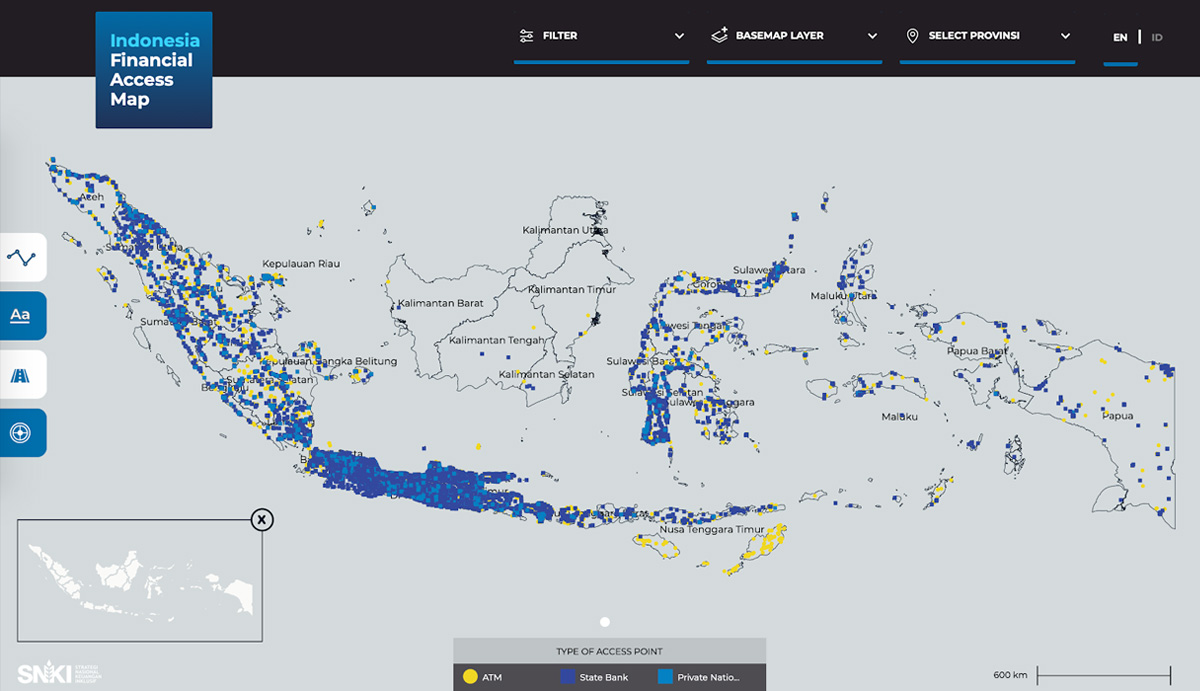
Start:
2019
End:
2019
|
2019
Mapping Financial Service Points Across IndonesiaLocation: Indonesia 
PLJ, in partnership with the Indonesian National Council for Financial Inclusion (DNKI), developed an interactive geospatial mapping tool to visualise financial service points across Indonesia. The tool, prototyped using data from Yogyakarta City and Bima District, aims to highlight gaps in financial service access and infrastructure. By integrating multiple data sets, the tool supports policymakers in enhancing financial inclusion. The prototype has been handed over to DNKI for future national-scale application.
<p>Focused on how to support policymakers in improving financial service points' availability and access in terms of proximity, Pulse Lab Jakarta partnered with the Indonesian National Council for Financial Inclusion (DNKI) to design an interactive geospatial mapping tool with the aim of charting the various financial service points across the country's archipelago. Prototyped using data from Yogyakarta City, Yogyakarta and Bima District, West Nusa Tenggara, the tool visualises financial services points and existing gaps based on socio-economic infrastructure and financial services offered. Together with SNKI and Women's World Banking (WWB), we explored a few ideas and fine-tuned them along the way, resulting in a prototype visualisation dashboard. Multiple datasets were used to develop the interactive visualisation dashboard, enabling policymakers to explore data layers and indicators that are relevant for improving financial access, and more broadly financial inclusion. These data sets range from financial and telecommunications data to geospatial and demographic data, which have been collected by Government institutions such as the Financial Services Authority (OJK), the Ministry of Communication and Information Technology, Statistics Indonesia (BPS), and National Team for the Acceleration of Poverty Reduction (TNP2K) to name a few. By visualising the information, we sought to enhance policymakers' analysis and decisions towards the broader objective of financial inclusion. The tool features indicators beyond the conventional measurements of financial inclusion, for instance branches per capita or ATMs per 100,000 people — which typically do not factor in where people live in relation to financial service points. Important information related to financial service points were added and categorised into Financial Access Points (FAP) and Potential Access Points (PAP). Eight indicators were integrated for the financial access points, namely: the availability and locations of State banks, Regional banks (BPD), Private banks, Joint Venture banks, Sharia banks (BPR Syariah), Banking agents, Cooperatives and ATMs. The visualisation dashboard is designed with a modular orientation to accommodate additional data sets. Building the prototype, we only used data from two districts in Indonesia, which allowed us to do rapid prototyping and testing. Nevertheless to scale up the Indonesian Financial Access Map across the country, relevant data for other parts of the country will be required. PLJ has handed over the prototype of the interactive geospatial financial access map to the Indonesian National Council for Financial Inclusion (DNKI), where it'll be enhanced for future usage at national-scale for more informed and timely policy making.</p>
Domain
Poverty, Financial Inclusion, and Economic Development
SDG
Decent Work and Economic Growth
Industry, Innovation, and Infrastructure
Reduced Inequality
Data
Google Maps POI
Open Street Map
Partners
DNKI
OJK
BPS
TNP2K
|
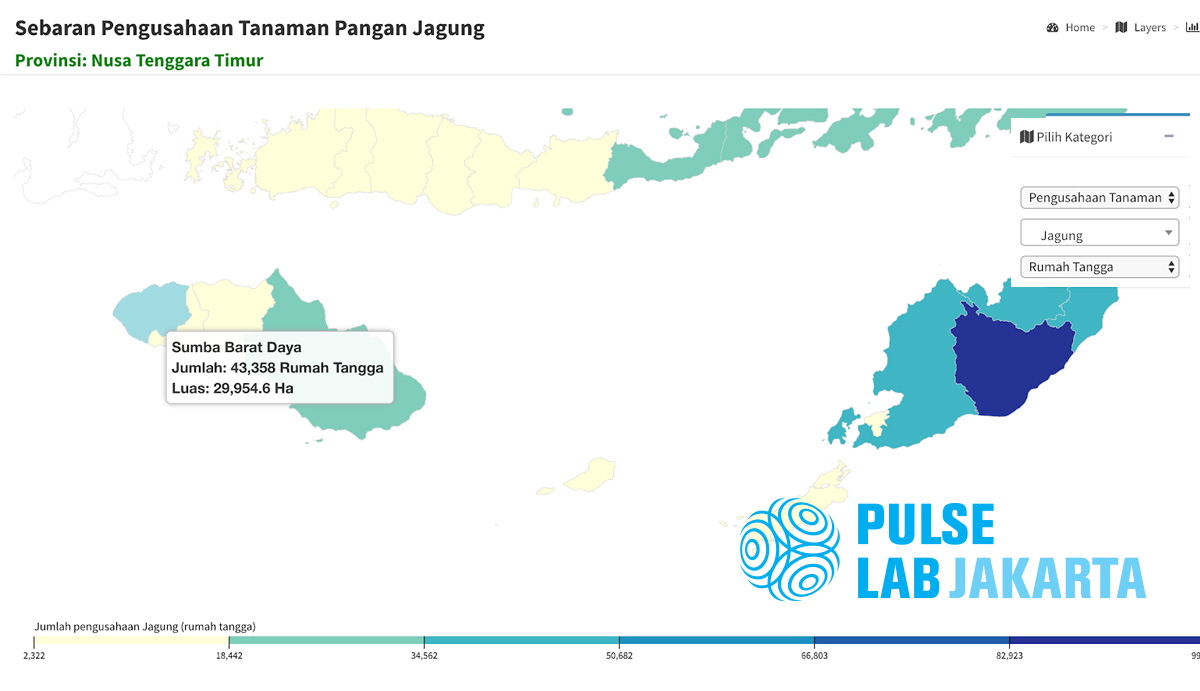
Start:
2019
End:
2019
|
2019
Mapping Smallholder Farmers in Indonesia to Inform PoliciesLocation: Indonesia 
To promote sustainable agriculture and food security, PLJ, in collaboration with Bappenas, developed a visualisation and analysis dashboard using the latest agriculture census data. This tool aids in identifying smallholder farmers, their crops, and landholdings, generating insights to shape policies for SMEs in the agriculture sector. The dashboard also visualises land use for various agricultural categories, providing essential information for government resilience efforts against economic shocks experienced by smallholder farmers. Future developments include integrating additional data sets from other ministries for a more comprehensive understanding of the agriculture sector's role in national development.
<p>As the world's population continues to increase, governments have been stepping up efforts to ensure that citizens have access to safe and adequate food supply. The Sustainable Development Goals are also undergirded in the ambition to end hunger, which is crucial to sustain humanity. Collaborating with the Directorate of Cooperatives and Small and Medium-sized Enterprises (SMEs) in the Ministry of National Development Planning (Bappenas), Pulse Lab Jakarta developed an interactive visualisation and analysis dashboard that uses the latest agriculture census data to identify smallholder farmers, with respect to the commodities they produce and the size of their landholdings to generate insights that can inform policies relevant to SMEs in the agriculture sector. Consisting largely of smallholder farmers (defined as having landholding less than two hectares) and large plantations, millions of Indonesians depend on the agriculture sector to earn their everyday livelihoods. Smallholder farmers, who typically come from agriculturedependent households, are also part of the segment of SMEs in Indonesia. Information nonetheless regarding SMEs (in the case of smallholder family farmers) that contribute to the agriculture sector remains limited. Having a better understanding of how many of these smallholder farmers exist; the kinds of commodities they produce; and the land size used can enable the Government to provide more fitting support. The agriculture sector in Indonesia is vast, yet not all smallholder farmers are recognised in official statistics. The 2013 Agriculture Census, the latest of six agricultural censuses ever conducted in the country, is the most comprehensive data set currently available. Within this data set though, there is no indication of which farmers are considered SMEs. Through discussions with Bappenas' Directorate of Cooperatives and SMEs, we thus decided to experiment with land size as a proxy to determine smallholder farming SMEs. For instance, farmers with landholdings less than one hectare were categorised as SMEs for the food crops category. While for the horticulture category, farmers with landholdings smaller than half a hectare were classified as SMEs. Once the data was processed and the classifications for smallholder farming SMEs for each agriculture category was established, our next move was to prototype a visualisation and analysis dashboard that could cover all 34 provinces in Indonesia, including data on the national and sub-district levels. The dashboard was intended to not only present the data collected in a way that was digitally interactive (allowing users to easily switch between provinces and survey commodities of interest), but also do so in a visually appealing way. After rounds of iterations alongside our Bappenas colleagues to ensure optimum user experience, we came up with a prototype that allows data overlaying and multiple presentation views. The dashboard also provides useful visualisations on the amount of land that is used for a particular category of agriculture, which helps with categorising which farmers fall into the SMEs segment. Having an understanding about the type of agriculture commodity, the size of landholding, characteristics of the farm (and the related household) used for production can provide the Government with useful information that can inform resilience efforts when smallholder farmers experience economic shocks. Using the data from the 2013 agriculture census as the single data source, the dashboard was developed as a rapid prototype. Determining smallholder farming SMEs is multidimensional and to be more accurate, we cannot rely on the size of landholding alone. Therefore in 2019, the Directorate for Cooperatives and SMEs showcased the features of the dashboard to other ministries and government institutions to discuss how the dashboard could be further developed by integrating additional data sets from other ministries to provide a more comprehensive understanding about how the agriculture sector intersects with other areas of national development, as well as to come with a multidimensional proxy for smallholder farming SMEs. Moving forward, Bappenas as the custodian of the dashboard, is positioned to explore additional data sets from other ministries (especially with the Satu Data initiative now being implemented) to also ensure the livelihoods of smallholder farmers are safeguarded through long-term resilience planning.</p>
Domain
Poverty, Financial Inclusion, and Economic Development
Trade and Competitiveness
SDG
Zero Hunger
Decent Work and Economic Growth
Responsible Consumption and Production
Data
Agriculture Census
Goverment Statistics
Partners
Bappenas
|
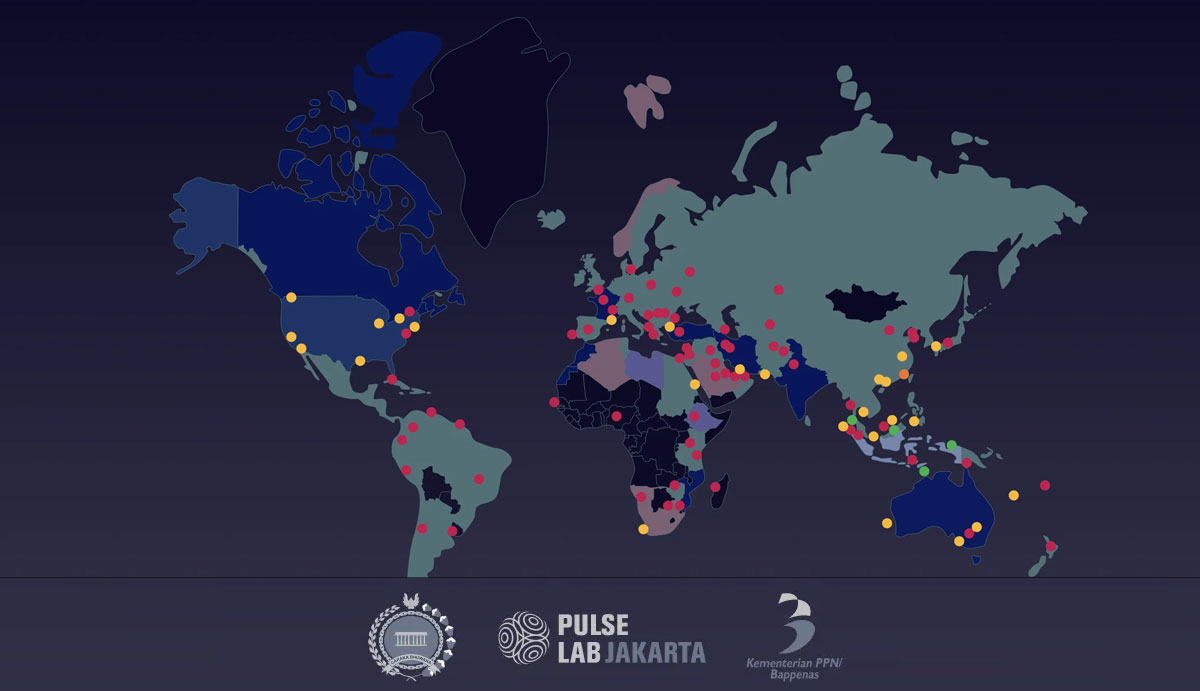
Start:
2019
End:
2021
|
2019
Adapting to Data-Driven Diplomacy with Machine LearningLocation: Indonesia 
PLJ collaborated with the Indonesian Ministry of Foreign Affairs to develop a machine learning tool that streamlines the organisation and extraction of key data from international communications. The project, initiated in 2019 and active until 2021, aimed to better interpret and make these global interactions accessible. By using Natural Language Processing (NLP) and Machine Learning, the tool enhances analysis speed and accuracy by extracting and classifying data from declassified documents. User feedback and visual features were integrated to enhance its practicality and compatibility with existing workflows. The project also boosted the ministry's capacity via advanced data analytics training. Current efforts are centred around integrating the tool further for more informed data insights.
<p>2019: Collaborating with the Indonesian Ministry of Foreign Affairs, Pulse Lab Jakarta have extensively explored and produced a machine learning visualisation tool to help staff understand their diplomatic correspondence between the Ministry and their diplomatic staff abroad. To facilitate dialogues with foreign governments and other stakeholders, analysts within MoFA are required to produce summaries of diplomatic cables for each country for diplomatic staff, government officials and the Minister. Currently, these summaries are generated by analysts reading, annotating and summarising large volumes of diplomatic communications, which is time intensive and a large volume of communications are unable to be read and incorporated into analysis reports.Subsequent to user research conducted within the Ministry, we identified one clear need inside the department that was amenable to a machine learning solution: Understanding, classifying and making accessible their diplomatic cable data. PLJ began a collaborative process of ideation and design, and concepts and mockups were presented at an early stage of the project to clarify the need and ensure that our proposed solution would be usable and practical with the existing workflow of the staff within the Ministry. Based on feedback from these mockups, we made substantial changes to our proposed design and presented a second round of prototypes. This resulted in a set of tools that can reliably extract metadata and text data from MoFA diplomatic cables, and can automatically classify new incoming cables using the taxonomy provided by MoFA. The tool enables MoFA to analyse, locate and make sense of their large volume of correspondence and improves analysts' abilities to provide relevant, timely and accurate advice.</p>
<p>2020: Following the 2018 International Seminar on Digital Diplomacy coorganised by Pulse Lab Jakarta, the Indonesian Ministry of Foreign Affairs (MoFA) and DiploFoundation, the Lab worked with the Ministry via its Information and Media Department (known as Infomed) and Centre for Information Technology and Communication (known as Pustik KP) to explore possibilities in developing a tool with Natural Language Processing (NLP) capability. This would help shorten the time required for analysing the Ministry's communications from around the world. The Lab initiated a collaborative process of ideation and design, leading to concepts and mockups presented at an early stage of the project to clarify needs, as well as ensure that the proposed solution is usable and will streamline the existing workflow of the staff within the Ministry. Based on feedback from these mockups, changes were made to the proposed design leading to subsequent prototypes. A machine learning tool was developed, which reliably extracts metadata and text data from declassified documents shared within the Ministry, and automatically classifies new documents from Indonesian embassies and Representative Offices (ROs) around the world using a uniquely contextualised taxonomy. To analyse the documents (as inputs), image mining processes are performed to extract text and information from the document images. This is followed by text preprocessing, which was carried out under the supervision of the Ministry to clean the HTML tags, numbers and punctuations in the text; split sentences into words; and filter out the most frequently used words from declassified documents.Relying on the domain expertise and knowledge of the staff within the Ministry, a set of labels were established relevant for categorising the content of documents. Some of these labels included, economic and political issues, staff-related matters, and socio-cultural affairs. From here, the team at MoFA manually classified more than 5000 documents into these categories based on similarity of keywords, which then became the training dataset to develop the machine learning model. To make sense of the analysis performed by the computational method, the results of the classifications are visualised in the form of easy-to-read maps and graphs, thus improving the staff's ability to synthesise massive amounts of communications and provide more relevant and timely insights. Following the conclusion of the first phase of the project in March 2020, it was agreed that enhancing the functionalities of the dashboard could lead to greater operational impact Thus the project progressed to a Phase 2, which included changing the input from unstructured documents to more structured documents, automatically fed from a complementary machine; as well as adding timeframe search features and multi-tag classification. Despite being computational in nature, the NLP method relies on human expertise and the collaboration has provided capacity building in the areas of machine learning and advanced data analytics for MoFA during the first phase. The role of MoFA as the domain expert is important going forward to improve better classification results, while also placing the Ministry as a potential focal point for the development of machine learning knowledge within the Indonesian Government.</p>
<p>2021: With data analytics offering digital solutions to improve operational efficiency we've been supporting the Indonesian Ministry of Foreign Affairs in applying machine learning to process thousands of documents from its global outposts. In 2020, we worked alongside the Ministry to develop a machine learning data analysis and visualization tool to analyze documents and extract insights for diplomatic engagement. Following successful prototyping and testing, we facilitated a service blueprint workshop in 2021 with the Ministry to assess the various components and touchpoints tied to the use of the tool. This included exploring the technical requirements and human resources needed to support its implementation, use, maintenance and development. Attended by staff across three different units within the Ministry, the discussions led to a supplementary system maintenance roadmap that outlined key components and actions items that should be taken into consideration. One of which included providing advanced data analytics training for the Ministry's staff involved in the day-to-day operation and maintenance of the tool. Accordingly, a hands-on, knowledge exchange session was conducted between our team and the Ministry's staff with training modules focused on data processing, machine learning and artificial intelligence applications prior to fully handing over the tool to the Ministry. Besides strengthening their data science capacity, the service design methodology that was introduced for the service blueprint also served as a capacity building exercise to help the Ministry's staff make better use of the tool. Discussions are ongoing across various levels within the Ministry on how to further integrate the tool and the learnings to generate more data-informed insights.</p>
Domain
Trade and Competitiveness
SDG
Industry, Innovation, and Infrastructure
Peace, Justice, and Strong Institutions
Partnership for The Goals
Data
Communication
Partners
MoFA
|
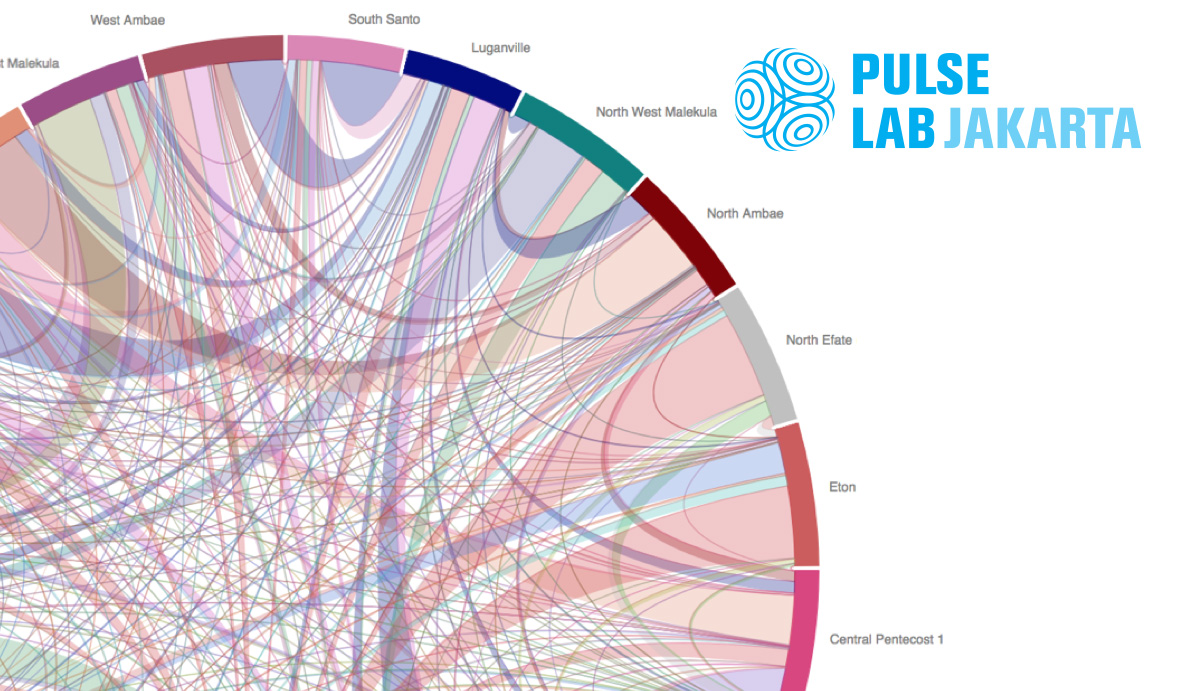
Start:
2019
End:
2019
|
2019
Modelling Internal Migration in Vanuatu Using Mobile Network DataLocation: Vanuatu 
PLJ used mobile network data to model internal migration in Vanuatu, a process that was previously challenging due to the excessive costs of generating national statistics. The team analysed call detail records from Digicel, a large operator in Vanuatu, for all of 2017, examining aggregated movement trends of pseudonymous users over the year. This research demonstrated the potential of using new data sources for gathering national-level statistics. The findings were given to the National Statistics Office of the Government of Vanuatu to aid in understanding migration patterns and their relationship to numerous factors, including natural hazards.
<p>Understanding the movements of individuals at a national scale is important given its potential to support planning for services, infrastructure and policy. In places such as Vanuatu, modelling movement at such scale has been challenging due to high costs related to generating national statistics. Using call detail records data from Digicel (one of the largest operators in Vanuatu) that spans the entire year of 2017 (1st January to 31st December 2017), PLJ's team sought to examine trends in the aggregated movements of pseudonymous users over the course of the year. More specifically, the research analysed how individuals move between different districts and how these trends vary. To better understand the dynamics between different districts, we calculated the standard deviation in the percentage of transitions between each pair of districts. Analysing the standard deviation, we are able to point to which pairs of districts were highly volatile in their numbers of inflow or outflow over the year. The research shows the immense potential of using new sources of data, such as mobile network data, as an alternative to conventional methods of collecting national level statistics. The findings of the analysis were provided to the National Statistics Office of the Government of Vanuatu and the team was encouraged to make further interpretations of the movements, such as whether the communications, social and economic relationships between districts influence internal migration. With the global proliferation of mobile phones and the fine-grained representation these technologies have generated, governments can better understand internal migration that may be induced by natural hazards.</p>
Domain
Urban and Regional Dynamics
Environment and Climate
SDG
Industry, Innovation, and Infrastructure
Sustainable Cities and Communities
Climate Action
Data
Mobile Network Data
Partners
Digicel
Government of Vanuatu
|
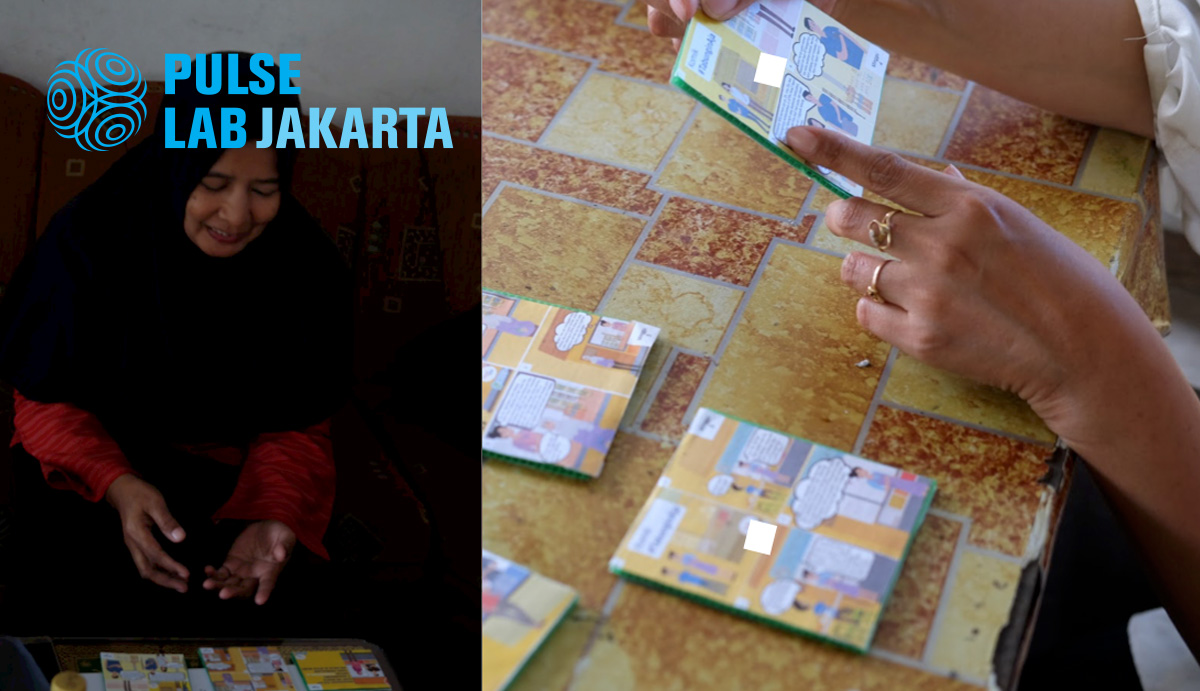
Start:
2019
End:
2019
|
2019
#TabunginAja Fusing Behavioural Science and HCD for Financial InclusionLocation: Indonesia 
This project, led by the Behavioural Insights Team, PLJ, and the Secretariat of the Indonesian National Council for Financial Inclusion, aimed to enhance financial inclusion in Indonesia by promoting usage of agent-based bank accounts. An 8-week WhatsApp campaign, #TabunginAja, was implemented, encouraging agents to motivate their customers to save change from purchases. The campaign faced implementation challenges and the results were not as expected, leading to the conclusion that it could not be recommended for broader implementation. However, the project offered valuable lessons for improving financial inclusion and the agent-based banking system.
<p>The Behavioural Insights Team (BIT), Pulse Lab Jakarta (PLJ) and Secretariat of the Indonesian National Council for Financial Inclusion (S-DNKI), formed a partnership in 2018 to apply human-centred design and behavioural insights to develop and trial innovative approaches to improve financial inclusion. The project aimed to encourage bank account usage, more specifically regular deposits made into agent-based bank accounts. Such accounts rely on agents to help their neighbours to sign up for accounts, help customers conduct bank transactions such as deposits and withdrawals, and act as general financial services advisory and support. To test our ideas in the real world, we thus partnered with a large Indonesian bank that offers agent-based banking. We designed an 8-week long WhatsApp campaign called #TabunginAja (#JustSaveIt), implemented between March and May 2019. The messages, consisting of pictures with short messages, comics and text, were sent to agents, asking them to encourage their customers to save the change from purchases at the agent's shop or street food stalls. The messages built on a number of insights from the behavioural sciences, such as goal-setting and rules of thumb. The qualitative evaluation showed that the implementation of the campaign was labour intensive and messages therefore did not always reach all agents. Among the agents who received the messages, the content was positively received - indeed, some agents already actively encouraged customers to save their change or had previously done so. Among the agents interviewed, however, none of the agents to whom the idea was new started the habit of asking customers to save their change as a result of the campaign. This was in part due to structural barriers, such as a lack of liquidity among agents. The results of the quantitative evaluation also indicated that customers in the intervention areas were 10-percentage points less likely to make a deposit in May 2019 than those in control areas. We believe, however, that this is due to randomisation failure as it seems highly unlikely that a relatively light-touch intervention would have such a large impact on the outcome of interest. As we were not able to determine the overall impact of the campaign and its implementation was associated with a cost (human resources necessary to send out the messages), we cannot recommend its roll-out across the agent-based banking system in Indonesia. However, we think that the project and its results display important lessons for agent-based banking and financial inclusion policies in Indonesia, specifically around innovating to improve financial inclusion and enhancing the effectiveness of the agent-based banking system. We thank S-DNKI for partnering with us, and look forward to developing and testing more innovative approaches to ensure every Indonesian can eventually benefit from access to appropriate financial products.</p>
Domain
Poverty, Financial Inclusion, and Economic Development
SDG
No Poverty
Decent Work and Economic Growth
Reduced Inequality
Data
Qualitative Data
Partners
Behavioural Insights Team (BIT)
Secretariat of the Indonesian National Council for Financial Inclusion (S-DNKI)
|
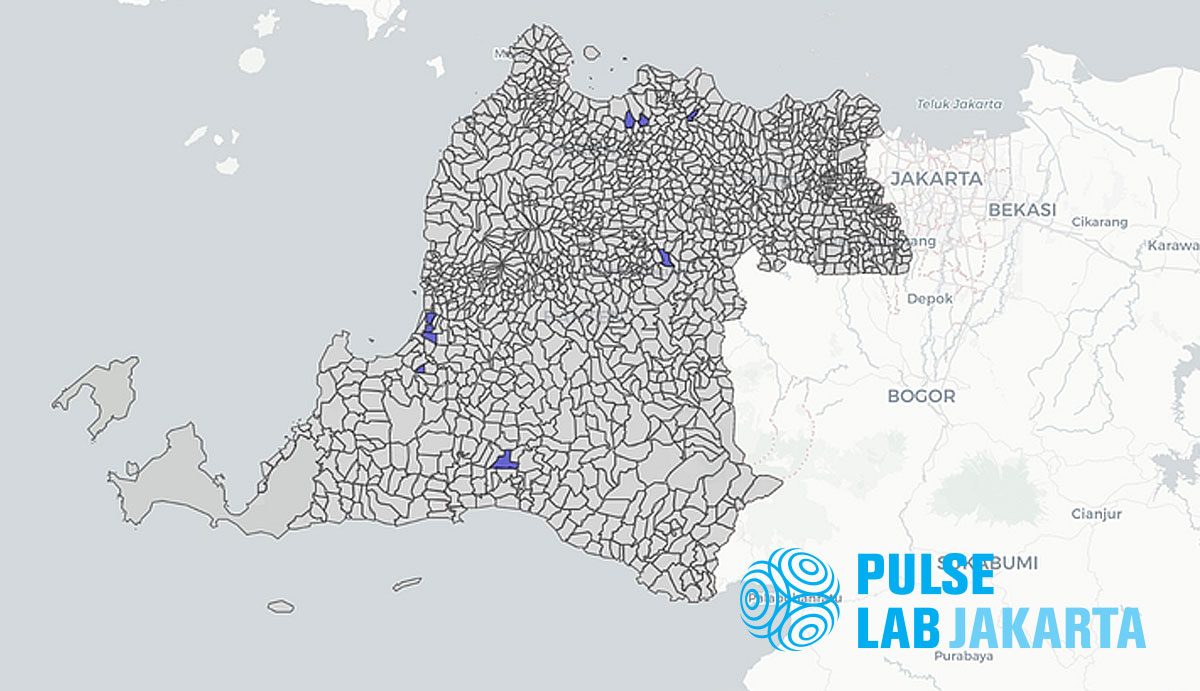
Start:
2019
End:
2019
|
2019
Applying Big-Data-Based Positive Deviance Approach in AgricultureLocation: Indonesia 
In collaboration with GIZ Data Lab, PLJ conducted a scoping project to leverage big-data in identifying "positive deviants" - successful outliers - in agriculture in Indonesia. The project aimed to reveal the strategies employed by these successful entities and facilitate their adoption by others. The project found that positive deviants could be identified using key variables within data sets, though further data and expert input were required for more conclusive results.
<p>In developing countries, agriculture production systems and households that manage these systems are complex and varied. Knowledge and data collection activities undertaken by government agencies tend to fall short of capturing this complexity and variety across both spatial and temporal dimensions. In Partnership with GIZ Data Lab, PLJ undertook a scoping project to understand the potential of big-data driven "positive deviance" (land managers who are exposed to similar conditions, but are faring better than their peers in the same group). The primary objective of the research was to identify the behaviours, strategies and factors employed by the positive deviants and develop interventions to facilitate the adoption of those strategies. Our study population included villages in Indonesia having at least one household growing rice. From the 2013 agricultural census, roughly 40,000 villages covering almost nine million rice growing households were identified based on this criterion. The agriculture census provides troves of data, which is potentially noisy because the data set was not developed for the purpose of identifying positive deviance per se. Since the census data is collected across three cropping seasons in 20122013, all the data could be leveraged but the performance measure would need to change to reflect the seasonality across the year. To maximise the identification of outliers and to maintain the interpretability of the results, we aimed to remove noise and extraneous variables that could potentially impact the final result. Our early findings confirm that positive deviants can be identified by analysing key variables within data sets, but to reach a more conclusive result additional datasets and contextual experts are needed to corroborate findings. This pilot was an opportunity to start the discussion about what a "positive deviant" means for agriculture production and its broader implication for sustainable development. Though our method investigated yield proxies, as a measure of agricultural performance, higher yields are not necessarily sustainable. However, methods to increase yield can have long-time impact on community, environment and even agricultural performance over time.</p>
Domain
Poverty, Financial Inclusion, and Economic Development
SDG
Zero Hunger
Responsible Consumption and Production
Life on Land
Data
PODES
Climate Data
Partners
GIZ Data Lab
|
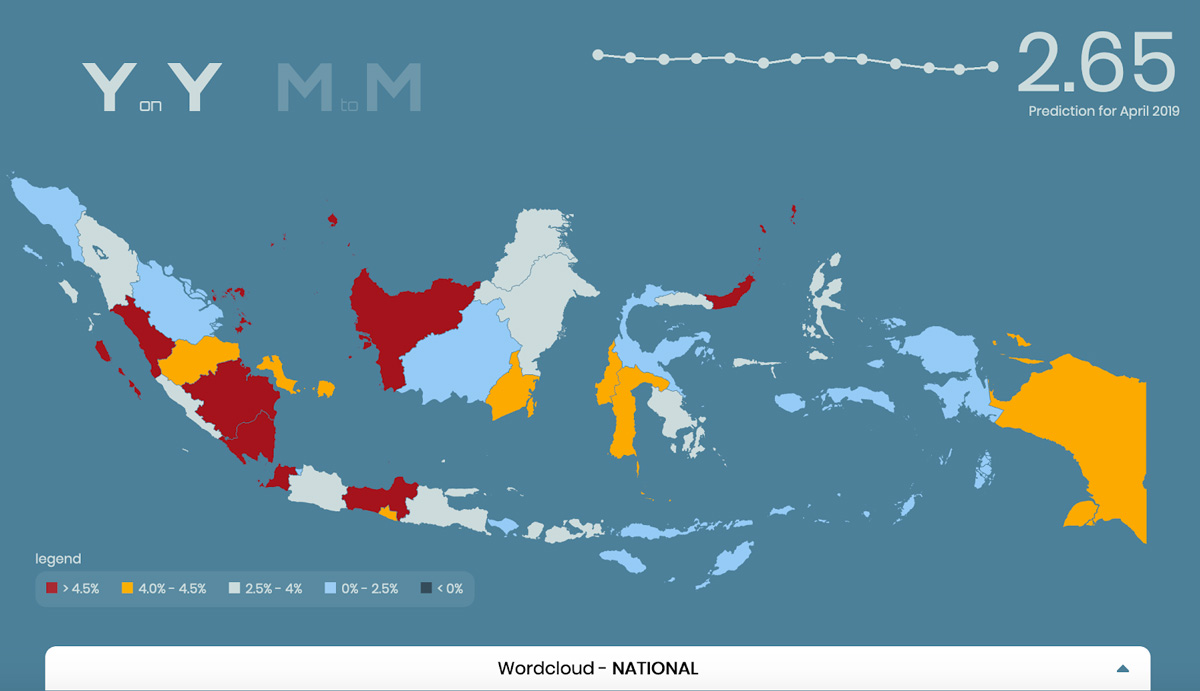
Start:
2019
End:
2019
|
2019
Nowcasting Inflation to Keep Indonesia’s Growth on TrackLocation: Indonesia 
PLJ and the Directorate of State Finance and Monetary Analysis developed an inflation monitoring tool capable of providing same-day inflation information. The tool, which uses a combination of traditional and non-traditional data sets, nowcasts the rate of inflation with 72% accuracy, thereby allowing the government to respond promptly to economic shifts. The model's success has been acknowledged by the government, and it is planned to be presented as a tool for national planning and strategy.
<p>Inflation is the average change in percentage based on a general price index, but in many cases an increase or decrease only becomes evident on a monthly and annual basis. This lag delays a government's ability to take a swift course of action. Pulse Lab Jakarta and the Directorate of State Finance and Monetary Analysis within the Ministry of National Development Planning have been developing a fit-forpurpose inflation monitoring tool, which can generate same-day inflation information to advise decision and policy makers working in the economic policy domain.</p>
<p>While a few days lag may seem insignificant for consumers, at a national scale a negative outcome could have an adverse effect on the population. Nowcasting therefore enables daily assessments to ensure that the Government is informed in a timely manner and can plan interventions to cope with such an outcome. Initial discussions between our data science team and representatives from the Directorate of State Finance and Monetary Analysis about the possibility of developing a nowcasting model began in 2017.</p>
<p>We considered several traditional and non-traditional data sets to investigate whether they could aid near real-time orientation. After extensive exploratory data analysis, the data set from Bank Indonesia's Strategic Food Commodities Price Information Centre showed some positive results. This data set contains daily-updated price data of ten strategically selected commodities: rice, red chillies, cayenne peppers, shallots, onions, cooking oil, sugar, beef, eggs and chicken. To gain a comprehensive measure of domestic inflation, we also considered housing prices and automotive prices.</p>
<p>The model we developed can successfully 'nowcast' the rate of inflation within a running month with 72 per cent accuracy and an average error rate of 4 per cent. The working model was initially tested in the second week of November 2018, and generated a 3.15 per cent year on year inflation rate for November 2018. We compared the model's result with the official inflation rate published by BPS in the first week of December that showed a rate of 3.12 per cent. Whenever one or two of the data sets were removed, the model showed varying results that were not close to the officially published inflation rates. This suggests that the current model relies heavily on all the data sets being used to prevent any statistical disturbance. The model has received recognition from the Bappenas Minister, Bambang Permadi Soemantri Brodjonegoro, and the Minister has encouraged his team to explore additional features that might be relevant for policy makers across the Indonesian Government.</p>
<p>The Directorate is also planning to present the inflation model to the National Inflation Control Team and Bank Indonesia as a national planning and strategy tool to help monitor the inflation rate for a running month. This nowcasting tool will be integrated as part of the Bappenas' Situation Room that will be launched soon.</p>
Domain
Poverty, Financial Inclusion, and Economic Development
Trade and Competitiveness
SDG
Decent Work and Economic Growth
Industry, Innovation, and Infrastructure
Reduced Inequality
Data
Food Security Data
Partners
Bappenas
BI
|
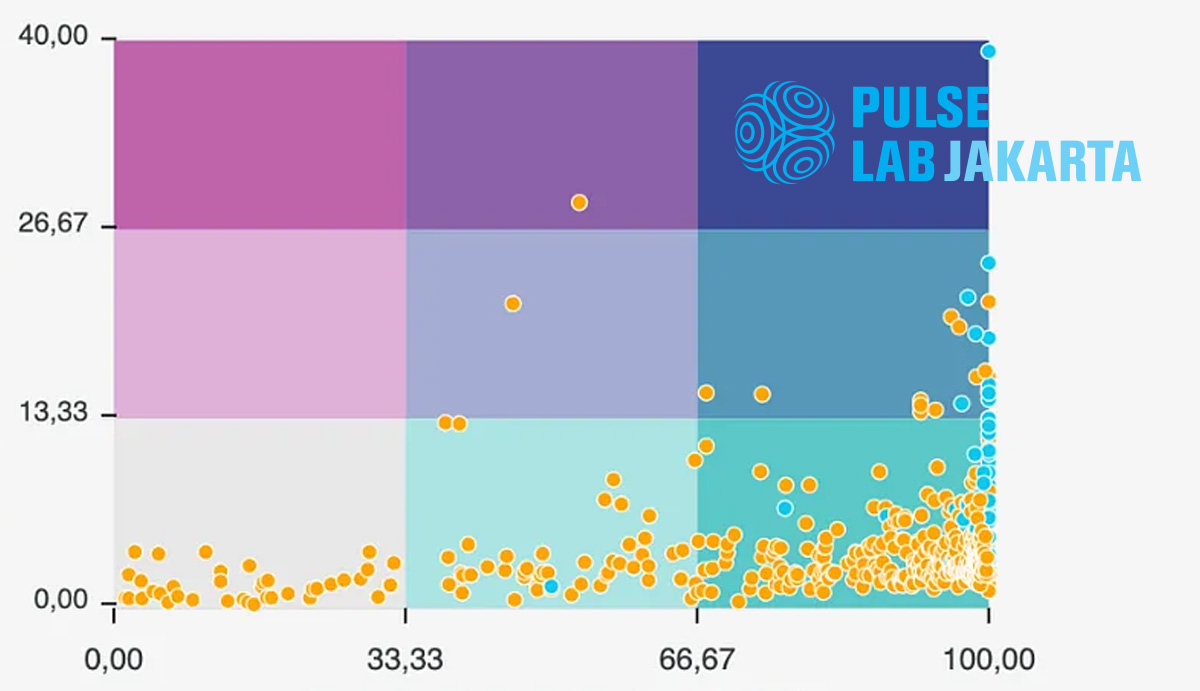
Start:
2019
End:
2019
|
2019
Combining Different Data Sources to Manage Information for Natural DisastersLocation: Indonesia 
PLJ developed an open-source platform that integrates various non-traditional data sets to aid logistics planning and information management during natural disasters. The platform, which was initially intended for disaster monitoring, has evolved to better inform responses following natural disasters. It analyses Twitter data, integrates APIs from OpenStreetMap and OpenRouteService, extracts relevant news articles, and incorporates Google Trends to help disaster authorities contextualise their responses.
<p>Pulse Lab Jakarta launched its latest research prototype — an automated, open source platform that integrates multiple nontraditional data sets to aid logistics planning and information management following natural disasters. The platform is built on an automated data pipeline, allowing it to stream and analyse several non-traditional data sets all in one place. This data pipeline is triggered based on disaster alerts received from the Global Disaster Alert and Coordination System (GDACS), which is a global system aimed at closing information and coordination gaps. Though information that can inform disaster authorities and citizens generally begins to generate right after a disaster hits, such information tends to be managed independently by different responders and information access comes with its own challenges. As an open source platform, MIND is designed to address these challenges, by publicly providing stakeholders with timely insights on affected areas, the needs of communities, among others. The platform analyses Twitter data, in particular by examining public geotagged tweets that are within a disaster's geographical parameters, known as a bounding box. It also integrates a pair of APIs from OpenStreetMap and OpenRouteService (an open source route planner developed by Heidelberg Institute for Geoinformation Technology at Heidelberg University) to help identify suitable routes for the transportation of aid and resources. This feature provides information on strategic Points of Interest (PoI) such as schools, hospitals, government buildings, airports and ports, which are important for exploring options for origin and destination points. A text processing algorithm is incorporated into the platform to extract news articles that are related to a given disaster from a credible news API. Based on the set of articles identified, the algorithm then proceeds to extract figures from the articles that describe an estimation of the number of casualties (words such as victims, fatalities and deaths are used as proxies). The Google Trends feature of the platform gives a sense of what topics people are talking about and the type of content they are searching for. This is an important communication tool that can help government disaster authorities to better contextualise the information they share with the public throughout the disaster response phase. The platform is designed to complement existing disaster response tools and can be modified to meet the specific needs of an organisation. PLJ offered an open invitation to encourage stakeholders across different sectors to participate in its user testing and has since received several requests and interests from disaster management authorities.</p>
Domain
Disaster Response and Humanitarian Action
SDG
Good Health and Well-being
Sustainable Cities and Communities
Climate Action
Data
Social Media
Google Trends
Open Street Map
News API
Partners
UN OCHA
GDACS
Heidelberg University
|
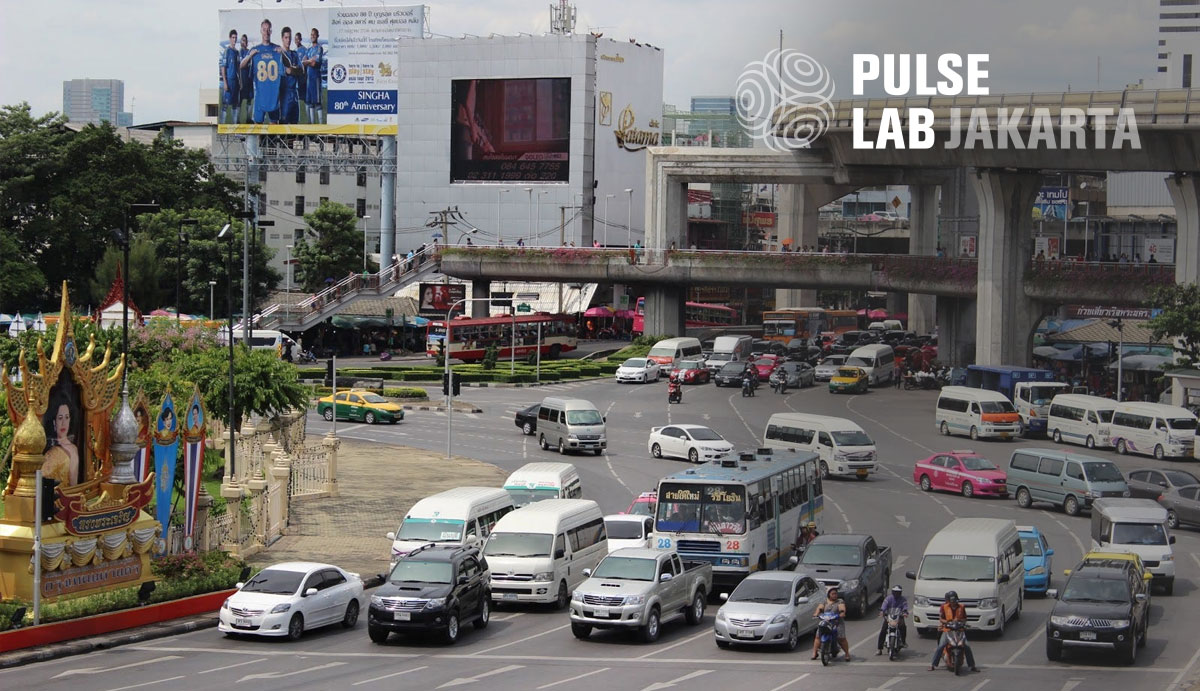
Start:
2019
End:
2020
|
2019
Using Ride-Hailing Data to Inform Transportation Planning and PolicyLocation: Thailand 
PLJ in collaboration with GIZ Data Lab and Grab focuses on leveraging anonymised GPS data from ride-hailing drivers in Greater Jakarta and Bangkok to inform urban planning and sustainable development. The analysis of this data reveals valuable insights into traffic patterns, inflows/outflows at the sub-district level, and potential environmental concerns such as air quality. By utilising data analytics, the project provides real-time insights and explores the use of ride-hailing data as a high-frequency proxy for traffic conditions. This approach demonstrates the potential for quicker feedback loops and more informed decision-making for transportation agencies, enabling them to develop effective policies and improve urban planning based on real-world data.
<p>Collaborating with Grab and GIZ Data Lab, Pulse Lab Jakarta (PLJ) began by analyzing anonymized driver's GPS data in Greater Jakarta to understand ride-hailing inflows and outflows at the sub-district level. This analysis was visualized to depict traffic patterns and flows during weekdays and weekends, showing differences between districts and providing valuable data for assessing impacts on economic growth and resilience at various levels. The transformative impact of ride-hailing apps on transportation in Indonesia was significant, highlighting the need for further research on their potential to support national development goals. Insights from ride-hailing data could help identify segments underserved by both public and private transport services, aiding city planners and policymakers in developing an integrated transport system. </p>
<p>The rapid urbanization in Asia has resulted in significant economic benefits but also challenges like increased traffic and pollution. Addressing these problems requires high-frequency spatiotemporal data for efficient transportation planning and management. In Thailand, PLJ partnered with GIZ Data Lab and the Office of Transport and Traffic Policy and Planning to explore the feasibility of using ride-hailing data for transportation policy and planning. This partnership also aimed to develop proxy measures of air quality for the Bangkok metropolitan region. Initial research suggested that ride-hailing data, coupled with other data sources like satellite imagery, could provide crucial information for transportation planning and air quality assessment.</p>
<p>The rise of digital technologies in 2020 opened new opportunities for improving transportation systems. Ride-hailing data, due to its volume and near real-time nature, could inform urban planning, traffic patterns, and environmental concerns. Continuing the collaboration with GIZ Data Lab, Pulse Lab Jakarta sought to explore this research opportunity in Bangkok, Thailand. The study aimed to examine the dynamics of regular and special days (like the Songkran Festival) and posed several research questions related to the use of ride-hailing data for understanding transport models, traffic patterns, and potential exposure to air pollution.</p>
<p>The results of this research indicated that ride-hailing data could provide a high-frequency proxy estimate of traffic conditions and overall traffic speeds. This near-real-time data could enable transportation specialists to understand daily traffic and speed patterns for different scenarios and provide quicker feedback loops for transport agencies to model the effects of certain interventions. Additional experiments also sought to address the critical issue of air pollution, demonstrating that more ground truth data is needed to validate findings and better calibrate the models for future research.</p>
Domain
Urban and Regional Dynamics
Environment and Climate
SDG
Industry, Innovation, and Infrastructure
Sustainable Cities and Communities
Climate Action
Data
Air Quality Index
Ride-Hailing Data
IoT Data
Partners
GIZ Data Lab
Grab
Thailand Office of Transport and Traffic Policy and Planning
|
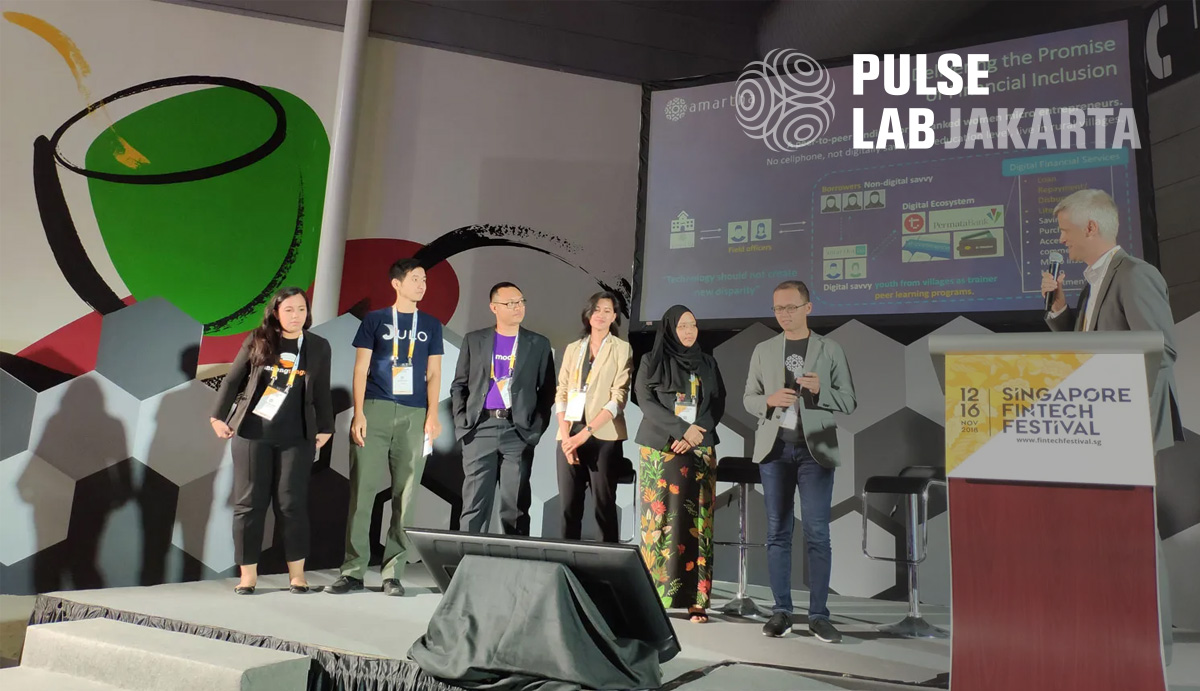
Start:
2019
End:
2019
|
2019
Fintech Challenge Fund Winners 6-Month Pilot Lessons LearnedLocation: Indonesia 
In collaboration with the United Nations Capital Development Fund, PLJ awarded seed grants to six Indonesian FinTech companies, aiming to explore the value of human intermediaries, alternative credit scoring, financial literacy, and cash light practices. The initiative aimed to enhance financial inclusion for microenterprises, helping them to incorporate into mainstream business models. The 6-month pilot program assessed various solutions and generated insights which are to be further expanded and improved upon, including digitising micro merchant receipts and broadening the geographic scope of their business offerings.
<p>Human intermediaries are traditionally known as agents, the mediator between the financial Financial literacy is the possession of the set of skills that allows an individual to make informed and effective decisions with all of their financial resources. The use of alternative data sets to include those without or with very Six Indonesian FinTech companies were awarded seed grants towards the end of last year as part of the Microenterprise Fintech Innovation Challenge Fund which Pulse Lab Jakarta implemented together with the United Nations Capital Development Fund — Shaping Inclusive Finance Transformations(UNCDF SHIFT) programme. Taking on insights from the Lab's Banking on FinTech: limited credit history from traditional financial institutions. service provider and the user. We use the term human intermediary to encompass a broader range of possible intermediaries. Financial Inclusion for Micro Enterprises in Indonesia research, the winners tested a variety of ideas related to the value of human intermediaries (agents), alternative credit scoring, financial literacy and cash light practices. The challenge fund was a catalyst to help these six local fintech companies incorporate microenterprises as an important part of their business models. The 6-month pilot programme nonetheless was only the beginning; our winners plan to take the insights from the pilot and expand and improve their business solutions. There are plans to begin digitising micro merchant receipts, incorporating crowdsourced information for quality assurance via community surveyors, and geographic expansion of their business offerings. The plans for scaling and sustaining the business solutions show that microenterprises are becoming more of an integral part of business for fintech companies. Cash Light Practices, Digital Payment System Cash light practices encourage the use of digital payment systems more frequently instead of completely eliminating cash. The piloting phase provided a practical platform for experimentation for the participants who may not have otherwise had the opportunity to pilot initiatives in their organisations. Although lessons from the piloting phase provided a foundation for understanding the opportunities and barriers for using fintech for financial inclusion in Indonesia, we acknowledge that the 6-month pilot programme has only scratched the surface with a limited sample in limited geographic locations. We were grateful for the close support from the Australian Government Department of Foreign Affairs and Trade (DFAT), Asosiasi FinTech Indonesia (AFTECH) and the Indonesian Financial Services Authority (OJK) during the programme, as well as VISA, Oracle, and Deloitte for their mentorship support for the winners in undertaking their experiments.</p>
Domain
Poverty, Financial Inclusion, and Economic Development
SDG
Decent Work and Economic Growth
Industry, Innovation, and Infrastructure
Reduced Inequality
Data
Qualitative Data
Partners
UNCDF SHIFT
OJK
DFAT
|
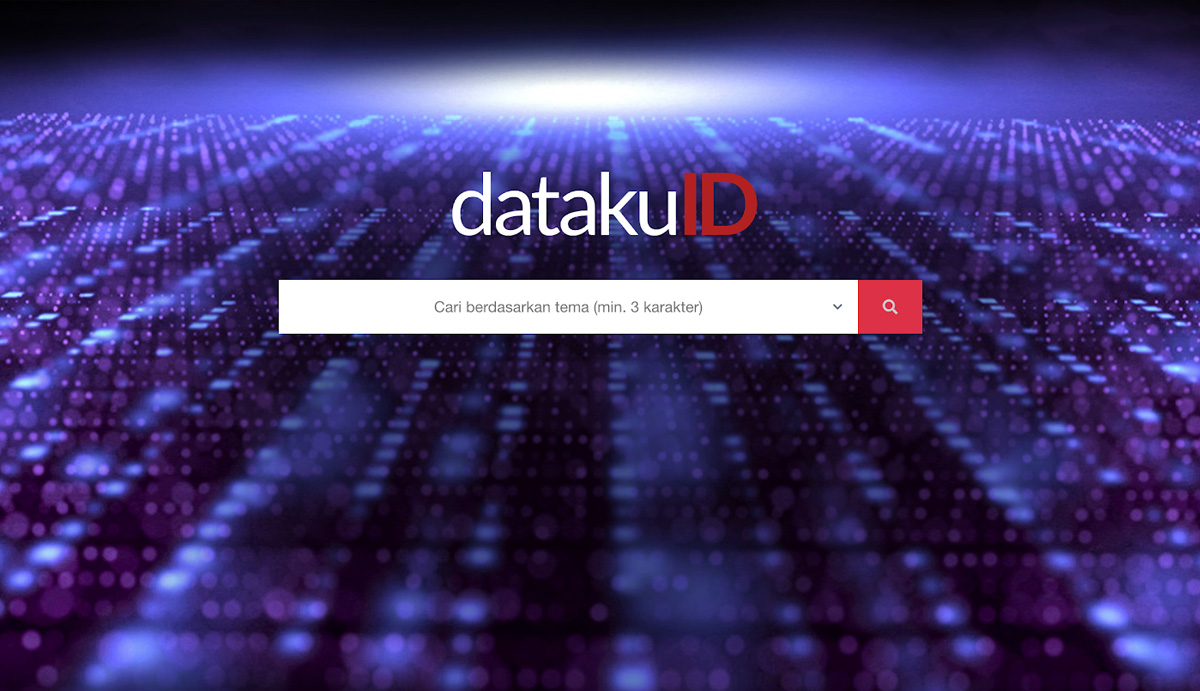
Start:
2019
End:
2019
|
2019
Dataku Using Data Analytics and Visualisation to Inform Government Decision MakingLocation: Indonesia 
PLJ, in partnership with the Ministry of National Development Planning in Indonesia, developed a data visualisation tool named DatakuID. The tool presents real-time data from the Satu Data Indonesia portal APIs in a user-friendly manner to assist government officials in making informed decisions. The tool's design offers agility and adaptability for adding future datasets, making it an integral part of Bappenas' Situation Room for planning, implementation, monitoring, and evaluation.
<p>To complement the Indonesian Government's data governance initiative known as Satu Data, Pulse Lab Jakarta alongside the Ministry of National Development Planning (Bappenas) developed a data visualisation tool to provide government officials with an at-a-glance, data informed view on particular development topics. The tool is being tested with potential users within the Ministry for feedback, and will become a cornerstone in Bappenas' Situation Room for planning, implementation, monitoring and evaluation. Known as DatakuID, the tool visualises near real-time data that is made available through Satu Data Indonesia portal APIs. While this portal houses several complex data sets that can be leveraged for effective policy making, making sense of the data often comes as a challenge. To address this challenge, Bappenas' Data and Information Centre initially explored a few ideas with Pulse Lab Jakarta's data analytics team, from which insights were garnered that later informed the development of the data visualisation tool. DatakuID is designed to ingest data from the Satu Data Perencanaan Pembangunan portal, then visualise and present them in an intuitive, concise and attractive format to inform decision making at the subnational and national levels. The tool is built with much agility, which makes it adaptable to other datasets that may be added in the future from the Satu Data portal, including datasets from other ministries.</p>
Domain
Strategic Exploration
SDG
Industry, Innovation, and Infrastructure
Peace, Justice, and Strong Institutions
Partnership for The Goals
Data
Satu Data
Partners
Bappenas
SDI
|

Start:
2019
End:
2019
|
2019
Informing National Statistics and Managing Disaster Risks in SamoaLocation: Samoa 
PLJ, in conjunction with mobile network operator Digicel, embarked on a project to explore the use of AI, machine learning, and predictive analytics in public sector decision making. The initiative aimed to use mobile network data and financial transaction data for better disaster management and to support the SDGs and the Sendai Framework. The project's analysis of pseudonymized mobile network data helped identify critical storm shelters and could help inform decision-makers about the numbers of people affected by disasters.
<p>Pulse Lab Jakarta, through its ongoing partnership with mobile network operator, Digicel, was interested in a proof-of-concept project designed to test whether artificial intelligence, machine learning or predictive analytics can be useful in public sector decision making. With funding for the preliminary research coming from UNDOCO's Innovation Facility, the Lab wanted to explore how operationalising mobile network data and financial transaction data can benefit the SDGs as well as with the implementation of the Sendai Framework for Disaster Risk Reduction. During one of our missions to Samoa and in discussions with stakeholders, we learned that the disaster management office in the island quickly gets overwhelmed during a disaster and has no way of accessing real or near real-time information in order to make timely, evidence- based decisions. The hypothesis for this research was thus whether the use of 'new' or non-conventional data sources can be harnessed for better decision making. Initially, we wanted to study the movement patterns of the Samoan population during Cyclone Gita as measured through mobile data usage, but given the logistics delays we faced with purchasing and installing a server at the mobile network operator's data warehouse to allow us to access the data, we missed the cyclone season and had to instead prepare a baseline analysis. By analysing pseudonymised movements of people through mobile network data and correlating it with evacuation points, we were able to identify that churches are important storm shelters in Samoa. This analysis assumed that if the churches are indeed important community structures, those churches with weak social networks would need entirely different humanitarian or development assistance in the event of a disaster than those churches with strong networked communities. We can also glean numbers of people affected by disasters through pseudonymised mobile network data which can help build up the evidence base for decision-makers. This project was done in parallel with several other research projects in other Pacific island countries and the methods for modelling education, household characteristics, expenditure and income diversity from mobile network data was published in an academic paper.During our visit to Samoa to meet and engage with stakeholders and understand the gaps which we felt could be filled through the use of non-conventional data sources, interest in data innovation was heightened. Through our colleagues in the UN office in Samoa, we had great access to government officials who were impressed with the work of the UN Global Pulse lab network and are keen to leverage the opportunities for data innovation not only in Samoa but also throughout the Pacific islands. This has since led to official communication from the Prime Minister of Samoa to establish a Lab in Samoa to serve the Pacific.</p>
Domain
Poverty, Financial Inclusion, and Economic Development
Disaster Response and Humanitarian Action
SDG
Industry, Innovation, and Infrastructure
Sustainable Cities and Communities
Climate Action
Data
Mobile Network Data
Partners
Digicel
UNDOCO
UN Samoa
Government of Samoa
|
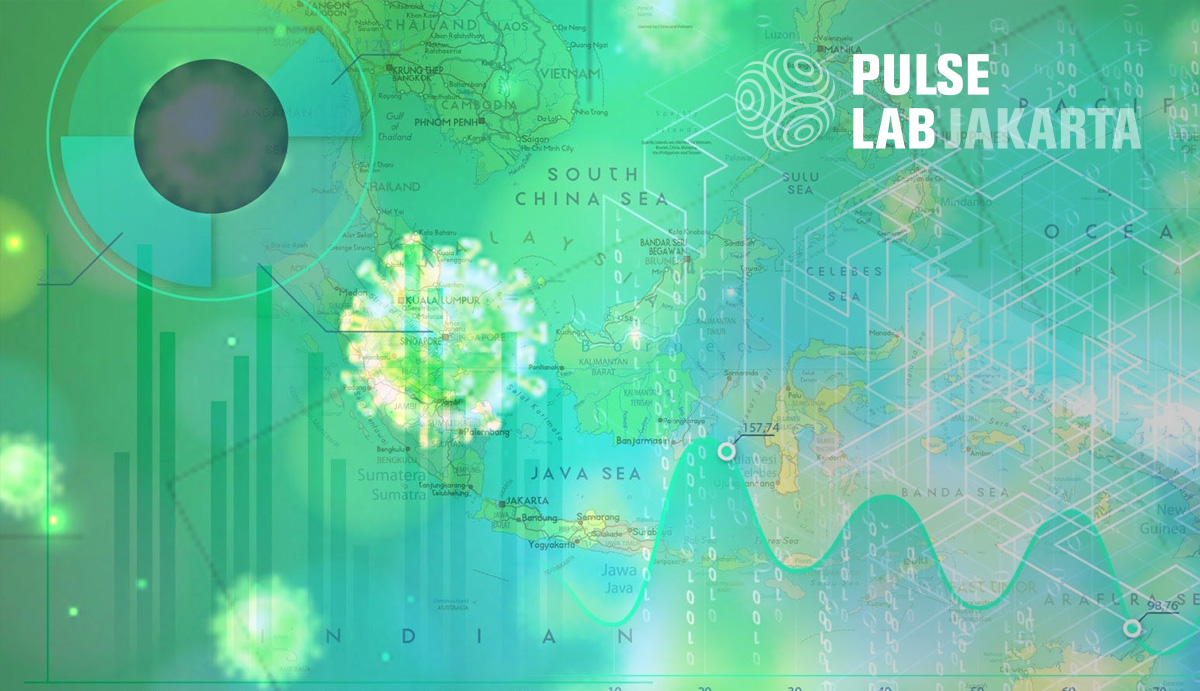
Start:
2019
End:
2019
|
2019
Real-Time Data for Faster Decision Making in Times of CrisisLocation: Indonesia 
This project aimed to integrate non-traditional, real-time data sources for better decision-making during crises. Solutions included combining Facebook Geoinsights and Mobile Network data for real-time displacement maps and using open-source data pipelines to present data via a common, documented, interoperable API. The project also proposed a streamlined 5Ws reporting workflow using Natural Language Understanding and the conversational reporting platform Rapidpro. The goal was to make public data sets more accessible and apply machine learning applications to existing data sets.
<p>Real-time Data for Faster Decision Making in Times of Crisis Real-time data can accelerate a government's understanding of a disaster's impact, as well as the urgent needs of its population much faster than traditional data sources used in emergencies. The immediate days following a sudden onset emergency are typically focused on crucial decision making and questions about the scope of impact, location of the most vulnerable and resource allocation. Following extensive discussions with relevant humanitarian agencies and stakeholders in Indonesia, PLJ and UNICEF identified a set of challenges that can be addressed through the integration of non-traditional, realtime data sources. Problem: Collection of data on the movement of people is expensive and time-consuming Solution: Combine Facebook Geoinsights and Mobile Network data to produce real-time displacement maps During disasters, Facebook provides anonymised, privacyconscious aggregated real-time data on the movement of people at the town (Kecamatan) level. Under an existing agreement with Facebook, this data is available to UNICEF and some international NGO's (IFRC), at no cost. Whilst rigorous benchmarking is required before deploying this data in decision making, in exploratory work done by PLJ and UNICEF it was revealed that the unweighted Facebook population movement data in the aftermath of the 2018 Palu earthquake was broadly representative of the later confirmed displacement data, and substantially more accurate than other early and informal data available in the 72 hours after the disaster. Problem: Data preparedness is time-consuming and under-resourced Solution: Leverage a set of reproducible open source data pipelines that ingest data from disparate sources and presents that data via a common, documented, interoperable API Humanitarian Data Exchange (HDX) stood out from our survey of potential real-time data. HDX is an open source platform built by UNOCHA that allows UN agencies and NGOs to store, manage and access datasets for instant analysis, visualisation and comparison. The platform and tools are accessible to both technical and nontechnical staff, and allow the design of visualisations and dashboards in a web browser. HDX also leads work on the Humanitarian Exchange Language (HXL) data tagging standard, which enables non-technical staff to easily annotate and validate data and create both summary and map based live data dashboards without the need for coding or use of additional data cleaning or validation resources. These dashboards are suitable for viewing on a range of devices and already function well in lowconnectivity and offline environments. Problem: 4W/5W Tools are cumbersome and take time away from disaster response Solution: 5W, Leverage existing technologies to create a standardised, massively streamlined 5Ws reporting workflow The process of completing a 5W's questionnaire can be complicated and is prone to data entry errors as it requires many data post-processing steps before becoming available (and soon after becomes unreliable or out of date). Using Natural Language Understanding NLU, 5Whats can understand responses and ask clarifying questions to ensure that activities are being recorded in the correct location and have sufficient detail, while reducing reliance on spreadsheets and manual, computer based data entry. UNICEF has invested in, and open sourced the conversational reporting platform Rapidpro. Operating over SMS, Whatsapp and other instant messaging platforms, it allows for structured data collection in a conversational flow, without imposing additional workflow requirements or cognitive load on field and information management staff who may already be overbruned. This research exploration has unearthed the need for the adoption of innovative tools that can surface relevant realtime data in a timely and interpretable fashion during times of crisis. Going forward, the goal is to make existing public data sets and ones available to UNICEF more accessible through reproducible data pipelines; test the prototype of our data analytics and visualisation tool that demarcates affected areas; as well as gather user feedback and scope the feasibility of applying machine learning applications to existing data sets (such as predicting movement of people post-disaster using historical Facebook Geoinsights and Mobile phone CDRs).</p>
Domain
Disaster Response and Humanitarian Action
SDG
Industry, Innovation, and Infrastructure
Climate Action
Partnership for The Goals
Data
Facebook Geo-Insight
Partners
UNICEF
IFRC
UN OCHA
Facebook
|
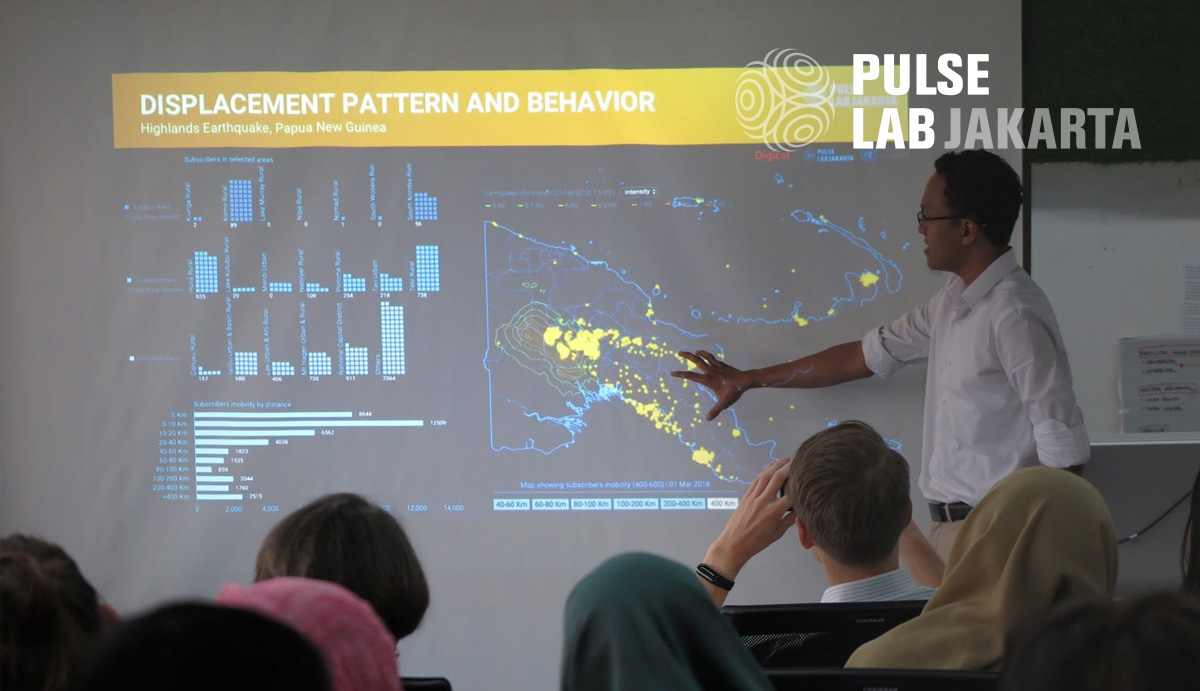
Start:
2019
End:
2019
|
2019
Comparing Population Displacement Estimates from Mobile Network Data in PNGLocation: Papua New Guinea 
Following the Highlands earthquake in Papua New Guinea in 2018, PLJ used pseudonymized mobile network data to gain insights on population displacement. The research compared findings with IOM's displacement tracking matrix and the allocation of humanitarian resources. The project highlighted the potential of mobile network data to provide valuable information during the chaotic aftermath of natural disasters.
<p>This research explored pseudonymised mobile network data as a source of insights on displacement following the Highlands earthquake in Papua New Guinea in February 2018, and compared the findings to the current best practice for displacement tracking, namely IOM's displacement tracking matrix. We also compared the insights against information on the targeting of humanitarian resources, finding that the targeting of surveys and the allocation of humanitarian assistance are respectably efficient. We hypothesised that by removing the frequent travellers, we were better able to focus the analysis on displaced subscribers, and remove any noise generated by regular commuters, who could also have been displaced but due to their movements we are less confident of this classification. We thus subset the data set to include only subscribers with an average day-to-day travel distance of less than or equal to 15 kilometres, and use this subset to filter the day-to-day subscriber trajectory data set following the earthquake. The analysis revealed a high-level picture of earthquake impact on communities across PNG by modelling the relationship between cell tower activity and cell tower distance relative to the earthquake epicentre. The tower activity ratio, which is defined as a ratio between the number of unique mobile phone subscribers connected to the tower and the number of unique mobile phone subscribers connected to the entire Digicel network in PNG over a week, was first calculated. In order to observe the earthquake's impact, we examined these ratios during two time periods, before the earthquake and after the earthquake. This analysis only examines data from Digicel, which holds a majority market share in PNG. The absence of data from the other mobile network operator, as well as the fact that neither network has network coverage of all populated areas introduces some additional coverage error. Nevertheless, the findings from the analysis offer new perspectives on the quantification of displacement and underline the potential of mobile network data to offer highly valuable information during what are often chaotic days and weeks following a natural disaster.</p>
Domain
Disaster Response and Humanitarian Action
SDG
Industry, Innovation, and Infrastructure
Sustainable Cities and Communities
Climate Action
Data
Mobile Network Data
Partners
Digicel
IOM
|

Start:
2020
End:
2020
|
2020
Leveraging Digitalization to Cope with COVID-19Location: Indonesia 
This project, a collaboration between UN Women, PLJ , and Gojek Indonesia, leveraged mixed-methods research to assess the impact of COVID-19 on women entrepreneurs and micro and small businesses in Indonesia, particularly in the food and beverage sector. Key findings suggested increased reliance on digital platforms for marketing products and services, which could inform responsive programme design and address pandemic-exacerbated gender inequalities. Outputs included a comprehensive research report and an interactive data visualisation portal featuring data from a survey and qualitative research. Future includes replicating the survey in other Asia-Pacific countries and developing a digital capabilities framework for women micro and small businesses (MSBs) owners.
<p>As part of the UN COVID-19 Response and Recovery Multi-Partner Trust Fund (COVID-19 MPTF), UN Women partnered with Pulse Lab Jakarta (PLJ) and Gojek Indonesia for a mixed-methods research to understand the extent to which COVID-19 has affected women entrepreneurs and women-owned MSBs in Indonesia, with a focus on those in the food and beverage sector. With evidence suggesting that women who own and run MSBs are relying more on digital platforms to market their products and services, further understanding this phenomenon is critical for designing responsive programmes and addressing gender inequalities that has been exacerbated by the pandemic. The collaborative research resulted in two main outputs, delivered jointly by PLJ and UN Women: Leveraging Digitalization to Cope with COVID-19: An Indonesia Case Study on Women-Owned Micro and Small Businesses: the full research report, published and launched on 11 December 2020, which consists of findings from the UN Women-led quantitative component as well as the PLJ-led qualitative research, as well as both agencies' policy recommendations. The report, in English and Bahasa Indonesia, is publicly accessible on bit.ly/MSBsDig Is Digitization Helping Businesses Like Yours to Cope with the Effects of COVID-19?: an interactive data visualization portal that features data from the survey conducted by UN Women and Gojek, as well as selected insights from the PLJ-led qualitative research. The portal went live on 26 November 2020 and is publicly available in English and Bahasa Indonesia at bit.ly/C19biz Pulse Lab Jakarta delivered the research design for the qualitative component, which was peer-reviewed by UN Women Statistics Division and Gojek Indonesia. In addition, the team developed a set of research instruments for the qualitative component, consisting of guidelines for virtual interviews and digital observation with 40 MSB owners, 24 of whom are women, spread across urban and peri-urban areas in some of the major cities in Indonesia, namely Jakarta, Medan, Makassar, Semarang and Yogyakarta. To build on the existing work, UN Women Statistics Division is planning to replicate the survey in other countries in the Asia-Pacific region, using the current research as a case study. PLJ is revisiting the qualitative data collected throughout the study to test the possibility of designing a digital capabilities framework specifically for women necessity MSB owners, which has the potential to inform capacity building initiatives for this cohort.</p>
Domain
Poverty, Financial Inclusion, and Economic Development
Public Health and COVID-19
Women's Empowerment and Gender Equality
SDG
Gender Equality
Decent Work and Economic Growth
Industry, Innovation, and Infrastructure
Data
Qualitative Data
Partners
UN WOMEN
Gojek
SNKI
Secretariat for the National Council for Financial Inclusion (SNKI)
StatisticsIndonesia (BPS)
Secretariat of the Indonesian National Council for Financial Inclusion (S-DNKI)
|
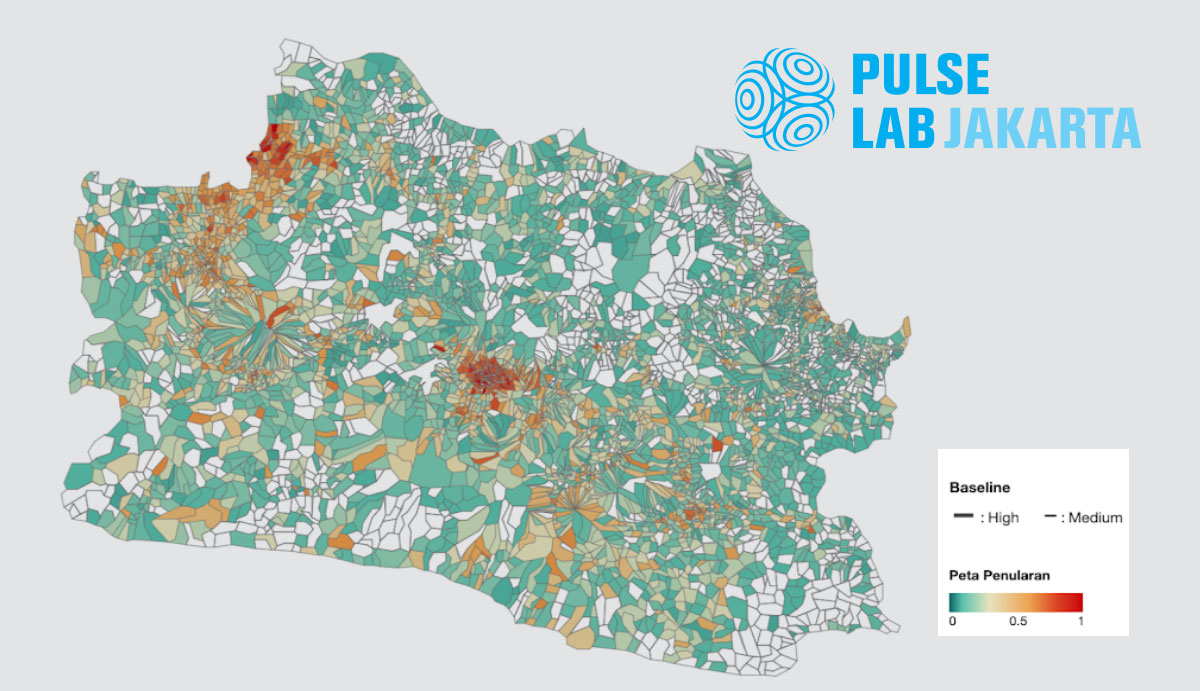
Start:
2020
End:
2021
|
2020
COVID-19 Risk Assessment Mapping for West Java ProvinceLocation: - 
PLJ, in partnership with government bodies and UNICEF Indonesia, aims to enable a localised and dynamic approach to COVID-19 lockdown measures. In 2020, using the Village Potential census (PODES) data from 2018, the project developed metrics for transmission potential and risk by integrating various data sets such as transportation, slum areas, meeting points, sanitation, and population density. This granular understanding of disease transmission potential helps in implementing targeted interventions. The project was further refined in 2021, collaborating with Jabar Digital Service, Bappenas, and UNICEF Indonesia. The refined COVID-19 risk assessment map incorporates administrative data and Facebook Population Density Maps. The second phase enhanced data analysis, visualisation features, and operational integration. It also contributed to a computational model for simulating social restriction scenarios, providing valuable data-driven policy insights.
<p>In 2020, with Indonesia reporting one of the highest number of COVID-19 cases among Southeast Asian countries in the early months of the pandemic, parts of the country, including its most populous province - West Java, began implementing a soft-lockdown to slow the spread of the disease.</p>
<p>To support government response, Pulse Lab Jakarta has been working with Jabar Digital Service (JDS) of the West Java provincial government, the Ministry of National Development Planning (Bappenas) and UNICEF Indonesia to develop data insights to inform a more localised, targeted and dynamic approach towards imposing and lifting the COVID-19 soft-lockdown in Indonesia. These insights would support the West Java government's decision making in opening up pockets of areas to economic and social activity whenever the conditions merited it. To have a better understanding of the transmission potential of each area within the province, there is a need for data that has information on transmission factors, preferably at the smallest granular level to support the localised intervention mechanism.</p>
<p>Our team used the Village Potential census (PODES) that was last conducted in 2018 to derive two relevant metrics: (i) transmission potential index and (ii) transmission risk. To establish the potential index, the Lab consulted with epidemiologists and determined the baseline index consists of the following factors where the variables are also available in PODES: transportation, slum areas, meeting points and sanitation. The first three factors have a positive sign, which indicates that a higher score from each factor accelerates the transmission. Meanwhile, sanitation has a negative sign in which a higher score means a transmission delay. However, one crucial data point was not available in the PODES data — population density. In terms of spatial granularity to generate population density for each village, high spatial resolution of those dataset enables aggregation of population density to the village level, which is on par with PODES. Unfortunately, like most countries the population census in Indonesia is conducted every 10 years and at the time the most recent available data was from 2010.</p>
<p>Therefore, we needed to find more recent population data, but with similar or more spatial resolution than what is available in PODES. To come up with the population density score, the Lab used Facebook Population Density Map (FPDM) data accessed through the Humanitarian Data Exchange (HDX) as part of Facebook's Data For Good Programme. FPDM data was last updated in 2018, similar to PODES and it covers the entire Indonesia with 30-meter square resolution. To integrate this data with the PODES data, the Lab reduced the resolution to the village level. To test its validity, our team used population figures from the 2018 SUSENAS (national socioeconomic survey) data, which is another administrative data collected at the district or city level.</p>
<p>The result was quite robust, with a correlation coefficient of 0.98 (which indicates a strong correlation). After calculating the transmission potential, the next step was to assess the metric that compounds transmission potential and cases data — the transmission risk. Transmission risk related to COVID-19 analysis is basically an ex-post measure, where villages without cases basically have zero risks regardless of their baseline score and villages with cases have positive risks associated with the number of cases and the baseline prospect. Therefore, the nature of transmission risk is dynamic as it follows the number of cases in villages. The static spatial and temporal measures we constructed from PODES, though not being too out-dated, need to be coupled with more up to date dynamic data on a host of important factors, such as mobility and case incidence data when informing decisions that need to be undertaken. There are plans being undertaken to enhance the research approach to inform vaccine prioritization and distribution across the province.</p>
<p>To support COVID-19 response, in 2021 we continue worked with Jabar Digital Service of the West Java Government, Bappenas and UNICEF Indonesia to refine the COVID-19 risk assessment map we previously developed at the height of the COVID-19 crisis in 2020. The map was designed to identify COVID-19 transmission hotspots in West Java (the country's most populous province of 50 million people), by overlaying administrative data with Facebook Population Density Maps.</p>
<p>As the pandemic evolved and new needs for the map emerged, we embarked on a second phase of the project in 2021 to reconfigure the map's data analysis and visualization features, as well as to build further linkages for effective adoption within its operational environment. Following its handover to Jabar Digital Service, the map was integrated into PIKOBAR (the Information and Coordination Centre for Disease and Disaster in West Java) and installed in the provincial government's digital Command Centre. Harnessing learnings from this data-driven risk assessment map, our team went on to partner with CSIRO (Australia's National Science Agency and Innovation Catalyst) to develop a computational model for simulating actions and interactions with respect to a range of possible COVID-19 social restriction scenarios in Bekasi, an urban city in West Java with a population of about 3.5 million people.</p>
<p>This research provided data-informed policy insights on crowd dynamics and infection trends at a microscopic level based on places of transmission such as home, workplace and school. This collaboration also catalysed a new partnership with the Indonesian Ministry of Health focused on health data analytics (details of which are discussed later in this review).</p>
Domain
Poverty, Financial Inclusion, and Economic Development
Urban and Regional Dynamics
Public Health and COVID-19
Women's Empowerment and Gender Equality
SDG
Good Health and Well-being
Industry, Innovation, and Infrastructure
Sustainable Cities and Communities
Data
Population Density Maps
PODES
Waze
Partners
Bappenas
UNICEF
JDC
|
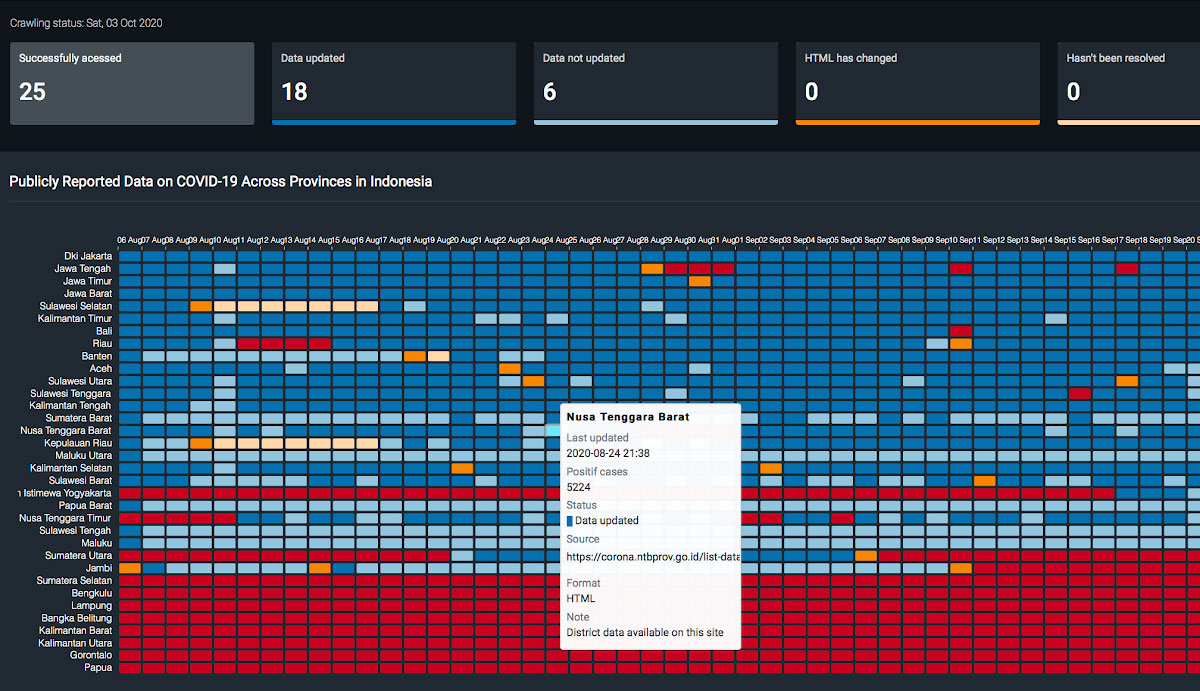
Start:
2020
End:
2020
|
2020
Baseline Assessment of Publicly Reported COVID-19 Data in IndonesiaLocation: Indonesia 
PLJ assessed the availability and quality of publicly reported COVID-19 data across Indonesia. Their analysis revealed inconsistencies in data reporting, with only a portion of provinces and districts providing clear, updated data. To address these challenges and enhance the data ecosystem, PLJ along with the Ministry of National Development Planning and UNICEF Indonesia, designed a dashboard for monitoring daily data updates. This tool is being integrated into the Indonesian Government’s COVID-19 monitoring assessment tools.
<p>In the early weeks of COVID-19 in Indonesia, Pulse Lab Jakarta began surveying the availability of publicly reported data on cases across the country. Apart from understanding how the pandemic was evolving across the archipelago, we were interested in examining the countrywide data ecosystem. Our baseline assessment in May 2020 revealed that only 20 of the country's 34 provinces had clear reporting sites where data could be obtained, and of the 523 districts, only 290 had updated websites reporting on COVID-19. Whilst several provinces share their data on public sites through a common domain-naming format (https://corona.provincename. go.id), others provide data through their regional health offices or use customised links. West Java in particular is one of the provinces that has complete and updated data, with DKI Jakarta detailing data from the district to the village (kelurahan) level. However this is far from being the norm across all provinces, notably with data being publicly unavailable for a few. Ranging from PDFs to images, there are also inconsistencies in the format in which the data is presented, thus presenting challenges for other parties to aggregate and/or make use of the data. In undertaking this process, it became immediately apparent the need for more effective country-wide collaboration and a stronger data ecosystem. Together with the Center for Development of Planning Data and Information (Pusdatinrenbang) in the Ministry of National Development Planning and UNICEF Indonesia, our team designed a data analysis and visualization dashboard to monitor how the data was being reported day-to-day on provincial websites. Particularly in handling the COVID-19 crisis, this was an opportunity to identify and address underlying, systemic conditions within the country-wide data ecosystem to ensure a more effective national response, and tackle misinformation where trust in public data is compromised. In the second phase of our baseline assessment, we further examined the provincial websites' public reporting on COVID-19 to answer: what details are included on each website, how frequently is it updated, and what are the recurring issues in terms of data access and data ingestion? This dashboard is being integrated among the Indonesian Government's COVID-19 monitoring assessment tools.</p>
Domain
Strategic Exploration
Public Health and COVID-19
SDG
Good Health and Well-being
Industry, Innovation, and Infrastructure
Partnership for The Goals
Data
Scrapping Data
Partners
Bappenas
UNICEF
|
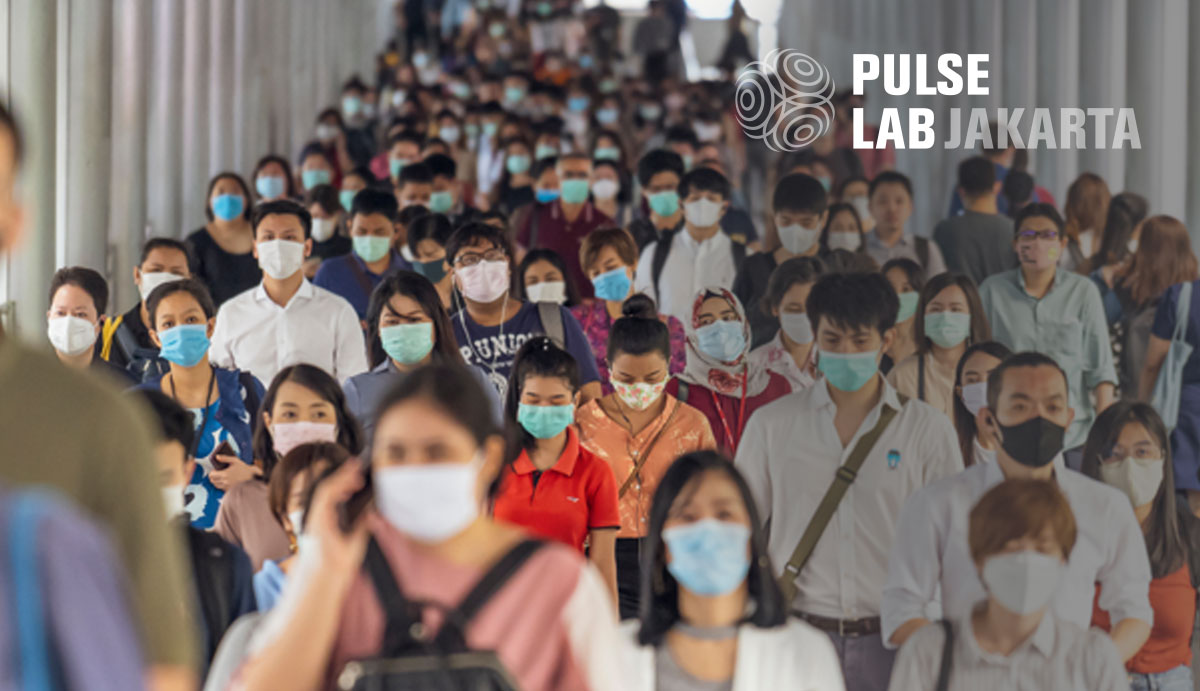
Start:
2020
End:
2020
|
2020
Global South AI4COVID ProgrammeLocation: Global World 
The project, funded by IDRC and Sida, aims to promote research and applications of AI and data science for COVID-19 response in low- and middle-income countries. Launched in 2020, the program supports research in forecasting transmissions, optimising health system responses, gender-inclusive action, combating misinformation, and strengthening data systems. It currently supports nine research grantees across eighteen countries in the Global South. In 2021, the program continued to offer competitive grants to research consortia partnering with governments in low- and middle-income countries. PLJ serves as a technical resource hub, facilitating knowledge sharing, global communication efforts, policy linkages, and action mobilisation. The program supports eight research grantees across eighteen countries in Asia, Africa, and South America. In 2022, the program continues to support evidence-based research using AI and data science for COVID-19 response and recovery in low- and middle-income countries, covering various aspects of the pandemic and promoting responsible AI, data, and digital rights governance.
<p>Funded by Canada's International Development Research Centre (IDRC) and the Swedish International Development Cooperation Agency (Sida), with support from Pulse Lab Jakarta, the Global South AI4COVID Program supports multidisciplinary research focused on evidence-based artificial intelligence (AI) and data science approaches to aid COVID-19 response and recovery in low- and middle-income countries. In particular, the multi-year program aims to support research that is linked to government responses and policy making in the following areas: - Forecasting transmissions and reducing spread through policy and public health interventions - Optimising public health system responses for patient diagnosis, care, and management - Mobilising AI and data science to understand and support gender inclusive COVID-19 action - Building trust and combatting mis- and dis-information around COVID-19 - Strengthening data systems and information sharing about COVID-19 - Supporting transparent and responsible AI, data, and digital rights governance around COVID-19 and pandemic responses The inaugural cohort consists of nine research grantees (including research consortia and individual organizations), working in 18 countries within the Global South. Ranging from early detection and containment, to mitigation and forecasting, their work will cover a range of components related to harnessing AI and data innovation for COVID-19 responses and recovery. The research undertaken by the inaugural cohort of research grantees falls within two overarching themes: AI for COVID-19 Policy and Decision Making Informing policies, both organisationally and nationally, that support and build trust in AI and data science responses to epidemics and that mitigate potential harms; and Strengthening the capacity of health systems in low- and middleincome developing countries to respond to epidemics using AI and data science techniques. User-Centric Data Innovation and AI for COVID-19 Deepening understanding of how to develop and scale responsible and evidence-based AI and data science approaches that support COVID-19 response and recovery in developing countries; and Ensuring that those responses are gender responsive and culturally appropriate, community specific, and based on local needs and contexts. The Lab is serving as a technical resource hub for grantees for timely flows of knowledge and expertise and is playing a key role in augmenting global communication efforts, identifying opportunities for policy linkages and facilitating mobilization for action in the Global South.</p>
Domain
Strategic Exploration
Public Health and COVID-19
SDG
Good Health and Well-being
Industry, Innovation, and Infrastructure
Partnership for The Goals
Data
Research Paper
Partners
SIDA
IDRC|CRDI
|
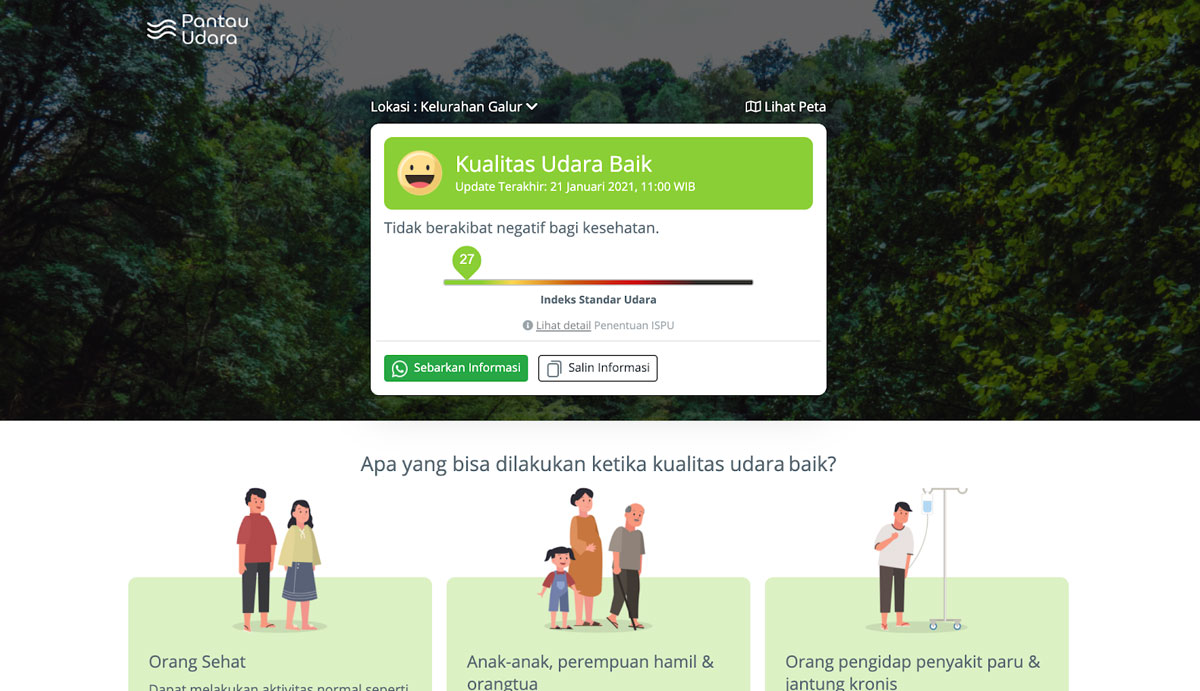
Start:
2020
End:
2020
|
2020
Community-Based Air Quality Monitoring in IndonesiaLocation: Indonesia 
This project, funded by the Islamic Development Bank and conducted by PLJ in collaboration with Kopernik and the Udara Project, aimed to raise awareness about the health impacts of air pollution in Indonesian communities. They installed low-cost air quality sensors in Jakarta and Kalimantan and used a human-centred design approach to develop an information system. The system delivers SMS notifications about air quality levels and provides related health advice to local communities.
<p>People often perceive air pollution to be a health risk, but many of them do not know the extent to which poor air quality can affect their health and when to take precautions to limit exposure. In some communities across Indonesia, this limited understanding about the issue hinders mitigative action. To address this concern, Pulse Lab Jakarta in collaboration with Kopernik and the Udara Project at Institut Teknologi Bandung designed a human-centered, air quality information system to help mitigate the impact of poor air quality on local communities. Funded by the Islamic Development Bank (IsDB), the project sought to test, calibrate and install low-cost sensors in Jakarta and Kalimantan. This was coupled with Human-Centered Design, a problem-solving methodology that helps researchers to better understand the needs, desires, pain points and experiences of the users through empathy. Combining these aspects, the air quality information generated is shared via SMS notifications to affected populations, notifying victims when to take measures to protect their health, and providing general educational material related to poor air quality and health. The system targets two specific profiles: the user and the beneficiaries. Village apparatus, seen as the primary user of the system, are well positioned to operate and maintain the air quality monitoring system. Community members are seen as the beneficiaries, a group that will gain from the system by receiving updated information on air quality in their areas, with educational advice on what actions to take. The prototype has been handed over to Institut Teknologi Bandung, where considerations are being made for integration within existing air quality monitoring systems at the community level. With the recent requirement for local governments to provide information on air quality, as stated in a recent regulation by the Indonesian Ministry of Environment and Forestry, the system has potential for helping local governments provide better air quality information to their constituents.</p>
Domain
Environment and Climate
SDG
Good Health and Well-being
Sustainable Cities and Communities
Climate Action
Data
Air Quality Index
Partners
KOPERNIK
ITB
|
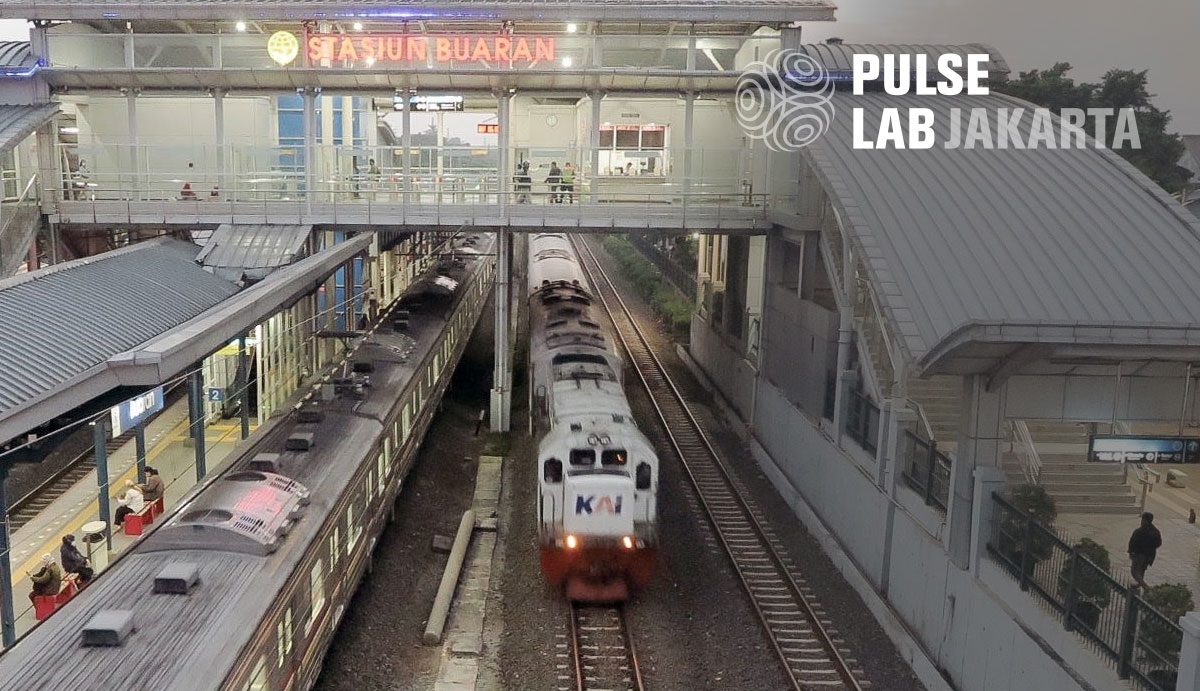
Start:
2020
End:
2021
|
2020
Better Understanding PT. KAI Passengers’ Travel BehaviourLocation: Indonesia 
PLJ, in collaboration with Indonesia's state-owned Railway Corporation (PT KAI), focuses on processing and analysing passenger data to gain insights into travel behaviours and inform business strategies. In 2020, the project identified demographics and passenger segments, observed travel movements, and highlighted the presence of women travelling alone and at night, indicating the need for improved safety and comfort facilities. This project serves as a capacity-building activity for train authorities and government officials, enhancing their understanding and utilisation of data. In 2021, the project continued in partnership with PT KAI, analysing passenger data to understand diverse travel needs, including day-to-day mobility patterns and the requirements of vulnerable passengers. The project provides valuable insights for inclusive transport planning and emphasises the importance of data in business development and policymaking.
<p>2020: Digitalization (e.g. online ticketing, smart cards, automated fare collection) of transport and big data technologies now allow a detailed, large-scale, and frequently updated view of human mobility as well as the wider transportation sector as a whole. Gaining a better understanding of train passengers' behaviours through data analysis can inform both developmental agendas and business strategies, such as helping train authorities to meet customers' needs, enhance inclusive service delivery and increase ridership. Partnering with Indonesia's state owned Railway Corporation (Kereta Api Indonesia or KAI) with support from the Ministry of National Development plan, the Lab sought to explore the potential and feasibility of utilising, processing and analysing PT KAI passenger datasets for insights on business strategy and inclusive development, and conduct baseline assessment to better understand PT KAI passengers' travel behaviours, namely passengers segments, demography and movements. In the past the national railway data has never been disaggregated by gender. Through this process we have shown them the value of disaggregating data not only by gender, but also by age, identifying through this process a large number of women travelling by rail, alone and after dark (between 6PM to 6AM). This highlighted an existing opportunity to further increase women passengers by increasing safety and comfort facilities. This research is an indication of PT KAI taking leadership amongst Indonesian state owned enterprises in effectively disaggregating data to identify vulnerable groups to further understand their needs and design inclusion solutions. Through this project, authorities can make sense of what the data contain and uncover relevant insights. As a baselining research, this project also serves as a capacity building activity that enables train authorities and government officials to better understand and make use of their data before going into more complex analyses.</p>
<p>2021: To understand the diverse needs of its passengers, we partnered with PT KAI (Indonesia's national railway company) to analyze millions of passenger data, including demographic information, origin-destination points and transaction details. The analysis provided high resolution insights with near precision on the day-to-day mobility of passengers, and represented anonymized information of who, what, when, where and and how at an individual level. Disaggregating the data by sex, the analysis provided further insights towards inclusive transport planning, especially for women passengers travelling alone during nighttime hours. This analytic approach was particularly welcomed since railway passenger data as reported annually by the Indonesian Ministry of Transportation has never been disaggregated. The research analysis not only served as a capacity building activity to help train authorities and government decision-makers make use of their data, but also highlighted the importance of ensuring the availability of disaggregated data, for instance to address the needs of vulnerable passengers such as people with disabilities. Additionally, the process of accessing and analyzing the data provided new perspectives on how the national railway company could better integrate its varied amount of data collected with external transport systems for better business development in line with their inclusive development agenda as a state-owned enterprise. An op-ed, co-authored by one of the railway company's commissioners, the UN Resident Coordination in Indonesia and our Head of the Lab, was later published in The Jakarta Post on How Big Data is Helping to Transform Indonesia's Public Transport System based on insights that emerged from this work.</p>
Domain
Poverty, Financial Inclusion, and Economic Development
Trade and Competitiveness
Strategic Exploration
Women's Empowerment and Gender Equality
SDG
Gender Equality
Industry, Innovation, and Infrastructure
Reduced Inequality
Data
PT. KAI Passenger Data
Partners
Bappenas
KAI
|
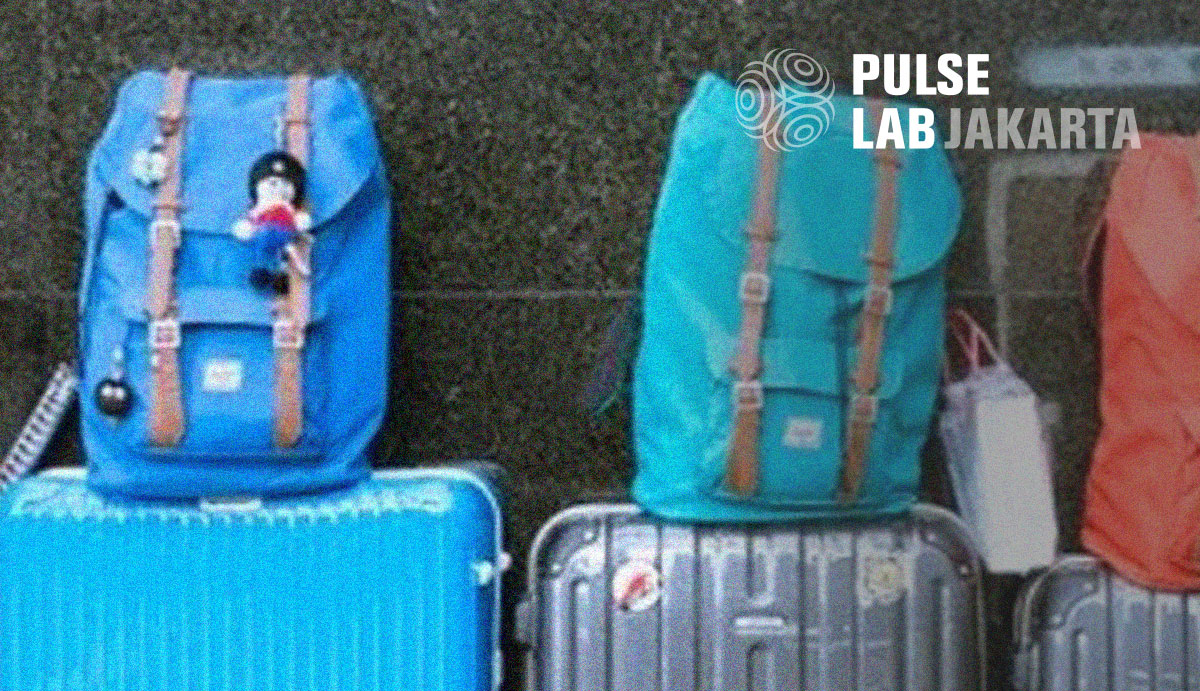
Start:
2020
End:
2020
|
2020
Assessing Potential Risks of COVID-19 Spread Due to Lebaran-Related TravelLocation: Indonesia 
This research, in collaboration with the Indonesian Ministry of Transportation, evaluates the risks of COVID-19 transmission during the Islamic holiday of Eid al-Fitr in Indonesia. An online survey was conducted to understand citizens' travel decisions and perceptions, revealing that many respondents intended to travel despite social restrictions. The study also suggests the potential of real-time mobility data to enhance understanding of population movements and potential COVID-19 transmission risks.
<p>The Research and Development division within the Indonesian Ministry of Transportation (Kemenhub) conducted an online survey in April 2020 to gain an understanding of citizens' decisions and perceptions towards travelling during the Islamic homecoming holiday of Eid alFitr, known locally in Indonesia as Lebaran. Carried out subsequent to the implementation of several COVID-19 related social restrictions in parts of the country, the survey collected responses from more than 100,000 respondents across 34 provinces, with the majority coming from the Greater Jakarta metropolitan area. In collaboration with the Ministry of Transportation, Pulse Lab Jakarta analysed the responses to develop descriptive statistics pertaining to the profile of the respondents, reasons for travelling home, in addition to assessing the respondents' perception towards the Government of Indonesia's policy discouraging travel during the holiday period. The analysis revealed that despite social restriction measures in place, a significant number of respondents still intended on travelling home to their villages for the holiday. Their reasons may be described as both finance related (e.g. loss of income due to the impact of COVID-19) and non-finance related (e.g. due to traditional, family practices). The majority of the respondents fell within the 40 and younger age demographic, including high school graduates and online drivers. Apart from providing data-informed insights to further inform and evaluate the social restriction measures, the analysis also identified information gaps that can be filled by alternative data sources. For instance, whilst the survey provides information on transportation modes, there's a possibility to harness real-time, high resolution mobility data from cellular network and transportation services to better understand population movement with regards to the potential risks of COVID-19 transmission.</p>
Domain
Strategic Exploration
Public Health and COVID-19
SDG
Good Health and Well-being
Industry, Innovation, and Infrastructure
Sustainable Cities and Communities
Data
Customized Survey
Partners
Bappenas
MoT
|
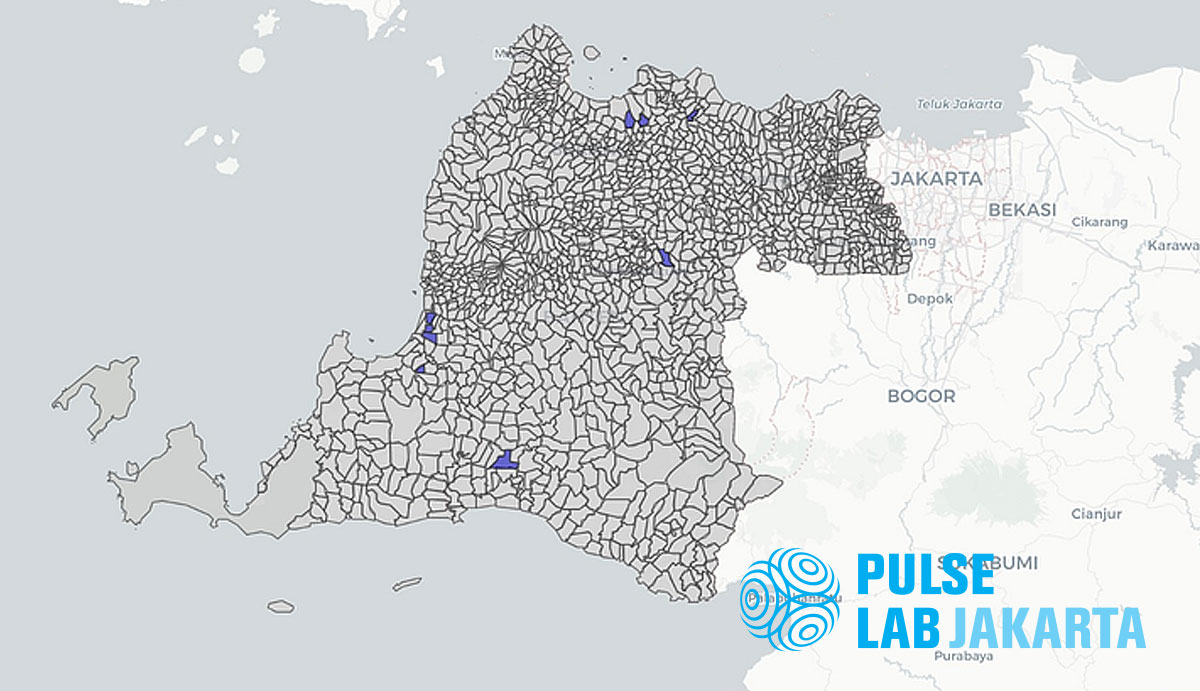
Start:
2020
End:
2020
|
2020
Identifying Potential Positive Deviants Across Rice Producing Areas in IndonesiaLocation: Indonesia 
This study by PLJ identifies successful rice farming villages in Indonesia by merging traditional statistical data with Earth Observation big data. The Positive Deviance approach identifies communities that achieve better outcomes through uncommon practices. The project identified high performing villages with younger farmers, lower incidences of flooding, and a mix of plantation and rice farming. Validation approaches confirmed the identified outliers as "true" outliers, suggesting potential positive deviants.
<p>Contributing to the global Data Powered Positive Deviance initiative, Pulse Lab Jakarta conducted data analytics research by merging traditional statistical data with Earth Observation big data to identify potential rice producing villages across Indonesia that might be faring better than others. This Positive Deviance approach is focused on identification and scaling of strategies undertaken by positive deviants, which refer to individuals or communities that use uncommon practices that enable them to achieve better outcomes than their peers, despite having similar conditions and resources. Although the Positive Deviance approach has had success, the scaling of successes achieved across diverse geographies and large populations has presented numerous challenges, part of which can be attributed to the conventional qualitative and quantitative approaches employed, namely interviews and surveys. Statistically rigorous, time-tested methods and processes underline the generation of official statistical data. As such, it's reasonable that trialling a new approach such as Positive Deviance that combines official statistical data with big data would undergo similar scrutiny. Our pilot project, was premised on this understanding, wherein the focus was to develop a statistically robust method that can reanalyse exemplar official statistical data (agriculture census and village potential survey), in combination with open access Earth Observation (EO) big data, using a PD-based framework. For this research, re-analysis entailed leveraging the aforementioned data sets to identify communities of rice farming villages, and then within those communities, to further identify individual villages with relatively high agriculture productivity (high performers). This was then followed by getting a sense of successful practices that might have been responsible for high agriculture productivity, as identified using official statistical data. Lastly, we sought to identify opportunities that may help to eventually scale successful practices across remaining individual villages that have common bioclimatic conditions. Once the performance measure was established, our next step was to figure out how to determine the high performers based on this measure. We employed distributional cut-offs, partial least squares regression, in combination with a variety of outlier detection methods, to not only identify high performers/PDs, but also structural variables and conditions (derived from official statistical data) associated with the high performers within each homologous environment. We found several high performing villages across a number of homologous environments with relatively younger farmers, lower incidences of flooding events and followed a combination of plantation farming along with rice farming. Also of interest, these villages were dependent on rain-fed systems. We implemented three different validation approaches, all of which assessed whether the identified outliers are indeed outliers, or artefacts of the method used. Two of the three validation approaches relied on reviewing literature that investigate the relationship between the structural variables significantly associated with outliers and high agriculture productivity. To complement this literature review, we also used the Google time scale tool, and analysed historical satellite imagery by searching for evidence for these successful practices (for instance searching for evidence of plantation farming), on a subset of villages across all homologous environments. While these validation approaches were dependent on finding evidence for successful practices either through literature review or through satellite imagery, we also developed and implemented another validation test, which relied only on time series EO data. These three validation approaches revealed that the outliers identified are not artefacts of the method (not noise); the outlier identification method instead did pick up actual signals and identified "true" outliers (potential positive deviants).</p>
Domain
Poverty, Financial Inclusion, and Economic Development
Environment and Climate
SDG
Zero Hunger
Climate Action
Life on Land
Data
PODES
Earth Observation
Climate Data
Partners
UNDP
GIZ Data Lab
University of Manchester
Data Powered Positive Deviance
|
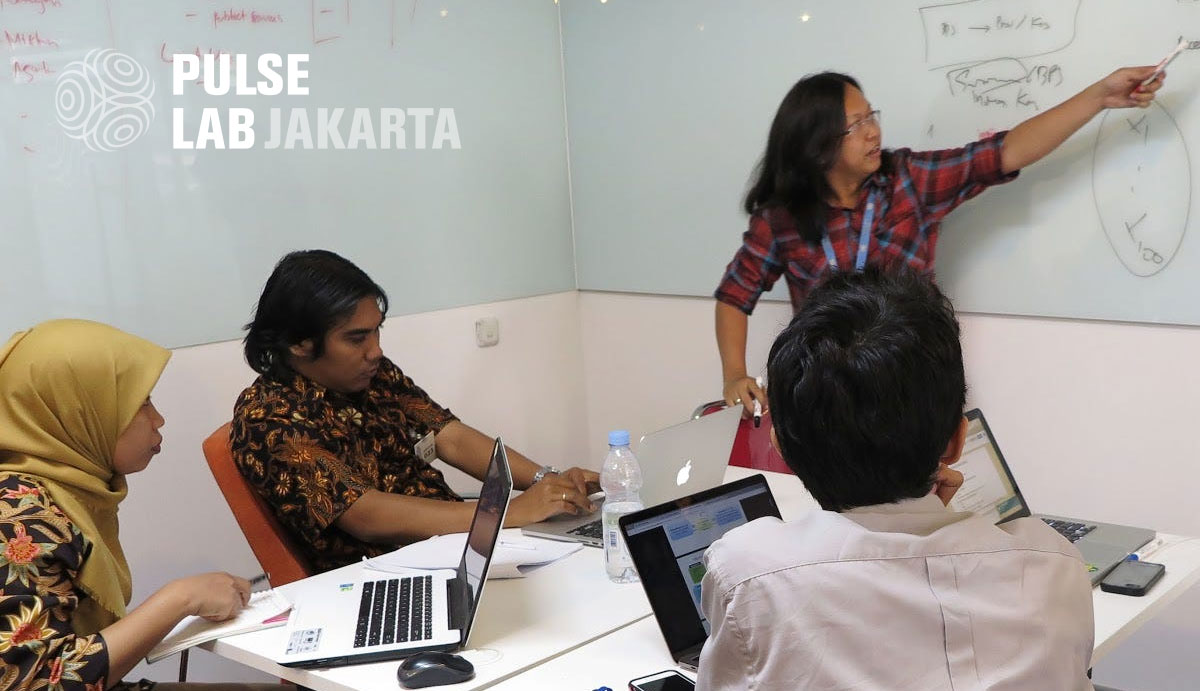
Start:
2020
End:
2020
|
2020
Facilitating The Design of Localized Poverty Alleviation SchemesLocation: Indonesia 
This project investigates the possibility of localising national poverty alleviation schemes in Indonesia using data from SEPAKAT. The research, in collaboration with the Indonesian Ministry of National Development Planning and World Bank, aimed to group similar sub-national regions to allow context-specific customisation of poverty alleviation schemes. The findings suggest potential clusters for local interventions, but further domain expertise is required to assess the viability of each cluster.
<p>Whilst national-level poverty alleviation schemes in Indonesia have existed since the 1970s, the poverty reduction rate in Indonesia is falling. This may partly be because universal interventions geared towards poverty reduction typically do not address context-specific issues, particularly in a large country like Indonesia with varying socio-economic conditions. Whilst localising an intervention can lead to effective policies for local populations, it isn't always feasible in such a large country to run a national program that is fully customized to every single local context. Finding the sweet spot in-between a universal approach and a fully-localized approach becomes important. Using data from SEPAKAT (a poverty analysis tool that collates a variety of empirical indicators at the sub-national level), our team set out to investigate whether it would be possible to group similar sub-national regions (based on the data in SEPAKAT) so as to offer some level of context-specific customization in the design of national poverty alleviation schemes. The research framework was defined by our partners within the Indonesian Ministry of National Development Planning (Bappenas) and World Bank, who also provided the semi-processed data from SEPAKAT at the province and district level on input and outcome variables. Using primarily model-based clustering with six variations, our research was able to group provinces and districts based on the baseline characteristics on topology, economic structure and fiscal capacity. The results recommended several options that might be ideal for localising interventions, at both the province and district level. However, from the analysis we could not determine the levels of viability of each cluster, as this would require further domain expertise in the respective region, consistent with the complexity of the planned interventions. A comparison of outcome variables on poverty alleviation performance could subsequently be conducted within each cluster. The results could then provide further recommendations to the Government on further work to explore, such as exploring top-performing areas (knowledge hub) and monitoring performance within clusters.</p>
Domain
Poverty, Financial Inclusion, and Economic Development
SDG
No Poverty
Decent Work and Economic Growth
Reduced Inequality
Data
Goverment Statistics
Partners
Bappenas The Worldbank
|
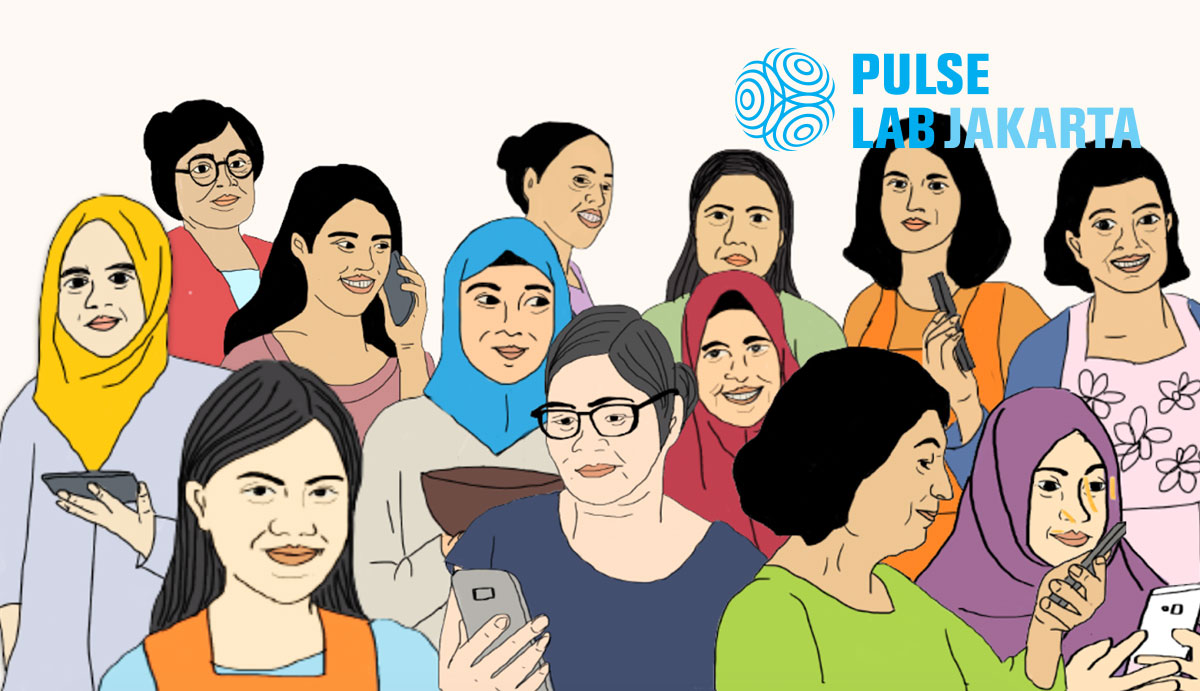
Start:
2021
End:
2021
|
2021
Beyond Sticky FloorsLocation: Indonesia 
This research project by PLJ and UN Women explored the disparity between male and female micro and small business (MSB) owners regarding digital tool adoption, particularly considering the pandemic. The report highlighted "sticky floors", behavioural barriers that prevent women from effectively utilising digital resources. These hurdles vary according to individual digital capability levels. The project emphasised the role of behavioural economics in addressing these challenges and informed the 2021 UN Behavioural Science Report.
<p>To examine the difference in outcomes and coping strategies between women and men owned MSBs, we conducted a mixed-methods study in 2020 with UN Women that focussed on the utilization of digital platforms in response to the pandemic. One of the policy recommendations that came out of the research pointed to enhancing women's access to technology to help them unlock the potential of digitalization. With this motivation in mind, in 2021 we revisited the qualitative data that was collected as part of the research with a view to identifying design opportunities that might help women necessity business owners overcome behavioral barriers to adopting digital tools. Aptly titled "Beyond Sticky Floors", PLJ subsequently published a seminal research report that underlined some of the behavioural challenges (so called the "sticky floors") that are often overlooked in the discourse on increasing digitalization. The report assessed that women micro business owners often face specific behavioural barriers or "sticky floors" to adopting and using digital tools, and these barriers vary depending on where they are in their digital capabilities journey. This independent research, demonstrating how behavioral economics principles can be used to complement the intervention design process, was one of the Lab's key contributions to the 2021 UN Behavioural Science Report.</p>
Domain
Poverty, Financial Inclusion, and Economic Development
Women's Empowerment and Gender Equality
SDG
Gender Equality
Decent Work and Economic Growth
Reduced Inequality
Data
Qualitative Data
Partners
UN WOMEN
|
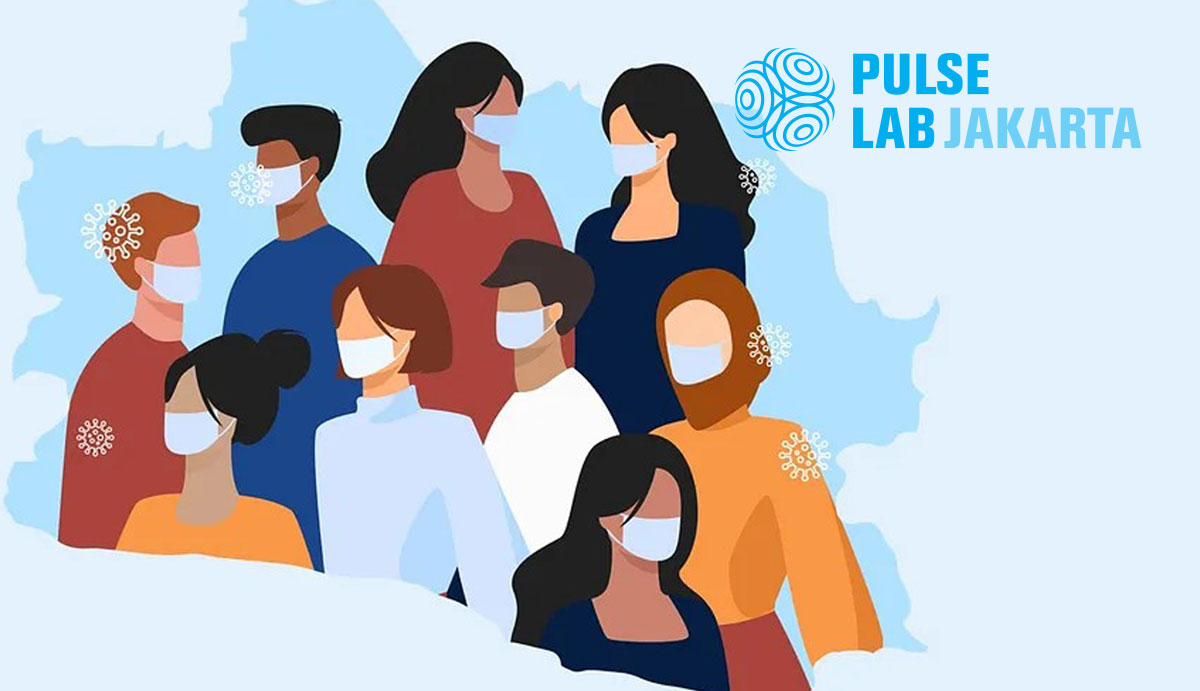
Start:
2021
End:
2021
|
2021
Data Preparedness and Information Management System in Disaster ManagementLocation: - 
This project addresses the issue of varying data standards within the public sector, hindering effective disaster management. In collaboration with the Directorate of Spatial Planning and Disaster Management and the Centre for Data and Information, we developed a roadmap for an integrated data system, focusing on data preparedness, information management, and information system. The aim is to streamline data collection, ensure high-quality data availability, and enhance collaboration between various levels of government during crisis situations.
<p>Varying data standards is one of the challenges in the public sector due to the disparate ways data tend to be collected. This siloed approach tends to hinder effective coordination, especially at the onset of a crisis. To develop a disaster management data preparedness roadmap for damage and loss assessment, we teamed up with the Directorate of Spatial Planning and Disaster Management, as well as the Centre for Data and Information within Bappenas. This roadmap is intended to help the Ministry better prepare resources that are needed for an integrated data system, which can promote effective collaboration between actors at the sub-national and national levels. In assessing the existing conditions, the team found that whilst there is an abundance of disaster-related data available for use across the system, the data was often not in a format that could be easily ingested and processed. For instance, some of the data was provided in a raw format without adequate metadata and with variable consistency, including missing primary key or ID, and geographical location. In the case of anonymized data about people, this was often without age and gender identifiers. Based on these findings amongst others, the roadmap outlined steps that should be taken to achieve the Directorate's overarching objective of establishing a damage and loss calculation system. The steps focused on: data preparedness (to ensure the availability of data with good quality that can be used when needed); information management (to ensure effective and efficient coordination and data sharing with other parties); and information system (to facilitate data collection and processing). Establishing data research collaboration with other ministries and agencies; recruiting staff with the appropriate technical skills and knowledge; and strengthening internal and external data governance mechanisms were some of the key recommendations put forward to ensure the roadmap's smooth implementation.</p>
Domain
Disaster Response and Humanitarian Action
Environment and Climate
SDG
Sustainable Cities and Communities
Climate Action
Partnership for The Goals
Data Partners
Bappenas
|
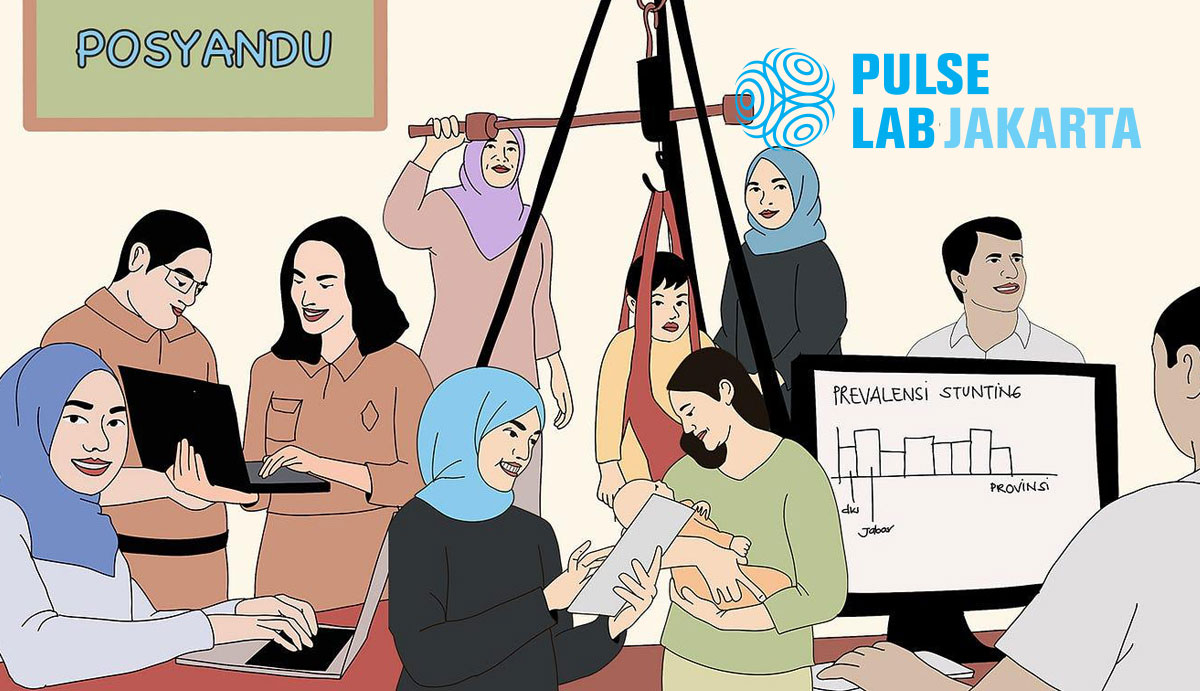
Start:
2021
End:
2022
|
2021
Assessing The Implementation of Indonesia’s National Nutrition Information System (e-PPGBM)Location: Indonesia 
in collaboration with UNICEF and Indonesia's Ministry of Health, aims to optimise the e-PPGBM system that is integral to the National Movement for Stunting Reduction. In 2021, using a service design methodology, the project identified gaps in the implementation of the system, including inconsistencies in data collection and underutilisation of data at the district and provincial levels. Currently, the project is focused on developing actionable recommendations to refine the system based on the identified gaps. In 2022, the project conducted an evaluative study using service design methodology, combining quantitative and qualitative approaches such as surveys, field observations, and in-depth interviews. This study aimed to gain a comprehensive understanding of the utilisation of the e-PPGBM system and address challenges related to user and technical capacity.
<p>2021: To support the National Movement for Stunting Reduction in Indonesia, the Ministry of Health launched SIGIZI - a national nutrition information system to record and report nutrition data within communities (particularly on adolescents, pregnant women and toddlers). One of the key components of this system is known as e-PPGBM, which is an online application system for recording and reporting on communitybased nutrition. Challenges in implementing this system, for instance amongst health workers who use this tool to report the nutritional status of children in their areas, have reduced optimization. These challenges include different data collection and reporting mechanisms, lack of clarity in follow-up mechanisms, as well as suboptimal use of the data in districts and provinces. To better understand the contributing factors, we have been supporting UNICEF and the Ministry of Health to systematically investigate the platform's implementation gaps and develop actionable recommendations to refine the development of the system. This assessment employs a service design methodology that includes in depth desk reviews, remote qualitative surveys and interviews to glean useful insights for planning and organizing resources, such as the people, infrastructure, communications and processes required for the system to run smoothly and meet the intended goals. This includes holistically assessing the system to understand what goes on behind the scenes, backstage and on the frontstage. The study is currently ongoing and will conclude in 2022.</p>
<p>2022: To support the National Movement for Stunting Reduction, the Indonesian Ministry of Health (Kemenkes) launched Sistem Informasi Gizi Terpadu—a national nutrition information system to record and report data on communitybased nutrition. One of the key modules of the SIGIZI platform is known as e-PPGBM or Pencatatan dan Pelaporan Gizi Berbasis Masyarakat Elektronik, an application for recording and reporting on community-based nutrition. Through e-PPGBM, health workers can directly report on the nutritional status of children in their areas and arrange necessary follow-ups; however, early observations indicate there are challenges in implementing this system from user capacity to technical capacity. Given the importance of e-PPGBM in recording data that can be used to address stunting, PLJ conducted an evaluative study to develop a holistic understanding of the application's utilization using service design as a methodology, combining quantitative and qualitative approaches (surveys, field observations, in-depth interviews).</p>
Domain
Strategic Exploration
Public Health and COVID-19
SDG
Zero Hunger
Good Health and Well-being
Reduced Inequality
Data
Qualitative Data
Customized Survey
Partners
UNICEF
MOH
|
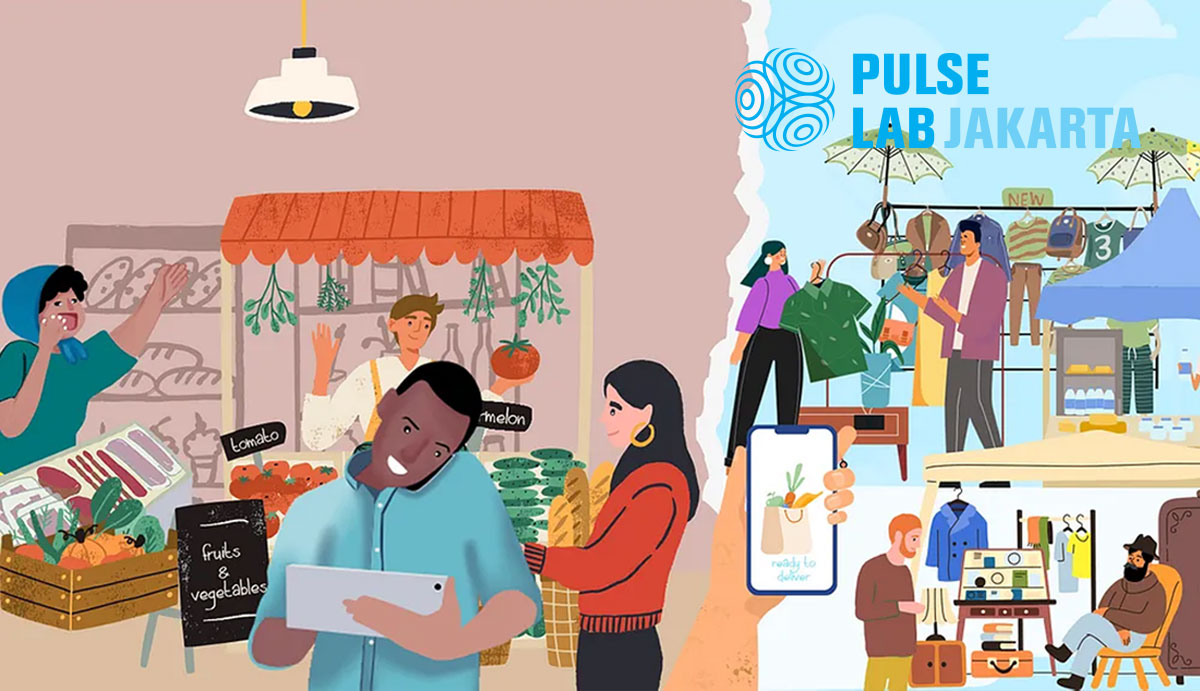
Start:
2021
End:
2022
|
2021
Strengthening MSMEs for Inclusive Growth and Sustainable DevelopmentLocation: Indonesia 
PLJ has partnered with Bappenas to strengthen Micro, Small, and Medium Enterprises (MSMEs) in Indonesia for inclusive growth. In 2021, we explored relevant datasets to understand the state of the MSME sector, used a service design approach to assess existing conditions, identify capacity gaps, and design a geospatial data analysis tool for MSME dynamics. By 2022, the focus shifted towards creating a flexible dashboard system aimed to comprehend the challenges faced by MSMEs and inform evidence-based policymaking. This tool will provide insights into the spatial distribution of MSMEs, helping policymakers make informed decisions to support MSMEs' growth.
<p>2021: To answer critical policy questions on the state of Indonesia's MSMEs sector, we ran a series of tailored data dives with the Directorate of SMEs and Cooperatives Development and the Data and Information Centre within Bappenas. The underlying objective was to identify what traditional and non-traditional datasets might be relevant, in addition to surveying their availability and assessing data gaps that might exist. With growing digitalization in this sector, the process provided a practical use case on systems design to ensure integrated data flows and sustainable pipelines for data insights. This is especially crucial as there has yet to be a unified database on MSMEs in Indonesia. To start, the team sought to design an informational data analysis tool to examine the geospatial dynamics of MSMEs at the district level with the aim of identifying enablers and inhibitors of inclusive growth. The data workshops conducted were foundational for the design process, and brought together a multidisciplinary group of domain experts with experience in the MSMEs sector. As a learningby-doing collaboration, it also served as a capacity building exercise for the units within Bappenas to assess existing conditions and resources, as well as identify capacity gaps where improvements would be needed for effective design, implementation and maintenance of a unified country-wide MSMEs data system. To explore the intersection between the system and its users, a user research was also conducted with potential users and technical custodians to assess the end-to-end processes and resources (people, infrastructure and protocols) required. Through this service design approach, recommendations were developed for a systems-wide data integration strategy to support policies impacting more than 30 million MSMEs in the country. In 2022, the project will take on a futures and foresight lens to look at issues on the horizon that could potentially influence the dynamics of MSMEs in Indonesia and help nurture a broader enabling environment in the region towards their inclusive growth.</p>
<p>2022: Micro, Small and Medium Enterprises (MSMEs) play a crucial role in the Indonesian economy, yet despite their significant contributions they face a number of challenges including difficulties in marketing, accessing finance, and facing unbalanced competition. To support MSMEs during the pandemic, the government implemented support programs spread across various ministries and institutions; however, the lack of program integration limits their effectiveness. Thus, PLJ collaborated with the Ministry of National Development Planning (Bappenas) to develop a data analysis tool to better understand the challenges and to inform evidence-based policy making for MSMEs. The goal is to develop a flexible dashboard system that will accommodate the dynamic needs of policymakers and allow for easy integration of new data and visualizations in the future. The tool will provide valuable insights into the spatial distribution of MSMEs and factors that support or hinder their development, and will be a useful resource for policymakers to make informed decisions to support the growth of MSMEs in Indonesia.</p>
Domain
Poverty, Financial Inclusion, and Economic Development
Trade and Competitiveness
Strategic Exploration
Women's Empowerment and Gender Equality
SDG
Decent Work and Economic Growth
Industry, Innovation, and Infrastructure
Reduced Inequality
Data
SUSENAS
Social Connectedness Index
National Labor Force Survey
Micro & Small Businesses Survey
Medium & Enterprise Industry Survey
Economic Census
Facebook Geo-Insight
Partners
Bappenas
|
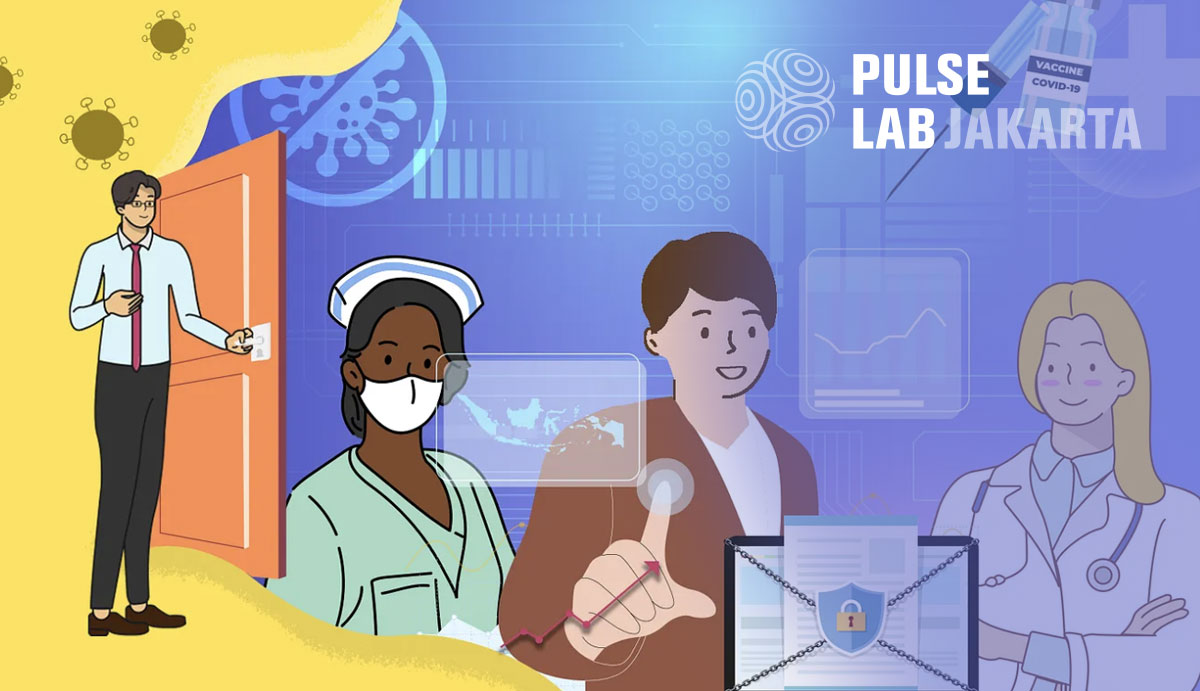
Start:
2021
End:
2022
|
2021
Health Data Analytics for Managing PandemicsLocation: Indonesia 
In response to the COVID-19 pandemic, PLJ provided advanced data analytics support to the Indonesian Ministry of Health's Digital Transformation Office in 2021. The aim was to harness health-related datasets for actionable insights to aid the COVID-19 response and support broader data harmonisation within the health sector. We emphasised ethical data use and assessed data quality and interlinkages. In 2022, the collaboration evolved towards a holistic and integrated approach to strengthening the overall data ecosystem, focusing on improving institutional capacity, aimed to glean insights from combining available datasets. The mixed-method approach combined data analytics with service design, including user research, data scoping, and knowledge-sharing webinars.
<p>2021: To leverage health-related datasets for actionable insights, the Indonesian Ministry of Health through its Digital Transformation Office requested advanced data analytics support from our team. Having conducted considerable data analyses, the Ministry's key objective for this collaboration was to explore what useful insights could be gleaned by combining data from across its different systems to aid COVID-19 response. Through a joint research dive, an exploratory analysis was conducted to examine available datasets, as well as to determine the quality of data and interlinkages needed to support broader data harmonization in the health sector. The research dive allowed for the development of a common understanding on the applicability of the analysis to specific contexts, with practical knowledge transfers among the domain experts involved. Beyond the technical analysis, a data ethics framework was also incorporated throughout the process, including a risks, harms and benefits assessment. This process brought attention to particular issues of data partnerships and sharing agreements that need to be thoroughly considered to ensure the responsible use and protection of data across the data ecosystem. In addition, the Digital Transformation Office is also tasked with implementing a long-term digital transformation strategy in coordination with relevant stakeholders across government, the private sector and the development sector. Our engagement in this consolidated effort lends experiential expertise at the intersection of different policy domains and the core pillars of the UN Secretary General's "next-gen" transformation agenda to inform policies and actions by the Ministry of Health and others. A user research was conducted in conjunction with the research dive, which helped to assess policy implications, as well as shape recommendations on steps that should be taken to improve both data quality and essentially the quality of related data-driven decisions.</p>
<p>2022: The COVID-19 pandemic has underscored the need for reliable data for improved decision making. Within the health sector, the emerging challenges have also emphasized the importance of adopting a holistic and integrated approach to strengthening the overall data ecosystem. Besides effectively leveraging data systems to improve both individual and public health, ensuring responsible access and use of sensitive health-related data is also paramount. The Indonesian Ministry of Health (MoH) through its Digital Transformation Office (DTO) requested technical data analytics assistance from PLJ geared towards improving the ministry's understanding of its data. With emphasis on responding to the pandemic, a key objective was to explore what insights could be gleaned from combining available datasets. MoH was also interested in developing its institutional capacity to design and implement research in a structured and responsible manner. We applied a mixed-method approach combining data analytics with service design. Activities include user research, data scoping & research dive, international development partners meetings, and a webinar to facilitate knowledge sharing.</p>
Domain
Strategic Exploration
Public Health and COVID-19
SDG
Good Health and Well-being
Industry, Innovation, and Infrastructure
Partnership for The Goals
Data
Mobility Data
COVID-19 Case Monitoring
COVID-19 Vaccination
COVID-19 Treatment
COVID-19 Testing
COVID-19 Tracking
Facebook COVID-19 Trends & Impact Survey
Partners
MOH
|
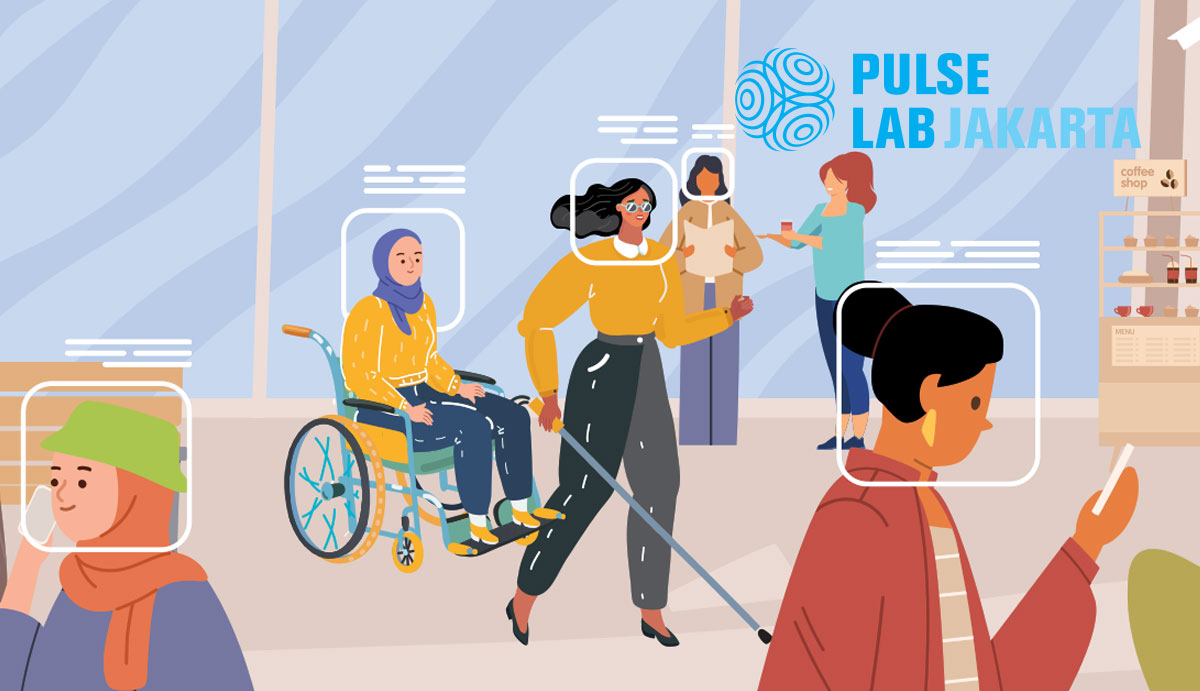
Start:
2021
End:
2022
|
2021
UN in Indonesia Perception SurveyLocation: Indonesia 
The project seeks to understand the Indonesian public's and partners' perceptions of the United Nations in Indonesia. The activities conducted to achieve this goal include online surveys with key stakeholders and the public, social media listening, and a final analysis of collected statistics.
<p>2021: -</p>
<p>2022: The key is to understand the Indonesian public's and our partner's perception(s) of the United Nations in Indonesia. The following activities were carried out to achieve the project's goal: online surveys with key stakeholders and the general public, social media listening, and final analysis of collected statistics.</p>
Domain
Strategic Exploration
Women's Empowerment and Gender Equality
SDG
Industry, Innovation, and Infrastructure
Peace, Justice, and Strong Institutions
Partnership for The Goals
Data
Social Media
Customized Survey
Partners
UN Indonesia
|
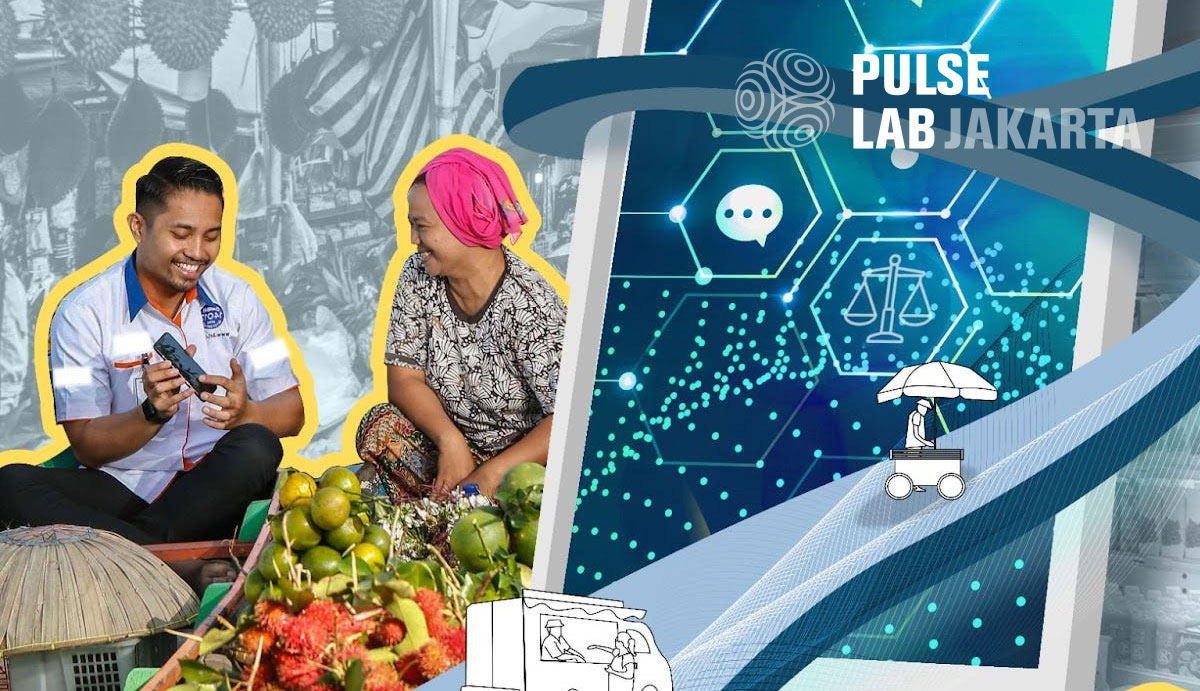
Start:
2022
End:
2022
|
2022
Horizon Scanning: The Futures of MSMEs in IndonesiaLocation: Indonesia 
In collaboration with the Data & Information Center and the Directorate of Cooperatives & SME Development within Bappenas, PLJ undertook a strategic foresight project to understand potential influences on the future of MSMEs in Indonesia. The team used horizon scanning to identify weak signals and key drivers that could shape the sector's future, using the PESTLE framework.
<p>As Indonesia navigates the uncertainties of the coming decade, including rapid technological changes and global economic instability, a horizon scanning process has been conducted to anticipate the futures of Micro, Small, and Medium Enterprises (MSMEs). The project aims to support policy development and ensure a vibrant, adaptable MSMEs ecosystem. The findings will shape the future of MSMEs, informing Indonesia’s National Long-Term Development Plan 2025–2045, given MSMEs' significant contribution to the national GDP and role as a growth driver.</p>
<p>A collaboration between Bappenas, UN Global Pulse, Pulse Lab Jakarta (PLJ), and Pulse Lab Finland (PLF) provided tools and data to support the policy-making process for MSMEs' future development. The horizon scan on the futures of MSMEs in Indonesia is a key activity of this collaboration. It's expected to serve as a major reference in the development of Indonesia's National Long-Term Development Plan and inspire further utilization of such methodologies in future planning processes.</p>
<p>The MSMEs sector, with over 60% of Indonesia's GDP and employment for 97% of the nation’s workforce, is considered the backbone of the Indonesian economy. In light of the rapid changes and high uncertainties in the global landscape, key questions about the future landscape of MSMEs, emerging sector issues, and potential disruptors need to be addressed, particularly for Bappenas preparing Indonesia’s LongTerm Development Plan (2025–2045).</p>
<p>To address these questions, UN Global Pulse and Bappenas conducted a foresight exercise, with the primary technique being horizon scanning. The exercise aimed to understand potential developments affecting the futures of MSMEs, build foresight capacity, and inform the creation of robust policies and strategies. Strategic foresight, the systematic, long-term, anticipatory approach used, encourages proactive policy-making and envisions the future as a shapeable entity rather than a fixed outcome. The PESTLE framework was employed during the scanning process to capture and analyze signals of change.</p>
Domain
Poverty, Financial Inclusion, and Economic Development
Trade and Competitiveness
Strategic Exploration
SDG
Decent Work and Economic Growth
Industry, Innovation, and Infrastructure
Partnership for The Goals
Data
Qualitative Data
Partners
Bappenas
UNGP Finland
|

Start:
2022
End:
2022
|
2022
BGB - Breaking Growth BarriersLocation: Indonesia 
In 2022, PLJ conducted a study with UN Women Indonesia to understand systemic barriers that hinder the growth of women-led businesses. The study applied systemic design to uncover the intangible dynamics and underlying mental models shaping behaviours and system structures, considering challenges such as access to financial capital, limited support networks, and gender-based discriminatory policies.
<p>Women entrepreneurs are essential contributors to economic and social transformation, especially in the impact sector, which looks beyond generating profit and contributes to improving social and environmental impact. Yet despite their contribution, women face a range of constraints in growing their businesses. Existing studies conclude that their challenges include access to financial capital, limited support networks to access business-related resources, advice, and training opportunities. However, these are further compounded by systemic barriers such as societal norms, regulatory constraints, unpaid care work and gender-based discriminatory policies. In 2022, PLJ conducted a joint study with UN Women Indonesia to further understand the interrelatedness of systemic barriers that act as impediments in the growth of women-led businesses. We applied systemic design, which combines both human-centered design competencies and systems thinking skills that seek to uncover the intangible dynamics and underlying mental models that are shaping behaviors and systems structure.</p>
Domain
Poverty, Financial Inclusion, and Economic Development
Women's Empowerment and Gender Equality
SDG
Gender Equality
Decent Work and Economic Growth
Reduced Inequality
Data
Qualitative Data
Partners
UN WOMEN
|
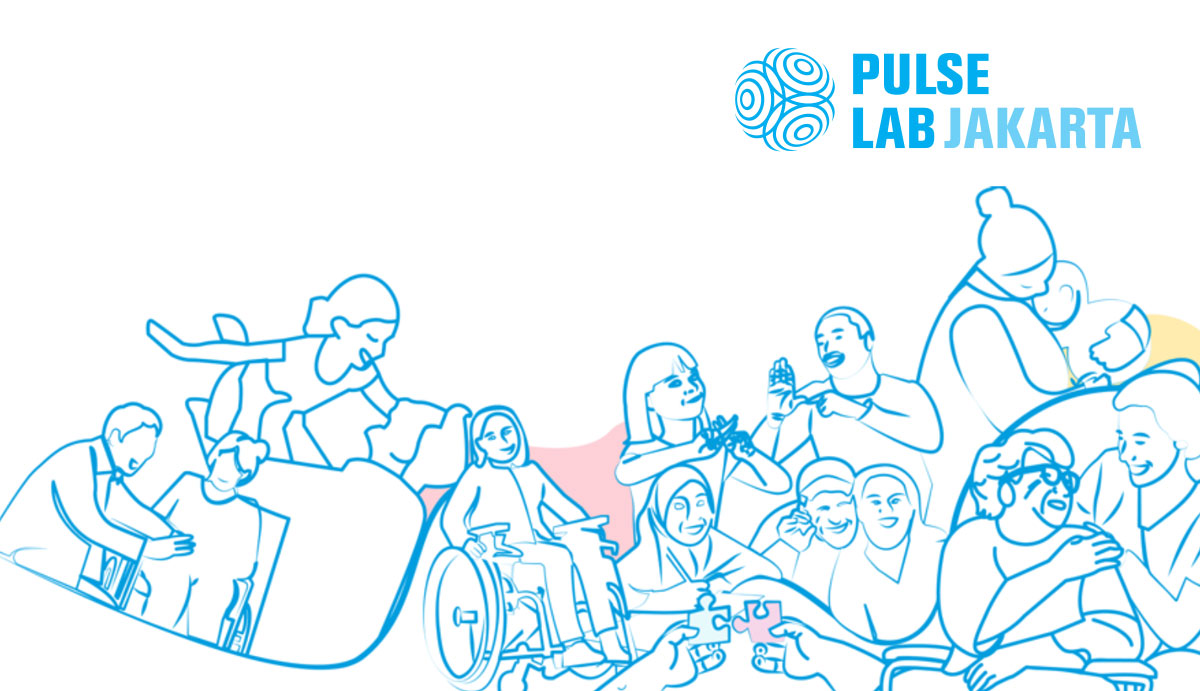
Start:
2022
End:
0
|
2022
LNOB - Leave No One BehindLocation: Indonesia 
The LNOB project aims to bolster data collection on and for disability, addressing issues within Indonesia's data ecosystem that affect policies and programming for persons with disabilities. The project seeks to inspire stakeholders to innovate in areas related to empowering these individuals by providing them with relevant data. The methodologies employed include desk research, service design, UI/UX, qualitative and quantitative research, innovation cycle, crowdsourcing, public relations, and advocacy.
<p>Following the results of the UN Country Data Strategy use case of data on disability, this project continues to support the collection of data based on two streams: data on disability and data for disability. On disability, the aim is to address issues within Indonesia's data ecosystem that impact the effectiveness and responsiveness of policies and programming for persons with disabilities in Indonesia. For disability, the aim is to inspire a broader range of stakeholders to innovate in areas related to empowering persons with disabilities by providing them with relevant data according to their needs. The methodologies that have been used throughout project implementation include: desk research, service design, UI/UX, qualitative research, quantitative research, innovation cycle, crowdsourcing, public relations and advocacy.</p>
Domain
Poverty, Financial Inclusion, and Economic Development
Urban and Regional Dynamics
Public Health and COVID-19
Women's Empowerment and Gender Equality
SDG
Good Health and Well-being
Quality Education
Reduced Inequality
Data
Education Data
Google Maps POI
Hospital Data
Schools for Disabled Children
Partners |
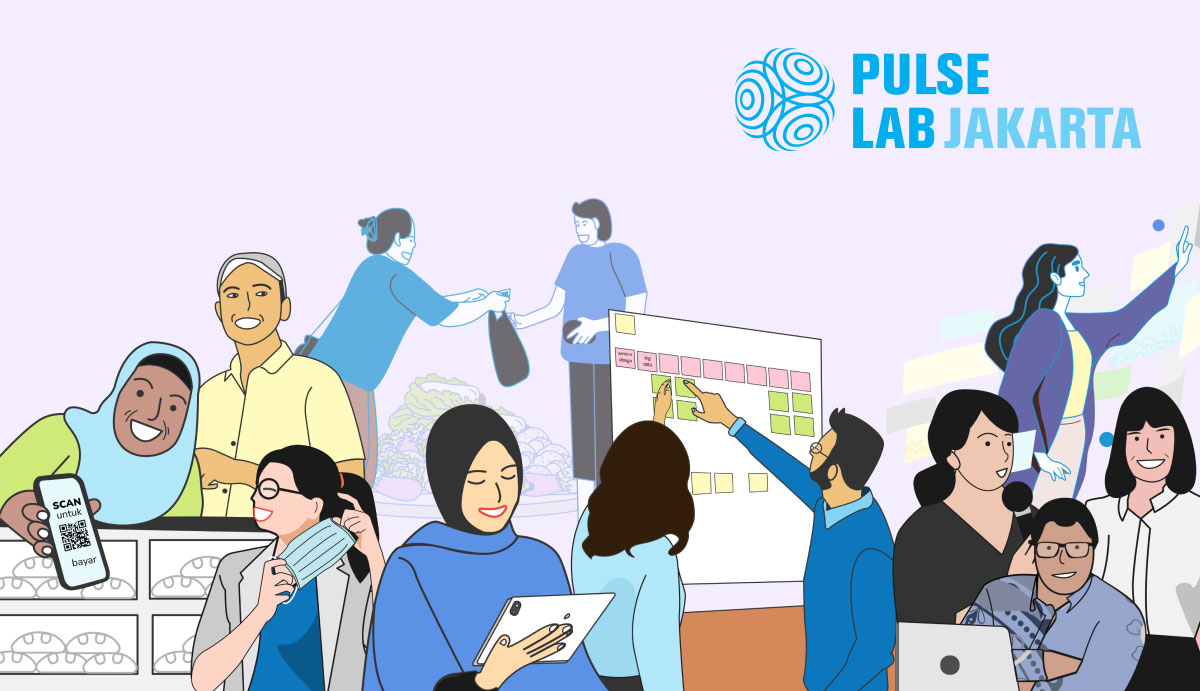
Start:
2022
End:
0
|
2022
Regional Disparities InitiativeLocation: Indonesia 
This initiative aims to improve the delivery of basic services, particularly to women and other vulnerable groups in less developed regions of Indonesia. It seeks to understand regional disparities, identify vulnerable areas, and develop targeted interventions. The project employs a data analysis methodology and includes activities like data collection, data pre-processing, data analysis, and prototyping of a dashboard.
<p>The overall objective of the Regional Disparities Initiative is to improve the delivery of basic services (Layanan Dasar), particularly to women and other vulnerable groups in less developed regions of Indonesia. It is vital to find a balance between the country's complexity and the limitations of designing overly specific service delivery programs. This balance should allow for understanding regional disparities, identifying vulnerable areas, and developing targeted but manageable interventions that address specific needs while avoiding excessive complexity in management. The project utilized a data analysis methodology looking at three layers of analysis. The following activities were done to achieve this: data collection, data pre-processing, data analysis and prototyping of a dashboard for the first two layers.</p>
Domain
Poverty, Financial Inclusion, and Economic Development
Urban and Regional Dynamics
SDG
No Poverty
Reduced Inequality
Peace, Justice, and Strong Institutions
Data
SUSENAS
PODES
inaRISK
Partners
SKALA
|
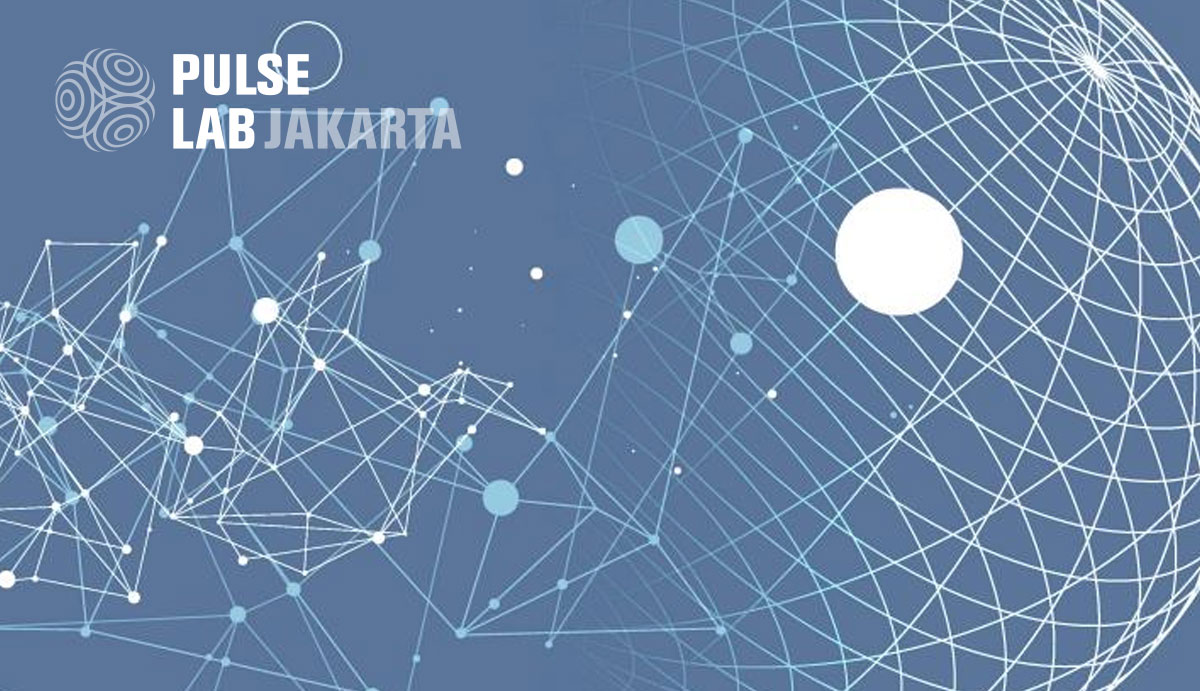
Start:
2022
End:
2022
|
2022
UN Country Data StrategyLocation: Indonesia 
Pulse Lab Jakarta has initiated a use-case centric approach to help UNCT Indonesia and the Data for SDGs, Monitoring, Evaluation, and Learning Working Group (DMEL-WG) address gaps in data usage per the UN data strategy. One of the project's key focus areas is improving disability data, aligning with UNSDCF's first strategic priority, Inclusive Human Development. The project thus underscores the importance of managing data flows across UN agencies to inform decision-making, starting with data relevant to People with Disabilities (PwD) as a pivotal use-case.
<p>Pulse Lab Jakarta has initiated a use-case centric approach to help UNCT Indonesia and the Data for SDGs, Monitoring, Evaluation, and Learning Working Group (DMEL-WG) address gaps in data usage per the UN data strategy. This strategy aligns with the UN Country Team's fourth strategic priority in Indonesia's UN Sustainable Development Cooperation Framework (UNSDCF) 2021-2025: Innovation for SDG acceleration. One of the project's key focus areas is improving disability data, aligning with UNSDCF's first strategic priority, Inclusive Human Development. The project thus underscores the importance of managing data flows across UN agencies to inform decision-making, starting with data relevant to People with Disabilities (PwD) as a pivotal use-case. This approach will lead to broader data-driven reforms within the UN and among its key counterparts, including government and civil society.</p>
Domain
Poverty, Financial Inclusion, and Economic Development
Urban and Regional Dynamics
Public Health and COVID-19
SDG
Industry, Innovation, and Infrastructure
Reduced Inequality
Partnership for The Goals
Data
Qualitative Data
Partners
UN Indonesia
DMEL-WG
|
Pulse Lab Jakarta is a joint data innovation facility of the United Nations (Global Pulse) and the Government of Indonesia (via the Ministry of National Development Planning, Bappenas) with support from the Goverment of Australia. The information displayed on this website showcases Pulse Lab Jakarta's portfolio from 2012 to 2023 prior to its transition into the UN Global Pulse Asia Pacific Regional Hub.
